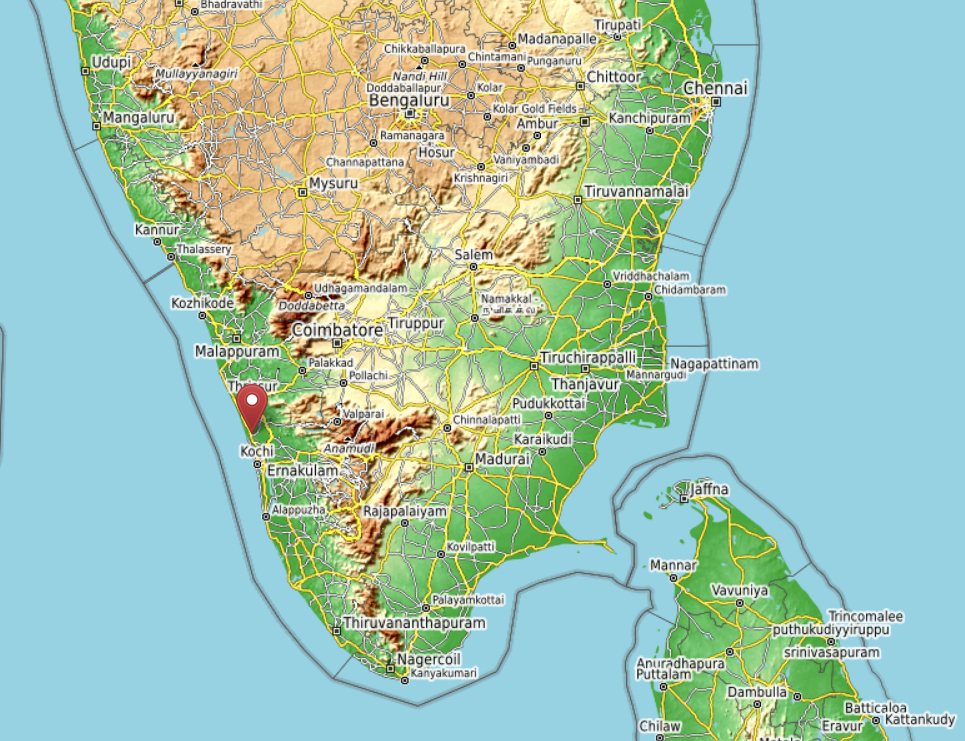
Abb.: Lage von Kodungallur (Malayalam: കൊടുങ്ങല്ലൂര്)
[Bildquelle: © OpenStreetMap-Mitwirkende. -- CC BY-SA 2.0]
Zitierweise | cite as: Payer, Margarete <1942 - >: Hindunationalismus - Hindutva : Chronik bis 1947-08-13. -- Fassung vom 2018-07-09. -- URL: http://www.payer.de/hindunationalismus/chronik.htm
Erstmals hier publiziert: 2018-05-29
Überarbeitungen: 2019-06-10/19/20/21/23/26/27/28 ; 2018-07-05/09 [Ergänzungen]
©opyright: Creative Commons Lizenz (CC BY-NC-SA 3.0 DE - Namensnennung, keine kommerzielle Nutzung, share alike)
Dieser Text ist Teil der Abteilung Modernes Indien von Tüpfli's Global Village Library
Diese Chronik zielt nicht auf Vollständigkeit. Es sollen nur wichtige Ereignisse genannt werden bzw. Ereignisse, die beispielhaft für viele ähnliche sind.
| Hindu, Hindi, Hindustan -- हिन्दु हिन्दी हिन्दुस्तान |
Kodungallur (Malayalam: കൊടുങ്ങല്ലൂര്): Bau der ersten Moschee auf indischem Boden: Cheraman-Freitagsmoschee (چیرامن مسجد - Cheraman Juma Masjid)
Wikipedia: https://de.wikipedia.org/wiki/Cheraman-Freitagsmoschee. -- Zugriff am 2018-05-22

Abb.: Lage von Kodungallur (Malayalam: കൊടുങ്ങല്ലൂര്)
[Bildquelle: © OpenStreetMap-Mitwirkende.
--
CC BY-SA 2.0]
Es erscheint:
Cunningham, Joseph Davey <1812 - 1851>: A history of the Sikhs. -- London : [s. n.], 1849. -- 427 S. ; 22 cm.
"Notwithstanding these changes it has been usual to regard the Sikhs as essentially Hindu, and they doubtless are so in language and everyday customs, for Gobind did not fetter his disciples with political systems or codes of municipal laws; yet, in religious faith and worldly aspirations, they are wholly different from other Indians, and they are bound together by a community of inward sentiment and of outward object unknown elsewhere. But the misapprehension need not surprise the public nor condemn our scholars,' when it is remembered that the learned of Greece and Rome misunderstood the spirit of those humble men who obtained a new life by baptism. Tacitus and Suetonius regarded the early Christians as a mere Jewish sect, they failed to perceive the fundamental difference, and to appreciate the latent energy and real excellence, of that doctrine, which has added dignity and purity to modern civilization." [a.a.O., S. 75f.]
Memorandum:
Raja Sivaprasad [Sanskrit: राजा शिवप्रसाद] <1823 - 1895>: Court Characters in the Upper Provinces of India. -- 1868
Darin plädiert Sivaprasad für den Gerichtsgebrauch der Devanagari (देवनागरी) Schrift anstelle der Urdu (اُردُو) Schrift.
Wikipedia: https://en.wikipedia.org/wiki/Raja_Sivaprasad. -- Zugriff am 2018-07-05
Es erscheint die erste Auflage von
Hunter, W. W. (William Wilson) <1840 - 1900>: The Indian Musalmans. -- London Trübner, 1871. -- Hier zitiert nach der 3. ed. 1876. -- Online: https://archive.org/details/indianmusalmans02huntgoog. -- Zugriff am 2018-07-05
Titelblatt der 3. Auflage
Wikipedia: https://de.wikipedia.org/wiki/William_Wilson_Hunter / https://en.wikipedia.org/wiki/William_Wilson_Hunter. -- Zugriff am 2018-07-05
Memorandum
Memorial presented to government in 1873 praying for de restoration of Nagri [देवनागरी] characters in courts and public offices. To the Honorable Sir William Muir [1819 - 1905], LL.D.K.C., S.I., Lieut.-Governor of the North Western Provinces
Ajmer (Hindi: अजमेर): Es erscheint auf Hindi:
दयानन्द सरस्वती [Dayanand Saraswati] <1824 –1883>: सत्यार्थ प्रकाश [Satyarth prakash]. -- Online: http://satyarthprakash.in/download-satyarth-prakash/. -- Zugriff am 2018-03-10
Abb.: Titelblatt der hier benutzten Übersetzung
"Chapter Eleven: AN EXAMINATION OF THE DIFFERENT RELIGIONS PREVAILING IN ARYAVARTA (INDIA)Now we shall examine the religions of the Aryas, i.e., the people who liven in Aryvarta (India). This country is such that no other country in the whole world can come up to the level of its excellence. It is also called the Golden Land as it produces gold and precious stones. It was for this reason that in the beginning of the world the Aryas came to this country. We have already stated in the Chapter on Cosmogony that the good and the noble men are called Aryas, whilst those who are otherwise are called Dasyus. The natives of all other countries on the earth praise this very country, and believe that the philosopher’s stone is to be found here. Though this story of the philosopher’s stone is a myth, yet it is true that this country (Aryavarta) itself is verily a philosopher’s stone whose very touch converts all base metals – poor foreigners – into gold – rich nabobs.
Since the beginning of the world till 5,000 years back, the Aryas were the sovereign rulers of the whole earth, in other words, there was only one paramount power whose suzerainty was acknowledged by the rulers of the earth. Till the time of the Kauravas and the Pandavas, all rulers of the earth and their subjects obeyed the law laid sown by the rulers of this country, for it is said in the Manu Smriti, that was compose in the beginning of the world. “Let all other people of the earth – Brahmans*, Kshatriyas, Vaishyas, Shudras, Dasyus and Malecchas – learn arts and science suitable to them from the learned people born in this country.” (Manu 11.20)
* Brahamana’s = Teachers – secular and spiritual.
Kshatriyas – Men of governing class, statesmen, soldiers, etc.
Vaishyas – Merchants, artisans and farmers.
Shudras – Men of the servant class.
Dasyus – Wicked people
Malechhas – Barbarians.The perusal of the Mahabharat proves to demonstration that the Aryas were the sovereign rulers of the earth till the coronation of Emperor Yudhisthtira and the Great War of Mahabharata, for we read in that book that King Bhagadatta of China, Babruvahan of America, Vidalakha* of Europe, the Ruler of Greece, King Shalya of Persia and various other rulers came as ordered to take part in the Great War and in the coronation of Emperor Yudhishthira.
* Called so on account of his cat-like eyes
When the house of Raghu held paramount authority (in this country), even King Ravana of Ceylon acknowledged its suzerainty. Later when he revolted against its authority, Prince Ram Chandra having vanquished and dethroned him placed his younger brother Vibhishana on the throne instead. Since the time of Swyambhava to that of the Pandavas the Aryas were the paramount power throughout the whole world. Thereafter, mutual dissensions among them compassed their destruction, for in this world, over which a just God presides, the rule of the proud, the unjust and the ignorant (such as the Kauravas were) cannot last very long. It is also a law of nature that the accumulation of wealth in a community out of all proportion to its needs and requirements brings in its train indolence, jealousy, mutual hatred, lustfulness, luxury and neglect of duty which put an end to all sound learning and education, whose place is usurped by evil customs, manners and practices like the use of meat and wine, child marriage, and licentiousness.
Besides, when people acquire perfection in the military science and the art of war, and the army becomes so formidable that no one in the whole world can stand it on a field of battle, pride and party spirit increase among them and they become unjust. Thereafter, the lose all power either through mutual dissensions, or a strong man from among families of little importance rises to distinction and is powerful enough to subjugate them, just as Shivajee and Gobind Singh rose against Mohammedan rule and completely annihilated the Muslim power in India.
The fact that the Aryas were the sovereign rulers of the earth since the beginning of the world till the Great War called Mahabharat, is also proved on the authority of the Maitreyopanishad which says, “Why! Besides these, there have been other Mighty Rulers who were the Sovereign Lords of the whole earth; such as Sudyumna, Bhuridyumna, Indradyumna, Kuvalyashwa, Yavanashwa, Bhaddhyrashwa, Ashwapati, Shashavindu Harishchandra, Ambrisha, Nanaktu, Saryati, Anarnya, Akshasena, and also such like Emperors as Mauruta and Bharat.” (Maitrey Upanishad 1.4.)
The names of such Sovereign Rulers as Swyambhava.* etc., are clearly mentioned in the Mahabharat, the Manu Smiriti and other authoritative books. Only the prejudiced and the ignorant regard these statements as fallacious.
* What a pity that the descendants of the Aryas are being crushed under the heel of the foreigner.
Q. -- Is it true that the ancients knew the use of fire-arms, such as Agneyastra, about which we read in ancient Sanskrit literature. Were cannons and muskets known to the ancients or not?
A. -- Yes, it is true. Guns and like fire-arms were used in ancient times. The Agneyastra and the like weapons can be manufactured by the application of scientific principles.
Q. -- Were they brought into existence through magical formulae sanctified by the Gods?
A. -- No, the methods of manufacturing these weapons were evolved as the result of deep thought (mantra). But mere pronouncing of mantra, which is nothing but a collections of words, cannot produce and substance. Were any one to say that the chanting of a mantra (or a hymn) can produce fire, he may be asked as to why it should not burn the throat and tongue of the person who recites it. How funny that a person should burn himself to death while meditating the death of his enemy. A mantra literally means the power of thought, hence Raja mantri, (from Raja = state, and mantri = one who thinks) is one who thinks over the affairs of a State and is the King’s adviser.
Thus, men after deep study acquire a knowledge of the laws of nature, and by the proper application thereof make many discoveries in the domain of art and invented machines. As for instance, if an iron arrow or a ball be filled with such substances as when ignited will produce smoke, which by coming in contact with air or the rays of the sun will catch fire, he will have invented an Agneyastra. The fire opened by it will fail of its effect, if the commander of the opposing army discharges a Varunastra which is made of such materials whose smoke is converted into a cloud. The moment it comes in contact with air it immediately begins to rain and extinguishes the fire. Likewise, there existed in ancient times other weapons of war, such as Nagaphansa – which when discharged against an enemy paralyzed his limbs – and Mohanastra – which was charged with such narcotic substances whose smoke could cause stupefaction of the soldiers of the enemy -, and Pashupatashtra – another kind of Agnevastra, in which electricity produced from a wire, glass or some other substance was employed to kill one’s enemy.
As regards the words Top (cannon) and Bandook (muskets) they belong to a foreign language and not to Sanskrit or to any of the Indian Vernaculars allied to it. Now what called a Top (cannon) by the foreigners, is spoken of as Shatagahni (literally that which kills hundreds at a time) and bandook (musket), bhashundi in Sanskrit and Arya Bhasha (one of the most widely spoken Indian Vernaculars). Those who are unacquainted with the Sanskrit literature write and say all sorts of nonsense. Their writings can never be considered as authentic by the learned. All the knowledge that is extant in the world originated in Aryavarta (India). Thence it spread to Egypt, thence to Greece, thence to the whole continent of Europe, thence to America and other countries. Even today India heads all other countries in the matter of Sanskrit learning. The impression that the Germans are the best Sanskrit scholars and that no one has read so much of Sanskrit as Professor Max Muller is altogether unfounded. Yes, in a land where lofty trees never grow, even Recinis Communis or the common Castor oil plant may be called an oak. The study of Sanskrit being almost non-existent in Europe, German scholars like Professor Max Muller, who have read a little Sanskrit may have come to be regarded as the highest authorities in Germany, but compared with India the number of Sanskrit scholars in that country is very small. We came to know from a letter of the President of a German University that even learned enough to interpret a Sanskrit letter are rare in Germany. We have also made it plain from the study of Max Muller’s History of Sanskrit Literature and his commentary on some mantras of the Veda that the Professor has been able to scribble out something by the help of the so-called Tikas or paraphrases of the Vedas current in India, for instance, he translates the word bradhnam into a horse in the vedic verse which runs as:- Yunjanti bradhanam arusham charanti….” Even Sanyanacharya’s rendering of it unto the sun is much better, but its real meaning is the All-Pervading Spirit.* This will suffice to show how much Sanskrit learning Professor Max Muller and other Germans possess.
* Vide our book called "An introduction to the exposition of the Vedas" where the true meaning of this mantra is fully explained.
It is a fact that all the science and religions that are extant in the world originated in India, and thence spread to other countries. Mr. Jacolliot, a native of France, tells us in his book called Bible in India that India is the source of all kinds of knowledge and good institutions. All sciences and religions found in the world have spread from this country. He prays to God thus, “Mayest thou, O Lord , raise my country to that height of civilization and progress that had been attained by India in ancient times.”** Prince Dara Shikoh had also come to the same conclusion viz., in no other language is knowledge to be found so perfect as in Sanskrit. He says in his commentary on the Upanishad that he read Arabic and other languages, but his doubts were never dispelled, nor was he ever so happy till he studied Sanskrit, which cleared all his doubts and made him extremely happy.
** These are not actually his words, this is what he says in substance. -Tr.
Again look at the Zodiac representation on the temple of Man at Banares so beautiful is it that even today it gives wondrous information on astronomy though it has not been properly looked after. It will be a very good thing if the rulers of Jeypore were to look after the Temple and make necessary repairs.
It is a pity that this jewel of country received such a rude shock from the Great War that even today it has not recovered from its effects, for what doubt can there be in the ruin of a country wherein brothers begin to kill each other. Rightly has it been said, “When the time of destruction is at hand, intellect becomes perverted,” (Vridha Chauikva XVI.17.) and men do foolish things. Should anyone, offer them good advice, they take it ill, but are always willing to follow unwholesome advice. When most of the learned men, Kings and Emperors, sages and seers were killed or died in the Great War, the light of knowledge began to grow dim, and with it the dissemination of the Vedic Religion came to an end. The people became a prey to mutual jealousy, hatred and vanity. The strong seized upon the country and proclaimed themselves kings. Thus, when the empire was divided into so many independent states even in India, who could then have kept the foreign possessions under control.
[a.a.O., S. - 329 - 334]
Wikipedia: https://en.wikipedia.org/wiki/Satyarth_Prakash. -- Zugriff am 2018-03-10
Übersicht über Ausgaben und Übersetzungen (nach Wikipedia, a.a.O.)
S.No. Language Author/ Translator Publication Year 1 Hindi [हिन्दी] 1st Edition Swami Dayanand Saraswati (Author) 1875 in Ajmer (Hindi: अजमेर) 1 a Hindi [हिन्दी] 2nd Edition Swami Dayanand Saraswati (Author) 1882 2 English (4 translation by different scholars) Dr. Chiranjiva Bharadwaja (Translator) Master Durga Prasad (Translator) Pt. Gangaprasad Upadhyay (Translator) Vandemataram Ramchandra Rao (Translator) 1906, 1908, 1946, 1988 3 Sanskrit [संस्कृत] Pandit Shankardev Paathak 1924(1st Edition) 4 Urdu [اردو ] 1. Aatmaram Amritsari, Bhakt Raimal & Naunihaal 2. Jivandas Pensioner, 3. Pandit Chamupati, 4. Mehta Radhakrishna 1.1898 2.1899 3.1939 4.1905 5 Sindhi [سنڌي] Jeevanlal Arya 1912 6 Punjabi [ਪੰਜਾਬੀ] Aatmaram Amritsari 1899 7 Bengali [বাংলা ভাষা] 1.Motilaal Bhattacharya 2.Shankarnaath 3.Gaurmohandev Verman 1.1901 2.1911 3.??? 8 Marathi [मराठी] 1.Shridaas Vidyarthi 2.Shripaad Damodar Saatavlekar 3.Snaatak Satyavrat 4.Shripaad Joshi 1.1907 2.1926 3.1932 4.1990 9 Telugu [తెలుగు] 1.A. Somnaathan Rao "Updeshak" 2.Pt. Gopadev Sastry 1.1933 2.??? 10 Tamil [தமிழ்] 1.M.R Jambunaathan 2.Kannaiyaa 3.Shuddhanand Bhaarti 1.1926 2.1935 3.1974 11 Malayalam [മലയാളം] 1.Brahamchaari Lakshman 2.Acharya Narendra Bhooshan 1.1933 2.1978 12 Gujarati [ગુજરાતી] 1.Manchaa Shankar, Jaishankar Dvivedi 2.Mayashankar Sharma 3.Dilip Vedalankar 1.1905 2.1926 3.1994 13 Kannada [ಕನ್ನಡ] 1. Bhaaskar Pant 2.Satyapaal Snaatak 3.Sudhakar Chaturvedi 1.1932 2.1955 3.1974 14 Nepali [नेपाली] Dilusingh Raaee 1879 15 Deutsch 1. Dr. Daulatram Devgram, Borikhel (Miyanwaali), 2. Arya Divakar 1. 1930, 2. 1983 16 Kiswahili 17 Odia [ଓଡ଼ିଆ] 1.Shrivatsa Panda 2.Lakshminarayan Shastri 1.1927 2.1973 18 Assamese [অসমীয়া] Parmeshwar Koti 1975 19 Arabisch [العربية] Kaalicharan Sharma ??? 20 Birmanisch [မြန်မာဘာသာ] Kittima ??? 21 Chinesisch [漢語] Dr. Chau 1958 22 Thai [ภาษาไทย] 23 Französisch Lui Morin 1940
Bombay (Marathi: मुंबई): Gründung des Arya Samaj -- Sanskrit: आर्यसमाज
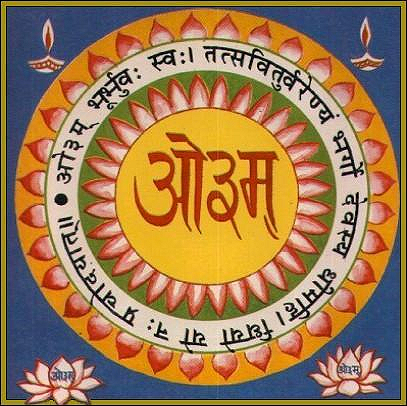
Abb.: Eines der ©Logos
[Fair use]
Webpräsenz: http://www.thearyasamaj.org/home. -- Zugriff am 2018-03-01
Wikipedia: https://de.wikipedia.org/wiki/Arya_Samaj / https://en.wikipedia.org/wiki/Arya_Samaj. -- Zugriff am 2018-03-01
Gründer: Dayanand Saraswati (Gujarati: દયાનંદ સરસ્વતી, 1824 – 1883)
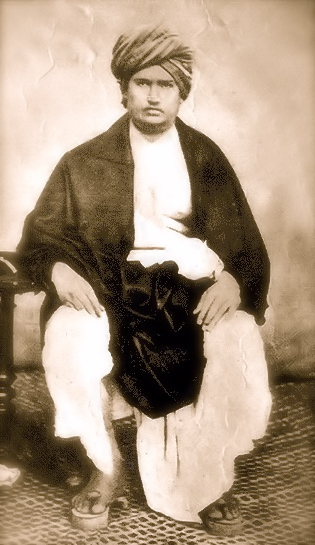
Abb.: Dayanand Saraswati (Gujarati: દયાનંદ સરસ્વતી, 1824 – 1883), 1874
[Public domain]
Aligarh (Hindi: अलीगढ़): Gründung des Mohammedan Anglo-Oriental College (ab 1920: Aligarh Muslim University - جامعہ علی گڑھ)
Webpräsenz: https://www.amu.ac.in/. -- Zugriff am 2018-05-21
Wikipedia: https://de.wikipedia.org/wiki/Aligarh_Muslim_University / https://en.wikipedia.org/wiki/Aligarh_Muslim_University. -- Zugriff am 2018-05-21
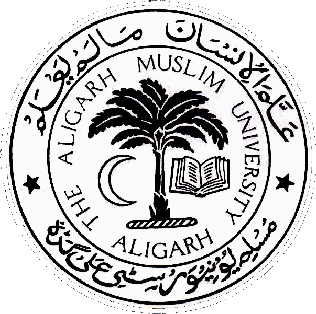
Abb.: ©Logo
[Fair use]
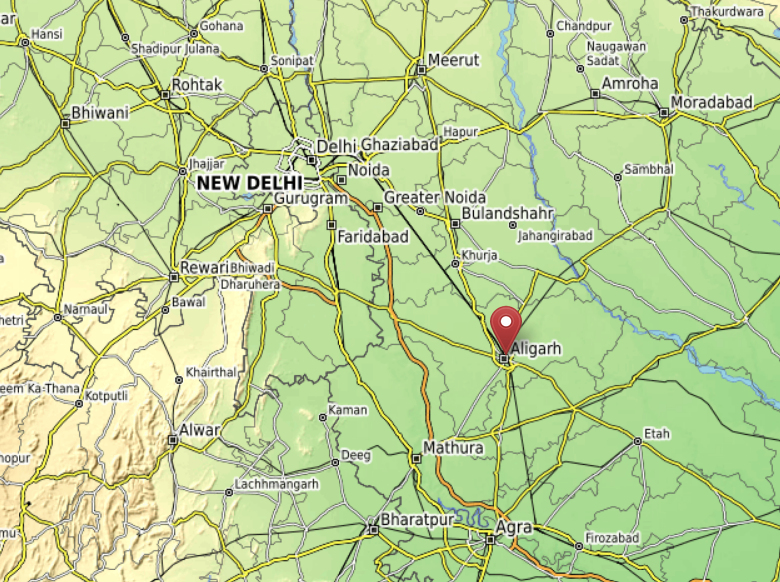
Abb.: Lage von Aligarh (Hindi:
अलीगढ़)
[Bildquelle: © OpenStreetMap-Mitwirkende.
--
CC BY-SA 2.0]
Dayanand Saraswati (Gujarati: દયાનંદ સરસ્વતી, 1824 –1883) gründet ein Rinder-Asyl.
Allahabad (Hindi: इलाहाबाद): Madan Mohan Malaviya (Hindi: मदनमोहन मालवीय, 1861 - 1946)
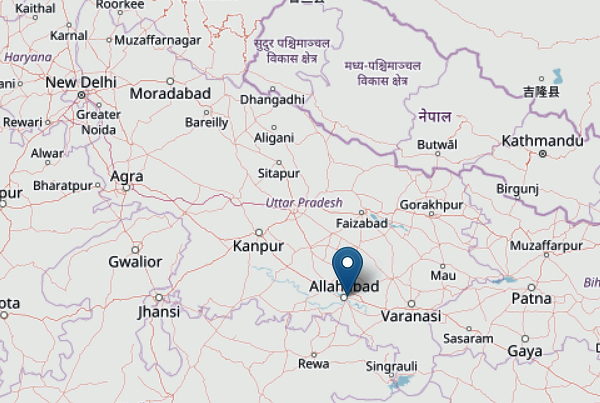
Abb.: Lage von Allahabad (Hindi: इलाहाबाद)
[Bildquelle: © OpenStreetMap-Mitwirkende.
--
CC BY-SA 2.0]
Bihar: Hindi in Devanagari (देवनागरी) Schrift wird offizielle Amtsprache anstelle von Urdu (اُردُو) in persischer Schrift.
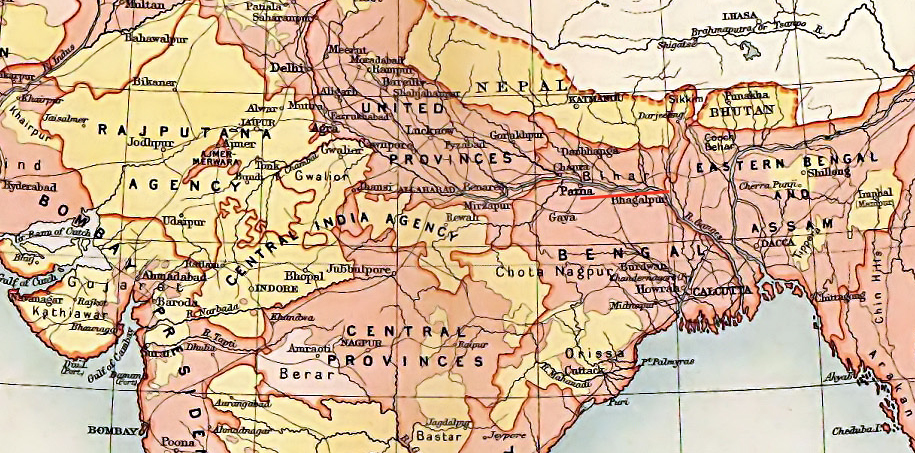
Abb.: Lage von Bihar
[Public domain]]
Agra (Hindi: आगरा): Dayanand Saraswati (Gujarati: દયાનંદ સરસ્વતી, 1824 –1883) gründet die erste Gaurakshini Sabha (Hindi: गौरक्षिणी सभा -- Gesellschaft für Kuhschutz)
Es erscheint:
दयानन्द सरस्वती [Dayanand Saraswati -- Gujarati: દયાનંદ સરસ્વતી] <1824 –1883>: गौकरुणानिधि [Schatz des Mitleids der Kühe]
Abb.: Einbandtitel einer modernen Ausgabe
[Fair use]
Calcutta (Bengali: কলকাতা): es erscheint:
বঙ্কিম চন্দ্র চট্টোপাধ্যায [Bankim Chandra Chattopadhyay] <1838 - 1894>: আনন্দমঠ [Anandamath - Das Kloster der Glückseligkeit]. -- 1882
Englische Übersetzung: The abbey of bliss. -- Online: https://archive.org/details/AnadamathTheAbbeyOfBlissChatterjee01. -- Zugriff am 2018-05-04
Der Roman enthält Vande Mataram (Bengali: বন্দে মাতরম -- ich grüße die Mutter) und ist grundlegend für den Kult von Mutter Indien (Bharat Mata)
Wikipedia:
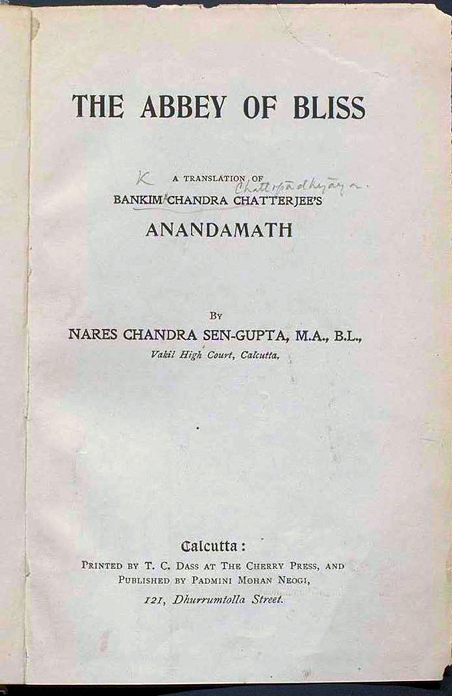
Abb.: Titelblatt einer englischen Übersetzung
Dayanand Saraswati (Gujarati: દયાનંદ સરસ્વતી, 1824 – 1883) gründet die Gaurakshini Sabha (Sanskrit: गौरक्षिणी सभा) -- Gesellschaft zum Schutz der Kuh.
Salem (Tamil: சேலம்): schwere Zusammenstöße zwischen Hindus und Muslimen
zahlreiche Tote
Wikipedia: https://en.wikipedia.org/wiki/Salem_riots_of_1882. -- Zugriff am 2018-04-02
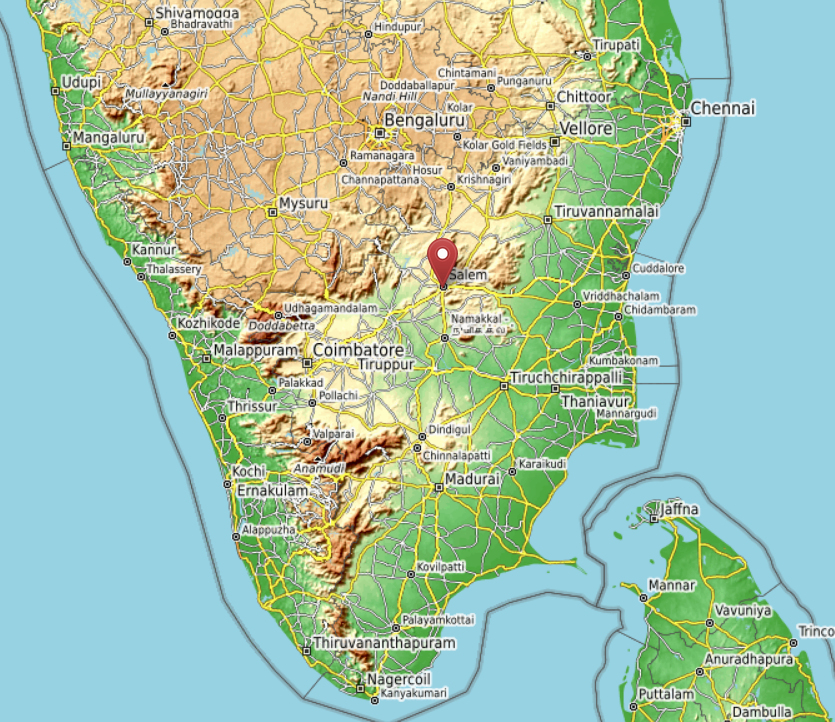
Abb.: Lage von Salem (Tamil: சேலம்)
[Bildquelle: © OpenStreetMap-Mitwirkende.
--
CC BY-SA 2.0]
Allahabad: ein Memorandum empfiehlt der Education Commission
"to declare that, at best, for mass education in the . . . N.-W.P. and Oudh, Hindi [हिन्दी] written in Devanagari [देवनागरी] character is the proper and fittest language, and that it should be introduced in all vernacular primary schools in them, exceptions being made only of those schools which are entirely composed of Mahomedan boys, or the majority of whose pupils are Mahomedans, who object to read Hindi." [Zitiert in: Brass, Paul R. (Richard) <1936 - >: Language, religion and politics in North India. -- Nachdruck der Ausgabe von 1974. -- Licoln : iUniverse, 2005. -- 467 S. -- ISBN 0-595-34394-5. -- S. 131. -- Fair use]
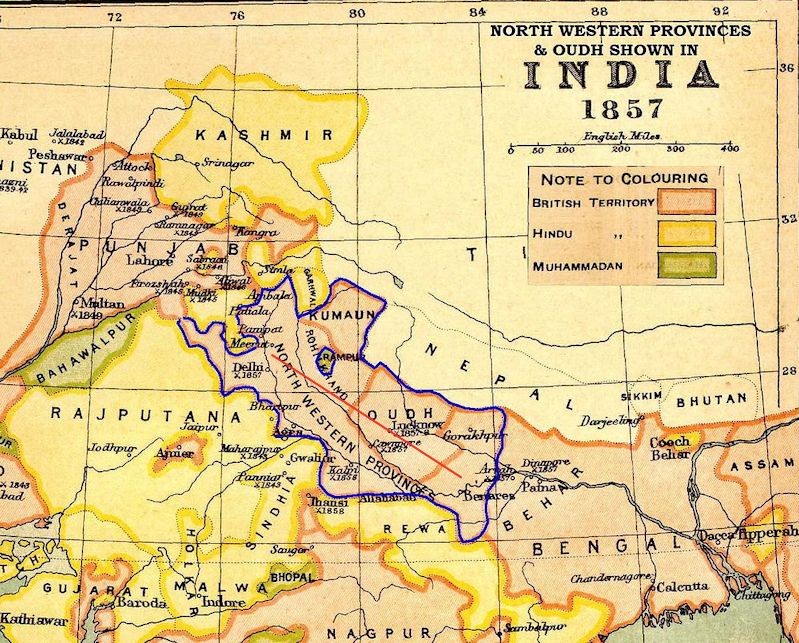
Abb.: Lage der North-Western Provinves & Oudh
[Public domain]
Madan Mohan Malaviya (Hindi: मदनमोहन मालवीय, 1861 - 1946)
Ballia (Hindi: बलिया): Bharatendu Harishchandra (1850 - 1885) hält die Ansprache:
भारतवर्ष की उन्नति कैसे हो सकती है? [How can India be reformed?]
Abb.: Lage von Ballia (Hindi: बलिया)
[Bildquelle: © OpenStreetMap-Mitwirkende. -- CC BY-SA 2.0]
Bombay (Marathi: मुंबई): Gründung des Indian National Congress
Wikipedia: https://de.wikipedia.org/wiki/Indischer_Nationalkongress / https://en.wikipedia.org/wiki/Indian_National_Congress. -- Zugriff am 2018-03-01
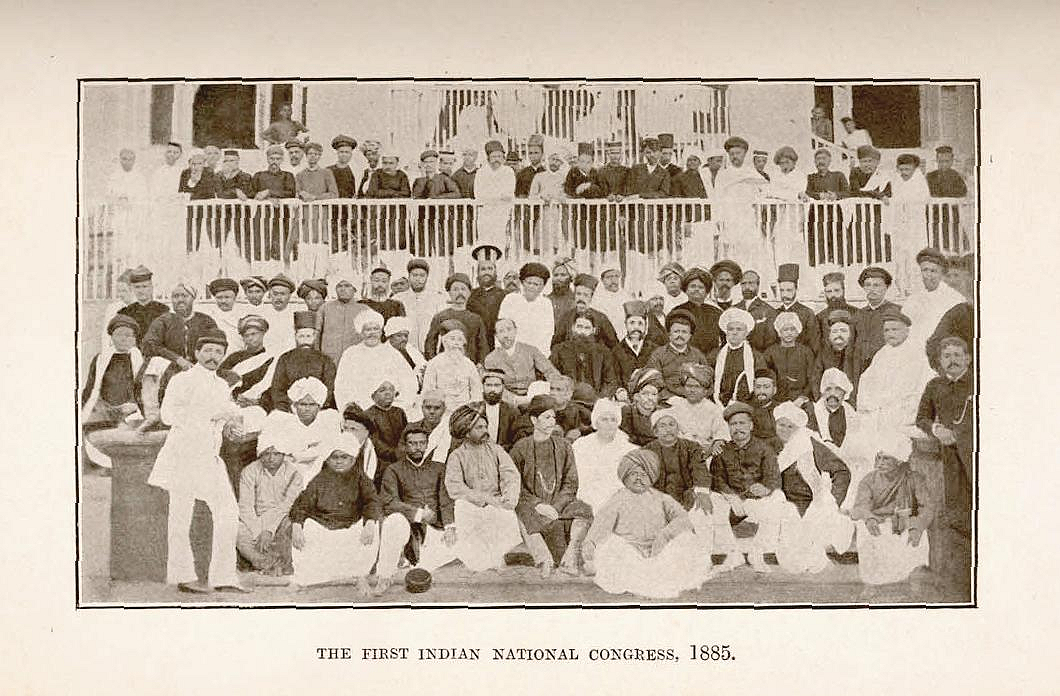
Abb.: First Indian National Congress, 1885
[Public domain]
Syed Ahmad Khan (Urdu: سید احمد خان; 1817 – 1898) gründet die All India Muhammadan Educational Conference
Wikipedia: https://en.wikipedia.org/wiki/All_India_Muhammadan_Educational_Conference. -- Zugriff am 2018-07-09
Der Allahabad High Court entscheidet im Fall Queen-Empress v. Imam Ali and Anor, dass eine Kuh kein "object held sacred" im Sinn von § 295 des Indian Penal Code ist. Als Lebewesen ist eine Kuh weder ein "palace of worship" noch ein "object". Somit fällt Kuhschlachten nicht unter diesen Straftatbestand.
Indian Penal Code 295:
"295. Injuring or defiling place of worship with intent to insult the religion of any class Whoever destroys, damages or defiles any place of worship, or any object held sacred by any class of persons with the intention of thereby insulting the religion of any class of persons or with the knowledge that any class of persons is likely to consider such destruction, damage or defilement as an insult to their religion, shall be punishable with imprisonment of either description for a term which may extend to two years, or with fine, or with both."
Dayanand Saraswati (Gujarati: દયાનંદ સરસ્વતી, 1824 – 1883) im Urteil des presbyterianischen Missionars Hervey De Witt Griswold (1860 - 1945), Lahore (Panjabi: ਲਾਹੌਰ):
"Pandit Dayanand Sarasvati became finally emancipated from the authority of Brahmanism in some such way as Luther became emancipated from the authority of the Church of Rome. Luther appealed from the Roman Church and the authority of tradition to the Scriptures of the Old and New Testament. Pandit Dayanand Sarasvati appealed from the Brahmanical Church and the authority of Smriti to the earliest and most Sacred of Indian Scriptures. The watchword of Luther was ‘ Back to the Bible ’: the watchword of Pandit Dayanand was ‘Back to the Vedas.’ With this religious watchword another watchword was implicitly, if not explicitly, combined, namely‘ India for the Indians.' Combining these two, we have the principle, both religious and political, that the religion of India as well as the Sovereignty of India ought to belong to the Indian people; in other words, Indian religion for the Indians, and Indian Sovereignty for the Indians. In order to accomplish, the first end, Indian religion was to be reformed and purified by a return to the Vedas, and foreign religions as Islam and Christianity were to be extirpated. Thus the program included reform for indigenous religion and extirpation for foreign religion. With regard to the second end, the founder of the Arya Samaj seems to have taught that a return to the pure teachings of the Vedas would gradually fit the people of India for selfrule and that independence would ultimately come to them. I am not charging Pandit Dayanand Sarasvatl with disloyalty. Every sincere well-wisher of India hopes that the time will come when the Indian people through the spread of education and the removal of bad social customs and above all through the prevalence of true religion will be fitted for Self-government. It is evident from all this that Pandit Dayanand Sarasvati was a man of large views. He was a dreamer of splendid dreams. He had a vision of India purged of her superstitions, filled with the fruits of Science, worshipping one God, fitted for self-rule, having a place in the sisterhood of nations, and restored to her ancient glory. All this was to be accomplished by throwing overboard the accumulated superstitions of the centuries and returning to the pure and inspired teachings of the Vedas. Thus the founder of the Arya Samaj was a kind of Indian Elijah or John the Baptist, who felt himself called to turn the hearts of the degenerate children of modern India to their fathers of the glorious Vedic age, to reconcile the present with the past. The character of his mission helps to account for the violence of his methods of controversy. Elijah was not specially gentle in his dealings with the prophets of Baal; nor was Luther very tender toward the Roman Church. In like manner Pandit Dayanand Sarasvati stood with his back to the wall, facing on the one hand the attacks of the Brahmanical hierarchy and on the other the assaults of the foreign religions, Islam and Christianity. Under these circumstances we can hardly wonder that he struck back as hard as he could. Luther dealt heavy blows at the Roman Church as Pandit Dayanand did at the Brahmanical Church. Suppose now that while Luther was fighting with Rome, an extensive and powerful Mohammedan propaganda, which threatened to devour all the fruits of the Reformation, was found all over Europe. What would Luther have done under these circumstances, but smite the apostate Roman Church at home and the Mohammedan propaganda from abroad with impartial zeal and violence and with no great effort to be fair and appreciative. This illustrates exactly Pandit Dayanand’s attitude toward the degenerate Brahmanical Church, on the one hand, and the foreign faiths Christianity and Islam on the other. In his opinion, the one needed to be purged and pruned; the others, to be extirpated. The sections in the Satyarth Prakash which deal with the criticism of Islam and Christianity are evidently intended to be the literature of such extirpation, i.e., to be the means of rooting out all such foreign superstitions from the hearts of the sons of India. For extreme unfairness, for inability to state the position of opponents without caricature, and for general crudeness, these sections can hardly be matched in the whole literature of religious controversy." [Quelle: Indian Evangelical Review, January, 1892. -- Zitiert in: Farquhar, J. N. (John Nicol) <1861 - 1929>: Modern religious movements in India. -- New York : Macmillan, 1915. -- S. 111ff.]
Wikipedia: https://en.wikipedia.org/wiki/Hervey_De_Witt_Griswold. -- Zugriff am 2018-03-13
Benares (Hindi: वाराणसी): Gründung der Nagari Pracharini Sabha -- Hindi: नागरीप्रचारिणी सभा zur Propagierung von Hindi (हिन्दी) und Devanagari-Schrift (Sanskrit: देवनागरी) (anstelle von Hindustani [ہندوستانی] und Perso-Arabischer Schrift [الفبای فارسی])
Wikipedia: https://en.wikipedia.org/wiki/Nagari_Pracharini_Sabha. -- Zugriff am 2018-02-28
Pratap Narayan Mishra (Hindi: प्रतापनारायण मिश्र, 1856 –1894):
"If you truly desire your own welfare
then keep chanting this mantra with one tongue, hindī, hindū, hindustān
whether it attracts or repels the world, brings respect or affront
don’t leave off chanting with one voice, hindī, hindū, hindustān
those who don’t know their own identity are like the living dead
so sing loud this grand mantra, hindī, hindū, hindustān
wise are those who don’t discard their own language, food and clothing
in all its proof of good fortune, hindī, hindū, hindustān."[Übersetzung: Dalmia, Vasudha <1947 - >: The nationalization of Hindu traditions : Bhāratendu Hariścandra and nineteenth-century Banaras. -- 3rd impr. (©1997). -- Ranikhet : Permanent Black, 2017. -- 490 S. -- ISBN 817824304-0. -- S. 27. -- Fair use]
Oxford: es erscheint
Bluntschli, J. K. (Johann Kaspar) <1808 - 1881>: The theory of state. -- 3. ed. -- Oxford : Clarendon, 1895. -- 550 S. -- Online: https://archive.org/details/theoryofstate00blunuoft. -- Zugriff am 2018-03-22. -- Originaltitel: Allgemeine Staatslehre. -- 6. Aufl. -- Stuttgart : Cotta, 1886
Abb.: Titelblatt
Das Werk hat großen Einfluss auf Vinayak Damodar Savarkar (Marathi: विनायक दामोदर सावरकर, 1883 - 1966)
Wikipedia: https://de.wikipedia.org/wiki/Johann_Caspar_Bluntschli. -- Zugriff am 2018-03-22
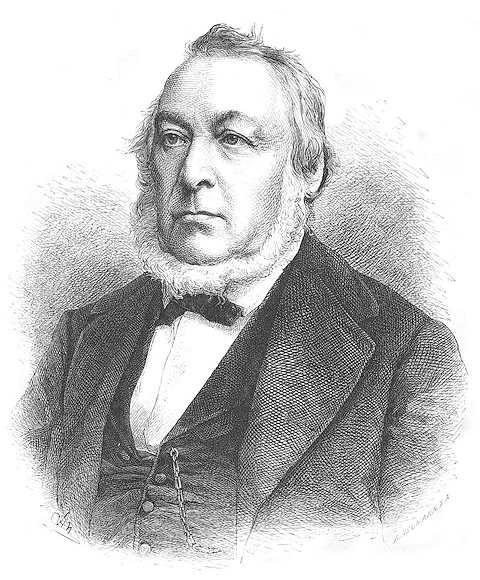
Abb.: Johann Caspar Bluntschli, 1881
[Public domain]
Bal Gangadhar Tilak (Marathi: बाळ गंगाधर टिळक, 1856 - 1920) organisiert erstmals Geburtstagsfeierlichkeiten von Shivaji Maharaj (1630 - 1680). Symbolisch kann man das als Geburtstunde des Hindunationalismus bezeichnen.
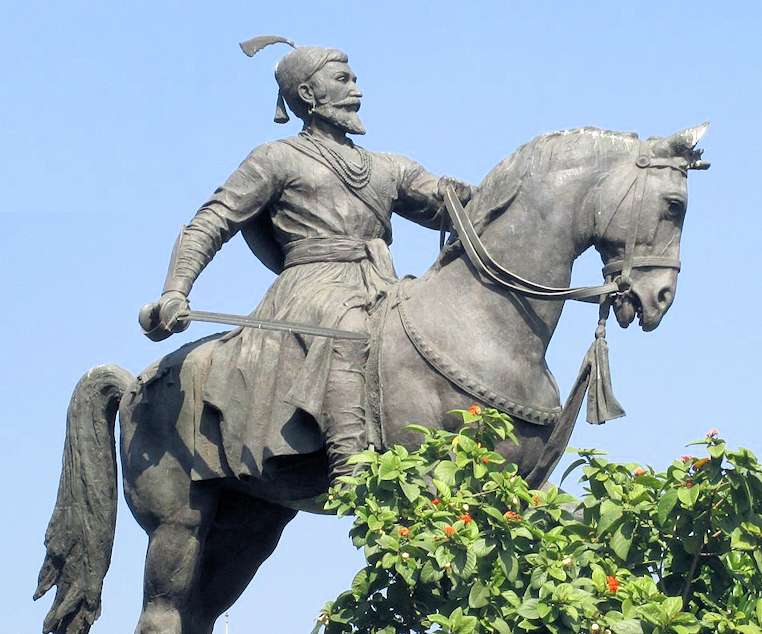
Abb.: Shivaji-Denkmal am Gateway of India, Mumbai, 1980
[Bildquelle: Amit20081980/Wikimedia. --
CC BY-SA 3.0]
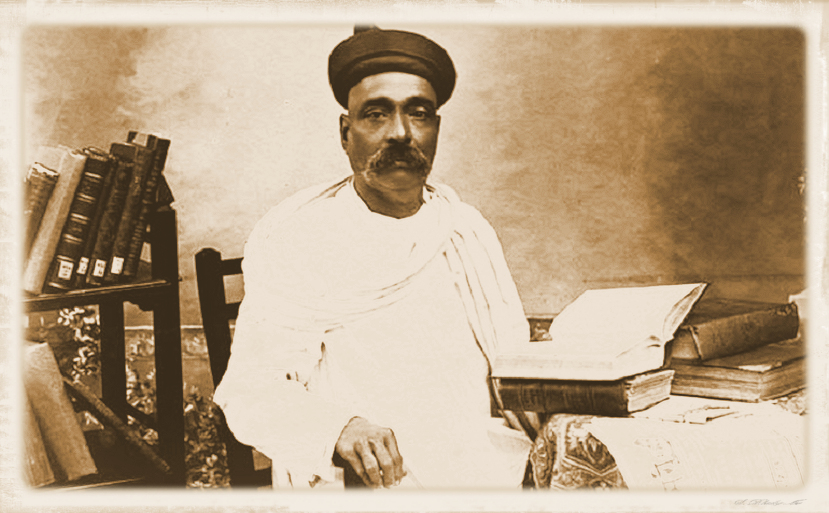
Abb.: Bal Gangadhar Tilak
[Public domain]
Adyar (Tamil: அடையாறு), Madras (Tamil: மெட்ராஸ்): durch Spaltung der Theosophical Society entsteht die Theosophical Society Adyar als selbständige Institution
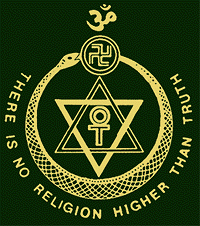
Abb.: ©Logo
[Fair use]
Webpräsenz: http://www.ts-adyar.org/. -- Zugriff am 2018-02-28
Wikipedia: https://de.wikipedia.org/wiki/Theosophische_Gesellschaft_Adyar / https://en.wikipedia.org/wiki/Theosophical_Society_Adyar. -- Zugriff am 2018-02-28
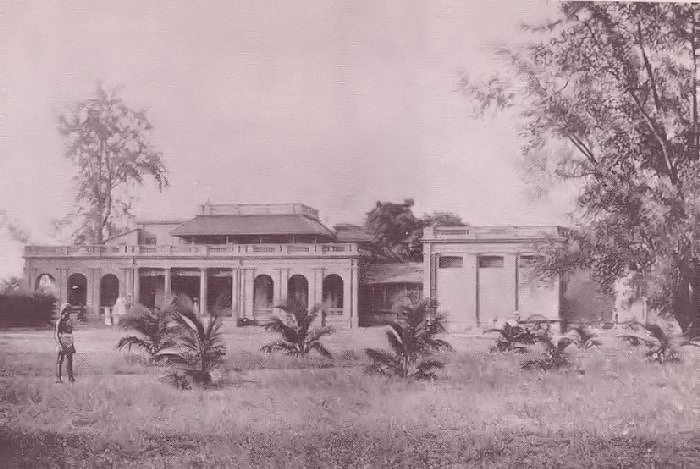
Abb.: Hauptgebäude, 1890
[Public domain]
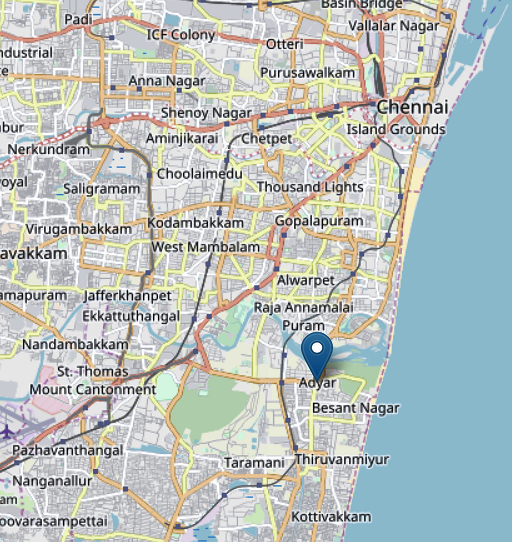
Abb.: Lage von Adyar (Tamil: அடையாறு)
[Bildquelle: © OpenStreetMap-Mitwirkende.
--
CC BY-SA 2.0]
"Die Kuh mit den 84 Gottheiten" - Poster gegen die Kuhschlachtung
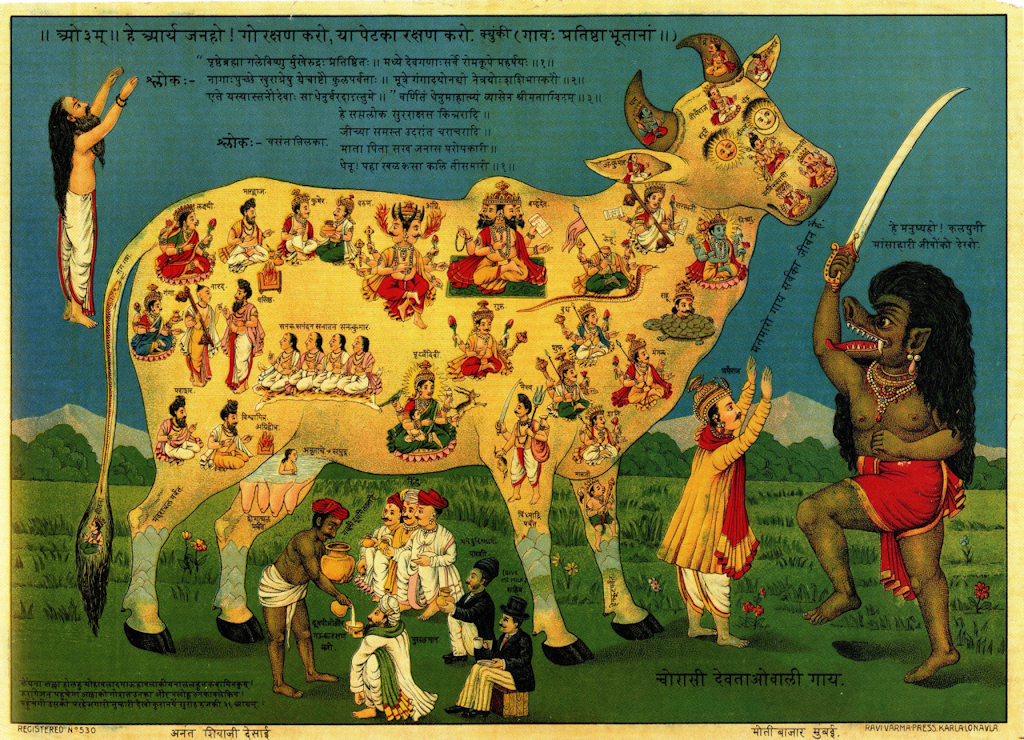
Abb.: Ravi Varma (Malayalam: രവിവമ്മ, 1848 - 1906): "Die Kuh mit den 84
Gottheiten", 1897
[Public domain]
Es erscheint:
[Malaviya, Madan Mohan {Hindi: मदनमोहन मालवीय}] <1861 - 1946>: Court character and primary education in the N.-W. Provonces and Oudh. -- Allahabad : Indian Press, 1897. -- 65 + 100 S. ; folio
Der Autor betont, dass der Gebrauch des Urdu die Grundschulausbildung hindert. Das Urdu (اردو), das an den Gerichten benutzt wird, sei nur unbedeutend anders als das Persisch (فارسی), das es 1837 ersetzte. Es soll statt Urdu Hindi (हिन्दी) in Devanagari-Schrift (देवनागरी) verwendet werden.
Calcutta (Bengali: কলকাতা): Vivekananda (Bengali: বিবেকানন্দ, 1863 - 1902) gründet die Ramakrishna-Mission (Bengali: রামকৃষ্ণ মিশন)
Wikipedia: https://de.wikipedia.org/wiki/Ramakrishna-Mission / https://en.wikipedia.org/wiki/Ramakrishna_Mission. -- Zugriff am 2018-04-16
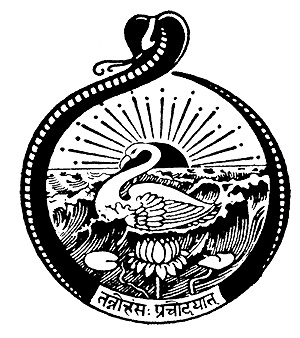
Abb.: ©Logo
[Fair use]
Es erscheint:
ਕਾਨ੍ਹ ਸਿੰਘ ਨਾਭਾ [Kahn Singh Nabha] <1861 - 1931>: ਹਮ ਹਿੰਦੂ ਨਹੀਂ [Wir sind keine Hindus]. -- 1898. -- 185 S. -- Online: http://www.panjabdigilib.org/webuser/searches/displayPageContent.jsp?ID=2409&page=1&CategoryID=1&Searched=%22Hum+Hindu+Nahin%22. -- Zugriff am 2018-06-23 -- "Despite Sikh religion being a distinct religion having its own distinct scripture, church (Gurdwara), history and the distinct identity of its followers, there is widespread ignorance about its distinctiveness. This ignorance is partly due to lack of information among the people of the world about the Sikhs and partly due to the intentional well-planned propaganda by some fundamentalist sections among the Hindus that Sikhism is a part or at the most a sub-sect of Hinduism. This book, written by a celebrated Sikh scholar and an ideologue presents a successful rebuttal to this willful canard being spread against the distinctiveness of Sikh religion and Sikh people. Based on critical analysis of Hindu scriptures and their philosophy in comparison to the Sikh philosophy enshrined the sacred Sikh scripture, and the distinction of Sikh symbols, dress, code of conduct, rites and ceremonies, the author has established that the Sikhs are not the Hindus, but have their own separate, distinct religious and national identity." [a.a.O. -- Fair use]
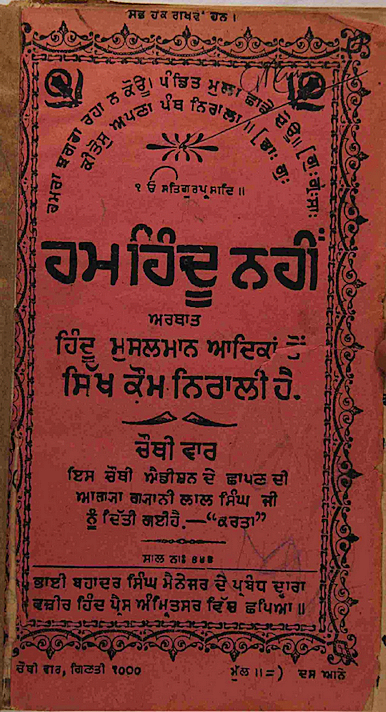
Abb.: Einbandtitel
Benares (Hindi: वाराणसी): Annie Besant (1847 – 1933) gründet das Central Hindu College
Wikipedia: https://en.wikipedia.org/wiki/Central_Hindu_School. -- Zugriff am 2018-03-13
In der Zeitschrift উদ্বোধন [Udbodhana] erscheint auf Bengali:
বিবেকানন্দ [Vivekananda <Swami>] <1863 - 1902>: আধুনিক ভারত [Modern India]. -- Englische Übersetzung: http://www.ramakrishnavivekananda.info/vivekananda/volume_4/translation_prose/modern_india.htm. -- Zugriff am 2018-05-16
Der Schluss dieses Aufsatzes:
"O India! With this mere echoing of others, with this base imitation of others, with this dependence on others this slavish weakness, this vile detestable cruelty — wouldst thou, with these provisions only, scale the highest pinnacle of civilisation and greatness? Wouldst thou attain, by means of thy disgraceful cowardice, that freedom deserved only by the brave and the heroic? O India! Forget not that the ideal of thy womanhood is Sita, Savitri, Damayanti; forget not that the God thou worshippest is the great Ascetic of ascetics, the all-renouncing Shankara, the Lord of Umâ; forget not that thy marriage, thy wealth, thy life are not for sense-pleasure, are not for thy individual personal happiness; forget not that thou art born as a sacrifice to the Mother's altar; forget not that thy social order is but the reflex of the Infinite Universal Motherhood; forget not that the lower classes, the ignorant, the poor, the illiterate, the cobbler, the sweeper, are thy flesh and blood, thy brothers. Thou brave one, be bold, take courage, be proud that thou art an Indian, and proudly proclaim, "I am an Indian, every Indian is my brother." Say, "The ignorant Indian, the poor and destitute Indian, the Brahmin Indian, the Pariah Indian, is my brother." Thou, too, clad with but a rag round thy loins proudly proclaim at the top of thy voice: "The Indian is my brother, the Indian is my life, India's gods and goddesses are my God. India's society is the cradle of my infancy, the pleasure-garden of my youth, the sacred heaven, the Varanasi of my old age." Say, brother: "The soil of India is my highest heaven, the good of India is my good," and repeat and pray day and night, "O Thou Lord of Gauri, O Thou Mother of the Universe, vouchsafe manliness unto me! O Thou Mother of Strength, take away my weakness, take away my unmanliness, and make me a Man!"" [a.a.O. -- Fair use]
Es erscheint anonym:
A Defence of the Urdu language and Character : being a reply to the pamphlet called "Court character and primary education in the N.W. Provinces and Oudh" [1897]. -- Allahabad : Liddel's, 1900. -- 77 S. ; folio
"Though the Hindus, including of course all classes of them, constitute the majority; but it cannot be said that the entire body of them can claim the same political and social importance as the Mohammadans . . . Are these two classes [Hindus and Muslims] then merely to be judged by their quantity and not quality, by their size, and not by their importance, by their bare numbers and not their influence ?" [Zitiert in: Brass, Paul R. (Richard) <1936 - >: Language, religion and politics in North India. -- Nachdruck der Ausgabe von 1974. -- Licoln : iUniverse, 2005. -- 467 S. -- ISBN 0-595-34394-5. -- S. 133. -- Fair use]
Sir Antony Patrick MacDonnell, 1st Baron MacDonnell (1844 - 1925), Lieutnant Governor der North Western Provinces & Oudh, erlaubt den Gebrauch der Devanagari-Schrift (Sanskrit: देवनागरी, neben der bisherigen Perso-Arabischen Schrift [الفبای فارسی]) an den Gerichten.
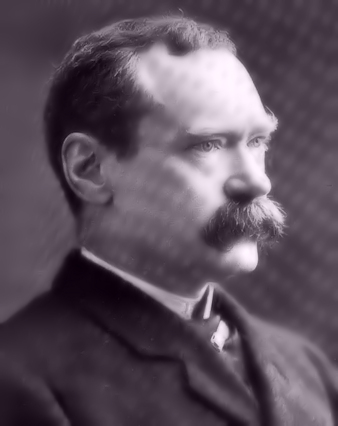
Abb.: Antony Patrick MacDonnell, 1st Baron MacDonnell (1844 - 1925)
[Public domain]
Wikipedia: https://en.wikipedia.org/wiki/Antony_MacDonnell,_1st_Baron_MacDonnell. -- Zugriff am 2018-02-28
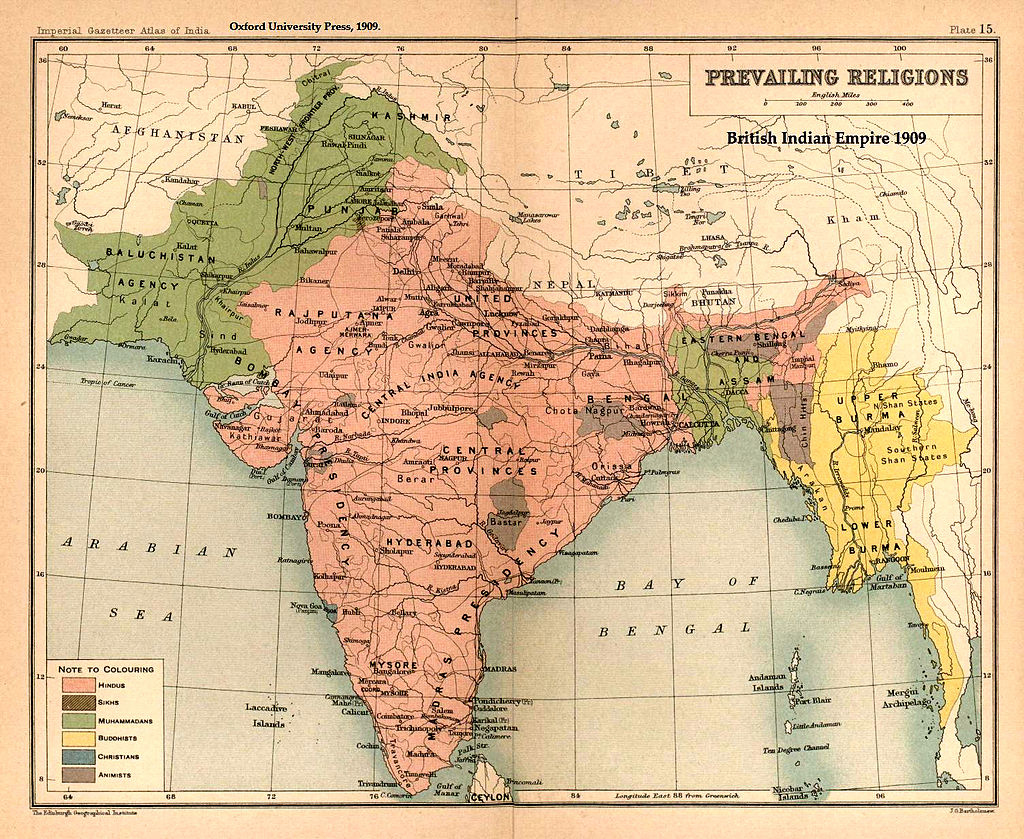
Abb.: Vorherrschende Religionen im British Indian Empire nach dem Census von
1901
[Bildquelle: Public domain]
Benares (Hindi: वाराणसी): es erscheint der Katechismus:
Sanâtana dharma : an elementary text book of Hindu religion and ethics. -- Benares : Central Hindu College, 1902. -- 229 S. -- Online: https://archive.org/details/in.ernet.dli.2015.20734. -- Zugriff am 2018-03-16
Abb.: Titelblatt
"FOREWORD. The Board of Trustees of the Central Hindu College has laid down the following principles on which religious and moral teaching is to be given in all institutions, under its control. The object of the Central Hindu College being to combine Hindu religious and ethical training with the western education suited to the needs of the time, it is necessary that this religious and ethical training shall be of a wide, liberal and unsectarian character, while at the same time it shall be definitely and distinctively Hindu. It must be inclusive enough to unite the most divergent forms of Hindu thought, but exclusive enough to leave outside it forms of thought which are non-Hindu. It must avoid all doctrines which are the subject of controversy between schools recognised as orthodox ; it must not enter into any of the social and political questions of the day ; but it must lay a solid foundation of religion and ethics on which the student may build, in his manhood, the more specialised principles suited to his intellectual and emotional temperament. It must be directed to the building up of a character— pious, dutiful, strong, self-reliant, upright, righteous, gentle and well-balanced—a character which will be that of a good man and a good citizen ; the fundamental principles of religion, governing the general view of life and of life's obligations, are alone sufficient to form such a character. That which unites Hindus in a common faith, must be clearly and simply taught ; all that divides them must be ignored, Lastly, care must be taken to cultivate a wide spirit of tolerance, which not only respects the differences of thought and practice among Hindus, but which also respects the differences of religion among non-Hindus, regarding all faiths with reverence, as roads whereby men approach the Supreme.
Therefore :—
- The religious and ethical instruction must be such as all Hindus can accept.
- It must include the special teachings which mark out Hinduism from other religions.
- It must not include the distinctive views of any special school or sect.
This elementary Text-Book, written in accordance with this scheme, is intended for the use of Hindu boys in the middle and upper sections of the High Schools of India, and is designed to give them a general but correct idea of their national religion, such as may be filled in by fuller study in College and in later life, but will not need to be changed in any essential respects. It contains the fundamental ideas and doctrines which are generally received as orthodox, but does not enter into the details as to which sectarian divisions have arisen. It is believed that while a sectarian parent or teacher will probably make additions to it, he will not find in it anything which he will wish positively to repudiate.
While the book may be placed in the hands of the boys for their own study, it is intended to be simplified by the oral explanations of the teacher, and each chapter serves as an outline on which one or more lessons may be based.
The shlokas given at the end of the chapters should be committed to memory by the boys. They will thus acquire a useful store of sacred authorities on their religion.
The name of this series, Sanâtana Dharma, was chosen after full discussion, as best representing the idea of the fundamental truths presented. It has become somewhat of a sectarian name in some parts of India, but it is here taken only as meaning the eternal religion.
That this book may prove useful in laying a firm foundation of right thinking in the minds of Hindu youths, and may help in shaping them into pious, moral, loyal and useful citizens of their mother-land and of the empire, is the prayer with which its compilers send it forth to the world."
[a.a.O., S. v - vii]
Gründung der Chief Khalsa Diwan -- Panjabi: ਚੀਫ਼ ਖਾਲਸਾ ਦੀਵਾਨ
Wikipedia: https://en.wikipedia.org/wiki/Chief_Khalsa_Diwan. -- Zugriff am 2018-07-09
Webpräsenz: http://www.chiefkhalsadiwan.com/index.php. -- Zugriff am 2018-07-09
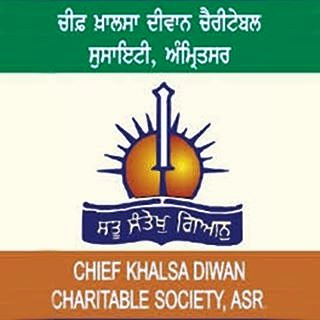
Abb.: ©Logo
[Fair use]
Haridwar (Hindi: हरिद्वार): Arya Samajis gründen Gurukul Kangri (Hindi: गुरुकुल कांगड़ी)
Wikipedia:
https://en.wikipedia.org/wiki/Gurukul_Kangri_Vishwavidyalaya. -- Zugriff am
2018-05-03
Webpräsenz: http://www.gkv.ac.in/. --
Zugriff am 2018-05-03
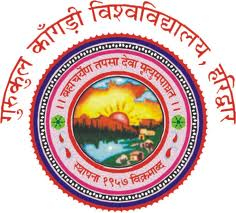
Abb.: ©Logo
[Fair use]
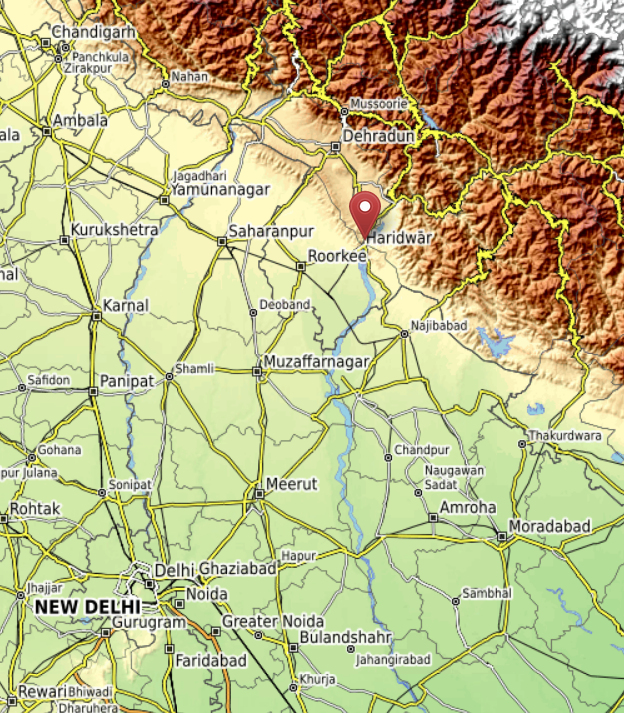
Abb.: Lage von Haridwar (Hindi: हरिद्वार)
[Bildquelle: © OpenStreetMap-Mitwirkende.
--
CC BY-SA 2.0]
Aligarh (Hindi: अलीगढ़, Urdu: علی گڑھ ): Gründung der Anjuman Taraqqī-yi-Urdū (Urdu: انجُمن ترقئ اُردو) zur Förderung von Urdu.
Wikipedia: https://en.wikipedia.org/wiki/Anjuman-i_Taraqqi-i_Urdu. -- Zugriff am 2018-07-09
Webpräsenz: http://www.atuh.org/. -- Zugriff am 2018-07-09
Vinayak Damodar Savarkar (Marathi: विनायक दामोदर सावरकर, 1883 - 1966) gründet die Geheimgesellschaft Abhinav Bharat -- अभिनव भारत् ("Erneuertes Indien")
"The Oath of The Abhinav Bharat In the name of God,
I,... Convinced that without Absolute Political Independence or Swarajya my country can never rise to the exalted position among the nations of the earth which is Her due,
In the name of Bharat Mata,
In the name of all the Martyrs that have shed their blood for Bharat Mata,
By the Love, innate in all men and women, that I bear to the land of my birth,
Wherein the sacred ashes of my forefathers, and which is the cradle of my children,
By the tears of Hindi Mothers for their children whom the Foreigner has enslaved, imprisoned, tortured, and killed,
And Convinced also that that Swarajya can never be attained except by the waging of a bloody and relentless war against the Foreigner,Solemnly and sincerely Swear that I shall from this moment do everything in my power to fight for Independence and place the Lotus Crown of Swaraj on the head of my Mother;
And with this object, I join the Abhinav Bharat, the revolutionary Society of all Hindusthan, and swear that I shall ever be true and faithful to this my solemn Oath, and that I shall obey the orders of this body; If I betray the whole or any part of this solemn Oath, or if I betray this body or any other body working with a similar object,
May I be doomed to the fate of a perjurer!"
[Zitiert in: Godbole, V. S. (Vasudev Shankar) [वासुदेव शंकर गोडबोले] <1941 - >: Rationalism of Veer Savarkar. -- Thane : Itihas Patrika, 2004. -- 696 S. ; 23 cm. -- Online: https://archive.org/details/RationalismOfVeerSavarkarGodboleV.S. -- Zugriff am 2018-05-15. -- S. 685. -- Fair use]
Teilung Bengalens in vorwiegend muslimisches East Bengal and Assam und vorwiegend hinduistisches Bengal. Dies führt zu starken Protesten. Deshalb wird Bengalen 1911-12-12 wieder vereinigt.
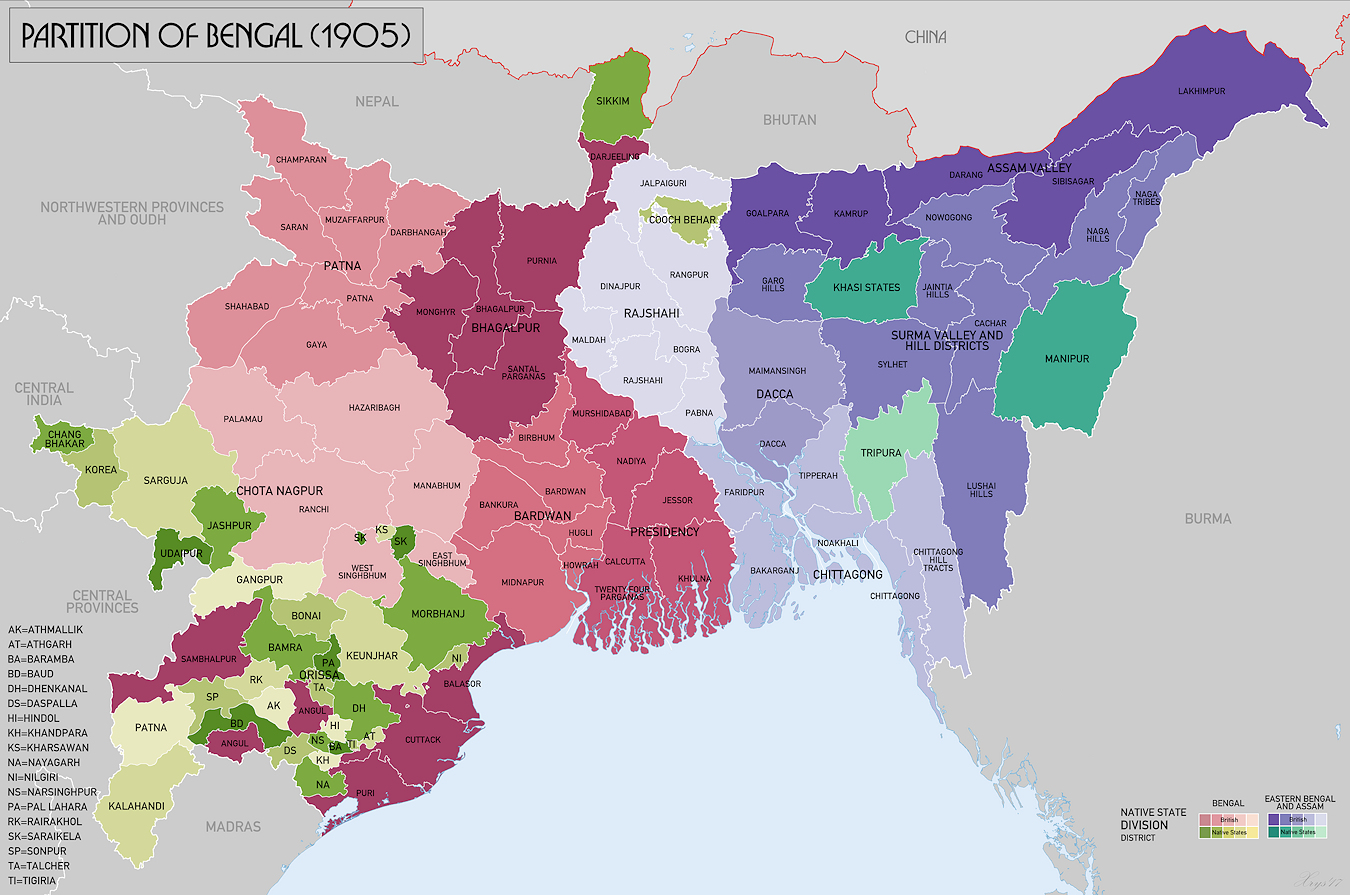
Abb.: Teilung Bengalens in Bengal und Eastern Bengal and Assam, 1905
[Bildquelle: XrysD/Wikimedia. --
CC BY-SA 4.0]
Wikipedia: https://de.wikipedia.org/wiki/Teilung_Bengalens_1905 / https://en.wikipedia.org/wiki/Partition_of_Bengal_(1905) -- Zugriff am 2018-03-02
Gründung der nationalistischen Terroristenorganisation Anushilan Samiti -- Bengali: অনুশীলন সমিতি ("Praxis-Vereinigung"). Aufgelöst 1938
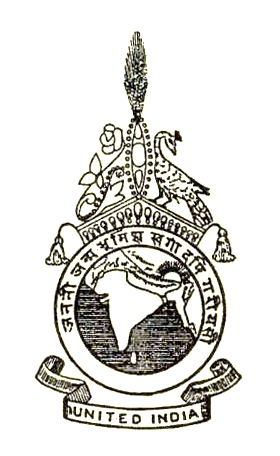
Abb.: Logo
Wikipedia: https://en.wikipedia.org/wiki/Anushilan_Samiti. -- Zugriff am 2018-03-22
Ajmer (Hindi: अजमेर): es erscheint:
Sarda, Har Bilas [हरविलास शारदा] <1867 - 1955>: Hindu superiority : an attempt to determine the position of the Hindu race in the scale of nations. -- Ajmer : Rajputana Printing Works, 1906. -- 454 S. : Ill. -- Online: https://archive.org/details/hindusuperiority00sarduoft. -- Zugriff am 2018-03-15
Wikipedia: https://en.wikipedia.org/wiki/Har_Bilas_Sarda. -- Zugriff am 2018-03-15
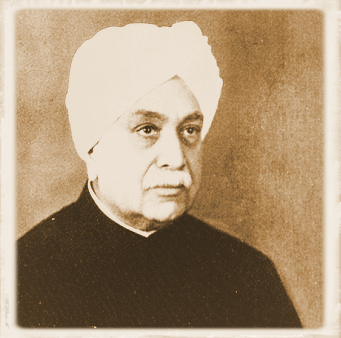
Abb.: Har Bilas Sarda -- Hindi: हरविलास शारदा
[Fair use]
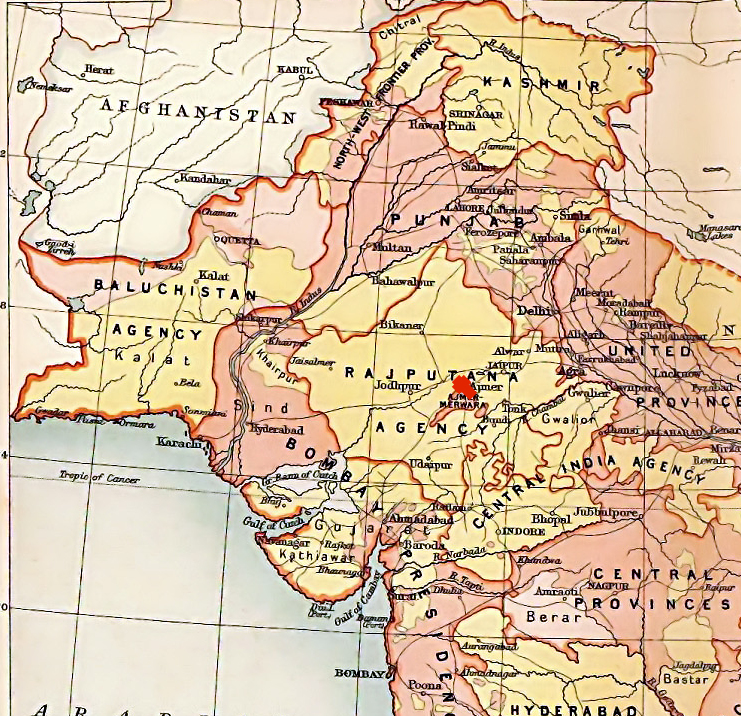
Abb.: Lage von Ajmer (Hindi: अजमेर)
[Public domain]
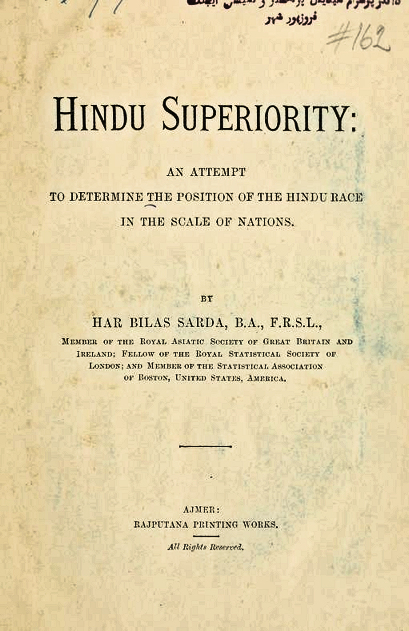
Abb.: Titelblatt
Inhaltsverzeichnis:
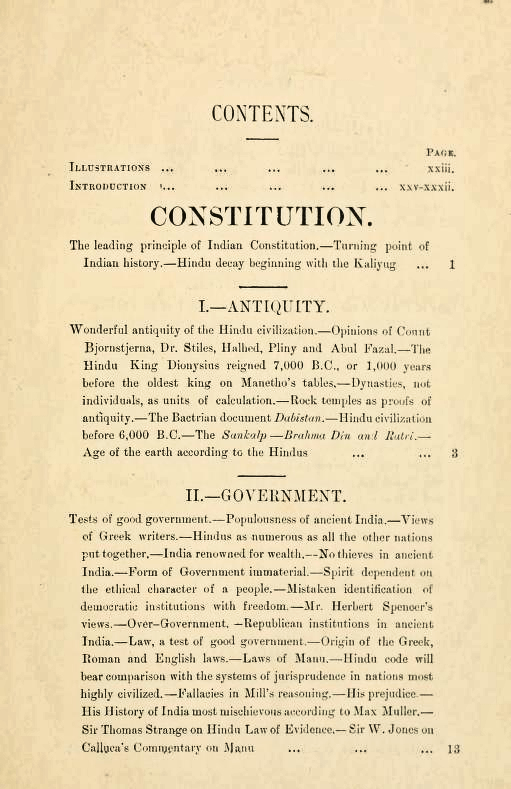 |
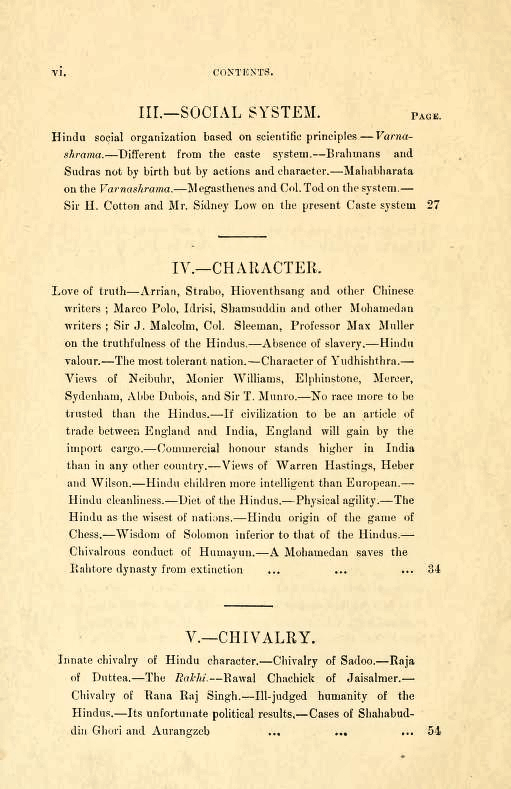 |
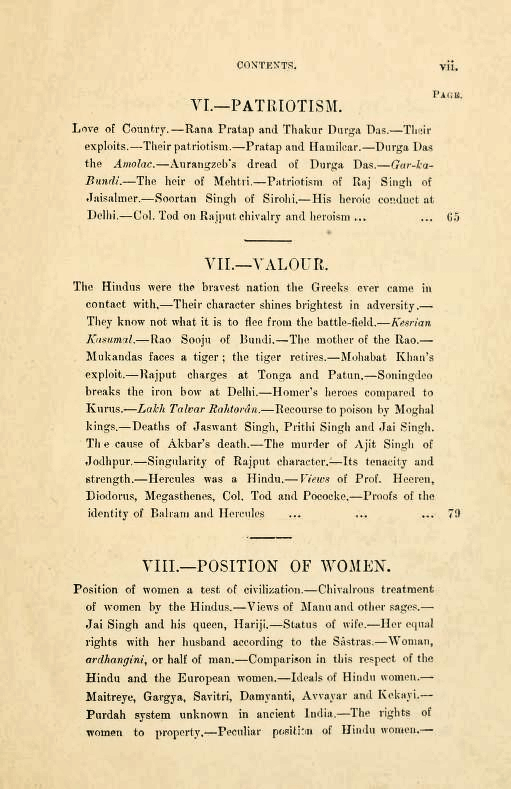 |
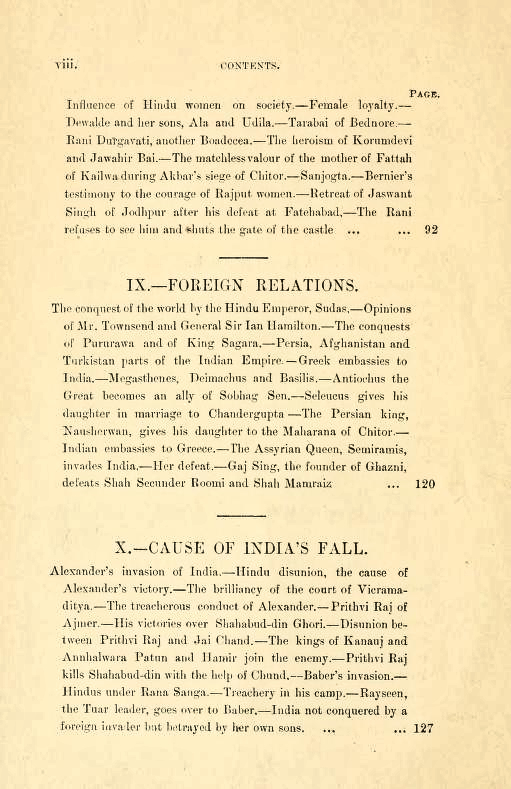 |
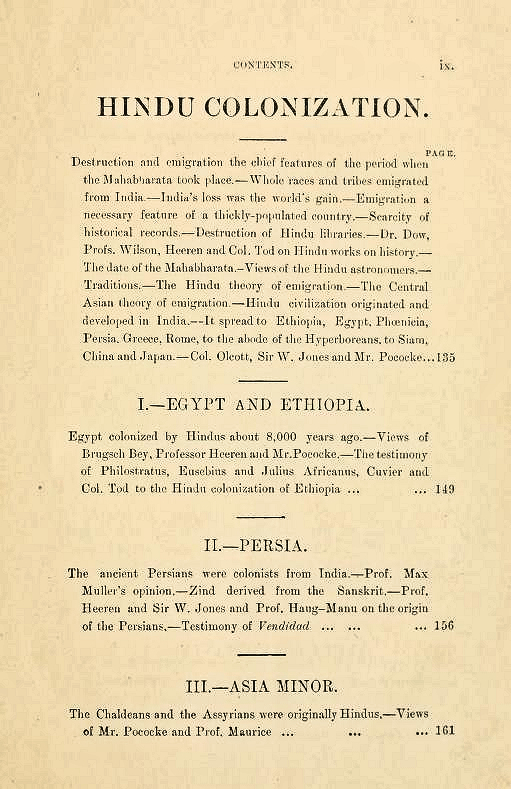 |
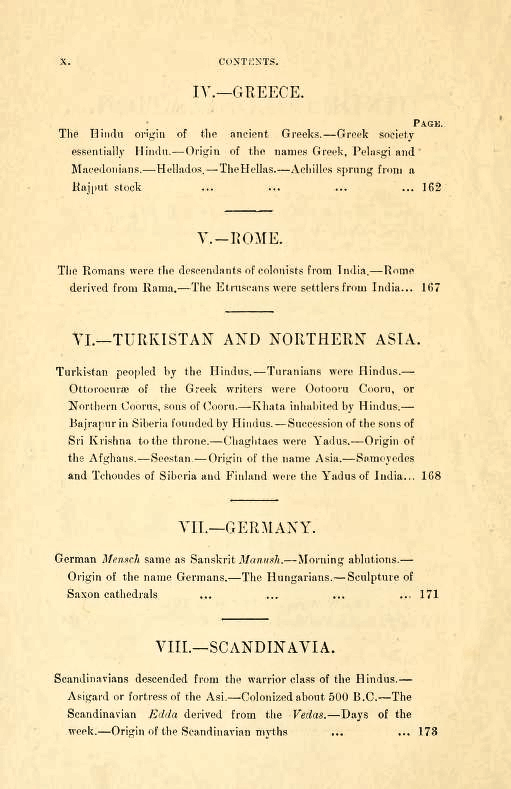 |
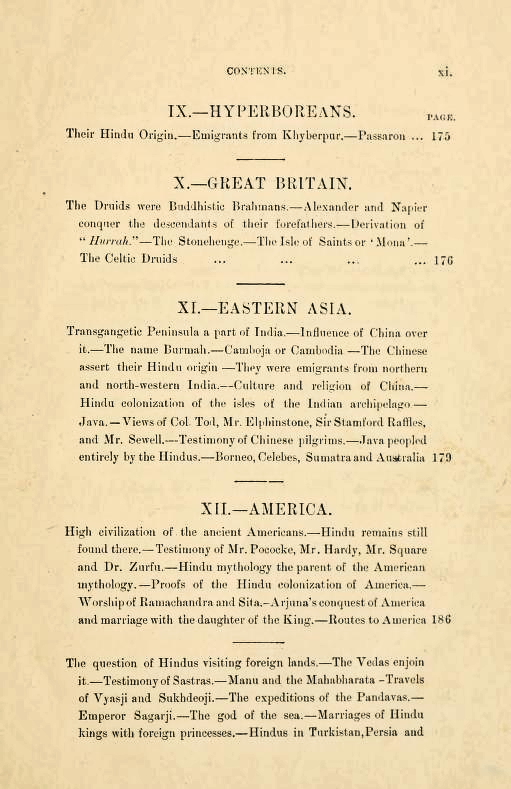 |
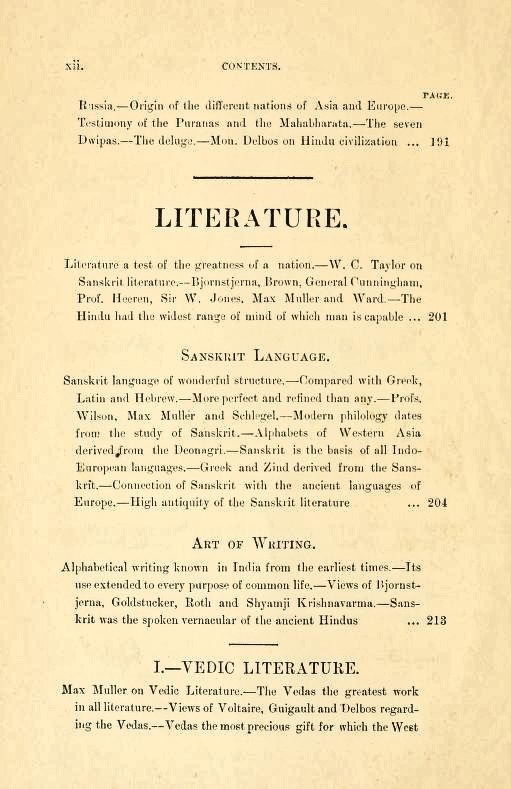 |
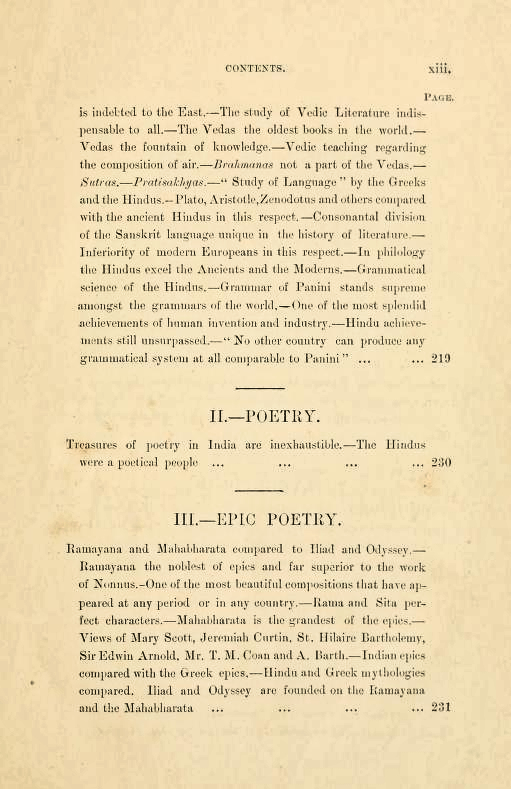 |
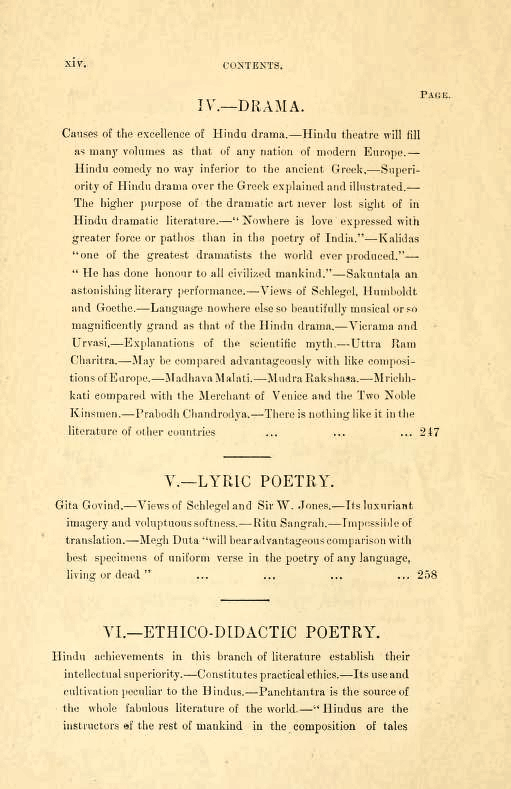 |
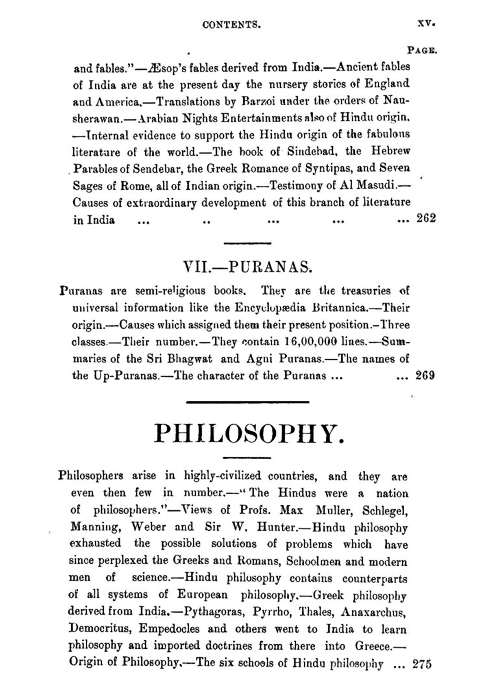 |
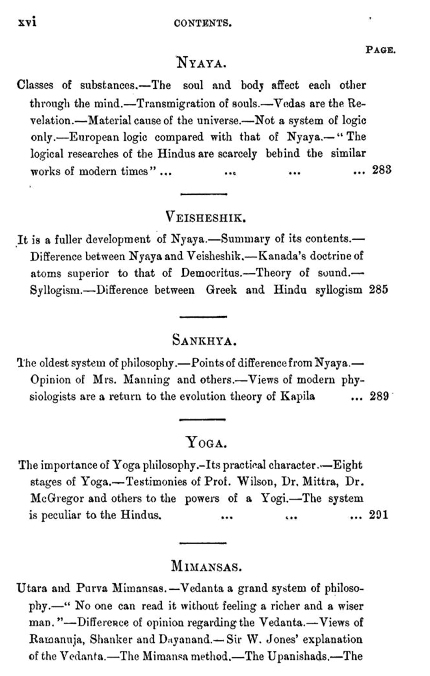 |
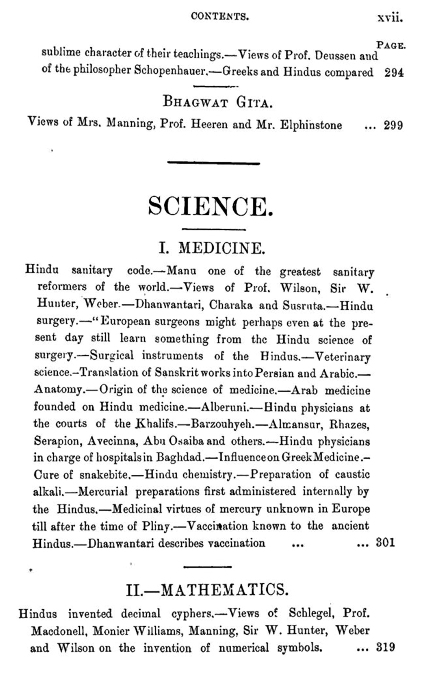 |
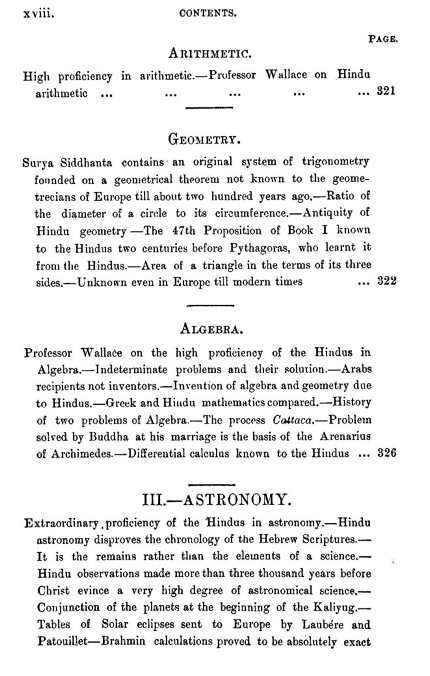 |
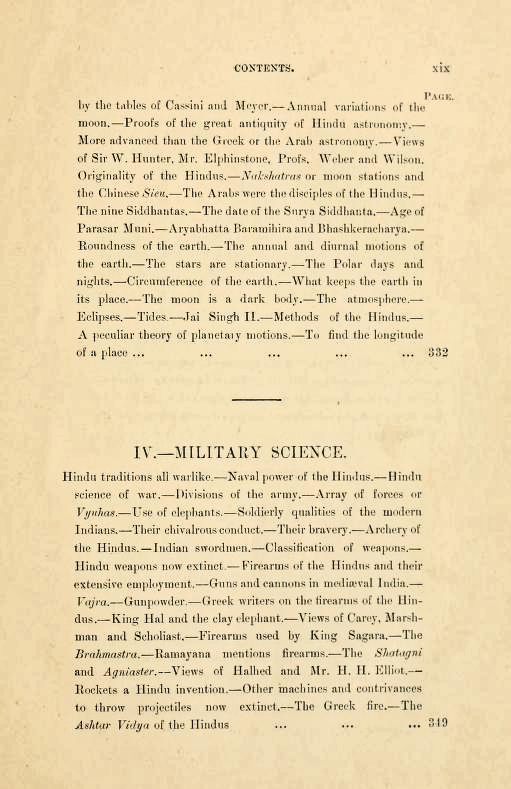 |
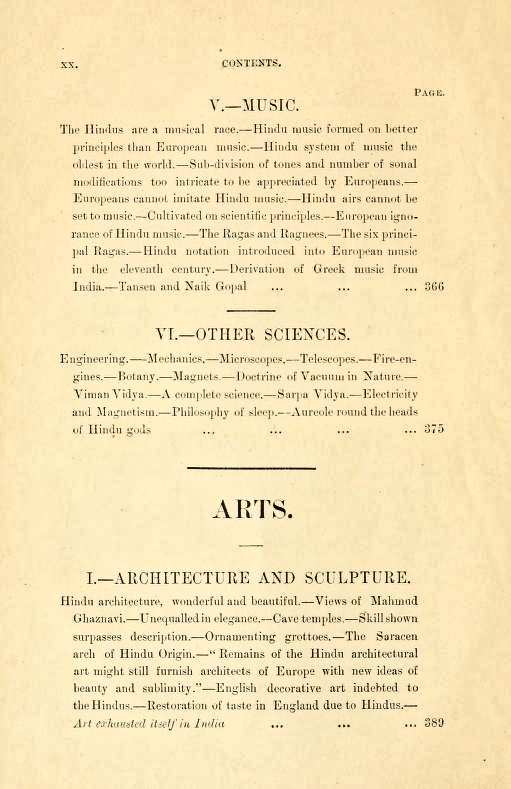 |
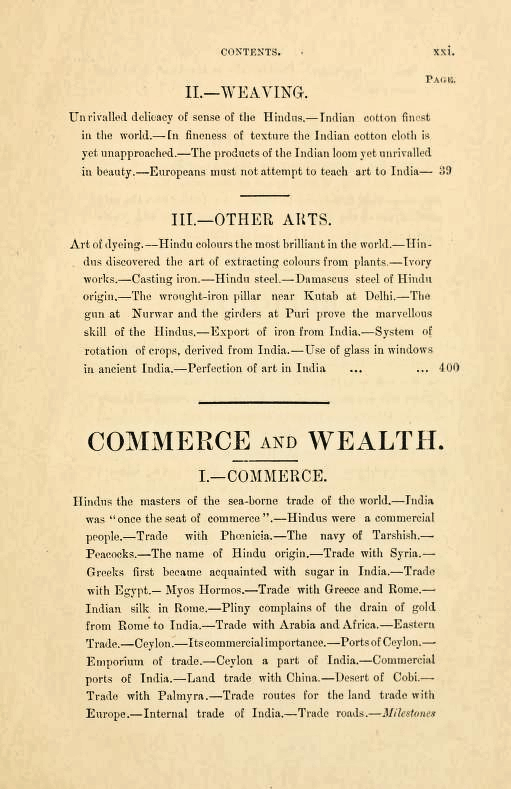 |
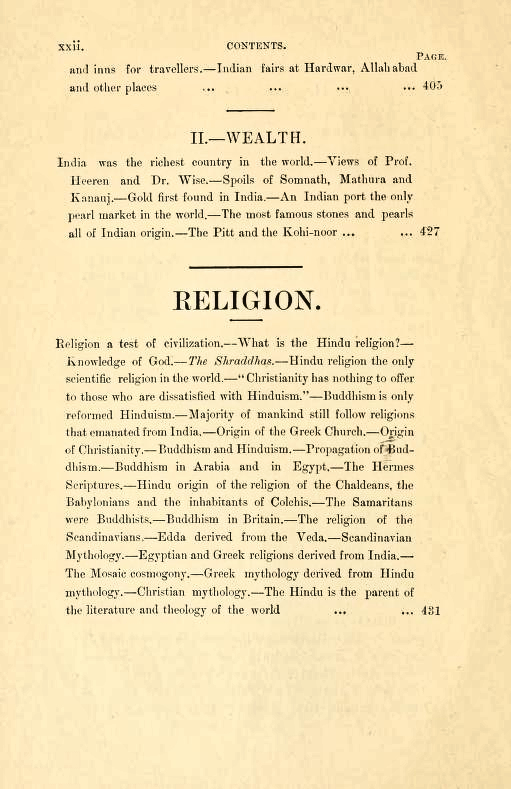 |
Dacca (Bengali: ঢাকা): Gründung der All-India Muslim League -- Urduآل انڈیا مسلم لیگ
Wikipedia: https://de.wikipedia.org/wiki/Muslimliga / https://en.wikipedia.org/wiki/All-India_Muslim_League. -- Zugriff am 2018-03-01
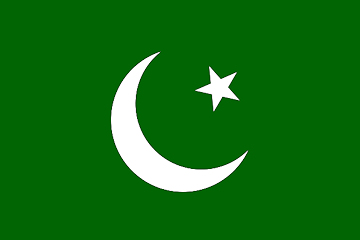
Abb.: ©Fahne
[Fair use]
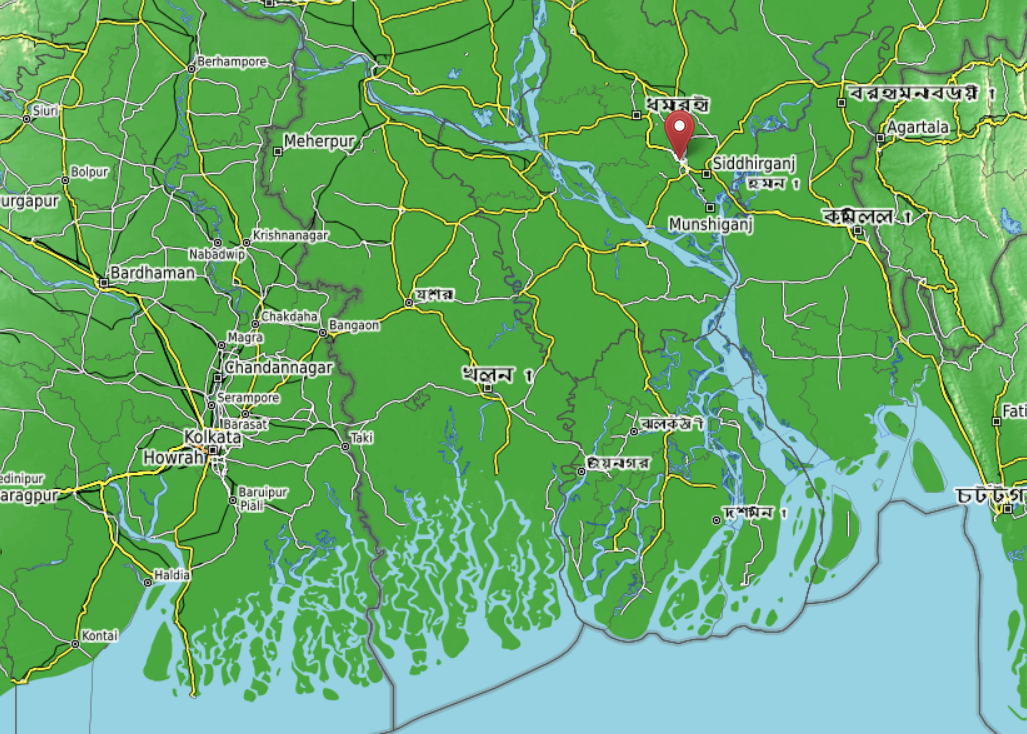
Abb.: Lage von Dacca (Bengali: ঢাকা)
[Bildquelle: © OpenStreetMap-Mitwirkende.
--
CC BY-SA 2.0]
Im Punjab (Panjabi: ਪੰਜਾਬ) werden zahlreiche Hindu Sabhas (Panjabi: ਹਿਨ੍ਦੂ ਸਭਾ) gegründet, meist auf Initiative von Arya Samajis.
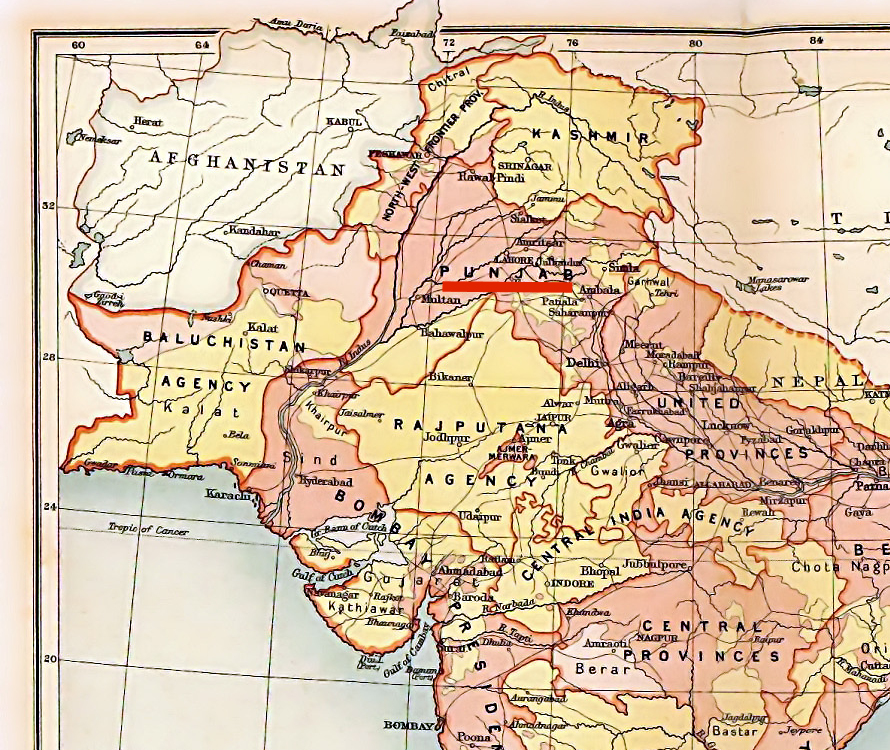
Abb.: Lage des Punjab (Panjabi: ਪੰਜਾਬ), 1909
[Public domain]
Annie Besant (1847 - 1933) wird Präsidentin der Theosophical Society Adyar
Wikipedia: https://de.wikipedia.org/wiki/Annie_Besant / https://en.wikipedia.org/wiki/Annie_Besant. -- Zugriff am 2018-02-28
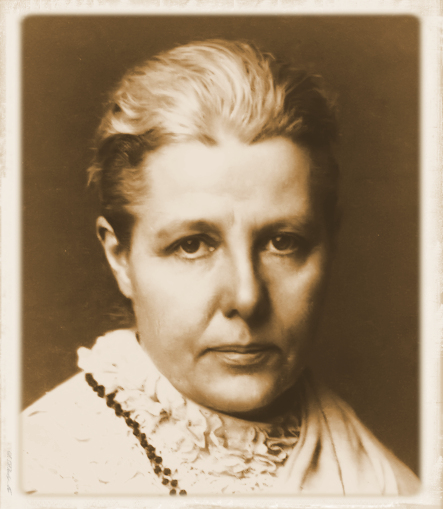
Abb.: Annie Besant, ca. 1897
[Public domain]
Lahore (Panjabi: ਲਾਹੌਰ): es erscheint anonym in der Zeitschrift The Punjabee in Fortsetzungen
[Lal Chand] <1852 - 1912>: Self-abnegation in politics. -- Online: https://archive.org/details/in.ernet.dli.2015.66055. -- Zugriff am 2018-03-15
"It is full three months since I published my first letter under the heading which marks the present tenth in number. Several criticisms have appeared since then—some agreeing and some disagreeing with the views expressed by me. I have purposely avoided noticing the adverse criticisms as I had a set object in view. I wished to make my position clear by quoting a few prominent instances of how the Hindu community had suffered under the present policy. I also intended and I have evidently succeeded partly to instill into the Hindu mind what some people choose to call sectarianism; but which I regard as the very breath of life, viz., that a Hindu should not only believe but make it a part and parcel of his organism, of his life and of his conduct, that he is a Hindu first and an Indian after. Here I wished to reverse the dominant idea propounded by the Congress that we are Indians first and Hindus next, and that even if need should be. I therefore attacked the Congress and I did so deliberately. For to my mind the fundamental idea on which the Congress began its work and has carried on its propaganda was that of a united Indian nation as the basal premises of all reforms." [a.a.O., letter no. X.]
"This then shortly is the plan I advocate and the course I propose to adopt:
- the substitution of Hindu Sabhas for Congress Committees,
- of a Hindu Press for the Congress Press,
- organisation of a Hindu Defence Fund with regular office and machinery for collecting information and seeking redress by self-help, self-amelioriations and petitions and memorials supplemented by agitation in the Press and advocacy through trusted leaders in matters both special and common but dominated primarily by regard for Hindu interests.
In other words, there ought to be political agitation conducted in the interests of purely Hindu cause within reasonable and legitimate and practicable bounds, avoiding all claims such as are purely visionary or affect the distant future and at present prove merely a source of friction and irritation such as is needlessly offensive. Our aim ought to be to ameliorate our present condition and the condition in the near future and not to arrogate to ourselves the task that belongs to distant future and all future times. We have no right to define the work for future generations when we do not know and cannot say what will suit them or not. All such attempt is, therefore, a mere waste of energy that may better be utilised otherwise."
[a.a.O., letter no. XV.]
London: es erscheint anonym:
[Savarkar, Vinayak Damodar -- Marathi: विनायक दामोदर सावरकर <1883 - 1966>]: The Indian war of independence of 1857 / by an Indian nationalist. -- London, 1909. -- 451 S. -- Online: https://archive.org/details/ldpd_6260651_000. -- Zugriff am 2018-05-03
Wikipedia: https://en.wikipedia.org/wiki/The_Indian_War_of_Independence_(book). -- Zugriff am 2018-05-03
Lala Lajpat Rai (1865 - 1928) (Punjabi: لالا لاجپت رائے) über die Gründung einer Punjab Hindu Sabha:
"In my opinion it should be the business of a Hindu Congress or Conference to support and take so far as possible such steps which might conduct to their unity and strength as a religious nationality, as for instance, the language question, the question of character, the advisibility of having common text-books, the teaching of Sanskrit language and literature all over India, the taking of steps which might lead to the protection of Hindu orphans from the bands of proselytising agencies of other denominations (...) In the present struggle between Indian communities, I will be a Hindu first and an Indian afterwards, but outside India, or even in India against non-Indians I am and shall ever be an Indian first and a Hindu afterwards." [Zitiert in: Jaffrelot, Christophe <1964 - >: The Hindu nationalist movement in India. -- New York : Columbia Univ. Pr., 1996. -- 592 S. : Ill. -- Originaltitel: Les nationalistes hindous (1993). -- S. 84, Anm. 14. -- Fair use]
Uttarpara (Bengali: উত্তরপাড়া): Rede von Aurobindo Ghose (Bengali: অরবিন্দ ঘোষ, 1872 - 1950):
"This then is what I have to say to you. The name of your society is "Society for the Protection of Religion". Well, the protection of the religion, the protection and upraising before the world of the Hindu religion, that is the work before us. But what is the Hindu religion ? What is this religion which we call Sanatan, eternal ? It is the Hindu religion only because the Hindu nation has kept it, because in this Peninsula it grew up in the seclusion of the sea and the Himalayas, because in this sacred and ancient land it was given as a charge to the Aryan race to preserve through the ages. But it is not circumscribed by the confines of a single country, it does not belong peculiarly and for ever to a bounded part of the world. That which we call the Hindu religion is really the eternal religion, because it is the universal religion which embraces all others. If a religion is not universal, it cannot be eternal. A narrow religion, a sectarian religion, an exclusive religion can live only for a limited time and a limited purpose. This is the one religion that can triumph over materialism by including and anticipating the discoveries of science and the speculations of philosophy. It is the one religion which impresses on mankind the closeness of God to us and embraces in its compass all the possible means by which man can approach God. It is the one religion which insists every moment on the truth which all religions acknowledge that He is in all men and all things and that in Him we move and have our being. It is the one religion which enables us not only to understand and believe this truth but to realise it with every part of our being. It is the one religion which shows the world what the world is, that it is the Lila of Vasudeva. It is the one religion which shows us how we can best play our part in that Lila, its subtlest laws and its noblest rules. It is the one religion which does not separate life in any smallest detail from religion, which knows what immortality is and has utterly removed from us the reality of death. This is the word that has been put into my mouth to speak to you today. What I intended to speak has been put away from me, and beyond what is given to me I have nothing to say. It is only the word that is put into me that I can speak to you. That word is now finished. I spoke once before with this force in me and I said then that this movement is not a political movement and that nationalism is not politics but a religion, a creed, a faith. I say it again today, but I put it in another way. I say no longer that nationalism is a creed, a religion, a faith; I say that it is the Sanatan Dharma which for us is nationalism. This Hindu nation was born with the Sanatan Dharma, with it it moves and with it it grows. When the Sanatan Dharma declines, then the nation declines, and if the Sanatan Dharma were capable of perishing, with the Sanatan Dharma it would perish.
The Sanatan Dharma, that is nationalism.
This is the message that I have to speak to you."[Quelle: http://intyoga.online.fr/uttaspch.htm. -- Zugriff am 2018-04-17. -- Fair use]
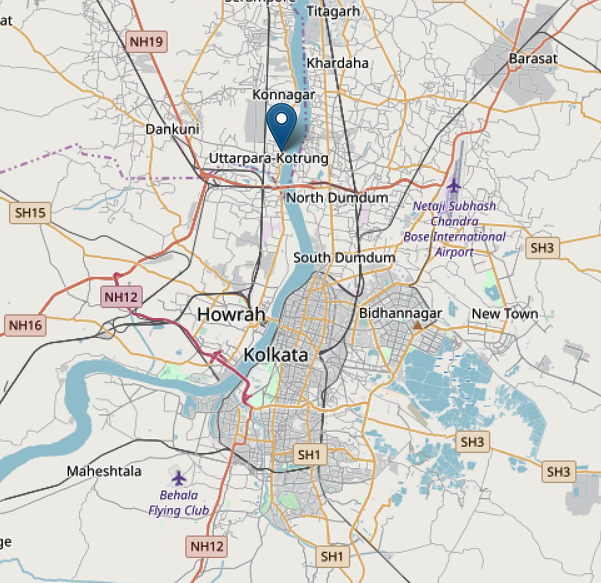
Abb.: Lage von Uttarpara (Bengali: উত্তরপাড়া)
[Bildquelle: © OpenStreetMap-Mitwirkende.
--
CC BY-SA 2.0]
Es erscheint:
Gandhi, Mohandas Karamchand [મોહનદાસ કરમચંદ ગાંધી] <1869 - 1948>: Indian Home Rule. -- Phoenix : International Print. Press, 1910. -- 104 S. ; 15 cm. -- "Being a translation of "Hind Swaraj" [Gujarati: હિન્દ સ્વરાજ] (Indian home rule), published in the Gujarati columns of Indian Opinion, 11th and 18th Dec., 1909.". -- Online: https://en.wikisource.org/wiki/Indian_Home_Rule. -- Zugriff am 2018-05-18
Wikipedia: https://en.wikipedia.org/wiki/Hind_Swaraj_or_Indian_Home_Rule. -- Zugriff am 2018-05-18
Abb.: Einbandtitel
"Chapter XIII
What is True Civilization?
Reader: You have denounced railways, lawyers and doctors. I can see that you will discard all machinery. What, then, is civilization?
Editor: The answer to that question is not difficult. I believe that the civilization India has evolved is not to be beaten in the world. Nothing can equal the seeds sown by our ancestors. Rome went, Greece shared the same fate, the might of the Pharaohs was broken, Japan has become westernised, of China nothing can be said, but India is still, somehow or other, sound at the foundation. The people of Europe learn their lessons from the writings of the men of Greece or Rome, which exist no longer in their former glory. In trying to learn from them, the Europeans imagine that they will avoid the mistakes of Greece and Rome. Such is their pitiable condition. In the midst of all this India remains immovable, and that is her glory. It is a charge against India that her people are so uncivilised, ignorant and stolid, that it is not possible to induce them to adopt any changes. It is a charge really against our merit. What we have tested and found true on the anvil of experience, we dare not change. Many thrust their advice upon India, and she remains steady. This is her beauty; it is the sheet anchor of our hope.Civilization is that mode of conduct which points out to man the path of duty. Performance of duty and observance of morality are convertible terms. To observe morality is to attain mastery over our mind and our passions. So doing, we know ourselves. The Gujarati equivalent for civilization means "good conduct."
If this definition be correct, then India, as so many writers have shown, has nothing to learn from anybody else, and this is as it should be. We notice that mind is a restless bird; the more it gets the more it wants, and still remains unsatisfied. The more we indulge our passions, the more unbridled they become. Our ancestors, therefore, set a limit to our indulgences. They saw that happiness was largely a mental condition. A man is not necessarily happy because he is rich, or unhappy because he is poor. The rich are often seem to be unhappy, the poor to be happy. Millions will always remain poor. Observing all this, our ancestors dissuaded us from luxuries and pleasures. We have managed with the same kind of plough as it existed thousands of years ago. We have retained the same kind of cottages that we had in former times and our indigenous education remains the same as before. We have had no system of life-corroding competition. Each followed his own occupation or trade, and charged a regulation wage. It was not that we did not know how to invent machinery, but our forefathers knew that, if we set our hearts after such things, we would become slaves and lose our moral fibre. They, therefore, after due deliberation, decided that we should only do what we could with our hands and feet. They saw that our real happiness and health consisted in a proper use of our hands and feet. They further reasoned that large cities were a snare and a useless encumbrance, and that people would not be happy in them, that there would be gangs of thieves and robbers, prostitution and vice flourishing in them, and that poor men would be robbed by rich men. They were, therefore, satisfied with small villages. They saw that kings and their swords were inferior to the sword of ethics, and they, therefore, held the sovereigns of the earth to be inferior to the Rishis and the Fakirs. A nation with a constitution like this is fitter to teach others than to learn from others. This nation had courts, lawyers and doctors, but they were all within bounds. Everybody knew that these professions were not particularly superior; moreover, these vakils and vaids did not rob people; they were considered people's dependents, not their masters. Justice was tolerably fair. The ordinary rule was to avoid courts. There were no touts to lure people into them. This evil, too, was noticeable only in and around capitals. The common people lived independently, and followed their agricultural occupation. They enjoyed true Home Rule.
And where this cursed modern civilization has not reached, India remains as it was before. The inhabitants of that part of India will very properly laugh at your newfangled notions. The English do not rule over them nor will you ever rule over them. Those whose name we speak we do not know, nor do they know us. I would certainly advise you and those like you who love the motherland to go into the interior that has yet not been polluted by the railways, and to live there for six months; you might then be patriotic and speak of Home Rule.
Now you see what I consider to be real civilization. Those who want to change conditions such as I have described are enemies of the country and are sinners.
Reader: It would be all right if India were exactly as you have described it; but it is also India where there are hundreds of child-widows, where two-year-old babies are married, where twelve-year-old girls are mothers and housewives, where women practise polyandry, where the practice of Niyog obtains, where, in the name of religion, girls dedicate themselves to prostitution, and where, in the name of religion, sheep and goats are killed. Do you consider these also symbols of the civilization that you have described?Editor: You make a mistake. The defects that you have shown are defects. Nobody mistakes them for ancient civilization. They remain in spite of it. Attempts have always been made, and will be made, to remove them. We may utilise the new spirit that is born in us for purging ourselves of these evils. But what I have described to you as emblems of modern civilization are accepted as such by its votaries. The Indian civilization, as described by me, has been so described by its votaries. In no part of the world, and under no civilization, have all men attained perfection. The tendency of Indian civilization is to elevate the moral being, that of the western civilization is to propagate immorality. The latter is godless, the former is based on a belief in God. So understanding and so believing, it behoves every lover of India to cling to the old Indian civilization even as a child clings to its mother's breast."
[a.a.O. -- Fair use]
Allahabad (Hindi: इलाहाबाद, Urdu: الہ آباد): Purushottam Das "Rajarshi" Tandon (Hindi: पुरुषोत्तम दास टंडन, 1882 - 1962), ein Vertrauter von Madan Mohan Malaviya (Hindi: मदनमोहन मालवीय, 1861 - 1946), gründet Hindi Sahitya Sammelan (HSS) -- Hindi: हिंदी साहित्य सम्मेलन -- Conference of Hindi Literature
Webpräsenz: http://www.hindisahityasammelan.org/. -- Zugriff am 2018-05-18
Wikipedia: https://de.wikipedia.org/wiki/Purushottam_Das_Tandon / https://en.wikipedia.org/wiki/Purushottam_Das_Tandon. -- Zugriff am 2018-05-18
Die Arya Samajis des Punjab (Panjabi: ਪੰਜਾਬ) erklären sich im Census of India als "Hindus", nicht mehr wie 1891 als "Arya" (im Unterschied zu "Hindu")
Madras (Tamil: மதராஸ்): Natesan Mudaliar (Tamil: சி. நடேச முதலியா, 1875 - 1937) gründet die Madras United League (Tamil: இல் ஐக்கிய சென்னை இயக்கம், ab 1914: Madras Dravidian Association - Tamil: சென்னை திராவிடர் சங்கம்)
Wikipedia: https://en.wikipedia.org/wiki/C._Natesa_Mudaliar. -- Zugriff am 2018-05-21
Es erscheint die erste große Geschichte des Hindi und der Hindiliteratur:
मिश्र, गणेशविहारि ; मिश्र, श्यामविहारी ; मिश्र, शुकदेवविहारी: मिश्रबंधु-विनोद अथवा हिंदी-साहित्य का इतिहास तथा कवि-कीर्तन. -- लखनऊ. -- 5 Bde. -- Online: https://archive.org/details/in.ernet.dli.2015.378174. -- Zugriff am 2018-06-19
Darin wird Hindi als selbstständige Sprache unabhängig von der traditionellen Sanskritgrammatik betrachtet.
Abb.: Titelblatt von Bd. 1
Gründung der Sarvadeshak Hindu Sabha -- Hindi: सर्वदेशक हिन्दू सभा (ab 1921-04: Akhil Bharatiya Hindu Mahasabha -- Hindi: अखिल भारतीय हिन्दू महासभा)
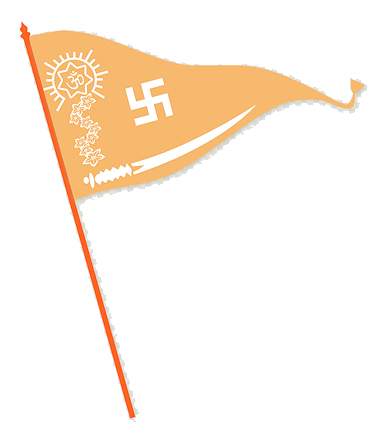
Abb.: ©Flagge
[Fair use]
Webpräsenz:
Wikipedia: https://de.wikipedia.org/wiki/Akhil_Bharatiya_Hindu_Mahasabha. -- Zugriff am 2018-02-22
- http://abhm.org.in/. -- Zugriff am 2018-02-22
- https://www.facebook.com/search/top/?q=Akhil+Bharat+Hindu+Mahasabha&init=public. -- Zugriff am 2018-02-22
Gründung der South Indian Liberal Federation (Tamil: தென்னிந்திய நல உரிமைச் சங்கம் ; aka: Justice Party - Tamil: நீதிக்கட்சி)
Wikipedia: https://en.wikipedia.org/wiki/Justice_Party_(India) . -- Zugriff am 2018-05-21
Benares (Hindi: वाराणसी): Grundsteinlegung der Banaras Hindu University (BHU) -- Hindi: काशी हिन्दू विश्वविद्यालय.
Gründer: Madan Mohan Malaviya -- Hindi: मदनमोहन मालवीय (1861 - 1946)

Abb.: ©Logo
[Fair use]
Webpräsenz: http://www.bhu.ac.in/. -- Zugriff am 2018-02-28
Wikipedia: https://en.wikipedia.org/wiki/Banaras_Hindu_University. -- Zugriff am 2018-02-28
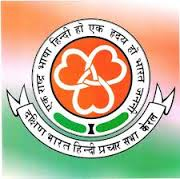
Abb.: ©Logo
[Fair use]
Annie Besant (1847 – 1933) gründet mit der Unterstützung Gandhis die Dakshina Bharat Hindi Prachar Sabha (दक्षिण भारत हिन्दी प्रचार सभा) zur Verbreitung von Hindi als Nationalsprache in Südindien
Webpräsenz: http://www.dbhpscentral.org/index.html. -- Zugriff am 2018-06-19
Wikipedia: https://en.wikipedia.org/wiki/Dakshina_Bharat_Hindi_Prachar_Sabha. -- Zugriff am 2018-06-19
Manifest von Gandhi (Gujarati: મોહનદાસ કરમચંદ ગાંધી, 1869 - 1948) mit Aufruf zu Satyagraha gegen den Rowlatt Act (1919-03-18). Gandhi ruft Hindus und Muslime zu folgendem Gelübde auf:
"With God as witness, we Hindus, and Mahomedans declare that we shall behave towards one another as children of the same parents, that we shall have no differences, that the sorrows of each shall be the sorrows of the other and that each shall help the other in removing them. We shall respect each other's religion and religious feelings and shall not stand in the way of our respective religious practices. We shall always refrain from violence to each other in the name of religion." [Zitiert in: Ambedkar, B. R. [भीमराव रामजी आंबेडकर] <1891 - 1956>: Pakistan or The partition of India. -- 3. ed. -- Bombay : Thackers, 1945. -- S. 146]
Third Anglo-Afghan War (Pashto: د افغان-انګرېز درېمه جګړه). Beginn mit einer Invasion des Emirats Afghanistan (Pashto: د افغانستان امارت) nach British India. Endet mit einem Waffenstillstand.
Wikipedia: https://de.wikipedia.org/wiki/Dritter_Anglo-Afghanischer_Krieg / https://en.wikipedia.org/wiki/Third_Anglo-Afghan_War. -- Zugriff am 2018-03-07
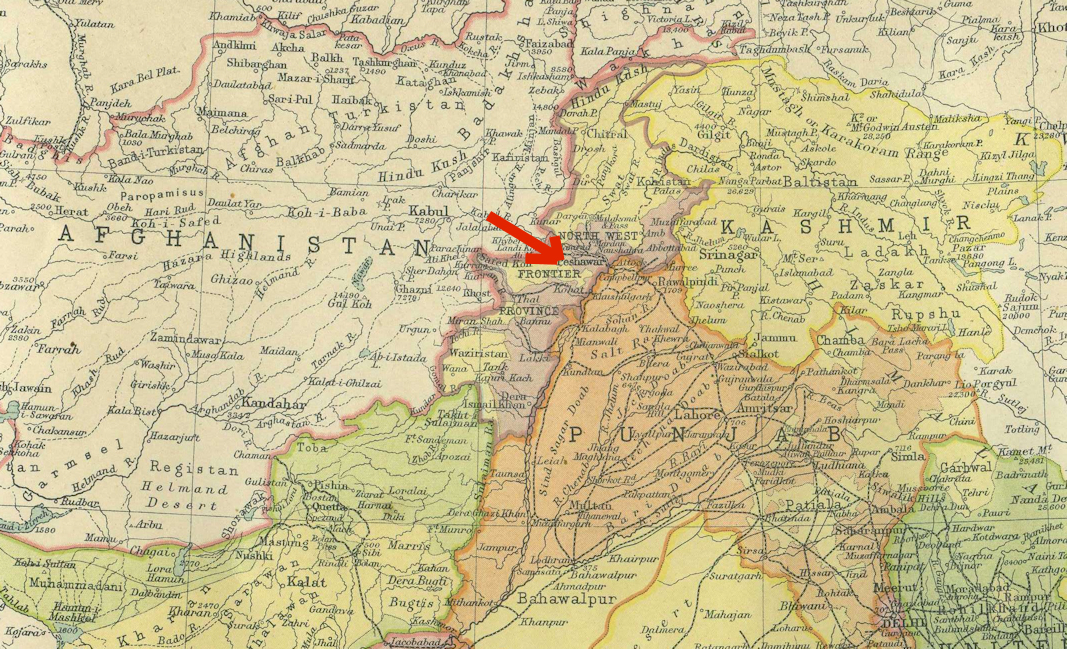
Abb.: Vorstoß des Emirats Afghanistan (Pashto:
د افغانستان امارت)
[Public domain]
Khilafat movement -- Urdu: تحریک خلافت. Auf Initiative von Gandhi unterstützt der Congress das Khilafat movement als nationalistisches Programm der non-cooperation.
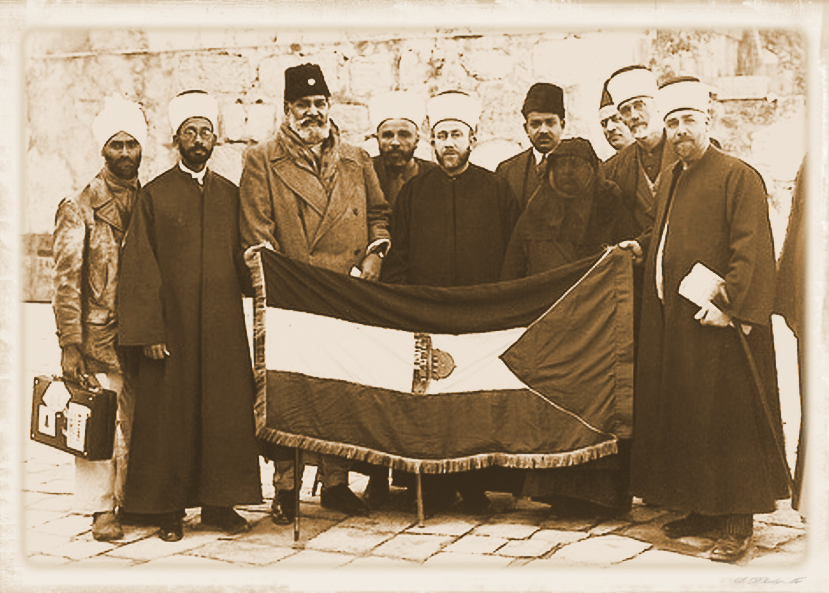
Abb.: Gründer des Khilafat movement -- Urdu: تحریک خلافت
[Public domain]
Wikipedia: https://de.wikipedia.org/wiki/Khilafatbewegung / https://en.wikipedia.org/wiki/Khilafat_Movement. -- Zugriff am 2018-03-05
Gründung der Jamiat Ulama-I-Hind (Urdu: جمعیت علمائے ہند)
Wikipedia: https://de.wikipedia.org/wiki/Jamiat_Ulema-e-Hind / https://en.wikipedia.org/wiki/Jamiat_Ulema-e-Hind. -- Zugriff am 2018-07-09
Webpräsenz: https://www.jamiatulama.in/. -- Zugriff am 2018-07-09
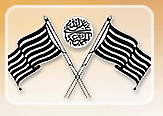
Abb.: ©Logo
[Fair use]
Aligarh (Hindi: अलीगढ़): Gründung der Jamia Millia Islamia Universität (Urdu: جامعہ ملیہ اسلامیہ)
Webpräsenz: http://jmi.ac.in/. -- Zugriff am 2018-05-22
Wikipedia: https://de.wikipedia.org/wiki/Jamia_Millia_Islamia / https://en.wikipedia.org/wiki/Jamia_Millia_Islamia. -- Zugriff am 2018-05-22
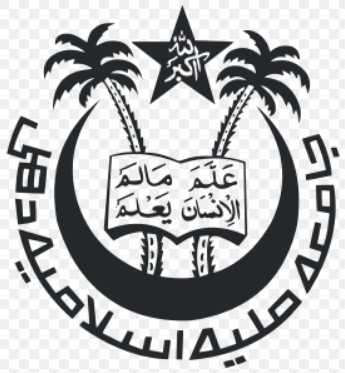
Abb.: ©Logo
[Fair use]

Abb.: Lage von Aligarh (Hindi:
अलीगढ़)
[Bildquelle: © OpenStreetMap-Mitwirkende.
--
CC BY-SA 2.0]
Dr. Kurtkoti (Swami Vidya Shankar, Shankaracharya von Kaweer Pith, Kolhapur [Marathi: कोल्हापुर]) gründet die Maharashtra Hindu Dharma Parishad -- Marathi: महाराष्ट्र हिन्दू धर्म परिषद
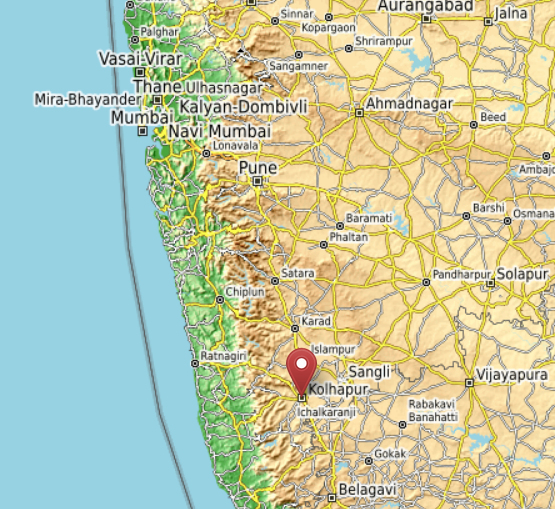
Abb.: Lage von Kolhapur [Marathi: कोल्हापुर]
[Bildquelle: © OpenStreetMap-Mitwirkende.
--
CC BY-SA 2.0]
Tod von Bal Gangadhar Tilak (Marathi: बाळ गंगाधर टिळक. 1856 - 1920)
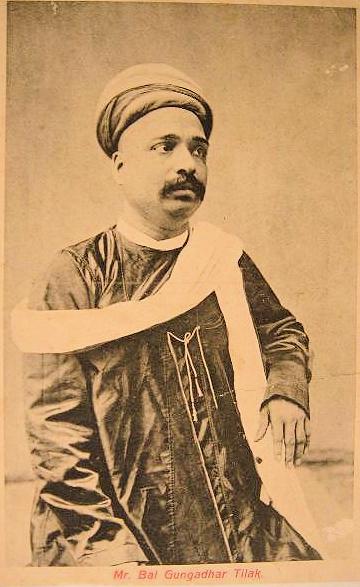
Abb.: Tilak, Bal Gangadhar (Marathi: बाळ
गंगाधर टिळक, 1856 - 1920)
[Public domain]
Es erscheint:
Gandhi, Mohandas Karamchand [મોહનદાસ કરમચંદ ગાંધી] <1869 - 1948>: The caste system. -- In: Young India. -- 1920-12-08
"The Caste System
By M. K. Gandhi
(December 8, 1920.)I have received several angry letters about my remarks during my Deccan tour on the caste system. I am not publishing these letters, because there is nothing but vituperation in them, and when there is no vituperation, there is little argument about them. I am anxious to open the columns of Young India to opinions expressing dissent from its views, but the writers must be brief and interesting. Acrimony is no argument. I am obliged to make these remarks, because two writers at least would have the gained publicity for their letters, if they had not been prolix and unintelligible in their expression. The question, however, that my correspondents have raised, commands attention and deserves an answer. They argue that the retention of the caste system spells ruin for India and that
it is caste which
has reduced India to slavery. In my opinion, it is not
caste that has made as what we are. It was our greed and disregard of essential virtues which enslaved us. I believe that caste has saved Hinduism from disintegration.
But like every other institution, it has suffered from excrescences, I consider the four divisions alone to be fundamental, natural, and essential. The innumerable subcastes are sometimes a convenience, often a hindrance. The sooner there is fusion the better. The silent destruction and reconstruction to sub-castes have ever gone on and are bound to continue. Social pressure and public opinion can be trusted to deal with the problem. But I am certainly against any attempt at destroying the fundamental divisions. The caste system is not based on inequality, there is no question of inferiority, and so far as there is any such question arising as in Madras, Maharashtra, or elsewhere, the tendency should undoubtedly be checked. But there appears to be no valid reason for ending the system because of its abuse. It lends itself easily to reformation. The spirit of democracy, which is fast spreading throughout India and the rest of the world, will, without a shadow of doubt, purge the institution of the idea of predominance and subordination.
The spirit of democracy is not a mechanical thing to be adjusted by abolition of forms. It requires change of the heart. If caste is a bar to the spread of the spirit, the existence of five religions in India—Hinduism, Islam, Christianity, Zorastrianism, and Judaism—is equally a bar. The spirit of democracy requires the inculcation of the spirit of brotherhood, and I can find no difficulty in
considering a Christian or a Mahomedan to be my brother in absolutely the same sense as a blood brother, and Hinduism that is responsible for the doctrine of the caste is also responsible for the inculcation of the essential brotherhood, not merely of man but even of all that lives.
One of my correspondents suggests that we should abolish the caste but adopt the class system of Europe * —meaning thereby I suppose that the idea of heredity in caste should be rejected. I am inclined to think that the law of heredity is an eternal law and any attempt to alter that law must lead, as it has before led, to utter confusion. I can see very great use in considering a Brahman to be always a Brahmin throughout his life. If he does not behave himself like a Brahmin, he will naturally cease to command the respect that is due to the real Brahmin. It is easy to imagine the innumerable difficulties if one were to set up a court of punishments and rewards, degradation and promotion. If Hindus believe, as they must believe in reincarnation, transmigration, they must know that nature will, without any possibility of mistake, adjust the balance by degrading a Brahmin, if he misbehaves himself, by reincarnating him in a lower division, and translating one who lives the life of a Brahmin in his present incarnation to Brahminhood in his next.',
Inter-drinking, inter-dining, inter-marrying, I hold, are not essential for the promotion of the spirit of democracy.
I do not contemplate under a most democratic constitution a universality of manners and customs about eating , drinking and marrying. We shall ever have to seek unity in diversity, and I decline to consider it a sin for a man not to drink or eat with any and everybody. In Hinduism, children of brothers may not intermarry. The prohibition does not interfere with cordiality of relations, probably it promotes healthiness of relationships. In' households, I have known mothers not dining in the common kitchen, or drinking from the same pot, Without their becoming exclusive, arrogant. or less loving. These are disciplinary restraints which arc not in themselves bad. Carried to ridiculous extremes, they may
become harmful, and if the motive is one of arrogation of superiority, the restraint becomes an indulgence, therefore, hurtful. But as time goes forward, and new necessities and occasions arise, the custom regarding inter-drinking, inter-dining and inter-marrying, will require cautious modifications or rearrangement.
Thus, whilst I am prepared to defend, as I have always done, the division of Hindus into four castes, as I have so often said in these columns, I consider unsociability to be a heinous crime against humanity. It is not a sign of self-restraint but an arrogant assumption of superiority. It has served no useful purpose and it has suppressed, as nothing else in Hinduism has, vast numbers of the human race who are not only every bit as good as ourselves, but are rendering in many walks of life an essential service to the country. It is a sin of which the sooner Hinduism purges itself the better it is for itself, if it is to be recognised as an honourable and elevating religion. I know no argument in favour of its retention and I have no hesitation in rejecting scriptural authority of a doubtful character in order to support a sinful institution. Indeed I would reject all authority if it is in conflict with sober reason or the dictates of the heart. Authority sustains and ennobles the weak when it is the handwork of reason, but it degrades them when it supplants reason sanctified by the still small voice within.
Gründung des Shiromani Akali Dal (SAD) (Panjabi: ਸ਼੍ਰੋਮਣੀ ਅਕਾਲੀ ਦਲ)
Wikipedia: https://de.wikipedia.org/wiki/Shiromani_Akali_Dal / https://en.wikipedia.org/wiki/Shiromani_Akali_Dal. -- Zugriff am 2018-05-21

Abb.: ©Logo
[Fair use]
Maulana Mahomed Ali [مَولانا مُحمّد علی جَوہر] [1878 - 1931] wird von den Briten zu 2½ Jahren Gefängnis verurteilt:
"A third tenet which calls for notice as being relevant to the issue is that Islam does not recognize territorial affinities. Its affinities are social and religious and therefore extraterritorial. Here again Maulana Mahomed Ali [مَولانا مُحمّد علی جَوہر] [1878 - 1931] will be the best witness. When he was committed to the Sessions Court in Karachi Mr. Mahomed Ali, addressing the Jury, said:— "One thing has to be made clear as we have since discovered that the doctrine to which we shall now advert is not so generally known in non-Muslim and particularly in official circles as it ought to be. A Musalman's faith does not consist merely in believing in a set of doctrines and living up to that belief himself; he must also exert him self to the fullest extent of his power, of course without resort to any compulsion, to the end that others also conform to the prescribed belief and practices. This is spoken of in the Holy Koran as Amribilmaroof and Nahi anilmunkar, and certain distinct chapters of the Holy Prophet's traditions relate to this essential doctrine of Islam. A Musalman cannot say: 'I am not my brother's keeper,' for in a sense he is and his own salvation cannot be assured to him unless he exhorts others also to do good and dehorts them against doing evil. If therefore any Musalman is being compelled to wage war against the Mujahid of Islam, he must not only be a conscientious objector himself, but must, if he values his own salvation, persuade his brothers also at whatever risk to himself to take similar objection. Then and not until then, can he hope for salvation. This is our belief as well as the belief of every other Musalman and in our humble way we seek to live up to it; and if we are denied freedom to inculcate this doctrine, we must conclude that the land, where this freedom does not exist, is not safe for Islam."This is the basis of Pan-Islamism. It is this which leads every Musalman in India to say that he is a Muslim first and Indian afterwards. It is this sentiment which explains why the Indian Muslim has taken so small a part in the advancement of India but has spent himself to exhaustion/6/ by taking up the cause of Muslim countries and why Muslim countries occupy the first place and India occupies a second place in his thoughts."/6/ "Between 1912 when the first Balkan war began, and 1922 when Turkey made peace with the European Powers, the Indian Muslims did not bother about Indian politics in the least. They were completely absorbed in the fate of Turkey and Arabia."
[Zitiert in: Ambedkar, B. R. [भीमराव रामजी आंबेडकर] <1891 - 1956>: Pakistan or The partition of India. -- 3. ed. -- Bombay : Thackers, 1946. -- S. 295]
Wikipedia: https://en.wikipedia.org/wiki/Mohammad_Ali_Jouhar. -- Zugriff am 2018-03-07
Kerala (Malayalam: കേരളം): Moplah rebellion (Malayalam: മലബാർ കലാപം)
"Beginning with the year 1920 there occurred in that year in Malabar [Malayalam: മലബാര്] what is known as the Mopla Rebellion. It was the result of the agitation carried out by two Muslim organizations, the Khuddam-i-Kaba (servants of the Mecca Shrine) and the Central Khilafat Committee. Agitators actually preached the doctrine that India under the British Government was Dar-ul-Harab [دار الحرب] and that the Muslims must fight against it and if they could not, they must carry out the alternative principle of Hijrat. The Moplas [Malayalam: മാപ്പിള] were suddenly carried off their feet by this agitation. The outbreak was essentially a rebellion against the British Government The aim was to establish the kingdom of Islam by overthrowing the British Government. Knives, swords and spears were secretly manufactured, bands of desperadoes collected for an attack on British authority. On 20th August a severe encounter took place between the Moplas and the British forces at Pinmangdi Roads were blocked, telegraph lines cut, and the railway destroyed in a number of places. As soon as the administration had been paralysed, the Moplas declared that Swaraj had been established. A certain Ali Mudaliar was proclaimed Raja, Khilafat flags were flown, and Ernad [Malayalam: ഏറനാട്] and Wallurana [Malayalam: വള്ളുവനാട്] were declared Khilafat Kingdoms. As a rebellion against the British Government it was quite understandable. But what baffled most was the treatment accorded by the Moplas to the Hindus of Malabar. The Hindus were visited by a dire fate at the hands of the Moplas. Massacres, forcible conversions, desecration of temples, foul outrages upon women, such as ripping open pregnant women, pillage, arson and destruction—in short, all the accompaniments of brutal and unrestrained barbarism, were perpetrated freely by the Moplas upon the Hindus until such time as troops could be hurried to the task of restoring order through a difficult and extensive tract of the country. This was not a Hindu-Moslem riot. This was just a Bartholomew. The number of Hindus who were killed, wounded or converted, is not known. But the number must have been enormous." [Quelle: Ambedkar, B. R. [भीमराव रामजी आंबेडकर] <1891 - 1956>: Pakistan or The partition of India. -- 3. ed. -- Bombay : Thackers, 1945. -- S. 163]
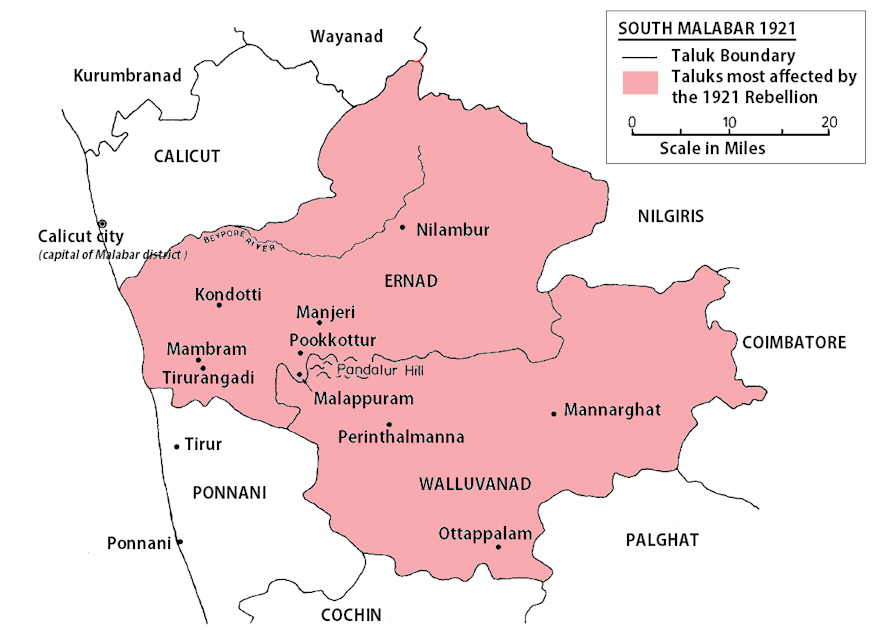
Abb.: Gebiet der Moplah rebellion (Malayalam: മലബാർ കലാപം) 1921
[Bildquelle: Nmkuttiady/Wikimedia. --
CC BY-SA 3.0]
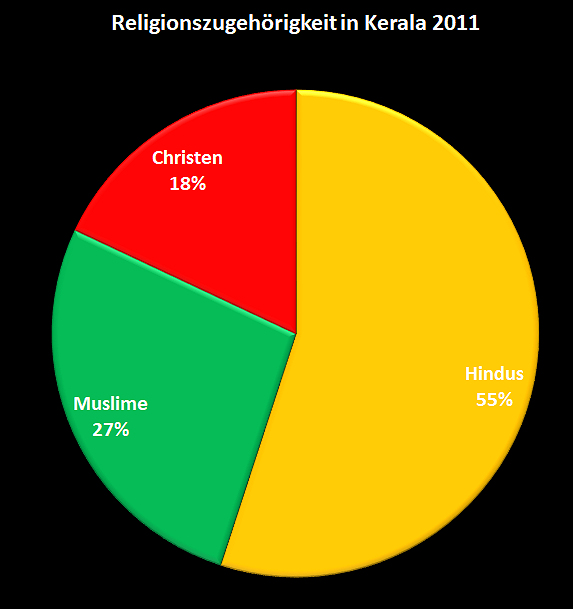
Abb.: Religionszugehörigkeit in Kerala (Malayalam: കേരളം) (in Prozent), 2011
[Datenquelle:
https://en.wikipedia.org/wiki/Religion_in_Kerala. -- Zugriff am 2018-03-05]
Wikipedia: https://de.wikipedia.org/wiki/Moplah-Aufstand / https://en.wikipedia.org/wiki/Malabar_rebellion. -- Zugriff am 2018-03-05
Muharram - مُحَرَّم: Communal riots in Bengalen (Bangali: বাংলা) und im Punjab (Panjabi: پنجاب) besonders in Multan (Panjabi: مُلتان).
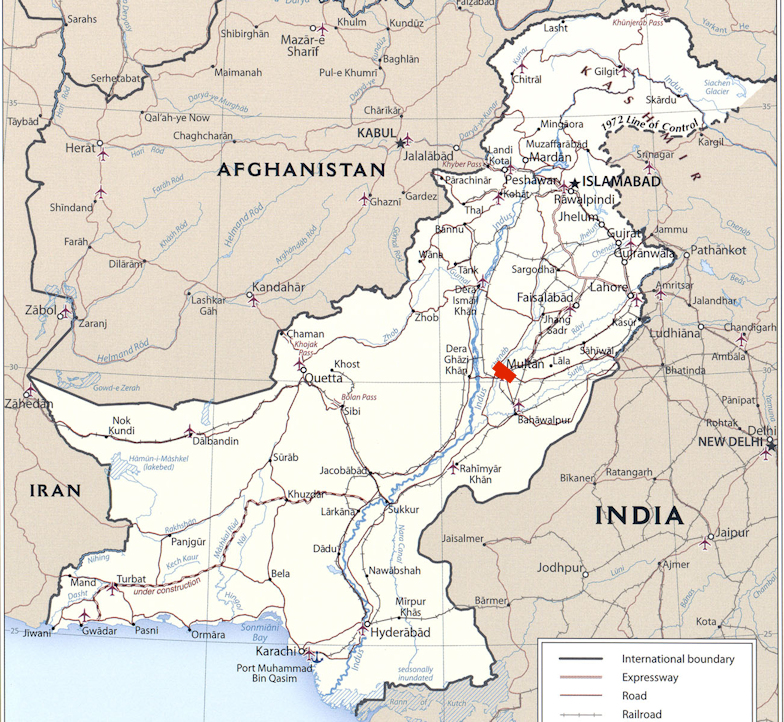
Abb.: Lage von Multan (Panjabi: مُلتان)
[Bildquelle: CIA. -- Public domain
Tod des nationalistischen Dichters Subramaniya Bharati (Tamil: சுப்ரமணிய பாரதி, 1882 - 1921). Seine Werke haben großen Einfluss auf Narendra Modi (Gujarati: નરેંદ્ર દામોદરદાસ મોદી, 1950 - ).
Wikipedia: https://de.wikipedia.org/wiki/Subramaniya_Bharati / https://en.wikipedia.org/wiki/Subramania_Bharati. -- Zugriff am 2018-05-17
Es erscheint:
Besant, Annie <1847 - 1933>: The Future of Indian politics : a contribution to the understanding of present-day problems. -- Adyar : Theosophical Publishing House, 1922. -- 351 S.
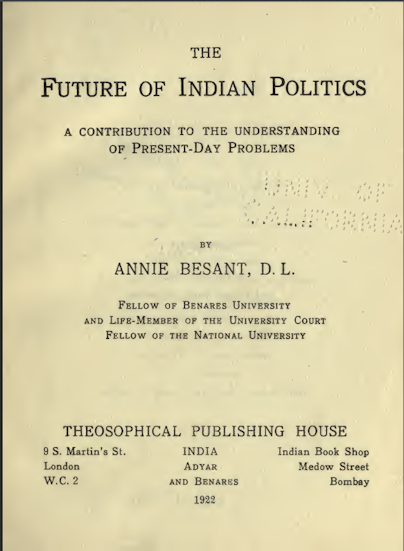
Abb.: Titelblatt
"We had thought that Indian Musalmans were loyal to their Motherland, and, indeed, we still hope that some of the educated class might strive to prevent such a Musalman rising; but they are too few for effective resistance, and would be murdered as apostates. Malabar has taught us what Islamic rule still means, and we do not want to see another specimen of the “ Khilafat Raj ” in India. How much sympathy with the Moplas is felt by Muslims outside Malabar has been proved by the defence raised for them by their fellow-believers, and by Mr. Gandhi himself, who stated that they had acted as they believed that their religion taught them to act. I fear that that is true ; but there is no place in a civilised land for people who believe that their religion teaches them to murder, rob, rape, burn, or drive away out of the country those who refuse to apostatise from their ancestral faiths, except in its schools, under surveillance, or in its gaols. The Thugs believed that their particular form of God commanded them to strangle people— especially travellers with money. Such “ laws of God ” cannot be allowed to override the laws of a civilised country, and people living in the twentieth century must either educate people who hold these Middle Age views, or else exile them. Their place is in countries sharing their opinions, where they can still use such arguments against any who differ from them—as indeed, Persia did with the Parsis long ago, and the Bahaists in our own time. In fact, Muslim sects are not safe in a country ruled by orthodox Muslims. British rule in India has protected the freedom of all sects : Shiahs, Sunnis, Sufis, Bahaists, live in safety under her sceptre, although it cannot protect any of them from social ostracism, where it is in a minority; Musalmans are more free under British rule, than in countries where there are Muslim rulers. In thinking of an Independent India, the menace of Muhammadan rule has to be considered." [a.a.O., S. 304f.]
Madan Mohan Malaviya (Hindi: मदनमोहन मालवीय, 1861 - 1946) wiederbelebt die Hindu Mahasabha (Hindi: हिन्दू महासभा) innerhalb des Indian Congress.
Benares (Hindi: वाराणसी): Hindu Mahasabha (Hindi: अखिल भारतीय हिन्दू महासभा ) und Arya Samaj (Sanskrit: आर्यसमाज) beschließen, gemeinsam gegen Kuhschlachten und für Rück-Konvertierung von Muslimen zu agieren.
Hindu Mahasabha (Hindi: अखिल भारतीय हिन्दू महासभा ) fordert für Unberührbare freien Zugang zu Brunnen, Schulen, Straßen und Tempeln.
Nagpur (Marathi: नागपूर): es erscheint anonym:
[Savarkar, Vinayak Damodar -- Marathi: विनायक दामोदर सावरकर <1883 - 1966>]: Essentials of Hindutva . -- 1928 Reprint unter dem Titel: Hindutva: Who Is a Hindu?. -- 5.ed online: https://archive.org/stream/hindutva-vinayak-damodar-savarkar-pdf/hindutva-vd-savarkar#page/n1/mode/2up
Inhalt:
- What is in a name?
- Hindutva is different from Hinduism
- What is a Hindu?
- Name older still
- Hindus, a nation
- Other names
- How Names Are Given
- International Life
- Fall of Buddhism
- Buddhism - a universal religion
- Then came reaction !
- Institutions in favour of Nationality
- Commingling of Races
- Back to the Vedas
- Sindhusthan
- What is Arya
- Hindu & Hindusthan.
- Reverence to Buddha
- Hindus : all one and a nation
- Hindusthani Language
- Foreign Invaders
- Hindutva at work
- Stupid notions must go
- Essential implications of Hindutva
- Bond of common blood
- Common culture
- What is civilization ?
- Common laws and rites
- Who is a Hindu ?
- Hindus in Sindh
- Unique Natural Blessings to Hindusthan
"Hindutva is different from Hinduism To this category of names which have been to mankind a subtle source of life and inspiration belongs the word Hindutva, the essential nature and significance of which we have to investigate into. The ideas and ideals, the systems and societies, the thoughts and´sentiments which have centered round this name are so varied and rich, so powerful and so subtle, so elusive and yet so vived that the term Hindutva defies all attempts at analysis. Forty centuries, if not more, had been at work to mould it as it is. Prophets and poets, lawyers and law-givers, heroes and historians, have thought, lived, fought and died just to have it spelled thus. For indeed, is it not the resultant of countless actions - now conflicting, now commingling, now cooperating - of our whole race? Hindutva is not a word but a history. Not only the spiritual or religious history of our people as at times it is mistaken to be by being confounded with the other cognate term Hinduism, but a history in full. Hinduism is only a derivative, a fraction, a part of Hindutva. Unless it is made clear what is meant by the latter the first remains unintelligible and vague. Failure to distinguish between these two terms has given rise to much misunderstanding and mutual suspicion between some of those sister communities that have inherited this inestimable and common treasure of our Hindu civilization. What is the fundamental difference in the meaning of these two words would be clear as our argument proceeds. Here it is enough to point out that Hindutva is not identical with what is vaguely indicated by the term Hinduism. By an 'ism' it is generally meant a theory or a code more or less based on spiritual or religious dogma or creed. Had not linguistic usage stood in our way then 'Hinduness' would have certainly been a better word than Hinduism as a near parallel to Hindutva. Hindutva embraces all the departments of thought and activity of the whole Being of our Hindu race. Therefore, to understand the significance of this term Hindutva, we must first understand the essential meaning of the word Hindu itself and realize how it came to exercise such imperial sway over the hearts of millions of mankind and won a loving allegiance from the bravest and best of them. But before we can do that, it is imperative to point out that we are by no means attemption a definition or even a description of the more limited, less satisfactory and essentially sectarian term Hinduism. How far we can succeed or are justified in doing that would appear as we proceed.
What is a Hindu?
Although it would be hazardous at the present state of oriental research to state definitely the period when the foremost band of the intrepid Aryans made it their home and lighted their first sacrificial fire on the banks of the Sindhu, the Indus, yet certain it is that long before the ancient Egyptians, and Babylonians had built their magnificent civilization, the holy waters of the Indus were daily witnessing the lucid and curling columns of the scented sacrificial smokes and the valleys resounding with the chants of Vedic hymns - the spiritual fervour that animated their souls. The adventurous valour that propelled their intrepid enterprises, the sublime heights to which their thoughts rose-all these had marked them out as a people destined to lay the foundation of a great and enduring civilization. By the time they had definitely cut themselves aloof from their cognate and neighbouring people especially the Persians, the Aryans, had spread out to the farthest of the seven rivers, Sapta Sindhus, and not only had they developed a sense of nationality but had already succeeded in giving it 'a local habitation and a name! Out of their gratitude to the genial and perennial network of waterways that run through the land like a system of nerve-threads and wove them into a Being, they very naturally took to themselves the name of Sapta Sindhus an epithet that was applied to the whole of Vedic India in the oldest records of the world, the Rigveda itself. Aryans or the cultivators as they essentially were, we can well understand the divine love and homage they bore to these seven rivers presided over by the River, 'the Sindhu'. which to them were but a visible symbol of the common nationality and culture.
The Indians in their forward march had to meet many a river as genial and as fertilizing as these but never could they forget the attachment they felt and the homage they paid to the Sapta Sindhus which had welded them into a nation and furnished the name which enabled their forefathers to voice forth their sense of national and cultural unity. Down to this day a Sindhu - a Hindu - wherever he may happen to be, will gratefully remember and symbolically invoke the presence of these rivers that they may refresh and purify his soul.
Not only had these people been known to themselves as 'Sindhus' but we have definite records to show that they were known to their surrounding nations - at any rate to one of them - by that very name, 'Sapta Sindhu'. The letter 's' in Sanskrit is at times changed into h in some of the Prakrit languages, both Indian and non-Indian. For example, the word Sapta has become Hapta not only in Indian Prakrits but also in the European languages too: we have Hapta i.e., week, in India and 'Heptarchy' in Europe, Kesari in Sanskrit becomes Harhvati in Persian and Asuri becomes Ahur. And then we actually find that the Vedic name of our nation Sapta Sindhu had been mentioned as Hapta Hindu in the Avesta by the ancient Persian people. Thus in the very dawn of history we find ourselves belonging to the nation of the Sindhus or Hindus and this fact was well known to our learned men even in the Puranic period. In expounding the doctrine that many of the Mlechha tongues had been but the mere offshoots of the Sanskrit language the Bhavishya Puran clearly cites this fact and says [...]
Thus knowing for certain that the Persians used to designate the Vedic Aryans as Hindus and knowing also the fact that we generally call a foreign and unknown people by the term by which they are known to those through whom we come to know them, we can safely conclude that most of the remoter nations that flourished then must have applied the same epithet 'Hindu' to our land and people as the ancient Persians did. Not only that but even in the very region of the Sapta Sindhus the thinly scattered native tribes too, must have been knowing the Aryans as Hindus in the local dialects in accordance with the same linguistic law. Further on, as the Vedic Sanskrit began to give birth to the Indian Prakrits which became the spoken tongues of the majority of the descendants of these very Sindhus as well as the assimilated and the crossborn castes, these too might have called themselves as Hindus without any influence for the foreign people. For the Sanskrit S changes into H as often in Indian Prakrits as in the non-Indian ones. Therefore, so far as definite records are concerned, it is indisputably clear that the first and almost the cradle name chosen by the patriarchs of our race to designate our nation and our people, is Sapta Sindhu or Hapta Hindu and that almost all nations of the then known world seemed to have known us by this very epithet, Sindhus or Hindus.
[...]Hindus, a nation
The activities of so intrepid a people as the Sindhus or Hindus could no longer be kept cooped or cabined within the narrow compass of the Panchanad or the Punjab. The vast and fertile plains farther off stood out inviting the efforts of some strong and vigorous race. Tribe after tribe of the Hindus issued forth form the land of their nursery and led by the consciousness of a great mission and their Sacrificial Fire that was the symbol thereof, they soon reclaimed the vast, waste and but very thinly populated lands. Forests were felled, agriculture flourished, cities rose, kingdoms thrived,- the touch of the human hand changed the whole face of the wild and unkemp nature. But while these great deeds were being achieved the Aryans had developed to suit their individualistic tendencies and the demands of their new environments a policy that was but loosely centralised. As time passed on, the distances of their new colonies increased, and different settlements began to lead life politically very much centred in themselves. The new attachments thus formed, though they could not efface the old ones, grew more and more pronounced and powerful until the ancient generalizations and names gave way to the new. Some called themselves Kurus, others Kashis or Videhas or Magadhas while the old generic name of the Sindhus or Hindus was first overshadowed and then almost forgotten. Not that the conception of a national and cultural unity vanished, but it assumed other names and other forms, the politically most important of them being the institution of a Chakarvartin. At last the great mission which the Sindhus had undertaken of founding a nation and a country, found and reached its geographical limit when the valorous Prince of Ayodhya made a triumphant entry in Ceylon and actually brought the whole land from the Himalayas to the Seas under one sovereign sway. The day when the Horse of Victory returned to Ayodhya unchallenged and unchallengeable, the great white Umbrella of Sovereignty was unfurled over that Imperial throne of Ramchandra, the brave, Ramchandra the good, and a loving allegiance to him was sworn, not only by the Princes of Aryan blood but Hanuman, Sugriva, Bibhishana from the south-that day was the realbirth-day of our Hindu people. It was truly our national day: for Aryans and Anaryans knitting themselves into a people were born as a nation. It summed up and politically crowned the efforts of all the generations that preceded it and it handed down a new and common mission, a common banner, a common cause which all the generations after it had consciously or unconsciously fought and died to defend."
"Common culture But only two; because a moment's consideration would show that these two qualifications of one nation and one race — of a common fatherland and therefore of a common blood — cannot exhaust all the requisites of Hindutva.
The majority of the Indian Mohammedans may, if free from the prejudices born of ignorance, come to love our land as their fatherland, as the patriotic and noble-minded amongst them have always been doing. The story of their conversions, forcible in millions of cases, is too recent to make them forget, even if they like to do so, that they inherit Hindu blood in their veins. But can we, who here are concerned with investigating into facts as they are and not as they should be, recognize these Mohammedans as Hindus? Many a Mohammedan community in Kashmir and other parts of India as well as the Christians in South India observe our caste rules to such an extent as to marry generally within the pale of their castes alone; yet, it is clear that though their original Hindu blood is thus almost unaffected by an alien adulteration, yet they cannot be called Hindus in the sense in which that term is actually understood, because, we Hindus are bound together not only by the tie of the love we bear to a common fatherland and by the common blood that courses through our veins and keeps our hearts throbbing and our affections warm, but also by the tie of the common homage we pay to our great civilization — our Hindu culture, which could not be better rendered than by the word Sanskriti suggestive as it is of that language, Sanskrit, which has been the chosen means of expression and preservation of that culture, of all that was best and worth-preserving in the history of our race. We are one because we are a nation a race and own a common Sanskriti (civilization)"
Wikipedia: https://en.wikipedia.org/wiki/Hindutva:_Who_Is_a_Hindu%3F. -- Zugriff am 2018-03-16
Agra (Hindi: आगरा): Swami Shraddhanand (Hindi: स्वामी श्रद्धानन्द, 1856–1926) gründet die Bharatiya Hindu Shuddhi Sabha (Hindi: भारतीया हिन्दू शुद्धि सभा) zur "Rück"konversion von Muslimen zum Hinduismus. Man behauptet, dass man bis Ende 1923 30.000 Malkana (ملکانہ) bekehrt und sie wieder als Kshatriyas etabliert hat.
Wikipedia: https://en.wikipedia.org/wiki/Swami_Shraddhanand / https://en.wikipedia.org/wiki/Malkana. -- Zugriff am 2018-03-13Erscheinen der ersten Publikation der Gita Press (Hindi: गीता प्रेस): Übersetzung der Bhagavadgita (Sanskrit: भगवद्गीता) ins Hindi mit Kommentar.
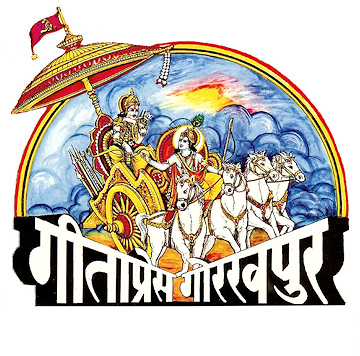
Abb.: ©Logo
[Fair use]
Webpräsenz: http://gitapress.org/english/. -- Zugriff am 2018-02-28
Wikipedia: https://en.wikipedia.org/wiki/Gita_Press. -- Zugriff am 2018-02-28
Weiterführende Ressource:
Mukul, Akshaya [अक्षय मुकुल]: Gita Press and the making of Hindu India. -- Noida : HarperCollins, 2015. -- 540 S.
Abb.: Umschlagtitel
[Fair use]
Muhammad Ali Jinnah (1876 - 1948) (Urdu: محمد علی جناح) über Gandhi
"A remarkable incident was reported in connection with the celebration of Mr. Gandhi's release from gaol in 1924 at the Tibbia College of Yunani medicine run by Hakim Ajmal Khan at Delhi. According to the report, a Hindu student compared Mr. Gandhi to Hazarat Isa (Jesus) and at this sacrilege to the Musalman sentiment all the Musalman students flared up and threatened the Hindu student with violence, and, it is alleged, even the Musalman professors joined with their co-religionists in this demonstration of their outraged feelings. In 1923 Mr. Mahomed Ali presided over the session of the Indian National Congress. In this address he spoke of Mr. Gandhi in the following terms :
"Many have compared the Mahatma's teachings, and latterly his personal sufferings, to those of Jesus (on whom be peace). . . .When Jesus contemplated the world at the outset of his ministry he was called upon to make his choice of the weapons of reform. . . .The idea of being all-powerful by suffering and resignation, and of triumphing over force by purity of heart, is as old as the days of Abel and Cain, the first progeny of man. . . .A year after, Mr. Mahomed Ali, speaking at Aligarh and Ajmere, said :"Be that as it may, it was just as peculiar to Mahatma Gandhi also; but it was reserved for a Christian Government to treat as felon the most Christ like man of our time (Shame, Shame) and to penalize as a disturber of the public peace the one man engaged in public affairs who comes nearest to the Prince of Peace. The political conditions of India just before the advent of the Mahatma resembled those of Judea on the eve of the advent of Jesus, and the prescription that he offered to those in search of a remedy for the ills of India was the same that Jesus had dispensed before in Judea. Self-purification through suffering; a moral preparation for the responsibilities of governmen ; self-discipline as the condition precedent of Swaraj—this was Mahatma's creed and conviction; and those of us, who have been privileged to have lived in the glorious year that culminated in the Congress session at Ahmedabad, have seen what a remarkable and rapid change he wrought in the thoughts, feelings and actions of such large masses of mankind."
"However pure Mr. Gandhi's character may be, he must appear to me from the point of view of religion inferior to any Musalman, even though he be without character.""[Zitiert in: Ambedkar, B. R. [भीमराव रामजी आंबेडकर] <1891 - 1956>: Pakistan or The partition of India. -- 3. ed. -- Bombay : Thackers, 1946. -- S. 302]
Communal riots in Kohat (Pashtu: کوهاټ) wegen eines anti-islamischen Gedichts. 155 Tote und Verletzte. Alle Hindus verlassen Kohat.
Wikipedia: https://en.wikipedia.org/wiki/1924_Kohat_riots. -- Zugriff am 2018.04-02
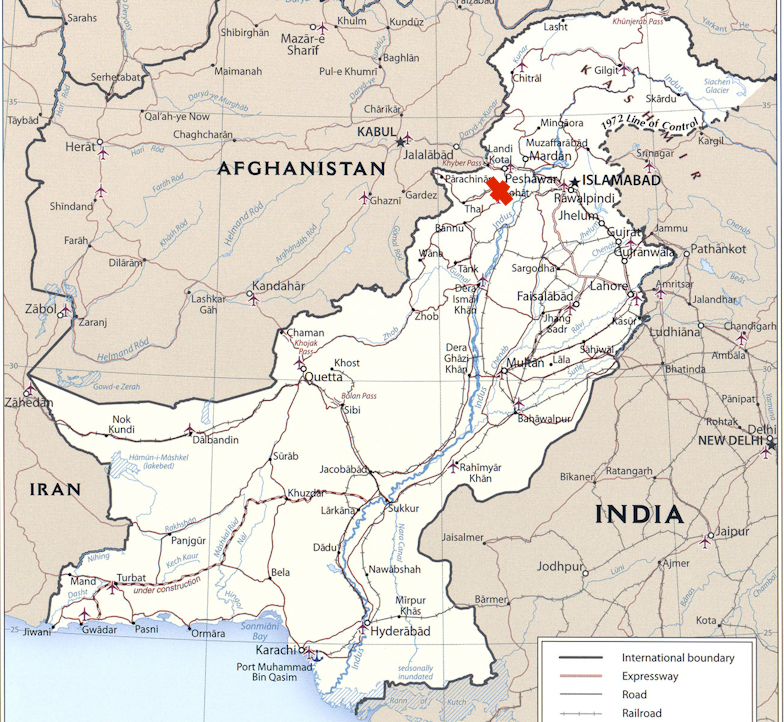
Abb.: Lage von Kohat (Pashtu:
کوهاټ)
[Bildquelle: CIA. -- Public domain]
In der Zeitschrift Pratap (Urdu: پراٹپ) <Lahore (Panjabi: ਲਾਹੌਰ)> erscheint das politische Testament von Lala Hardayal (Punjabi: ਲਾਲਾ ਹਰਦਿਆਲ, 1884 - 1939)
"I declare that the future of the Hindu race, of Hindustan and of the Punjab, rests on these four pillars:
- Hindu Sangathan [Hindi: हिन्दू संगठन],
- Hindu Raj [Hindi: हिन्दू राज],
- Shuddhi [Sanskrit/Hindi: शुद्धि - Konversion zum Hinduismus] of Moslems, and
- Conquest and Shuddhi [शुद्धि] of Afghanistan and the Frontiers.
So long as the Hindu nation does not accomplish these four things, the safely of our children and great-grandchildren will be ever in danger, and the safety of the Hindu race will be impossible. The Hindu race has but one history, and its institutions are homogeneous. But the Musalmans and Christians are far removed from the confines of Hindustan, for their religions are alien and they love Persian, Arab and European institutions. Thus, just as one removes foreign matter from the eye, Shuddhi [शुद्धि - Konversion zum Hinduismus] must be made of these two religions. Afghanistan and the hilly regions of the frontier were formerly part of India, but are at present under the domination of Islam. . . .Just as there is Hindu religion in Nepal, so there must be Hindu institutions in Afghanistan and the frontier territory; otherwise it is useless to win Swaraj [Hindi: स्वराज]. For mountain tribes are always warlike and hungry. If they become our enemies, the age of Nadirshah [1688 - 1747] [Persisch: نادر شاه افشار] and Zamanshah [1770 - 1844] [Persisch: زماں شاہ درانی] will begin anew. At present English officers are protecting the frontiers; but it cannot always be. . . . If Hindus want to protect themselves, they must conquer Afghanistan and the frontiers and convert all the mountain tribes."
[Zitiert in: Ambedkar, B. R. [भीमराव रामजी आंबेडकर] <1891 - 1956>: Pakistan or The partition of India. -- 3. ed. -- Bombay : Thackers, 1945. -- S. 129]
Es erscheint die Wochen-Zeitschrift Hindu Panch (Hindi: हिन्दू पंच)
Ihre Ziele:
Motto auf Titelseite:
लज्जा रखने हिन्दू की, हिन्दू नाम बचाने को।
आया 'हिन्दू पंच' हिन्द में, हिन्दू जाति जगाने को ॥Die Würde der Hindus wiederherstellen, Den Namen Hindu bewahren,
Hindu Herrschaft nach Indien bringen, Hindus aufwecken."
Blutige communal riots zwischen Muslimen und Hindus in Delhi (Hindi: दिल्ली) und Nagpur (Hindi: नागपूर)
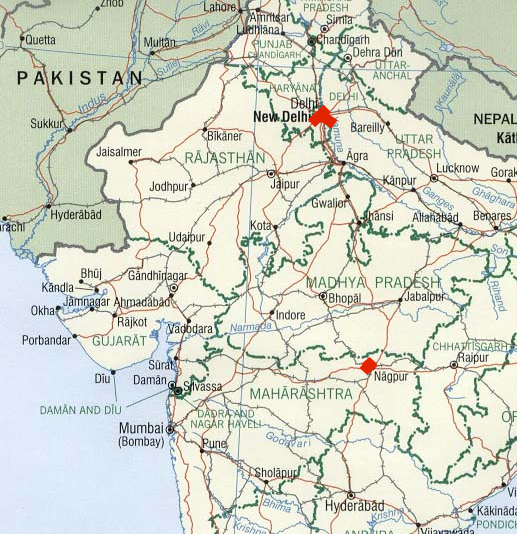
Abb.: Lage von Delhi (Hindi: दिल्ली) und Nagpur (नागपूर)
[Bildquelle: CIA. -- Public domain]
Blutige communal riots zwischen Muslimen und Hindus in
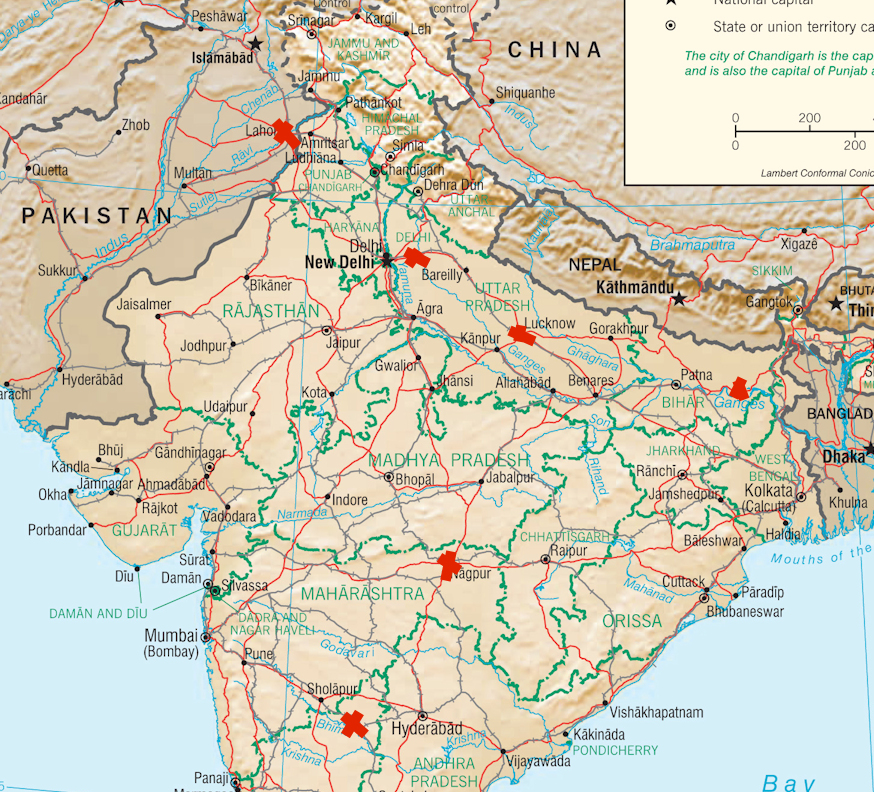
Abb.: Lage der genannten Orte
[Bildquelle: CIA. -- Public domain]
Blutige communal riots zwischen Muslimen und Hindus in
Lucknow (Hindi: लखनऊ)
Shahajanapur (Hindi: शाहजहाँपुर)
Kankinarah (Bengali: কাঁকিনাড়া)
Allahabad (Hindi: इलाहाबाद)
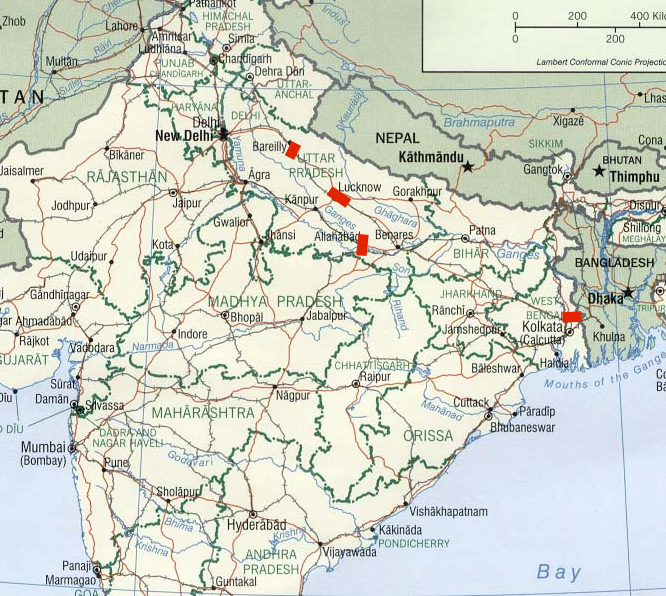
Abb.: Lage der genannten Orte
[Bildquelle: CIA. -- Public domain]
Nagpur (Marathi: नागपूर), Maharashtra: Gründung des Rashtriya Swayamsevak Sangh (RSS) -- Hindi: राष्ट्रीय स्वयंसेवक संघ

Abb.: ©Logo
[Fair use]
Webpräsenz: http://www.rss.org. -- Zugriff am 2018-02-18Wikipedia: https://de.wikipedia.org/wiki/Rashtriya_Swayamsevak_Sangh / https://en.wikipedia.org/wiki/Rashtriya_Swayamsevak_Sangh. -- Zugriff am 2018-02-22
Gründer: Keshav Baliram Hedgewar (Marathi: केशव बळीराम हेडगेवार, 1889 - 1940)
Wikipedia: https://en.wikipedia.org/wiki/K._B._Hedgewar -- Zugriff am 2018-02-20
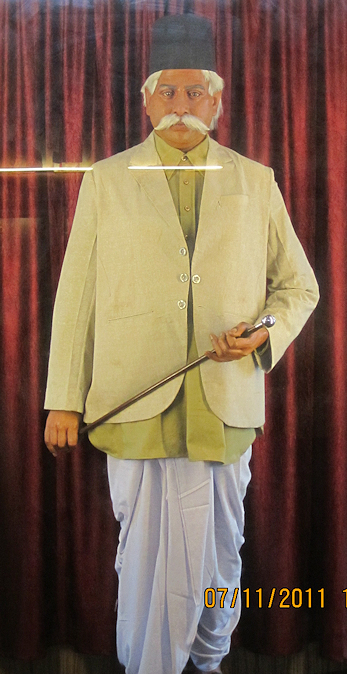
Abb.: Hedgewar, Keshav Baliram (Marathi: केशव बळीराम
हेडगेवार, 1889 - 1940), Statue
im Hauptquartier des RSS in Nagpur (Marathi: नागपूर),
2011
[Bildquelle: Katyare/Wikimedia. --
Public
domain]
Einer der ersten Swayamsevaks (Hindi: स्वयंसेवक) wird Prabhakar Balwant Dani (Marathi: प्रभाकर बलवन्त दाणी, 1907 - 1965)
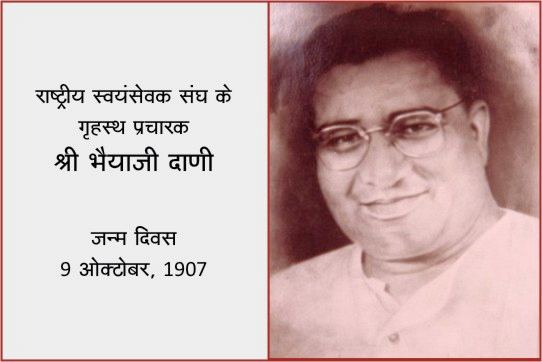
Abb.: Prabhakar Balwant Dani (Marathi: प्रभाकर बलवन्त दाणी,
1907 - 1965)
[Fair use]
Wikipedia: https://en.wikipedia.org/wiki/Prabhakar_Balwant_Dani. -- Zugriff am 2018-03-22
1926 führt Hedgewar eine Uniform ein. Entwicklung der Uniform:
- 1925 Khakhi shirt and shorts with a black cap and military-style, ankle length black boots
- 1939 Khakhi shirt replaced with white shirt
- 1974 Military-style boots replaced with black shoes
- 2010 Black leather belt replaced with synthetic black belt
- 2016 Khakhi shorts replaced with brown coloured trousers and socks
Brown sweater introduced[Quelle: https://www.livemint.com/Politics/Rker0Eokbrod0gOQA6Ch7L/The-evolution-of-the-RSS-uniform.html. -- Zugriff am 2018-03-22. -- Fair use]
Abb.: RSS-Uniform, 2005
[Bildquelle: Mar.de/Wikimedia. -- CC-BY-SA 3.0]
Keshav Baliram Hedgewar (Marathi: केशव बळीराम हेडगेवार, 1889 - 1940) ist Sarsanghchalak (Hindi: सरसंघचालक) des RSS
Sholapur (Marathi: सोलापूर): Eine Hinduprozession, die an einer Moschee vorbeizieht, führt zu blutigen communal riots zwischen Muslimen und Hindus.
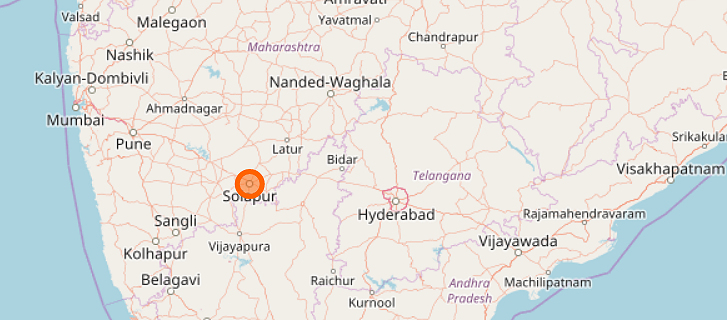
Abb.: Lage von Sholapur (Marathi: सोलापूर)
[Bildquelle: © OpenStreetMap-Mitwirkende.
--
CC BY-SA 2.0]
Es erscheint:
Savarkar, Vinayak Damodar [विनायक दामोदर सावरकर] <1883 - 1966>: Hindu Pad-Padashahi : a review of the Hindu empire of Maharashtra. -- Madras : Paul, 1925. -- 293 S. -- Online: https://archive.org/details/in.ernet.dli.2015.81340. -- Zugriff am 2018-05-03
Sir Abdul Rahim (Urdu: عبد الرحيم)
"So sober a person as Sir Abdul Rahim [عبد الرحيم], in his presidential address to the session of the Muslim League held in Aligarh [Hindi: अलीगढ़] on 30th December 1925, gave expression to this bitterness caused by Hindu tactics wherein he "deplored the attacks on the Muslim community in the form of Shuddhi, Sangathan and Hindu Maha Sabha movements and activities led by politicians like Lala Lajpat Rai [Panjabi: ਲਾਲਾ ਲਾਜਪਤ ਰਾਏ, ]1865 - 1928] and Swami Shradhanand [Hindi: स्वामी श्रद्धानन्द सरस्वती, 1856 - 1926]"
and said
"Some of the Hindu leaders had spoken publicly of driving out Muslims from India as Spaniards expelled Moors from Spain. Musalmans would be too big a mouthful for their Hindu friends to swallow. Thanks to the artificial conditions under which they lived they had to admit that Hindus were in a position of great advantage and even the English had learned to dread their venomous propaganda. Hindus were equally adept in the art of belittling in every way possible the best Musalmans in public positions excepting only those who had subscribed to the Hindu political creed. They had in fact by their provocative and aggressive conduct made it clearer than ever to Muslims that the latter could not entrust their fate to Hindus and must adopt every possible measure of self-defence."—All-India Register, 1925, Vol. II, p. 356."
[Zitiert in: Ambedkar, B. R. [भीमराव रामजी आंबेडकर] <1891 - 1956>: Pakistan or The partition of India. -- 3. ed. -- Bombay : Thackers, 1946. -- S. 342, Fußnote]
S. Ramanathan (Tamil: எஸ்.ராமநாதன், 1896–1970) gründet das Self-Respect Movement (Tamil: சுயமரியாதை இயக்கம்). Vorsitzender wird E. V. Ramasami (alias Periyar, Tamil: ஈ. வெ. ராமசாமி, 1879–1973).
Wikipedia: https://de.wikipedia.org/wiki/Selbstachtungsbewegung / https://en.wikipedia.org/wiki/Self-Respect_Movement. -- Zugriff am 2018-05-18
Es erscheint:
पोद्दार, हनुमान प्रसाद [Poddar, Hanuman Prasad] <1892–1971>: स्त्री धर्म प्रश्नोत्तरी [Fragen und Antworten zum Dharma der Frauen]. -- Gorakhpur : Gita Press, 1926. -- 46 S.
Gesamtauflage bis 2015: über 1 Million Exemplare
Abb.: Einbandtitel einer Neuausgabe
[Fair use]
Zitate:
"The most important dharma for a woman is loyalty to her husband ... Her entire purpose should be to make her husband happy." "Men have a different dharma. To argue that since men do not follow their own dharma, women should also give theirs up, is neither justified nor a valid argument. For us (women) it is important to follow our own dharma. Whatever be the husband’s behaviour towards us, it is not the job of a pious and devout wife to assess him. I am of the firm belief that if a wife is devoted to her husband, her purity of heart can bring him back to the right path."
"The money paid for [lac] bangles goes to Muslims and is occasionally used against our religion. Also, one has to touch Muslim men. Therefore, women should wear swadeshi glass bangles."
"Savitri reiterates that for a woman there is no God greater than her husband whose fee she should touch and wash every day—the water that washes her husband's feet is as pure as any holy water."
- "Keep the house clean, put things in order.
- Spend less than the income; keep a tab on the expenditure.
- Have knowledge about how to protect health.
- Take care of the children; pass on to them your character and knowledge.
- Do all the household work with your own hands.
- Know the family’s relatives and friends and behave with them as required.
- Never feel lazy.
- Have knowledge about religion and show enthusiasm in religious activities.
- Be munificent.
- Serve your husband, suppressing carnal desire in a sweet voice and with love; keep your husband satisfied.
- Be content with whatever is given.
- Do not encourage buying of luxurious items.
- Speak sweetly.
- Remain alert and retain purity.
- Be affectionate to all relatives and friends of your husband; all your actions should enhance your husband’s name, fame, wealth and happiness."
"Husband is the pilgrim centre, husband is the fast, husband is God and husband is the respected guru."
[Alle Zitate übersetzt in: Mukul, Akshaya [अक्षय मुकुल]: Gita Press and the making of Hindu India. -- Noida : HarperCollins, 2015. -- 540 S. -- ISBN 978-93-5177-230-9 . -- S. 360ff. -- Fair use]
Zwölf Regeln des Dharma für Witwen:
- "A woman should become sati after her husband’s death. This is considered illegal today, but dying on her husband’s pyre is not the sole way of becoming sati. A widow should consider God as her husband and immerse herself in worship, suppressing her inner desire. This is how one becomes sati.
- A widow should detach herself from worldly pleasures and study texts like the Gita and Ramayana that inculcate the virtues of gyan (knowledge), vairagya (renunciation) and bhakti (devotion).
- A widow should not participate in festivities. She should avoid listening to conversations of young girls and married women, discard jewels, stop braiding her hair, eating paan (betel leaf) or using any aromatic product. (As an afterthought, or probably to keep up the pretence of being a reformist, Stri Dharma Prashnottari explains why widows should shun festivities—it is not, as popularly believed, that the shadow of a widow is inauspicious, but that a woman has uncontrollable sexual urges that need to be kept in check. ‘They are advised not to attend festivities so that the pomp and glitter do not cause deterioration of mind.’)
- To the maximum possible extent, a widow should sleep on the floor, avoid a soft bed, eat food that does not provoke desire and wear hand-spun thick clothes and not colourful garments.
- Widows should resist eight kinds of sexual union (maithuna). These are: seeing a man; touching a man or woman; enjoying the company of another in a lonely place; talking to others; reading or talking about a man or woman; playing together; thinking about a man or woman; and actual sexual intercourse.
- A widow should undertake fasts without water or food.
- A widow must not sit idle, but immerse herself in household work.
- A widow should attend religious and moral lectures, and completely give up bad company.
- A widow must remain within the control of rakshaks (protectors) like her mother-in-law, father-in-law, jeth (husband’s elder brother), devar (husband’s younger brother), father, mother or brother. She should not do anything without the permission of the rakshak.
- A widow is advised not to talk too much or express anger; to stay happy by remaining helpless; to believe in religion and never let the heart be led astray.
- A widow must not sit in the company of young women, but always be with elderly women who strictly follow dharma. As regards immoral women, widows should not even glimpse them.
- If a widow has money, it should be spent on the impoverished, orphans and other widows. If a widow does not have enough money, she should earn to survive and never ask anyone for monetary help."
[Quelle: Mukul, Akshaya [अक्षय मुकुल]: Gita Press and the making of Hindu India. -- Noida : HarperCollins, 2015. -- 540 S. -- ISBN 978-93-5177-230-9 . -- S. 372f. -- Fair use]
Calcutta (Bengali: কলকাতা): Ausschreitungen zwischen Muslimen und Hindus.
100 Tote
974 Verletzte
40 blutige Ausschreitungen zwischen Hindus und Muslimen, vor allem in Bengal, Punjab (Panjabi: ਪੰਜਾਬ) und United Provinces.
197 Tote
1598 Verletzte
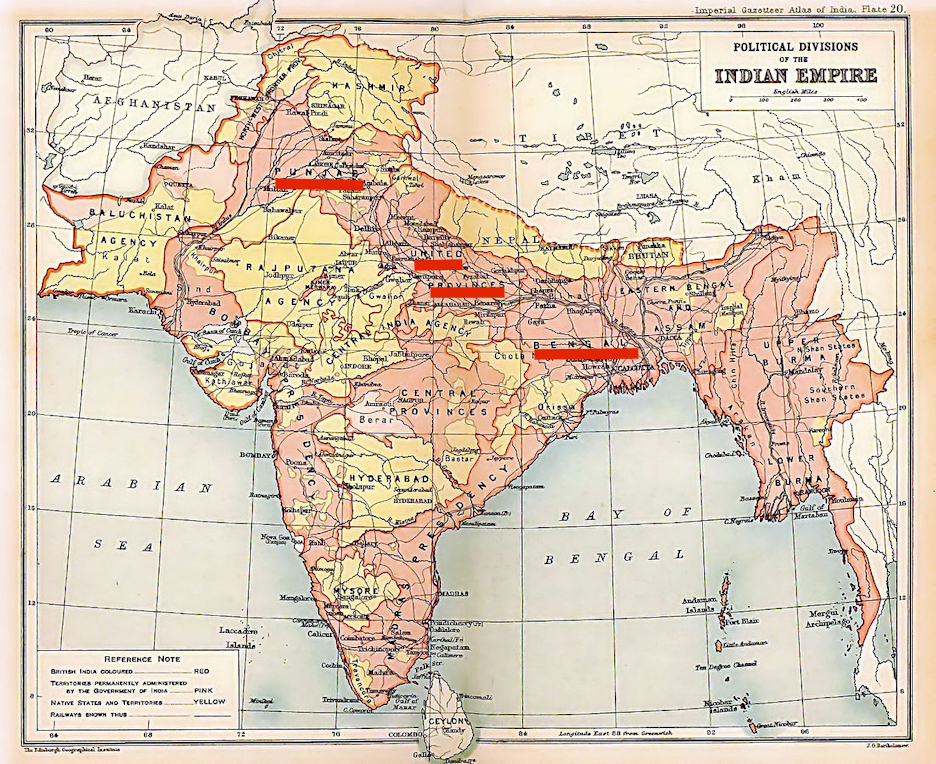
Abb.: Lage von Bengal, United Provinces und Punjab (Panjabi: ਪੰਜਾਬ)
[Public domain]
Maulana Akbar Shah Khan von Najibabad (Urdu: مولانا اکبر شاہ نجیب آبادی) will die Schlacht von Panipat (Hindi: पानीपत, 1761) wiederholen, um festzustellen, dass die Muslime den Hindus überlegen sind. Er fordert Pandit Madan Mohan Malaviya (Hindi: मदनमोहन मालवीय, 1861 - 1946) mit folgenden Worten heraus:
"If you Malaviyaji, are making efforts to falsify the result at Panipat, I shall show you an easy and an excellent way (of testing it). Use your well-known influence and induce the British Government to permit the fourth battle of Panipat to be fought without hindrance from the authorities. I am ready to provide. . . .a comparative test of the valour and fighting spirit of the Hindus and the Musalmans. . . .As there are seven crores of Musalmans in India, I shall arrive on a fixed date on the plain of Panipat with 700 Musalmans representing the seven crores of Muslims in India and as there are 22 crores of Hindus I allow you to come with 2,200 Hindus. The proper thing is not to use cannon, machine guns or bombs: only swords and javelins and spears, bows and arrows and daggers should be used. If you cannot accept the post of generalissimo of the Hindu host, you may give it to any descendant of Sadashivrao [Marathi: सदाशिवरावभाऊ, 1730 - 1761] or Vishwasrao [Marathi: विश्वासराव पेशवे, 1741 - 1761] so that their scions may have an opportunity to avenge the defeat of their ancestors in 1761. But any way do come as a spectator; for on seeing the result of this battle you will have to change your views, and I hope there will be then an end of the present discord and fighting in the country. . . .In conclusion I beg to add that among the 700 men that I shall bring there will be no Pathans [Panjabi: پٹھان] or Afghans [Pashtu: افغان] as you are mortally afraid of them. So I shall bring with me only Indian Musalmans of good family who are staunch adherents of Shariat [شريعة]." [Zitiert in: Ambedkar, B. R. [भीमराव रामजी आंबेडकर] <1891 - 1956>: Pakistan or The partition of India. -- 3. ed. -- Bombay : Thackers, 1946. -- S. 303f.]
Wikipedia: https://de.wikipedia.org/wiki/Dritte_Schlacht_von_Panipat / https://en.wikipedia.org/wiki/Third_Battle_of_Panipat. -- Zugriff am 2018-03-07
Balakrishna Shivram Moonje (Maharati: बाळकृष्ण शिवराम मुंजे, 1872 – 1948) in Swarajya <Madras>:
"A key Hindu leader of Maharashtra and the political guru of the RSS founder K.B. Hedgewar, Moonje was the president of the Akhil Bharatiya Hindu Mahasabha from 1927 to 1937. He believed that Hindus were living under two types of domination: ‘the political domination of the British based on their strongest of Machine guns and the domination of Mahomedans based on their aggressive mentality’.
Instead of countering the British, he identified Muslims as the principal enemy of the Hindus."
[Quelle: Jha, Dhirendra K.: Shadow armies : fringe organizations and foot soldiers of Hindutva. -- New Delhi : Juggernaut, 2017. --229 S. -- ISBN 978-93-8622-824-6. -- S. 166. -- Fair use]
Erstes Heft der Zeitschrift कल्याण (Kalyan). -- 139 S. -- Teilweise online: http://www.kalyan-gitapress.org/pdf_full_issues/pravesh_ank_1926.pdf. -- Zugriff am 2018-06-18
"Kalyan is a monthly spiritual magazine in Hindi published by Gita Press Gorakhpur
(Hindi: गीता प्रेस गोरखपुर)
Webpräsenz:
http://www.kalyan-gitapress.org/. -- Zugriff am 2018-02-28
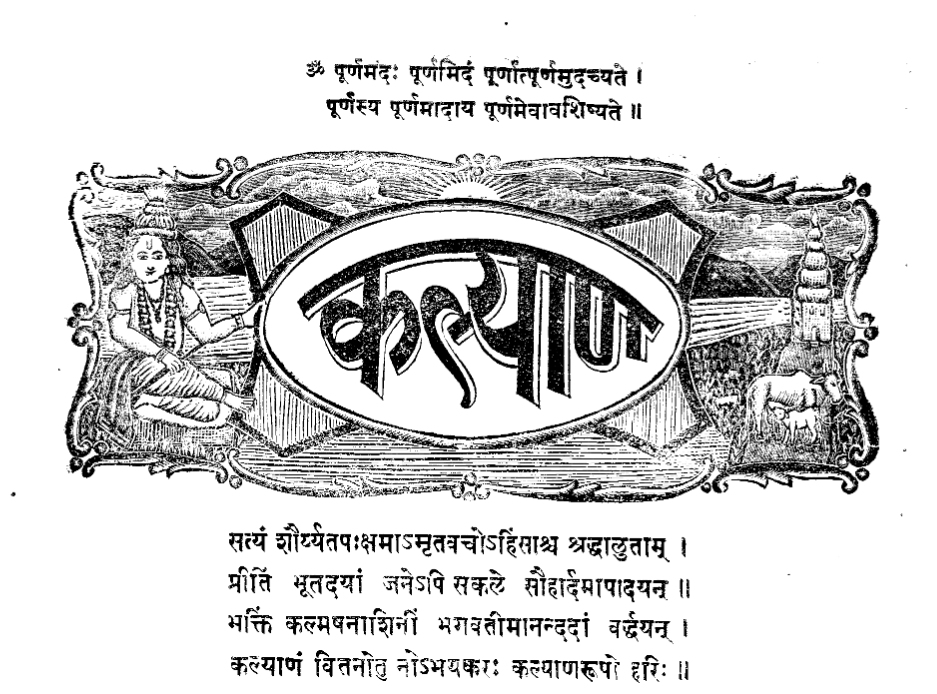
Abb.: Titelleiste des ersten Hefts
[Fair use]
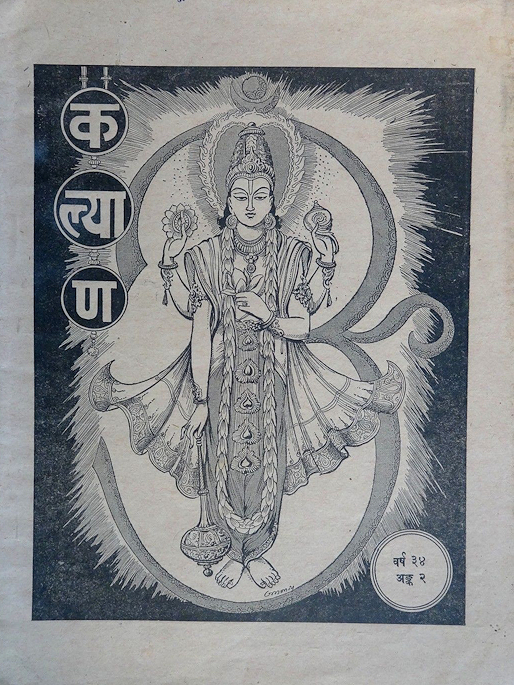
Abb.: Einbandtitel eines Hefts, 34. Jahrgang
[Fair use]
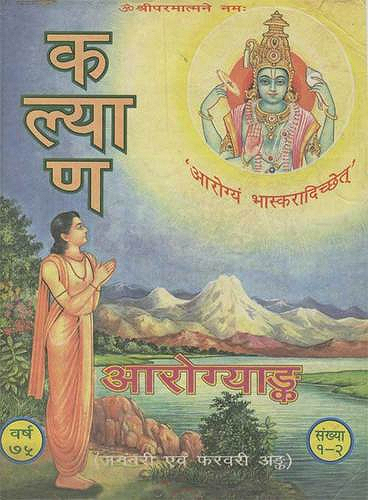
Abb.: Einbandtitel eines Hefts, 75. Jahrgang
[Fair use]
Delhi (Hindi: दिल्ली): es erscheint
Shraddhanand <Swami> [स्वामी श्रद्धानन्द] <1856 - 1926>: Hindu sangathan : saviour of the dying race. -- [Delhi], 1926. -- 141 S. -- Online: https://archive.org/details/HinduSangthanBySwamiShraddhanandEnglish. -- Zugriff am 2018-03-17
"Basis for Hindu Sangathan. The above fourfold remedies in my humble opinion, constitute the basis of real Hindu Sangathan [Hindi: हिन्दू साम्गठन] : the success of all the minor resolutions passed by the Hindu Mahasabha [Hindi: हिन्दू महासभा] depend upon the right application of these remedies.
It is true that (गोरक्षा) protection of the cow is a powerful factor not only in giving the Hindu community a common plane for joint action but in contributing to the physical development and strength of its several members. But if the drain upon the depressed classes continues and they go on leaving their ancestral religion on account of the social tyrany of their co-religionists and the onrush of Hindu widows towards prostitution and Muhammadaniam, on account of the brutal treatment of their relations, is not stopped by allowing them to remarry in their own community, the number of beef-eaters will increase and Gauraksha will remain only a dream of unpractical sentimentalists.
And what would the Hindu Raksha Sangham be able to accomplish against the inroads of Non-Hindu Gundas [गुंडा], if their own house is not in order? The best way to avoid conflict with Muhammadans is to take care of your own women and children.
The introduction of uniform Devanagari [देवनागरी] script and Hindi lingua franca throughout is absolutely necessary, because a common language brings all the individuals speaking that language nearer one another in thought and action, but unless caste and sectarian prejudices vanish there is no likelihood of a common language and literature being evolved.
The salvation of the community depends upon common action taken by the Hindu Samaj [हिन्दू समाज] as a whole, but individual salvation is the lookout of individuals. Theoretical Dharma is connected with individual salvation and, therefore, there is room for theists, pantheists, henotheists and even atheists in the broad lap of the organized Hindu Samaj. But the code of practical Dharma has to do with the community as a whole and, therefore here the plea of individual Dharma should not be allowed to prevail nor should it hamper the efforts of the organized Hindu Samaj towards national salvation.
The First Step.
The question naturally arises—What is the first step to be taken in our advance towards Hindu Sangathan ? In my tour throughout India I have seen educated Hindus reluctant to mix with each other. It is only on rare occasions that they meet to discuss common social problems. The reason is that they have no common meeting place. Their sectarian temples have not sufficient space where even a hundred or two could sit together. In Delhi, besides the Jama and Fatehpuri mosques which can accommodate big audiences consisting of 25 to 30 thousands of Muhammadans, there are several old mosques which can serve as meeting places for thousands. But for Hindus, the only enclosed meeting place is Lakshmi Narayana's Dharmsala which can hardly accommodate some 8 hundred, with this difference that while the Muhammadan meeting are free from all noise, the hubbub of voices from travellers in the Dharamshala hardly allows the speakers to be distinctly heard.
The first step which I propose is to build one Hindu Rashtra Mandir [हिन्दू राष्ट्र मन्दीर] at least in every city and important town, with a compound which could contain an audience of 25 thousands and a hall in which Katha [कथा] from Bhagavad Gita [भगवद्गीता], the Upnishads [उपनिषद्] and the great epics of Ramayana [रामायण] and Mahabharat [महाभारत] could be daily recited. The Rashtra Mandir will be in charge of the local Hindu Sabha [हिन्दू सभा] which will manage to have Akharas [अखाड़ा] for wrestling and gatka [gatka] etc. plays in the same compound. While the sectarian Hindu temples are dominated by their own individual deities, the Catholic Hindu Mandir should be devoted to the worship of the three mother-spirits [मातृशक्ति] the Gau-mata [गौमाता], the Saraswati-mata [सरस्वतीमाता] and the Bhumi-mata [भूमिमाता]. Let some living cows be there to represent plenty, let 'Savitri' [= Gayatri Manta - Sanskrit: गायत्री मन्त्रम]) be inscribed over the gate of the hall to remind every Hindu of his duty to expel all ignorance and let a life-like map of Mother-Bharat be constructed in a prominent place, giving all its characteristics in vivid colours so that every child of the Matri-Bhumi [मातृभूमि] may daily bow before the Mother and renew his pledge to restore her to the ancient pinnacle of glory from which she has fallen !
If a beginning, on lines proposed by me in all humility and love, is made with faith, I hope that all the necessary reforms will follow, as night is followed by the day, and the progeny of the ancient Aryans will once more step forward to give salvation to humanity."
[a.a.O., S. 109 - 112]
Der Muslim Abdul Rashid (Hindi: अब्दुल रशीद) ermordet den Arya Samaj Missionar Swami Shraddhanand (Hindi: स्वामी श्रद्धानन्द सरस्वती, 1856–1926)
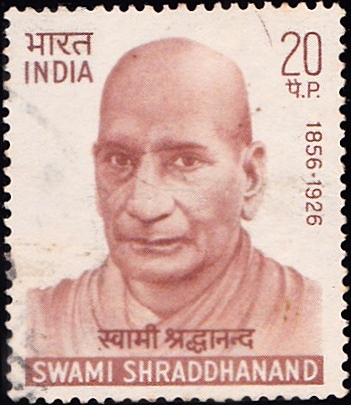
Abb.: Briefmarke: Swami Shraddhanand (Hindi: स्वामी श्रद्धानन्द सरस्वती,
1856–1926)
[Fair use]
Wikipedia: https://en.wikipedia.org/wiki/Swami_Shraddhanand. -- Zugriff am 2018-03-05
Der Arya Samaj gründet Arya Vir Dal [Hindi: आर्य वीर दल] ("Arya Heroes' Organisation") zum Training in Selbstverteidigung
Webpräsenz: http://aryaveerdal.org/. -- Zugriff am 2018-04-07
Es erscheint:
चमूपति, एम्, ए. [M. A. Chamupati]: रंगीला रसूल [Rangila Rasul] : हजरत मौहम्मद साहब का जीवन चरित्र
Der Herausgeber ist: राजपाल (Rajpal, ermordet 1929-04-06)
Es ist eine Reaktion auf सीताका छिनाला [Sitaka Chinala - Sita die Hure], ein muslimisches Pamphlet, das Sita [सीता], die Frau Ramas [राम], als Prostituierte bezeichnet.
Abb.: Einbandtitel einer späteren Ausgabe
Wikipedia: https://en.wikipedia.org/wiki/Rangila_Rasul. -- Zugriff am 2018-03-05
Es erscheint:
Radhakrishnan, S. (Sarvepalli) [சர்வபள்ளி இராதாகிருஷ்ணன்] <1888 - 1975>: The Hindu view of life : Upton lectures delivered at Manchester college, Oxford, 1926. -- London : Allen & Unwin, 1927. -- 133 S. -- Online: https://archive.org/details/HinduViewOfLifeRadhakrishnanS.1954. -- Zugriff am 2018-05-11.
Abb.: Umschlagtitel der 13. Aufl.
"Hindu thought believes in the evolution of our knowledge of God. We have to vary continually our notions of God until we pass beyond all notions into the heart of the reality itself, which our ideas endeavour to report. Hinduism does not distinguish ideas of God as true and false, adopting one particular idea as the standard for the whole human race. It'accepts the obvious fact that mankind seeks its goal of God at various levels and in various directions, and feels sympathy with every stage of the search. The same God expresses itself at one stage as power, at another as personality, at a third as all-comprehensive spirit, just as the same forces which put forth the green leaves also cause the crimson flowers to grow. We do not say that the crimson flowers are all the truth and the green leaves are all false. Hinduism accepts all religious notions as facts and arranges them in the order of their more or less intrinsic significance. The bewildering polytheism of the masses and the uncompromising monotheism of the classes are for the Hindu the expressions of one and the same force at different levels. Hinduism insists on our working steadily upwards and improving our knowledge of God. " The worshippers of the Absolute are the highest in rank; second to them are the worshippers of the personal God ; then come the worshippers of the incarnations like Rama, Krsna, Buddha ; below them are those who worship ancestors, deities and sages, and lowest of all are the worshippers of the petty forces and spirits." Again, " The deities of some men are in water (i.e. bathing-places), those of the more advanced are in the heavens, those of the children (in religion) are in images of wood and stone, but the sage finds his God in his deeper self." " The man of action finds his God in fire, the man of feeling in the heart, and the feebleminded in the idol, but the strong in spirit find God everywhere." The seers see the Supreme in the self, and not in images." [a.a.O., S. 31f. -- Fair use]
Wikipedia: https://de.wikipedia.org/wiki/S._Radhakrishnan / https://en.wikipedia.org/wiki/Sarvepalli_Radhakrishnan. -- Zugriff am 2018-05-11
Vinayak Damodar Savarkar (Marathi: विनायक दामोदर सावरकर, 1883 - 1966) zu Bekehrung und Rückbekehrung:
"Is the re-conversion childish? Our opponents say that it is childish to stop conversion of the fallen, criminals and convicts, though they were born as Hindus. But they never asked ‘why have the Muslims been waging war on Hindus for the last thousand years to convert even these criminals to Islam?’ You say that Muslims are fanatics. So, why
are even the educated, enlightened Europeans and Americans playing the same game? Why are they collecting millions of pounds and sending missionaries to Indian villages and even forests and try to convert the poor and even tribal Hindus to Christianity by hook or crook? Why are they playing this childish game? (p 283)
You say what good are such fools and greedy people to our Hindu society? I say, “What good are they to Muslim or Christian societies? Why are they so obsessed with the conversion of those? We will accommodate the crafty and vicious criminals. Why do Muslims and Christians want to defile their societies with such converts? They should stop their conversion. Then Hindus too would have no reason to play the childish game in return.”
But, if this conversion and re-conversion is not childish and on the other hand these foreign kings, rich businessmen, priests and learned men and women feel the need for conversion of Hindus in order to dominate India we Hindus too have a right to defend our culture and civilisation and religion for the good of the world. You must understand the gravity of our efforts.
I say to Muslims and Christians, ‘Why do you want to spread your religion among the fallen, drunks, and vicious criminals? For uplifting their souls? Then for the same reason we too feel that they should remain Hindus.’ As Lord Krishna said, “swadharme nidhanam shreyah. Paradharmo bhayavahaha.” Better to remain a poor Hindu than embracing an alien religion.
We need to seek salvation precisely for the fallen onesYou want to convert Hindus to your religion, no matter how vicious or fallen they may be. And you do so by offering him easier work, by providing substances such as tobacco, at times even by threatening to kill. Why? To increase your numbers and thereby your strength. It is precisely for that reason that we too want them back in our fold. Hence we re-convert them back to Hindu religion.
It is well known that once a person is converted from Hindu religion and forcibly kept in Islam or Christianity his progeny automatically becomes Muslim or Christian and increases the number of useful citizens belonging to those religions. There is no rule that the progeny of thieves and convicts also become thieves and scoundrels. England sent away such rejects of their society who in turn created states like Canada and Australia. These criminals are like fertilisers for farming. ‘Human body rejects’ create fertilisers that help grow crops. In a similar manner the criminals would create new societies and their progenies be useful to your religions.
It is therefore our policy to prevent at all costs the conversion of any Hindus. We will try our best to re-convert those who left Hindu religion in the past. A Hindu thief is less harmful than a Muslim thief. A Hindu thief will only steal but not break idols in a temple. A Muslim thief will not only steal but also destroy an idol in a temple and strike a blow at a Hindu cursing him as a Kafir. We must always remember that such possibility is always very likely.
Therefore I always preached, “if you cannot stop being a thief or cannot stop drinking, that is understandable but do not leave our fold. Remain a Hindu. It is a crime to steal. But it is thousand times worse to leave the Hindu fold.” For centuries we allowed exodus of our men under false and stupid notions of purity. We allowed the downtrodden of our society to leave Hindu religion by proclaiming ‘his religion is his business.’ And the result? We created hundreds of arch-enemies. Moplas from Kerala were originally Hindus. By royal order of a Hindu King, half the family members were converted to Islam so that they became seafarers. Today, they have lost their identity and have become the most ardent enemies of Hindus. That was the result of cutting of pony tail and growing beard I! (pp 284/5)
Childish play of the elderlyIt is therefore of utmost importance to keep even the most wicked or useless criminals in the Hindu fold and to bring back those who left our religion. Even if they remain Hindus for names sake that should be our objective. Mopla riots of Malbar in 1920 were the result of our forefathers not having played that childish game mentioned above. It is a social need. It is also a spiritual need. May be one of them could become like Valmiki who composed Ramarayan! Valhya was a highway robber and a murderer. He was told by a sage to recite the name of RAM for his salvation. He could not say that. He could only say Mara (you die). The sage told him, ‘carry on reciting’ Mara Mara eventually became Ram Ram and Valhya became the sage Valmiki. So do keep even the scoundrels in the Hindu fold. If anything, it would be good for them.
(My transportation for life pp 281-286)
Don’t advocate conversion by terror“Everyone should be free to preach their own religion/ faith/ way of life by convincing logically. The trouble with Muslims is that they would not hesitate to resort to violence, thuggery, massacres, abduction and rape to achieve their objective. Christians used the same methods. But recently they have changed to civilised manners. Though we blame the Muslims for their methods Hindus are equally responsible for providing opportunities to them by clinging to the short sighted and foolish traditions.”
“Hindus need to abandon two harmful notions. They should be prepared to accept clean food and water from anyone irrespective
of religion. They should accept that even if they were forced to take unholy water or food, to do so places them at no disadvantage and they remain forever Hindus. Then Muslims will have no alternative but to stop their conversions. I sincerely believe that. It will also be necessary to welcome back those who became Muslims because of our rigid notions about food and water.”
We need to re-convert those whom we abandonedTo be honest, we do not need to purify those who were forced to accept other religions. We need to purify ourselves because we were brutal in not accepting those people back in the Hindu fold. We kept them in the chains of other religions.
In this way, on the one hand it would become more difficult for Muslims to convert Hindus, even harder to retain those converted in their fold. They can convert by logically arguments. But then those can also revert back to Hindu religion. This will remove the main source of anger among Hindus who see their brethren being forcibly converted to Islam. After all both communities no longer possess military power. There is no harm in propagating their religions by logical approach.
I have always maintained that our movement to mobilise the Hindus (sanghatan) and the re-conversion (shuddhi) will lead to peace between Hindus and Muslims. I raised objection to forcible conversion by Muslims for the first time in 1913. From that year till my stay in Andaman Islands and subsequently in jails in India and from 1924 when I agreed to stay in internment, I have been busy in this work.
(My transportation for life p 326)"
[Zitiert in: Godbole, V. S. (Vasudev Shankar) [वासुदेव शंकर गोडबोले] <1941 - >: Rationalism of Veer Savarkar. -- Thane : Itihas Patrika, 2004. -- 696 S. ; 23 cm. -- Online: https://archive.org/details/RationalismOfVeerSavarkarGodboleV.S. -- Zugriff am 2018-05-15. -- S. 91 - 95. -- Fair use]
25 blutige communal riots zwischen Muslimen und Hindus:
103 Tote
1084 Verwundete
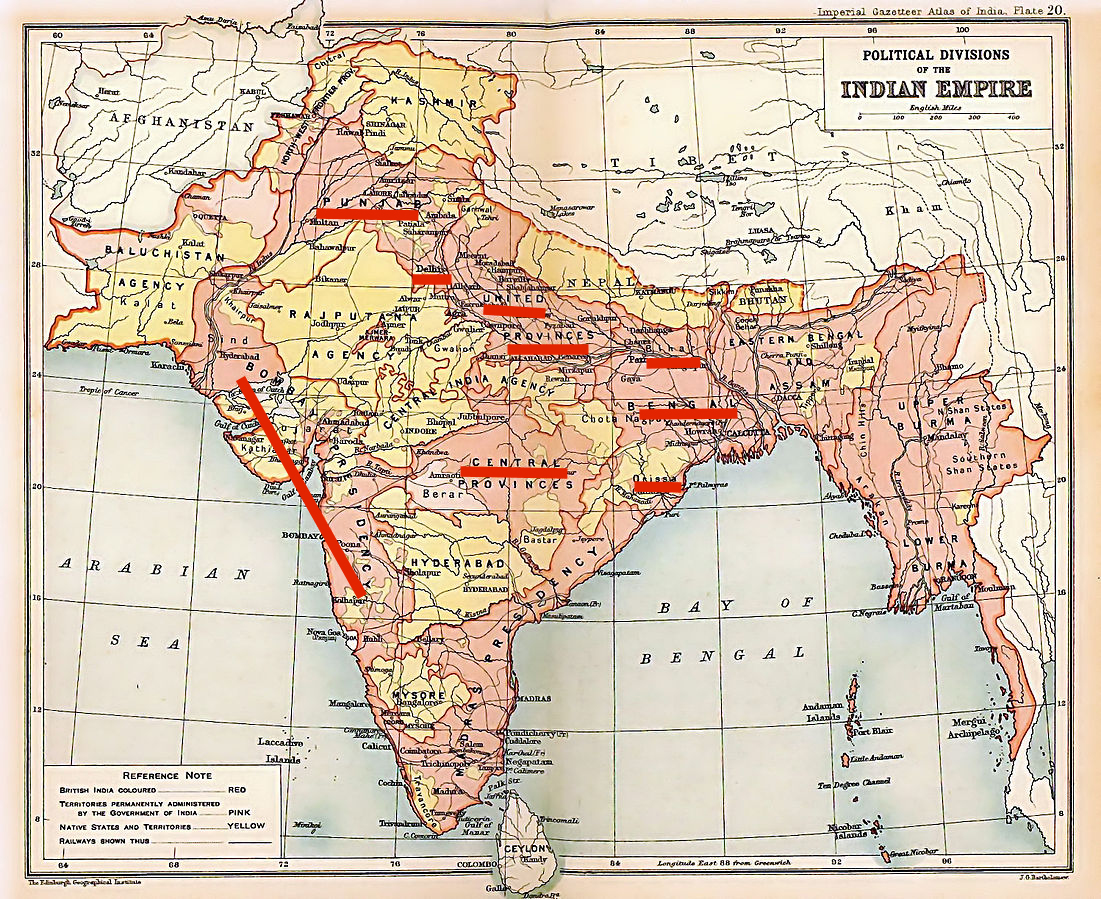
Abb.: Lage der genannten Provinzen
[Public domain]
Blutige communal riots zwischen Muslimen und Hindus in Lahore (Panjabi: ਲਾਹੌਰ).
27 Tote
272 Verletzte
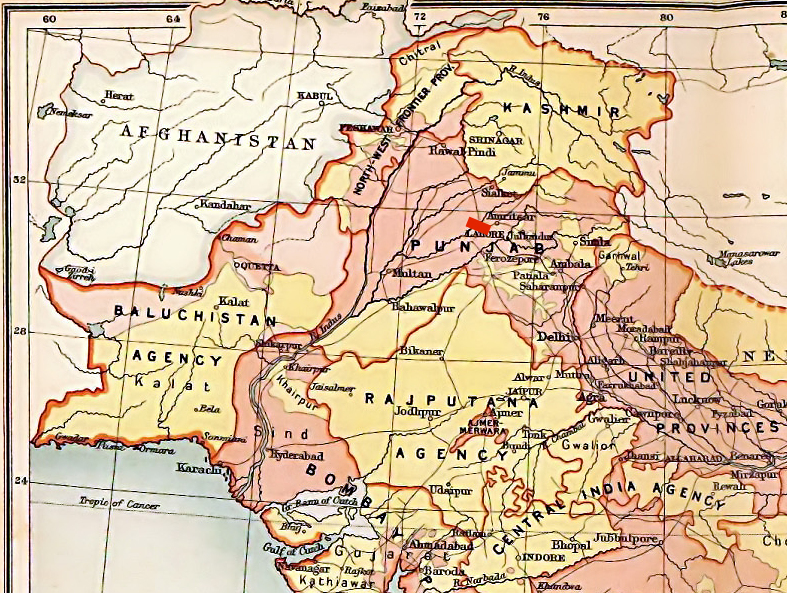
Abb.: Lage von Lahore (Panjabi: ਲਾਹੌਰ)
[Public domain]
Vertreibung von Hindus durch Muslime wegen
चमूपति, एम्, ए. [M. A. Chamupati]: रंगीला रसूल [Rangila Rasul] : हजरत मौहम्मद साहब का जीवन चरित्र
(siehe oben)
"The excitement over the Rangila Rasul [रंगीला रसूल] case had by now travelled far from its original centre and by July had begun to produce unpleasant repercussions on and across the North-West Frontier. The first signs of trouble in this region became apparent early in June, and by the latter part of July the excitement had reached its height. On the British side of the border, firm and tactful handling of the situation by the local authorities averted, what would have been a serious breach of the peace. Economic boycott of Hindus was freely advocated in the British Frontier Districts, especially in Peshawar [Pashto: پېښور], but this movement met with little success, and although the Hindus were maltreated in one or two villages, the arrest of the culprits, together with appropriate action under the Criminal Law, quickly restored order. Across the border however, the indignation, aroused by these attacks on the Prophet, gave rise to more serious consequences. The Frontier tribesmen are acutely sensitive to the appeal of religion and when a well-known Mullah started to preach against the Hindus among the Afridis [Pashto: اپريدی] and Shinwaris [Pashto: شينواري] in the neighbourhood of the Khyber Pass [Pashto: د خیبر درہ], his words fell on fruitful ground. He called upon the Afridis and Shinwaris to expel all the Hindus living in their midst unless they declared in writing that they dissociated themselves from the doings of their co-religionists down country. The first to expel their Hindu neighbours were two clans of the Khyber Afridis, namely the Kuikhel [Kuki Khel -- کوکي خېل.] and Zakkakhel [Zakha Khel], on the 22nd July. From these, the excitement spread among their Shinwari neighbours, who gave their Hindu neighbours notice to quit a few days later. However, after the departure of some of the Hindus, the Shinwaris agreed to allow the remainder to stay on. Some of the Hindus on leaving the Khyber were roughly handled. In two cases, stones were thrown, though happily without any damage resulting. In a third case, a Hindu was wounded and a large amount of property carried off, but this was recovered by Afridi Khassadars in full, and the culprits were fined for the offence. Thereafter, arrangements were made for the picketing of the road for the passage of any Hindu evacuating tribal territory. Under pressure from the Political Agent an Afridi jirga [Pashto: جرګه] decided towards the end of July to suspend the Hindu boycott pending a decision in the Risala Vartman case [May 1927: Amritsar: Publication of a journal Risala Vartman containing derogatory remarks about the Holy Prophet]. In the following week, however, several Hindu families, who had been living at Landi Kotal [Pashto: لنډي کوتل] at the head of the Khyber Pass moved to Peshawar refusing to accept assurances of the tribal chiefs but leaving one person from each family behind to watch over their interests. All told, between four hundred and fifty Hindus, men, women and children, had come into Peshawar by the Middle of August, when the trouble was definitely on the wane. Some of the Hindus were definitely expelled, some were induced to leave their homes by threats, some left from fear, some no doubt from sympathy with their neighbours. This expulsion and voluntary exodus from tribal territory were without parallel. Hindus had lived there for more generations than most of them could record as valued and respected, and, indeed, as essential members of the tribal system, for whose protection the tribesmen had been jealous, and whose blood feuds they commonly made their own. In all, about 450 Hindus left the Khyber during the excitement; of these, about 330 had returned to their homes in tribal territory by the close of the year 1927. Most of the remainder had decided to settle, at any rate for the present, amid the more secure conditions of British India." [Quelle: Ambedkar, B. R. [भीमराव रामजी आंबेडकर] <1891 - 1956>: Pakistan or The partition of India. -- 3. ed. -- Bombay : Thackers, 1946. -- S. 169ff.]
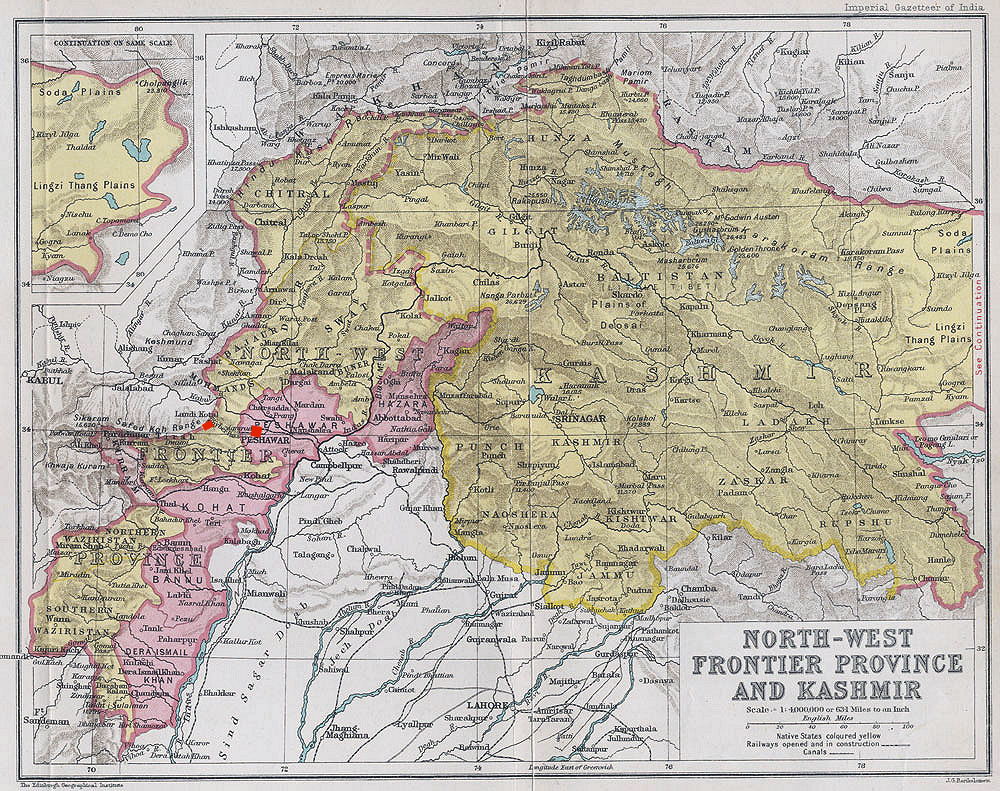
Abb.: Lage von Landi Kotal [Pashto:
لنډي کوتل] und
Peshawar [Pashto: پېښور]
[Public domain]
8 blutige communal riots, vor allem in Multan (Panjabi: مُلتان ) anlässlich von Muharram (Arabisch: (مُحَرَّم
13 Tote
24 Verwundete
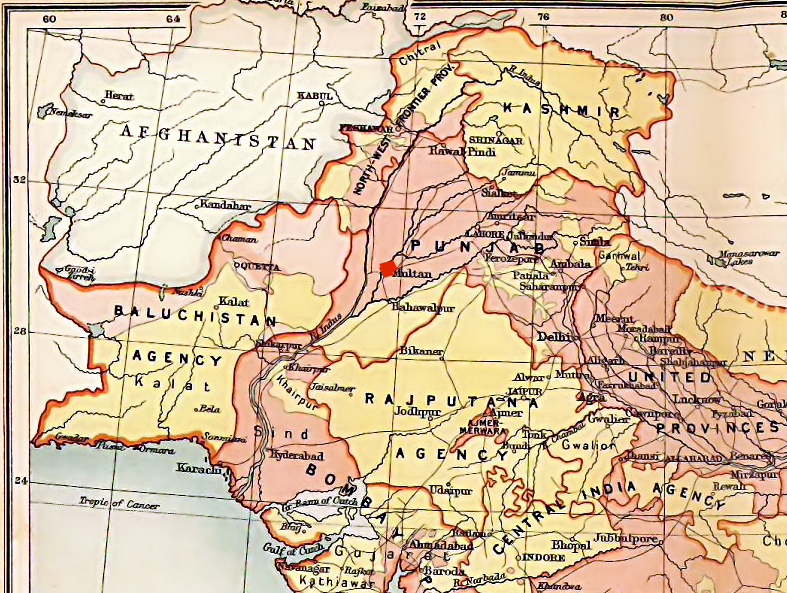
Abb.: Lage von Multan (Panjabi:
مُلتان )
[Public domain]
Neun blutige communal riots zwischen Muslimen und Hindus, zwei mit Todesopfern:
Bettiah: 11 Tote, über 100 Verletzte
Bareilly: 14 Tote, 165 Verletzte
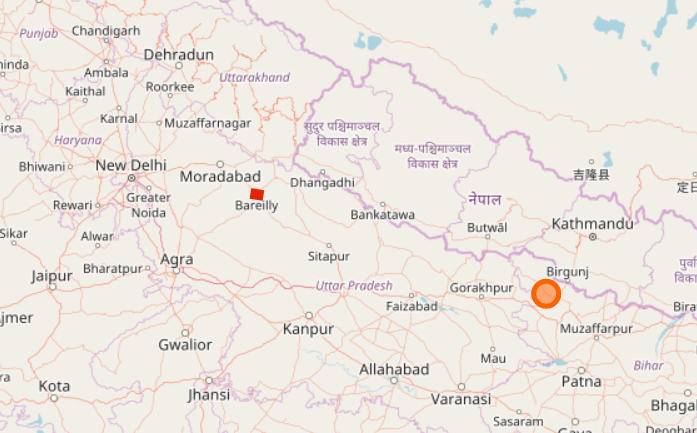
Abb.: Lage von Bettiah und Bareilly
[Bildquelle: © OpenStreetMap-Mitwirkende.
--
CC BY-SA 2.0]
Blutige communal riots zwischen Muslimen und Hindus in Nagpur (Hindi: नागपुर)
19 Tote
123 Verletzte
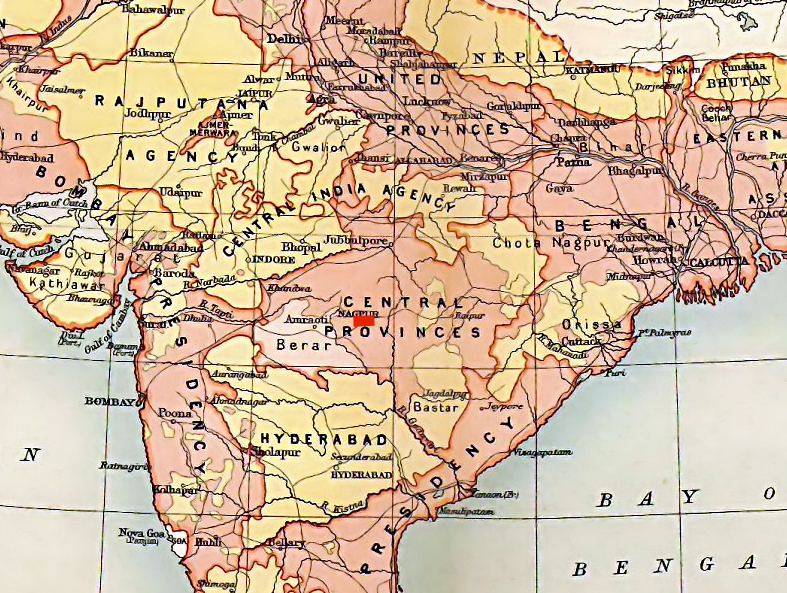
Abb.: Lage von Nagpur (Hindi: नागपुर)
[Public domain]
Wikipedia: https://en.wikipedia.org/wiki/1927_Nagpur_riots. -- Zugriff am 2018-03-05
Calcutta: Registrierung von Gobind Bhawan Karyalaya (Hindi: गोबिन्द भवन कार्यालय) als Trägerorganisation von Gita Press und dazugehörigen Unternehmen.
Webpräsenz: http://gitapress.org/english/Gobind_Bhawan.htm. -- Zugriff am 2018-06-21
Sardar Sundar Singh Majhitia (1872 – 1941) vor der Indian Statutory Commission im Namen der Chief Khalsa Diwan [Panjabi: ਚੀਫ਼ ਖਾਲਸਾ ਦੀਵਾਨ]:
"Sikhs have been a distinct community. From the time of the Gurus they have been a distinct community, and I cannot accept the statement from a rival community that we are not a distinct community; I cannot accept it at all. . . Religiously and socially we are a distinct community, and as such our interests are not identical with those of any other community at all." [Zitiert in: Brass, Paul R. (Richard) <1936 - >: Language, religion and politics in North India. -- Nachdruck der Ausgabe von 1974. -- Licoln : iUniverse, 2005. -- 467 S. -- ISBN 0-595-34394-5. -- S. 284. -- Fair use]
Khwaja Hasan Nizami (خواجہ حسن نظامی) (1873 - 1955):
"In a manifesto on Hindu-Muslim relations issued in 1928, Khwaja Hasan Nizami (خواجہ حسن نظامی) (1873 - 1955) declared: "Musalmans are separate from Hindus; they cannot unite with the Hindus. After bloody wars the Musalmans conquered India, and the English took India from them. The Musalmans are one united nation and they alone will be masters of India. They will never give up their individuality. They have ruled India for hundreds of years, and hence they have a prescriptive right over the country. The Hindus are a minor community in the world. They are never free from internecine quarrels; they believe in Gandhi and worship the cow; they are polluted by taking other people's water. The Hindus do not care for self-government; they have no time to spare for it; let them go on with their internal squabbles. What capacity have they for ruling over men? The Musalmans did rule, and the Musalmans will rule.""[Zitiert in: Ambedkar, B. R. [भीमराव रामजी आंबेडकर] <1891 - 1956>: Pakistan or The partition of India. -- 3. ed. -- Bombay : Thackers, 1946. -- S. 303]
Wikipedia: https://en.wikipedia.org/wiki/Khwaja_Hasan_Nizami. -- Zugriff am 2018-03-07
22 Blutige communal riots zwischen Muslimen und Hindus
204 Tote
Fast 1000 Verletzte
Bakr-Id (Urdu: بقر عید): blutige communal riots zwischen Muslimen und Hindus in
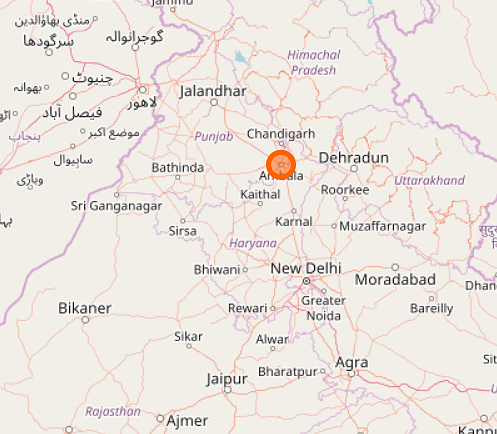
Abb.: Lage von Ambala (अम्बाला)
[Bildquelle: © OpenStreetMap-Mitwirkende.
--
CC BY-SA 2.0]
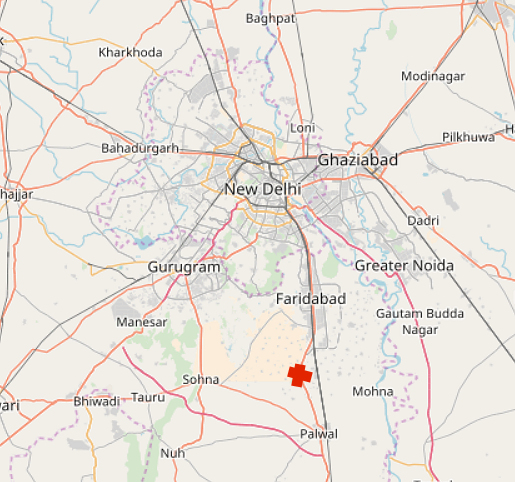
Abb.: Lage von Softa (सॉफ्ट)
[Bildquelle: © OpenStreetMap-Mitwirkende.
--
CC BY-SA 2.0]
"The other riot which took place in Softa village in the Gurgaon District in the Southern Punjab, attained considerable notoriety because of its sensational features. The village of Softa is about 27 miles south of Delhi and is inhabited by Muslims. This village is surrounded by villages occupied by Hindu cultivators who, on hearing that the Muslims of Softa intended to sacrifice a cow on the 'Id Day,' objected to the sacrifice of the particular cow selected on the ground that it had been accustomed to graze in fields belonging to the Hindu cultivators. The dispute over the matter assumed a threatening aspect and the Superintendent of Police of the district accordingly went with a small force of police, about 25 men in all, to try to keep peace. He took charge of the disputed cow and locked it up, but his presence did not deter the Hindu cultivators of a few neighbouring villages from collecting about a thousand people armed with pitchforks, spears and staves, and going to Softa. The Superintendent of Police and an Indian Revenue official, who were present in the village, assured the crowd that the cow, in connection with which the dispute had arisen would not be sacrificed, but this did not satisfy the mob which threatened to burn the whole village if any cow was sacrificed, and also demanded that the cow should be handed over to them. The Superintendent of Police refused to agree to this demand, whereupon the crowd became violent and began to throw stones at the police and to try to get round the latter into the village. The Superintendent of Police warned the crowd to disperse, but to no effect. He, therefore, fired one shot from his revolver as a further warning. Notwithstanding the crowd still continued to advance and the Superintendent had to order his party of police to fire. Only one volley was fired at first, but as this did not cause the retreat of the mob, two more volleys had to be fired before the crowd slowly dispersed, driving off some cattle belonging to the village. While the police were engaged in this affair a few Hindu cultivators got into Softa at another place and tried to set fire to the village. They were, however, driven away by the police after they had inflicted injuries on three or four men. In all 14 persons were killed and 33 were injured. The Punjab Government deputed a judicial officer to enquire into this affair. His report, which was published on 6th July, justified the action of the police in firing on the mob and recorded the opinion that there was no reason to suppose that the firing was excessive or was continued after the mob had desisted from its unlawful aggression. Had the police not opened fire, the report proceeds, their own lives would have been in immediate danger, as also the lives of the people of Softa. Lastly, in the opinion of the officer writing the report, had Softa village been sacked, there would certainly have broken up, within 24 hours, a terrible communal conflagration in the whole of the surrounding country-side."
[Quelle: Ambedkar, B. R. [भीमराव रामजी आंबेडकर] <1891 - 1956>: Pakistan or The partition of India. -- 3. ed. -- Bombay : Thackers, 1946. -- S. 172]
Blutige communal riots zwischen Muslimen und Hindus in Kharagpur (Bengali: খড়্গপুর)
15 Tote
21 Verletzte
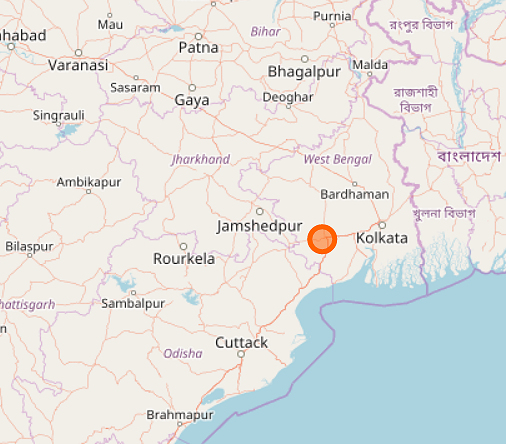
Abb.: Lage von Kharagpur (Bengali: খড়্গপুর)
[Bildquelle: © OpenStreetMap-Mitwirkende.
--
CC BY-SA 2.0]
Blutige communal riots zwischen Muslimen und Hindus in Kharagpur (Bengali: খড়্গপুর) wegen der Tötung einer Kuh
9 Tote
35 Verletzte
Es erscheint:
Parmanand <Bhai>: The Hindu national movement. -- Lahore, 1929. -- 68 S.
"In history the Hindus revere the memory of Prithvi Raj [Hindi: पृथ्वीराज चौहान, 1166 - 1192], Partap [प्रताप सिंह, 1540 - 1597], Shivaji [Marathi: शिवाजी राजे भोसले, 1627 - 1680] and, Beragi Bir [Panjabi: ਬੰਦਾ ਸਿੰਘ ਬਹਾਦਰ, 1670 - 1716], who fought for the honour and freedom of this land (against the Muslims), while the Mahomedans look upon the invaders of India, like Muhammad Bin Qasim (عماد الدين محمد بن القاسم الثقفي; c. 695 – 715) and rulers like Aurangzeb [1618 - 1707] [ابو مظفر محی الدین محمد اورنگزیب عالمگیر] as their national heroes" [Zitiert in: Ambedkar, B. R. [भीमराव रामजी आंबेडकर] <1891 - 1956>: Pakistan or The partition of India. -- 3. ed. -- Bombay : Thackers, 1946. -- S. 35f.]
Es erscheint der Zeitschriftenartikel:
Vinayak Damodar Savarkar [विनायक दामोदर सावरकर] <1883 - 1966>: God of the mankind and God of the universe
“For the God of the universe human beings are not at all significant. Just as there are ants, flies and other creatures there are humans too. We are immaterial to the creator and are nothing but a temporary and minor product of his game. Crops grow in field and fruits are borne by trees, not so that we may eat them. We can feed ourselves because these exist. Rivers do not flow just for us to get drinking water. Rivers flow and the water is there. That is all. One must remember that once upon a time there were only huge crocodiles on earth. Then, rivers still flowed, trees blossomed, and plants produced flowers and fruits. Forget about the humans, even when there was no earth, this Sun was shining in the sky. Let me say further that if tomorrow the whole solar system were to vanish, the God of the universe would not be concerned in the slightest, just as the death of a glow worm would not affect the mother earth. Tomorrow if hundreds of such solar systems were to be destroyed, the God of the universe would not feel disturbed.” “So, for whatever reason, or for no specific reason, this universe functions and as the result of which human beings can enjoy the pleasures of life - that and only that much would be the blessing of the God of the universe. If he had refused to grant even this much pleasure in our lives, who would have dared to question him? The fragrances, the beautiful music, the wonderful touch, all such pleasure we enjoy through our five senses are indeed remarkable. One can be thankful for that coincidence. We can show our gratitude by offering a flower to God.”
“But we must stop ourselves from going beyond that offering. Because if we did, it would be like a beggar trying to make friends with an Emperor. People often say ‘God will shower happiness on me and therefore I will perform the Satyanarayan Puja as thanksgiving.’ This must stop because it is absurd. We say God saved us from a calamity. But who put us in the calamity in the first place? The very God himself!! If we are to praise him for saving us from a disaster, should we also not scold him for creating the same disaster? Both the praise and the curse are unnecessary and unjustified.”
“This universe exists and continues to function by certain rules. All that we can do is to find out what they are and use them for the benefit of mankind. We must say that what is beneficial for mankind is good and what makes us suffer is bad. It is absurd to say that what God likes is beneficial for man or vice versa, because they are false notions. We live in the universe but the
universe does not belong to us. To a great extent, it is unfavourable and to a very small extent favourable to us. We must appreciate this and face the heavenly occurrences. That is true nature. That is the real worship of the God of universe.” (SSV3 pp 296/7)
[Zitiert in: Godbole, V. S. (Vasudev Shankar) [वासुदेव शंकर गोडबोले] <1941 - >: Rationalism of Veer Savarkar. -- Thane : Itihas Patrika, 2004. -- 696 S. ; 23 cm. -- Online: https://archive.org/details/RationalismOfVeerSavarkarGodboleV.S. -- Zugriff am 2018-05-15. -- S. 337ff.. -- Fair use]
Blutige communal riots zwischen Muslimen und Hindus in Bombay (Marathi: मुंबई)
149 Tote
700 Verletzte
राजपाल (Rajpal, ermordet 1929-04-06), der Herausgeber von रंगीला रसूल [Rangila Rasul, 1927] wird nach mehreren misslungenen Versuchen ermordet von Ilm-ud-din (4 December 1908 – 31 October 1929) (Urdu: عِلم الدین)
Ilm-ud-din wird 1929-10-31 hingerichtet
Wikipedia: https://en.wikipedia.org/wiki/Ilm-ud-din. -- Zugriff am 2018-03-05
Abb.: राजपाल (Rajpal)
[Bildquelle: http://bharatdiscovery.org/india/%E0%A4%AE%E0%A4%B9%E0%A4%BE%E0%A4%B6%E0%A4%AF_%E0%A4%B0%E0%A4%BE%E0%A4%9C%E0%A4%AA%E0%A4%BE%E0%A4%B2. -- Zugriff am 2018-03-06. -- Fair use]
Blutige communal riots zwischen Muslimen und Hindus in Bombay (Marathi: मुंबई)
35 Tote
200 Verletzte
Punjab (Panjabi: ਪੰਜਾਬ): 813 Ausschreitungen zwischen Muslimen und Hindus
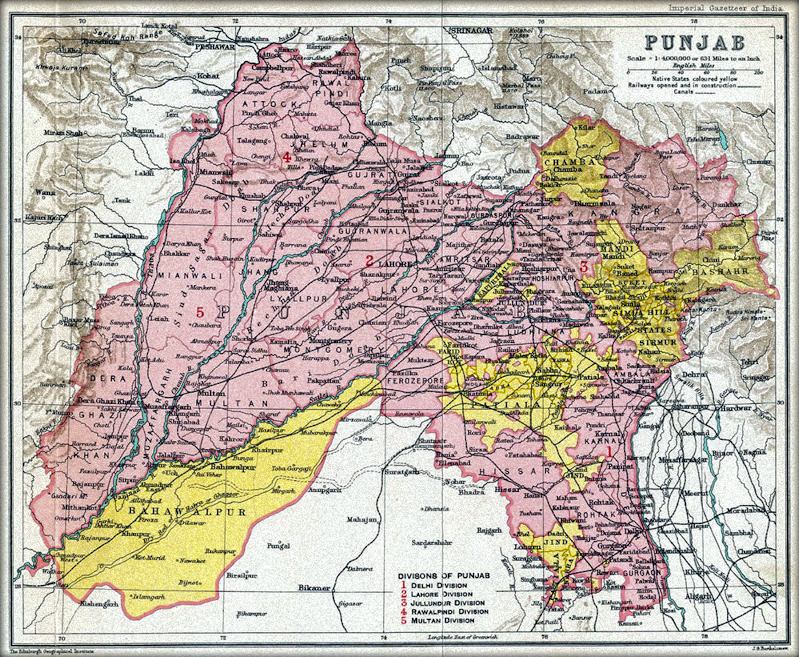
Abb.: Punjab (Panjabi: ਪੰਜਾਬ)
[Public domain]
Der RSS übernimmt das Prinzip ekchalak anuvartita (Hindi: एक चालक अनुवर्तित) ("Einem einzigen Führer folgen")
Laxman Vasudev Paranjpe (Marathi: लक्ष्मण वासुदेव परांजपे, 1877 - 1958) ist während des Gefängnisaufenthalts von Keshav Baliram Hedgewar (Marathi: केशव बळीराम हेडगेवार,1889 - 1940) Sarsanghchalak (Hindi: सरसंघचालक) des RSS
Wikipedia: https://en.wikipedia.org/wiki/Laxman_Vasudev_Paranjpe
Mirzapur (Hindi: मिर्ज़ापुर) District: schwere Ausschreitungen zwischen Muslimen und Hindus
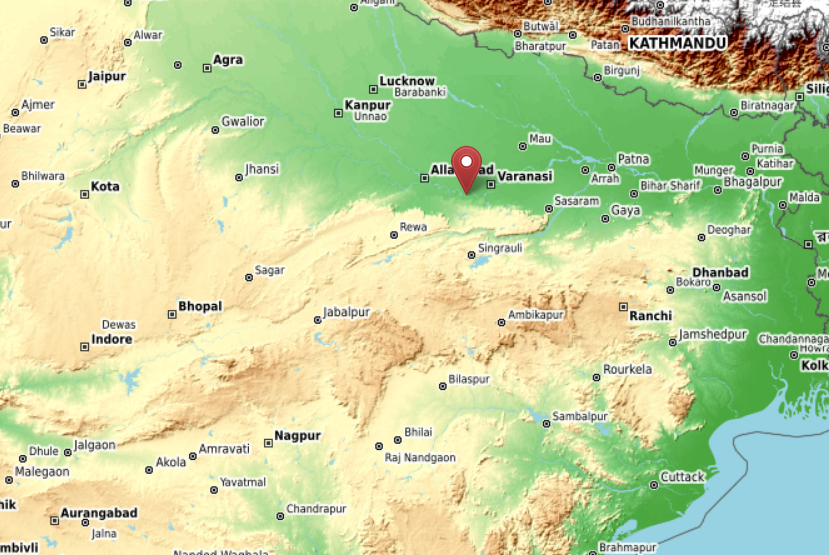
Abb.: Lage von Mirzapur (Hindi: मिर्ज़ापुर)
[Bildquelle: © OpenStreetMap-Mitwirkende.
--
CC BY-SA 2.0]
Agra (Hindi: आगरा): Auschreitungen zwischen Hindus und Muslimen
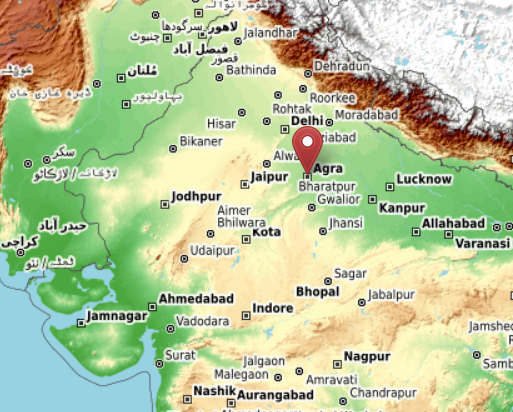
Abb.: Lage von Agra (Hindi: आगरा)
[Bildquelle: © OpenStreetMap-Mitwirkende.
--
CC BY-SA 2.0]
Dhanbad (Hindi: धनबाद): Ausschreitungen zwischen Hindus und Muslimen
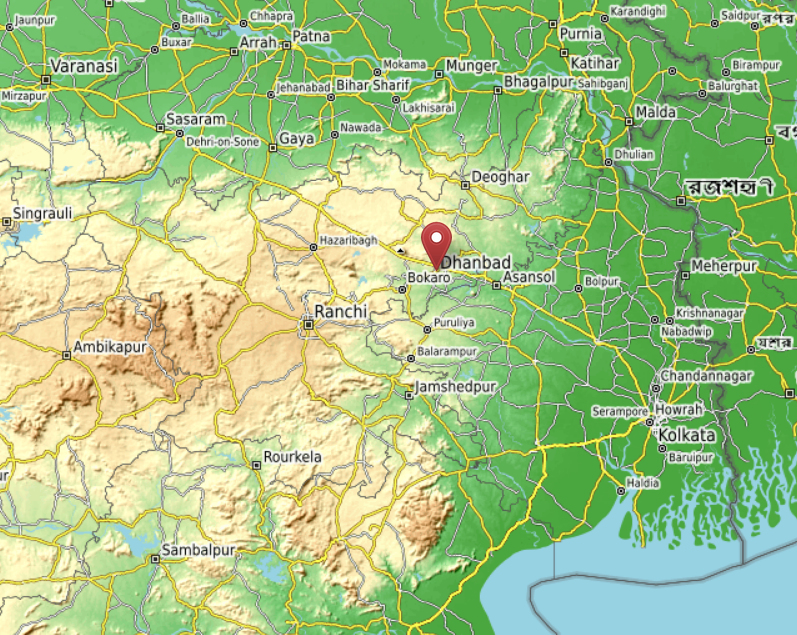
Abb.: Lage von Dhanbad (Hindi: धनबाद)
[Bildquelle: © OpenStreetMap-Mitwirkende.
--
CC BY-SA 2.0]
"The year 1930-31 saw the eruption of the Civil Disobedience Movement. It gave rise to riots and disturbances all over the country. They were mostly of a political character and the parties involved in them were the police and the Congress volunteers. But, as it always happens in India, the political disturbances took a communal twist. This was due to the fact that the Muslims refused to submit to the coercive methods used by Congress volunteers to compel them to join in Civil Disobedience. The result was that although the year began with political riots it ended in numerous and quite serious communal riots." [Quelle: Ambedkar, B. R. [भीमराव रामजी आंबेडकर] <1891 - 1956>: Pakistan or The partition of India. -- 3. ed. -- Bombay : Thackers, 1946. -- S. 174]
Punjab (Panjabi: ਪੰਜਾਬ): 907 Ausschreitungen zwischen Muslimen und Hindus

Abb.: Punjab (Panjabi: ਪੰਜਾਬ)
[Public domain]
Dacca (Bengali: ঢাকা): schwere Ausschreitungen gegen Hindus
Wikipedia: https://en.wikipedia.org/wiki/1930_Dhaka_riots. -- Zugriff am 2018-03-24
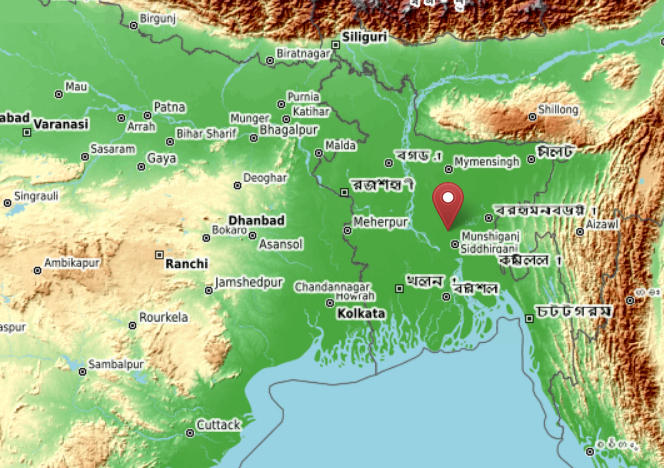
Abb.: Lage von Dacca (Bengali: ঢাকা)
[Bildquelle: © OpenStreetMap-Mitwirkende.
--
CC BY-SA 2.0]
Vellore (Tamil: வேலூர்): schwerste Ausschreitungen zwischen Hindus und Muslimen. Auslöser: Vorbeiziehen einer muslimischen Prozession mit Tazias (Urdu: تعزیہ) an einem Hindu Tempel. Polizei eröffnet Feuer auf die Randalierer.
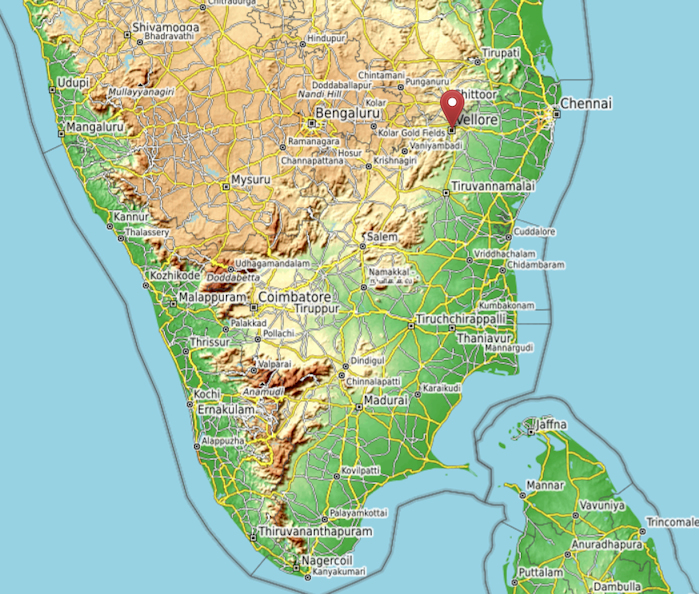
Abb.: Lage von Vellore (வேலூர்)
[Bildquelle: © OpenStreetMap-Mitwirkende.
--
CC BY-SA 2.0]
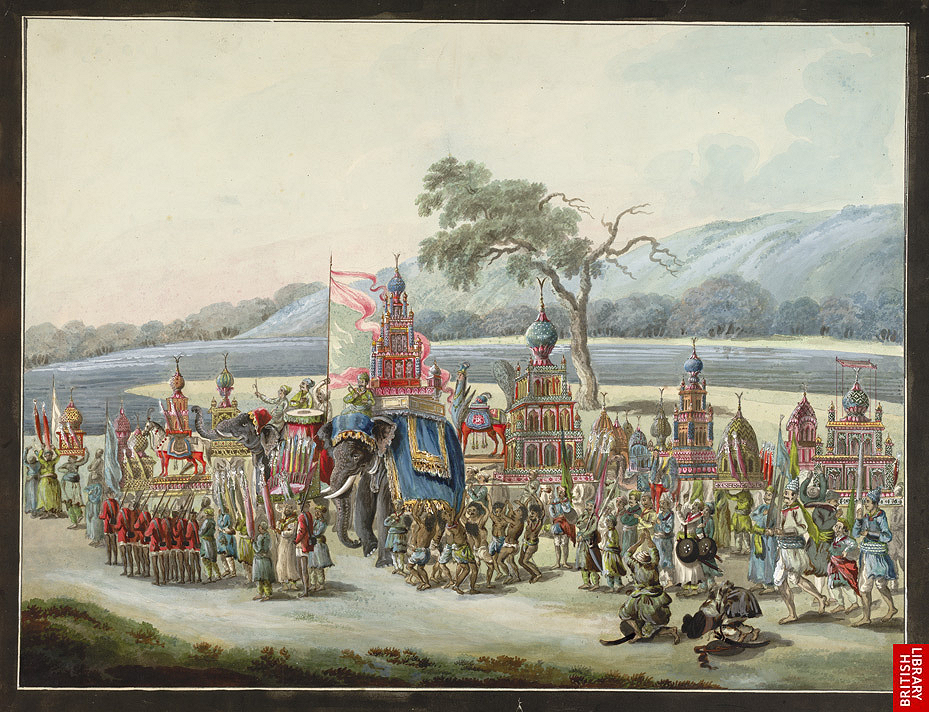
Abb.: Tazia-Schreine (Urdu:
تعزیہ)
1790
[Public domain]
Kishoreganj (Bengali: কিশোরগঞ্জ): schwere Ausschreitungen zwischen Muslimen und Hindus
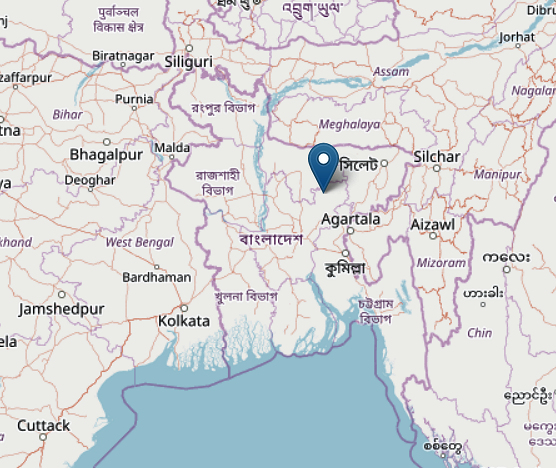
Abb.: Lage von Kishoreganj (Bengali: কিশোরগঞ্জ)
[Bildquelle: © OpenStreetMap-Mitwirkende.
--
CC BY-SA 2.0]
Salem (Tamil: சேலம்) Distrikt: Ausschreitungen zwischen Hindus und Muslimen wegen der Frage, wer der Sieger beim Ringkampf in Shevapet ist.
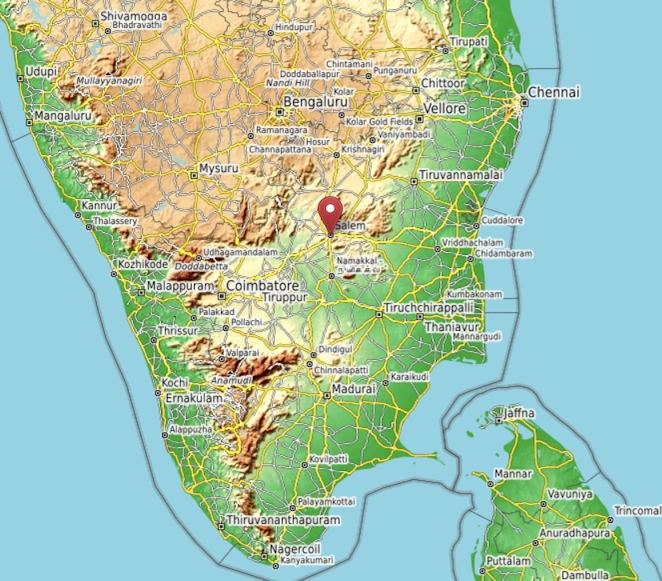
Abb.: Lage von Salem (Tamil: சேலம்)
[Bildquelle: © OpenStreetMap-Mitwirkende.
--
CC BY-SA 2.0]
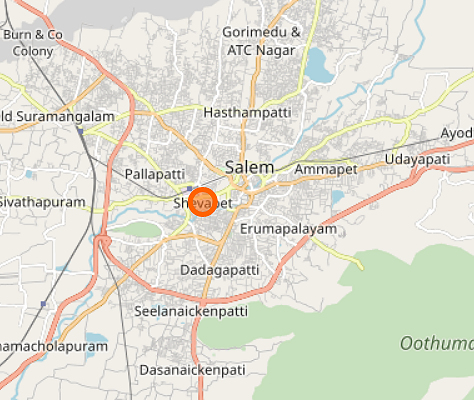
Abb.: Lage von Shevapet
[Bildquelle: © OpenStreetMap-Mitwirkende.
--
CC BY-SA 2.0]
Sukkur (Urdu: سکر): schwere Ausschreitungen zwischen Muslimen und Hindus in über 100 Dörfern.
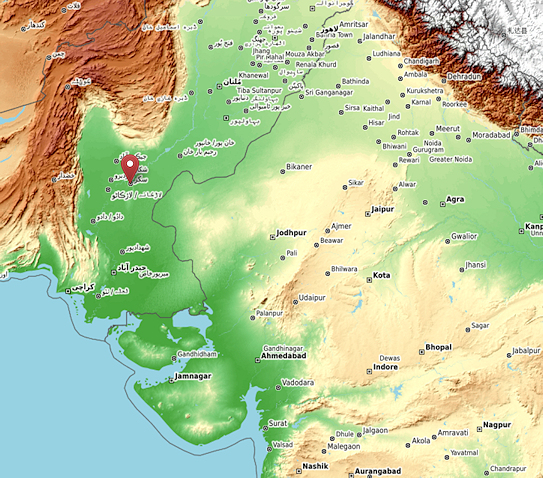
Abb.: Lage von Sukkur (Urdu: سکر)
[Bildquelle: © OpenStreetMap-Mitwirkende.
--
CC BY-SA 2.0]
Kitchipalayam, Salem (Tamil: சேலம்): Ausschreitungen zwischen Muslimen und Hindus. Anlass: ein paar Muslime stören Hindus beim Spielen auf der Straße.
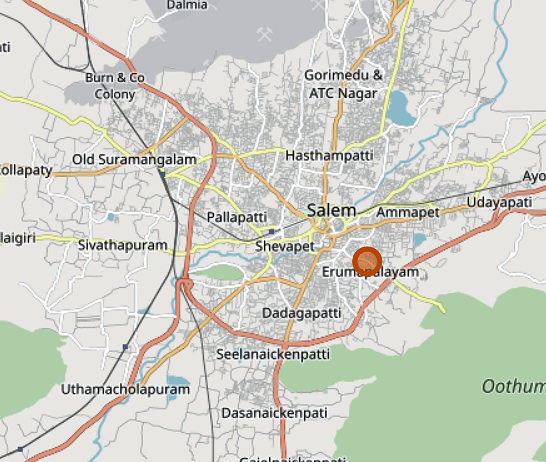
Abb.: Lage von Kitchipalayam
[Bildquelle: © OpenStreetMap-Mitwirkende.
--
CC BY-SA 2.0]
Wikipedia: https://de.wikipedia.org/wiki/Britisch-Indische_Round-Table-Konferenzen_in_London / https://en.wikipedia.org/wiki/Round_Table_Conferences_(India). -- Zugriff am 2018-03-08
Tiruchendur (Tamil: திருச்செந்தூர்): Ausschreitungen zwischen Hindus und Christen
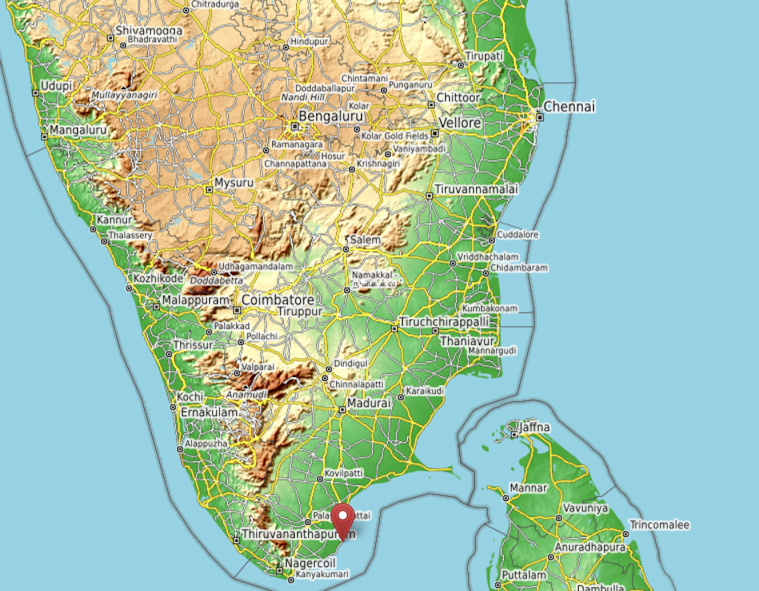
Abb.: Lage von Tiruchendur (Tamil: திருச்செந்தூர்)
[Bildquelle: © OpenStreetMap-Mitwirkende.
--
CC BY-SA 2.0]
Keshav Baliram Hedgewar (Marathi: केशव बळीराम हेडगेवार, 1889 - 1940) ist Sarsanghchalak (Hindi: सरसंघचालक) des RSS
Benares (Hindi: वाराणसी): schwere Ausschreitungen zwischen Hindus und Muslimen
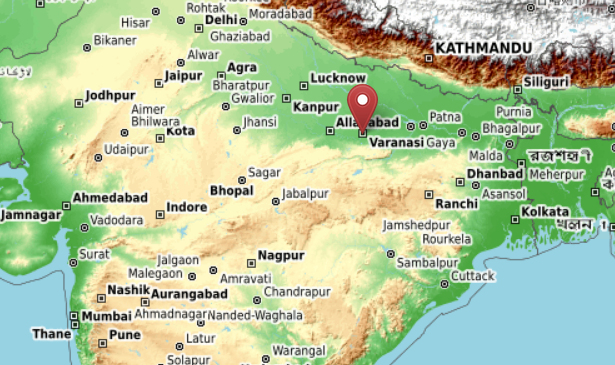
Abb.: Lage von Benares (Hindi: वाराणसी)
[Bildquelle: © OpenStreetMap-Mitwirkende.
--
CC BY-SA 2.0]
Ratnagiri [Marathi: रत्नागिरि]: Einweihung des Patit Pavan Mandir [Hindi: पतित पावन मंदिर - Tempel der Reinigung der aus der Reinheit Gefallenen]. Der Tempel steht allen Hindus offen, unabhängig von ihrer Sekte oder ihrer Kaste, auch Unberührbaren. Die Feier wird mit einem gemeinsamen Essen - auch mit den Unberührbaren - beschlossen. Einige hochkastige Gönner und Notable weigern sich, am gemeinsamen Essen teilzunehmen.
Wikipedia: https://en.wikipedia.org/wiki/Patit_Pavan_Mandir. -- Zugriff am 2018-05-03
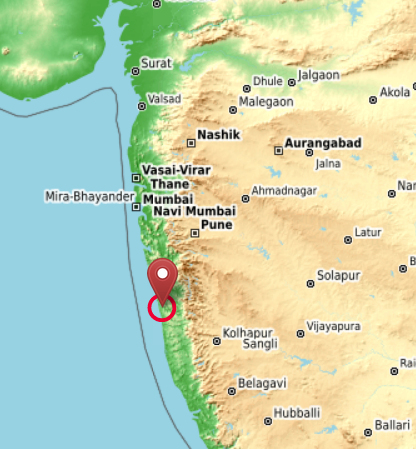
Abb.: Lage von Ratnagiri [Marathi: रत्नागिरि]
[Bildquelle: © OpenStreetMap-Mitwirkende.
--
CC BY-SA 2.0]
Gandhi-Irwin Pact
Wikipedia: https://de.wikipedia.org/wiki/Gandhi-Irwin-Pakt / https://en.wikipedia.org/wiki/Gandhi%E2%80%93Irwin_Pact. -- Zugriff am 2018-03-08
"The Muslims, therefore, felt that it was high time for them to take stock of their position. This uneasiness was intensified by the Irwin-Gandhi settlement, which accorded what appeared to be a privileged position to the Congress, and Congress elation and pose of victory over the Government did not tend to ease Muslim misgivings." [Quelle: Ambedkar, B. R. [भीमराव रामजी आंबेडकर] <1891 - 1956>: Pakistan or The partition of India. -- 3. ed. -- Bombay : Thackers, 1946. -- S. 177]

Abb.: Abzeichen der Opera Nazionale Balilla
[Public domain]
Balakrishna Shivram Moonje (Maharati: बाळकृष्ण शिवराम मुंजे, 1872 – 1948) besucht das faschistische Rom. Zuvor war er in Frankreich und Deutschland.
"In his diary, Moonje describes his trip to Rome in great detail, including his visits to the Military College, the Central Military School of Physical Education, the Fascist Academy of Physical Education, and the Balilla [Opera Nazionale Balilla -- Jugendorganisation des Partito Nazionale Fascista] and Avanguardisti organizations, substructures of the Italian fascist youth group Opera Nazionale Balilla. The Mahasabha leader was particularly impressed with these outfits, which were - as Casolari says - the ‘keystone of the fascist system of indoctrination’ of young boys and girls. According to Moonje: The Balilla institutions and the conception of the whole organization have appealed to me most, though there is still not discipline and organization of high order. The whole idea is conceived by Mussolini for the military regeneration of Italy. Italians, by nature, appear ease- loving and non-martial like Indians generally. They have cultivated, like Indians, the work of peace and neglected the cultivation of the art of war. Mussolini saw the essential weakness of his country and conceived the idea of Balilla organization. [...] Nothing better could have been conceived for the military organization of Italy. [...] India and particularly Hindu India need some such institution for the military regeneration of the Hindus: so that the artificial distinction so much emphasized by the British of martial and non-martial classes amongst the Hindus may disappear.
On 18 March, Moonje received a letter from the Foreign Office of Rome saying that Mussolini would meet him at 6.30 p.m. on 19 March at Palazzo Venezia, the headquarters of the fascist government."
[Quelle: Jha, Dhirendra K.: Shadow armies : fringe organizations and foot soldiers of Hindutva. -- New Delhi : Juggernaut, 2017. --229 S. -- ISBN 978-93-8622-824-6. -- S. 166ff. -- Fair use]
Cawnpore (Kanpur - Hindi: कानपुर): schwere Ausschreitungen zwischen Hindus und Muslimen
mindestens 300 Tote
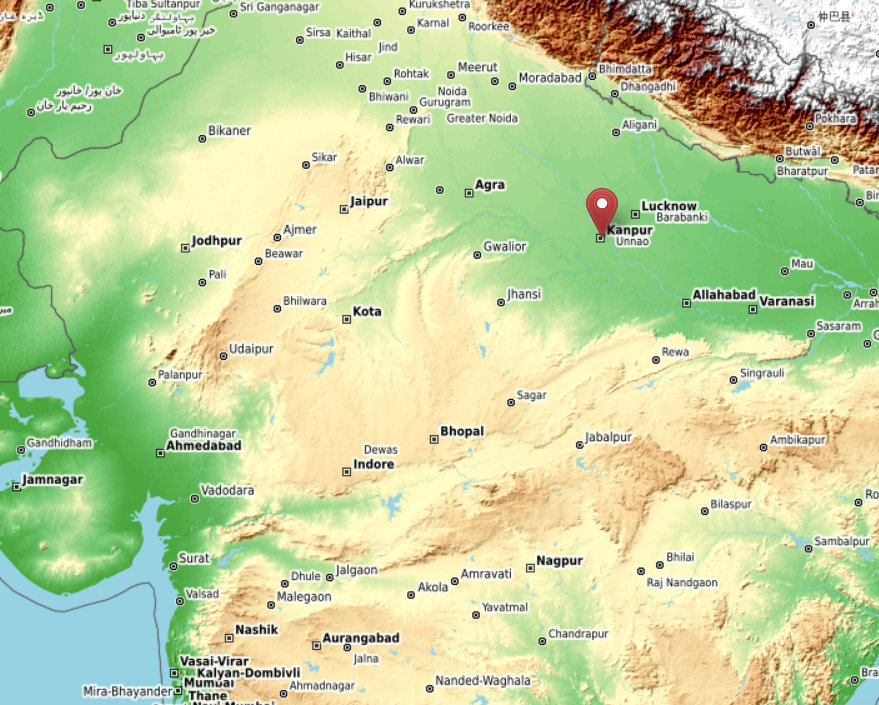
Abb.: Lage von Cawnpore (Kanpur - Hindi: कानपुर)
[Bildquelle: © OpenStreetMap-Mitwirkende.
--
CC BY-SA 2.0]
"Within three weeks of the [Gandi-Irwin] "pact" occurred the savage communal riots at Cawnpore, which significantly enough began with the attempts of Congress adherents to force Mahomedan shopkeepers to observe a hartal [Gujarati: હડતાળ -- Streik] in memory of Bhagat Singh [Panjabi: ਭਗਤ ਸਿੰਘ, 1907 - 1931] who was executed on 23rd March. On 24th March began the plunder of Hindu shops. On the 25th there was a blaze. Shops and temples were set fire to and burnt to cinders. Disorder, arson, loot, murder, spread like wild fire. Five hundred families abandoned their houses and took shelter in villages. Dr. Ramchandra was one of the worst sufferers. All members of his family, including his wife and aged parents, were killed and their bodies thrown into gutters. In the same slaughter Mr. Ganesh Shankar Vidyarthi [Hindi: गणेशशंकर 'विद्यार्थी, 1890 - 1931] lost his life. The Cawnpore Riots Inquiry Committee in its report states that the riot was of unprecedented violence and peculiar atrocity, which spread with unexpected rapidity through the whole city and even beyond it. Murders, arson and looting were widespread for three days, before the rioting was definitely brought under control. Afterwards it subsided gradually. The loss of life and property was great. The number of verified deaths was 300; but the death roll is known to have been larger and was probably between four and five hundred. A large number of temples and mosques were desecrated or burnt or destroyed and a very large number of houses were burnt and pillaged. This communal riot, which need never have occurred but for the provocative conduct of the adherents of the Congress, was the worst which India has experienced for many years. The trouble, moreover, spread from the city to the neighbouring villages, where there were sporadic communal disturbances for several days afterwards."
[Quelle: Ambedkar, B. R. [भीमराव रामजी आंबेडकर] <1891 - 1956>: Pakistan or The partition of India. -- 3. ed. -- Bombay : Thackers, 1946. -- S. 177]
Ratnagiri (Marathi: रत्नागिरी): Vinayak Damodar Savarkar (Marathi: विनायक दामोदर सावरकर, 1883 - 1966) in einer Rede über "God sent books and how men should read them."
“Recently I read somewhere that more people were killed under the name of God and Gospel than under Devil and the Dollar. When I thought about it deeply various old texts came to my mind, such Vedas, Zendavesta (of Parsees), Tripitik (of Buddhists), Bible, Koran as well as some texts in the recent past like that of Mormons of America. I came to the conclusion that there were four common factors -
- Every one says that only their text is God sent and others are not so. Therefore there is no consistency in them.
- People say that, as the orders in their particular book are not contained in others, those texts are not God sent.
- Men need to decide by logic, experience and other tests who was true prophet and who was not.
- Religious followers insist that once some one accepts their religion that person can only follow the orders of that religion.
I therefore recommend that we need to examine all religious texts to see if they are relevant today. It is therefore prudent to rely on man made texts than God given ones. That is the only way of avoiding feuds and bloodbaths.
(Ratnagiri Era p 241)"
[Zitiert in: Godbole, V. S. (Vasudev Shankar) [वासुदेव शंकर गोडबोले] <1941 - >: Rationalism of Veer Savarkar. -- Thane : Itihas Patrika, 2004. -- 696 S. ; 23 cm. -- Online: https://archive.org/details/RationalismOfVeerSavarkarGodboleV.S. -- Zugriff am 2018-05-15. -- S. 473f. -- Fair use]
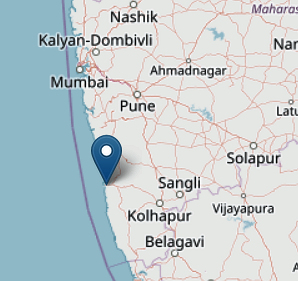
Abb.: Lage von Ratnagiri (Marathi: रत्नागिरी)
[Bildquelle: © OpenStreetMap-Mitwirkende.
--
CC BY-SA 2.0]
Wikipedia: https://de.wikipedia.org/wiki/Britisch-Indische_Round-Table-Konferenzen_in_London / https://en.wikipedia.org/wiki/Round_Table_Conferences_(India). -- Zugriff am 2018-03-08
Sheikh Mohammed Abdullah (1905 – 1982) [Urdu: شیخ محمد عبد اللہ] gründet die All Jammu and Kashmir Muslim Conference (ab 1939: Jammu & Kashmir National Conference).
Wikipedia: https://de.wikipedia.org/wiki/Jammu_%26_Kashmir_National_Conference / https://en.wikipedia.org/wiki/Jammu_%26_Kashmir_National_Conference. -- Zugriff am 2018-05-22
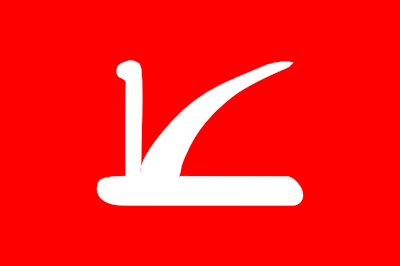
Abb.: ©Logo
[Fair use]
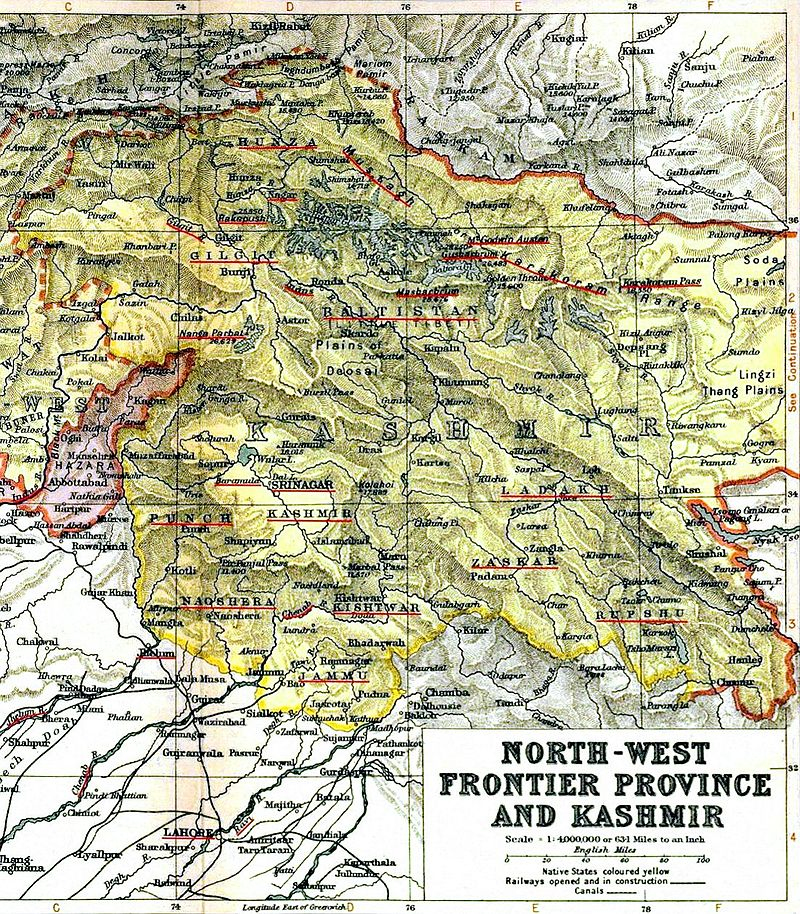
Abb.: Princely State of Kashmir and
Jammu, 1909
[Public domain]
Vinayak Damodar Savarkar (Marathi: विनायक दामोदर सावरकर, 1883 - 1966) in einem Zeitschriftenartikel:
“When faced with calamities and frustrations, we turn to God and ask for his forgiveness and pray for better days. It is true that prayers do give us peace of mind. One should pray for that. But we should not be under any illusion that God will listen to our prayers.” (Ratnagiri Era p 304)
[Zitiert in: Godbole, V. S. (Vasudev Shankar) [वासुदेव शंकर गोडबोले] <1941 - >: Rationalism of Veer Savarkar. -- Thane : Itihas Patrika, 2004. -- 696 S. ; 23 cm. -- Online: https://archive.org/details/RationalismOfVeerSavarkarGodboleV.S. -- Zugriff am 2018-05-15. -- S. 356. -- Fair use]
Es erscheint die Pakistan Declaration:
Rahmat Ali <Choudhary > <1897 - 1951> [چودھری رحمت علی خان]: Now or Never; Are We to Live or Perish Forever?
"3, Humberstone Road,
Cambridge, England.
28 January 1933Dear Sir or Madam,
I am enclosing herewith an appeal on behalf of the thirty million Muslims of PAKISTAN, who live in the five Northern Units of India—Punjab, North-West Frontier (Afghan) Province, Kashmir, Sind, and Baluchistan. It embodies their demand for the recognition of their national status, as distinct from the other inhabitants of India, by the grant to Pakistan of a separate Federal Constitution on religious, social and historical grounds.
I shall be pleased if you will kindly acquaint me with your valuable opinion on the proposed solution of the great Hindu-Muslim problem. I trust that, vitally interested as you are in a just and permanent solution of that complex problem, the objects outlined in the appeal wiIl meet with your fullest approval and active support.
Yours truly, Rahmat Ali (Choudhary). (Founder, Pakistan National Movement)
At this solemn hour in the history of India, when British and Indian statesmen are laying the foundations of a Federal Constitution for that land, we address this appeal to you, in the name of our common heritage, on behalf of our thirty million Muslim brethren who live in PAKSTAN—by which we mean the five Northern units of India, Viz: Punjab, North-West Frontier Province (Afghan Province), Kashmir, Sind and Baluchistan.
Our brave but voiceless nation is being sacrificed on the altar of Hindu Nationalism not only by the non-Muslims, but to the lasting disgrace of Islam, by our own so-called leaders, with reckless disregard to our future and in utter contempt of the teachings of history. The Indian Muslim Delegation at the Round Table Conference have committed an inexcusable and prodigious blunder. They have submitted, in the name of Hindu Nationalism, to the perpetual subjection of the ill-starred Muslim nation. These leaders have already agreed, without any protest or demur and without any reservation, to a Constitution based on the principle of an All-India Federation. This, in essence, amounts to nothing less than signing the death-warrant of Islam and its future in India. In doing so, they have taken shelter behind the so-called Mandate from the community."
[Quelle: https://en.wikipedia.org/wiki/Pakistan_Declaration. -- Zugriff am 2018-03-07 + https://en.wikisource.org/wiki/Now_or_Never;_Are_We_to_Live_or_Perish_Forever%3F. -- Zugriff am 2018-03-07
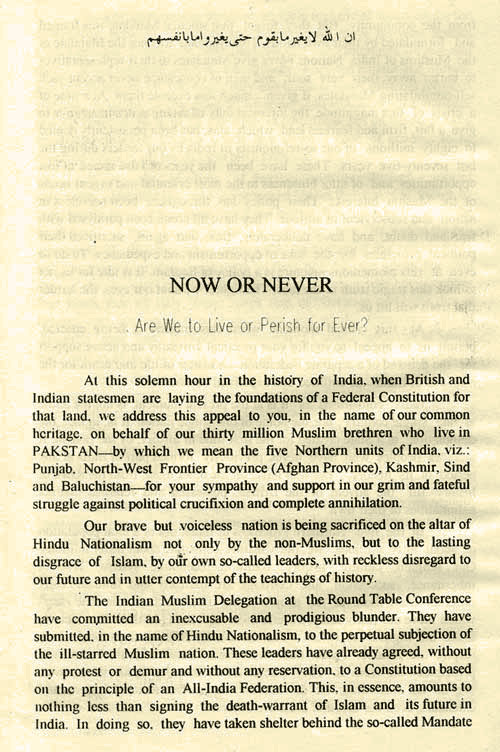
Abb.: Pakistan Declaration, S. 1
Holi-Fest (Hindi: होली)
Ausschreitungen zwischen Hindus und Muslimen in
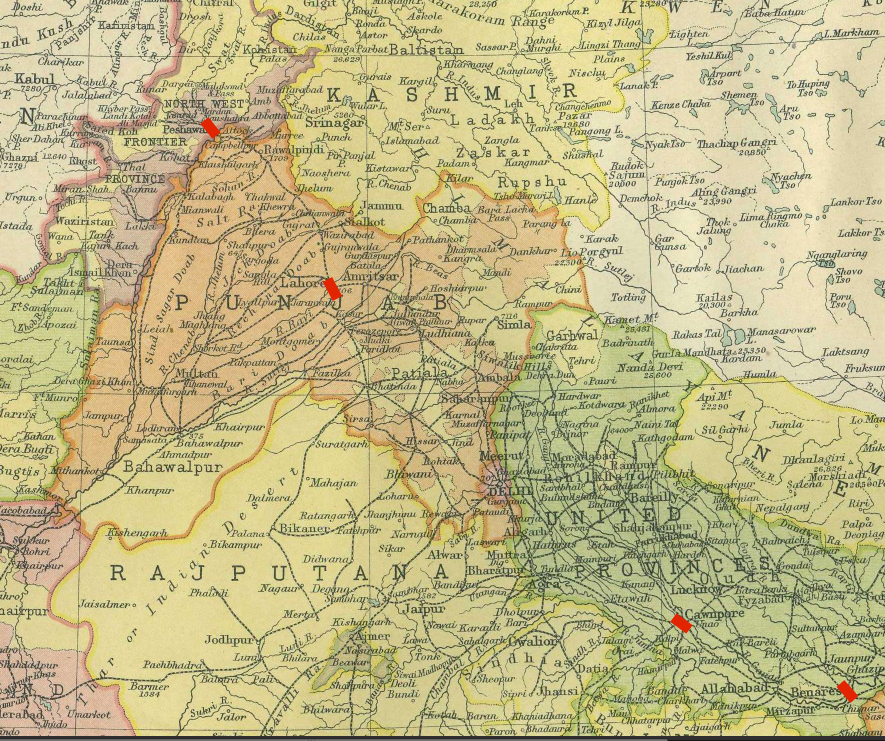
Abb.: Lage der genannten Orte
[Public domain]
Eid el-Adha (Arabisch: عيد الأضحى)
Ausschreitungen zwischen Hindus und Muslimen in
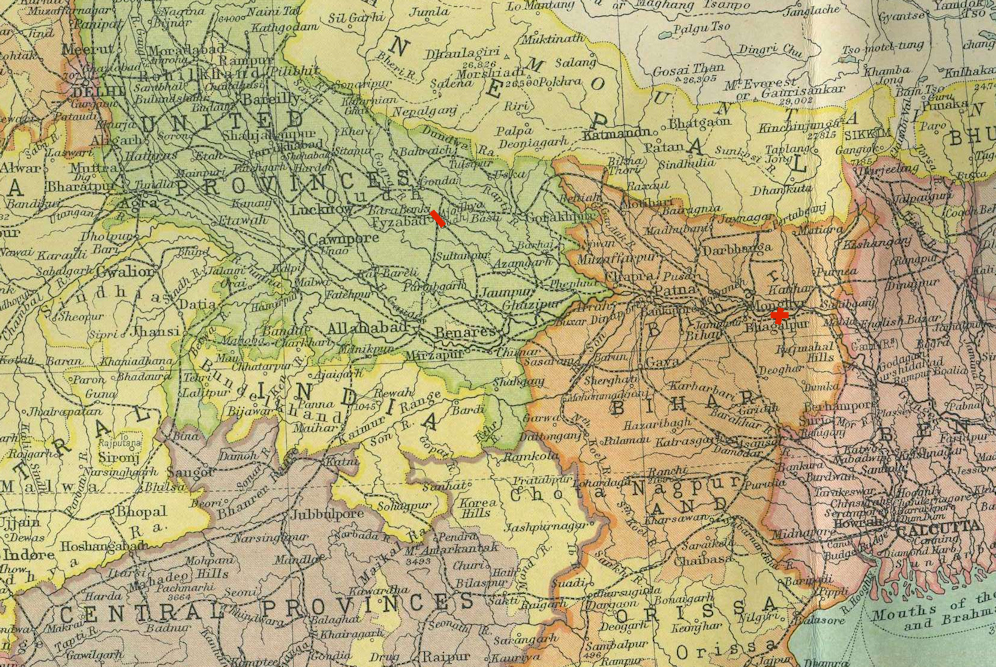
Abb.: Lage von Ayodhya (Hindi: अयोध्या) und Bhagalpore (Bhagalpur
-- Hindi: भागलपुर)
[Public domain]
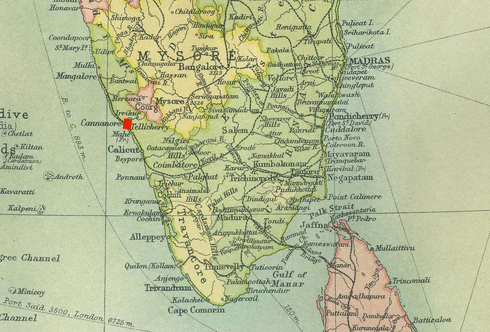
Abb.: Lage von Cannanore (Kannur -- Malayalam: കണ്ണൂര്)
[Public domain]
Ausschreitungen zwischen Hindus und Muslimen in Agra (Hindi: आगरा). Anlass: der Lärm hinduistischer Zeremonien in einem Privathaus stört angeblich das Gebet in einer nahen Moschee.
4 Tote
80 Verletzte
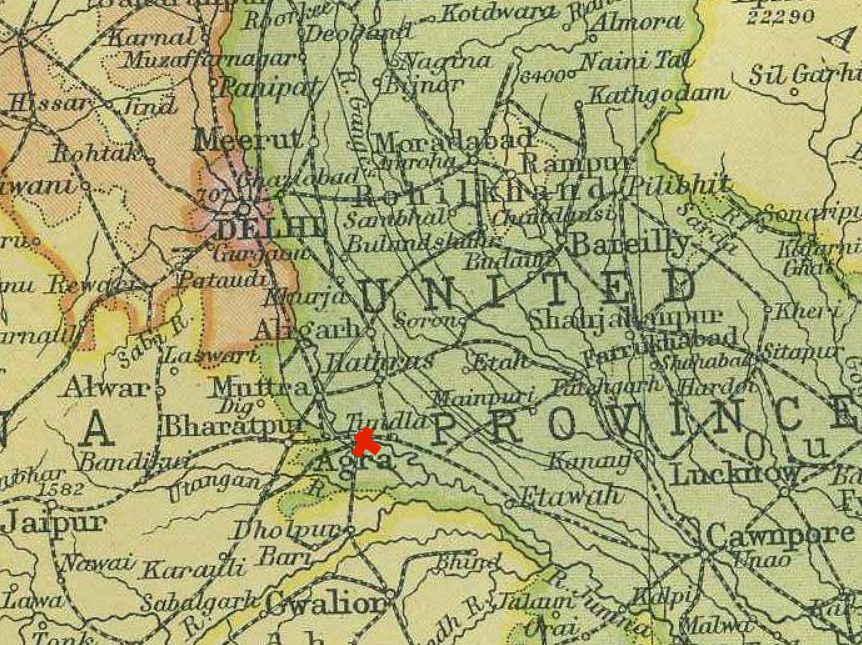
Abb.: Lage von Agra (Hindi: आगरा)
[Public domain]
Ausschreitungen zwischen Hindus und Muslimen in Madras (Tamil: மெட்ராஸ்). Anlass ein Buch von Hindus über Mohammed.
1 Toter
13 Verletzte
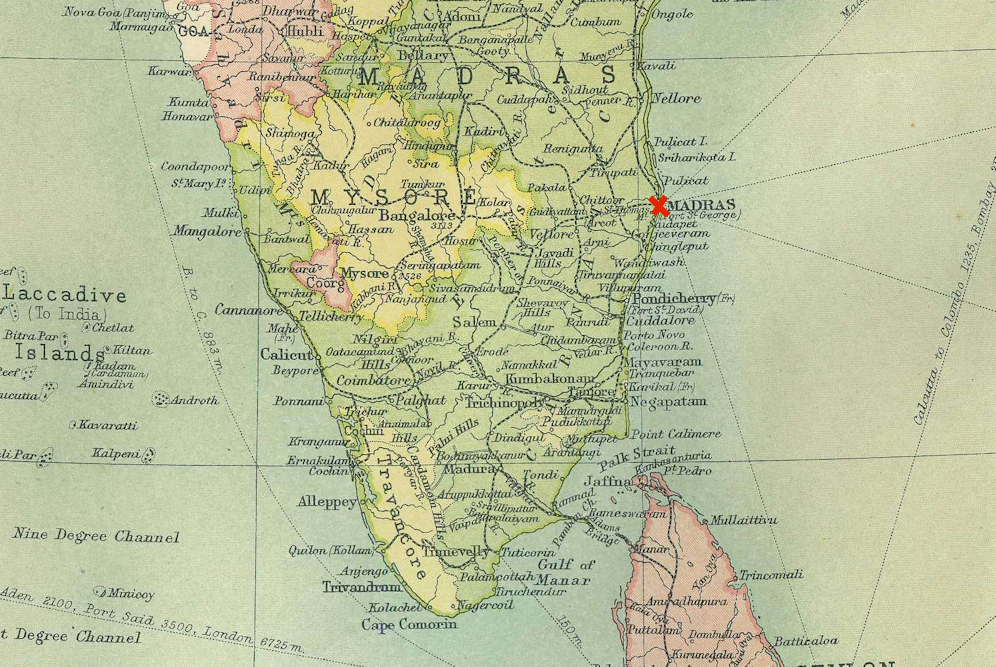
Abb.: Lage von Madras (Tamil: மெட்ராஸ்)
[Public domain]
Es erscheint der Zeitschriftenartikel:
Savarkar, Vinayak Damodar [विनायक दामोदर सावरकर] <1883 - 1966>: Two Worlds, Two Cultures
"From birth to death, from inception to cremation we Hindus follow the rules and procedures as prescribed by Manu without asking - why? i.e. is it relevant today? Is it beneficial? And thus we have lost the ability to think and make right decisions. Whenever we raise the above questions, we are just told - So says Manu. (or it has been dictated in Shrutis, Smrutis or Puranas) And that is the eternal religion. Why garlic should not be eaten? We never ask the question - is it medically harmful? We simply follow the tradition, as the good book says. And the same goes for all activities of our daily lives. From the days of Manu to the days of last Maratha Peshwa, Bajirao 11(1818) whenever a new or burning question arose, the judgements invariably were ‘Nothing new should be started, no old traditions should be discarded.’ Any student of history can testify that this has been the case from Shivaji (1630-1678) to his grandson Shahu, from Bajirao-I (1700 to 1740) to his grandson Bajirao II.
But the problems arose precisely because circumstances changed and the old texts had not dealt with them simply because those problems did not exist when the texts were written. This led to conflicts, insurrections, and civil wars. Unfortunately the great thinkers kept on saying - old rules should not be broken, new rules should not be created. And that has been carried on until today. This has led to the seven shackles, which have paralysed the Hindu society, such as untouchability, prohibition of inter caste dining and marriages, prohibition of crossing the seas. Whenever we pointed to the enormous harm these prohibitions have done and proposed their lifting, not only the conservatives but also even the reformers have been asking,
‘But is there a reference in the texts (Shrutis and Smrutis) for your reforms?’
The three disenabling remarks, “So says the good book", “No new rules should be made and no old ones be discarded”, “Is there a reference to your reforms?” All begin with ‘as prescribed in the texts’ (shrutismruti puranokta) tendency. Europeans act exactly opposite. They are ‘up to date’. They worship today, we cling to yesterday. I must stress that this fault does not belong to Hindus alone. All societies, at one time or another, had been imprisoned by the same concept.
We are not at all saying that whatever is mentioned in the old texts should be discarded just because it was mentioned in them, even when it stands the test of science and experiments of today. However, when some information is found to be based on ignorance or cannot be proved scientifically, it should be discarded. We should only adopt what is scientifically proved to be sound and beneficial today. It may be that with increased knowledge, what we adopt today may prove to be wrong or even harmful at a later day. But then, we are free to change again. We (the reformers) are not wedded to dogma. That is what we term ‘Modernist tendency.’
On the other hand, orthodoxy insists on strictly following, the instructions given in the religious texts, be it Vedas, Koran or Bible. Orthodox people insist on following these rules irrespective of whether or not the traditions are useful today. They insist that Vedas contain ALL knowledge. And what is in the Vedas is in Smritis. But the question arises when current social practices are not mentioned in Smritis. When asked ‘why follow them?’ The answer invariably given is - it must be in the Smritis that have been lost!! There can never be an argument against that. We want to liberate the Hindu people from this disastrous attitude.
Thousands of years ago, our forefathers faced some problems. They solved them in the best way they could. The fault with the orthodox tendency is that it assumes every solution adopted by our ancestors as infallible.
Our scriptures forbid the killing of cows. Taking advantage of this, Muslims attacked Hindu kings, placing large herds of cows in the front. To avoid committing sin of killing of cows, Hindus refused to fight and Muslims won towns after towns without shedding any blood.
It is the same orthodoxy that saw helplessly, forcible conversion of Hindus to Islam and Christianity. That tendency told us that if a bread was thrown in a well the entire village became Christian.
And when we strongly argued the case for their re-conversion, the same tendency is wasting time in deciding whether it would satisfy our scriptures if we re-convert those who were forced to embrace foreign religion five or seven years ago. Centuries have been wasted on such useless arguments.
By the same tendency, we lost huge colonies overseas. The same tendency has made us waste hundreds of years in arguing whether sea crossing is permissible in our religious books, while we helplessly see other countries become powerful by overseas trade.
It is astonishing that people with the same tendency have given verdict that the Muslims who despise our gods and want to smash our idols at the first opportunity are honourable. But our Mahar brothers who worship and revere the same gods as us, are and remain untouchables!! How shameless can one become?
It is this tendency that made it ten times easier for foreigners to defeat us and is making the freedom struggle just as difficult. We had enough of this tendency, which has led to our utter ruin."
(S S V3 pp 376/7/8)
Our scriptures, which we regard as God given and eternal, are at least five thousand years old. In other words, the world has moved on five thousand years. And yet, instead of learning from
the scientific progress that has been made, we have decided to cling to the ancient traditions and refuse to be wiser than our ancestors. Let me quote a few examples.
- Fire is an extremely useful natural force. But today it has been contained within a matchbox. It is absurd to consider that only the fire produced by grinding two logs of wood is holy. Despite so many fire sacrifices each year we are faced with many droughts, while in Europe where they do not practise fire worship at all, there are hardly any famines.
- Today we have motors, railways, and aeroplanes for transport. It is absurd for our Shankaracharya (Hindu Pope) to travel in palanquins and to be carried on shoulders of his followers. Same goes for the torch. Why carry a torch in front of the procession of Shankaracharya in broad daylight?
- In the olden days we used oil lamps. But today we have electric bulbs of various capacities. Why not use them?
- Today we have printing presses. Still priests regard hand written religious books as holy.
- Considerable progress has been made in Gynaecology and yet we still cling to old traditions. Compare our children with those of Europeans. Their boys want to reach the North and South Poles, their girls swim the English Channel and our boys and girls?
- Dead body is inauspicious and should be burned as quickly as possible - there is no dispute on that score. But why do we have to carry dead body over shoulders of carriers on a special stretcher instead of using the coffin? Moreover we should use electrical furnaces instead of burning dead bodies with timber.
“Really, by regarding our scriptures as unalterable we have made a laughing stock of ourselves. We have become forever fools.”
If we wish to save our Hindu nation in this age, we have to break the shackles of “We will do only what has been prescribed in our Shrutis and Smrutis." Luckily it is easy to break them because they are in our minds and not forced on us. Just four hundred years ago, Europe too was in a similar helpless position and had reached our present level. But once it rejected the Bible, decided to abide by the rules of experimental science, decided to become up to date, they moved forward dramatically. In four hundred years, they moved four thousand years. They conquered and dominated the world.
In future, whenever we have to decide whether a reform is good or bad, changes are desirable or not, there should be only one test. Is it useful or harmful for today? We must never ask the question - is it sanctioned by the scriptures? We must never again waste time on that futile discussion. If a change is desirable, implement it TODAY. And in this manner what we failed to resolve in four thousand years will be done in four days. We will break the shackles once for all.
It is easy to prove whether a reform is useful or not. But it is impossible even for the Lord Creator to decide whether the same is sanctioned in the scriptures or not. We therefore do not regard ANY religious text as eternal and to be followed at all times."
(S S V3 pp 363/4)
[Zitiert in: Godbole, V. S. (Vasudev Shankar) [वासुदेव शंकर गोडबोले] <1941 - >: Rationalism of Veer Savarkar. -- Thane : Itihas Patrika, 2004. -- 696 S. ; 23 cm. -- Online: https://archive.org/details/RationalismOfVeerSavarkarGodboleV.S. -- Zugriff am 2018-05-15. -- S. 516 - 522. -- Fair use]
Erstes Heft der englischsprachigen Zeitschrift der Gita Press:
Kalyana-Kalpataru
Webpräsenz: http://www.kalyana-kalpataru.org/. -- Zugriff am 2018-06-18
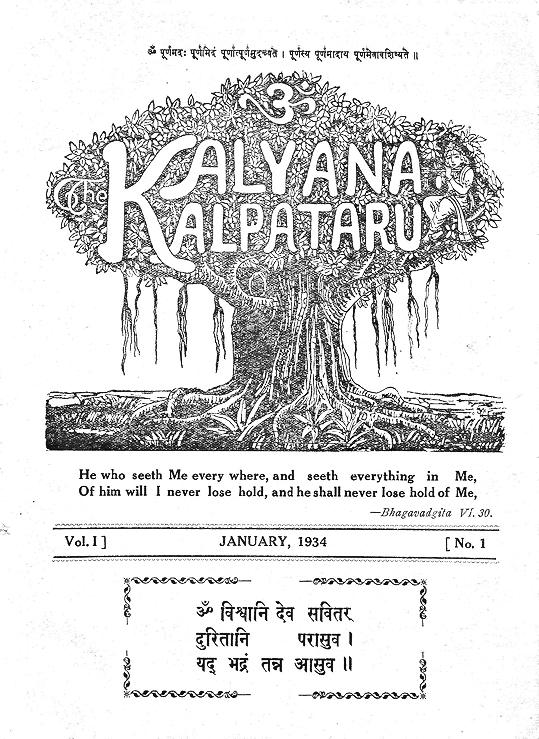
Abb.: Titelblatt von Heft 1
[Fair use]
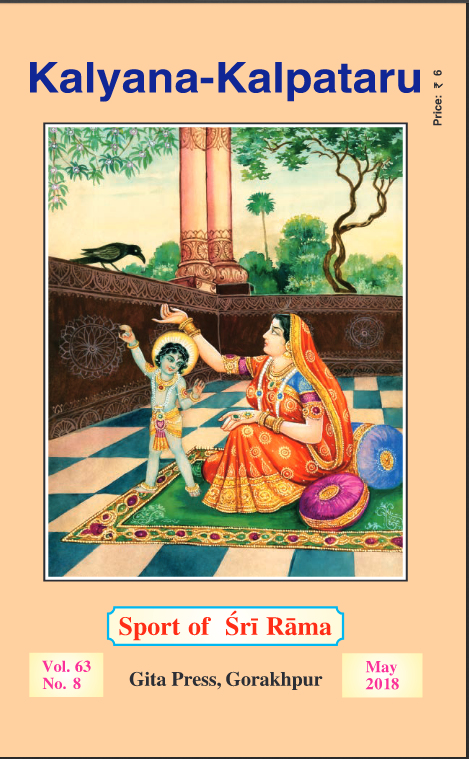
Abb.: Titelblatt von Heft 68/8. -- 2018-05
[Fair use]
Lahore (Panjabi: ਲਾਹੌਰ): Ausschreitungen zwischen Muslimen und Sikhs wegen einer Moschee auf dem Grund des Sikh-Tempels Shahidganj Gurudwara. Beendet durch Polizeibeschuss.
12 Tote
zahlreiche Verletzte
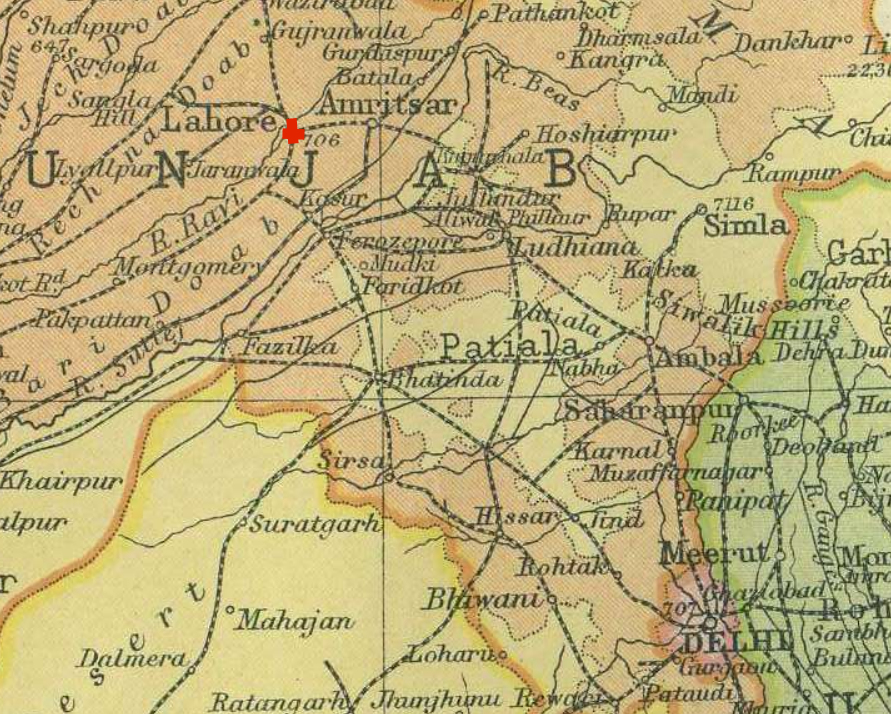
Abb.: Lage von Lahore (Panjabi: ਲਾਹੌਰ)
[Public domain]
Nathuramal Sharma (Hindi: नाथूरामल शर्माव्) wird von Abdul Qayum ermordet, weil er ein Pamphlet über die Geschichte des Islam geschrieben hatte.
Es erscheint der Zeitschriftenartikel:
Savarkar, Vinayak Damodar [विनायक दामोदर सावरकर] <1883 - 1966>: What is meant by the term ‘Divine Blessing’ ?
“Man’s efforts together with earthly wherewithal do not necessarily assure us success, which depends upon the unknown and unimaginable forces beyond our control or comprehension. In that sense, it is true to say that no movement will succeed without a divine blessing.” “From the movement of an insignificant grass blade to eruptions of volcanoes and dangerous collisions of stars and heavenly bodies, there' are some unknown forces at work. And our so-called activities are also part and parcel of the same process. Therefore their success depends on the giant forces of nature. When we say that the human efforts succeeded in a particular endeavour, it was so because they were in harmony with the gigantic forces of nature.”
“Unfortunately people do not attach this meaning to the term ‘divine blessing.’ They believe in two divisions - just and unjust, godly and demonic, truth and false. Human activity based on the first parables becomes successful. And how to seek the ‘divine blessing’ ? By performing penances such as standing in water and chanting the name of god, fasting, sitting in front of fire on hot days and under the blazing sun, offering food to thousands of Brahmins. There are innumerable such methods described in religious texts. One must start human activities only after performing such penances, without which no success is possible.”
“In this article I am going to show that success does NOT depend on performing such penances or purifications. It largely depends on acquiring metaphysical strength.”
“We had saints and saintly figures such as Nivrutti, Dnyanadev, Sopan, Muktabai (the four saints from one family), then Namdev and his maid Janabai, Gora Kumbhar, Damajipant, Savata Mali, Rohidas Chamar, Chokha Mahar, Tukaram. They created huge sacred literature. And yet our God did not save the honour of a single Hindu Maratha woman, or smash any invader/ aggressor like Allauddin Khilji (1294 A.D) or Malik Ambar 300 years later. Hindu temples were converted into mosques on a mass scale. The haters of Lord Hari wiped out his devotees.” “What applied to Muslim invaders also applied to the Portuguese (Christians). Those handful barbarians caused havoc in India. They resorted to massacres, beatings, lootings, and destruction of temples on a massive scale, forcible conversions to Christianity, enslaving men and women and selling them overseas. But Hindu Gods watched their atrocities without a murmur.”
“It is true that after the death of Prophet Mohammed, Islam was spread like wild fire by the Arabs. They conquered vast territories of North Africa, captured Spain, Portugal and south Italy. But their success was due mainly to their weapons, fighting abilities and organisation NOT due to their religion - Islam. Compared to them the countries of Africa and Spain and Portugal were materially backward and disorganised. However, Arabs got into their heads that their victories were won because of their idol breaking Islam. They thought that Allah sends them in secret the armies of angels and therefore Kafirs or Christians (the infidels) would never withstand an attack by Muslims. But when the Christians got better organised and disciplined, used superior military tactics, they too won over the Muslims. They thus disproved the notion that the non-believers in Koran would never defeat Muslims. So, blessings by Allah to Muslims were proved worthless.”
“Despite their regular reciting of Namaz, Muslims were massacred by Christians who despised Koran. When Christians lacked weapons of calibre Muslims won over them. But when Muslims became feeble and were divided the superior Christians defeated them easily. Worshippers of the Bible proved that the worshippers of Koran could be easily defeated. In a similar manner, Marathas too defeated Muslims and Christians (Portuguese) and disproved the axiom that idol worshippers will never defeat the followers of Koran (or the Bible).”
“From 1600 onwards the Marathas were well-prepared, experienced in battle tactics, disciplined and had acquired superb intelligence gathering skills. Therefore for the next 200 years, they became undefeatable and crushed the armies of Christians (Portuguese) and Muslims. And the surprising thing was that the more the Marathas set away from the saintly behaviour and prayers and paid more attention to earthly matters the more successful they became on the battlefront. In other words, the less they relied on ‘divine blessings’ the more daring and ambitious they became. The less they relied on religious means and adopted the strategy needed to win wars, the more successful they became.”
"The verse of Saint Ramdas was constructed during the days of Maratha King Shivaji. The contemporary events clearly show that the first part of it is correct namely, ‘movement is strength, whoever carries on with a movement has strength.’ Once you adopt correct means and resources to win an earthly objective, you will succeed. Whether or not it has the backing of religion, piety or prayers. THAT IS THE TRUTH.”
“The same applies to promises made in texts of all faiths -Parsees, Christians, Muslims, Jews. Men may be obsessed with fervour that as they follow instructions of their God, they are bound to succeed. But that does not happen in real life.”
"Even those who succeed once may fail in course of time if they were to lose their material strength, in which case they and their Gods too will lose. Human beings may have their own ideas of what is good or bad, just or unjust, divine or satanic. But God is not partial to such ideas. He would give success only to those who improve their material strength.”
“We therefore say that people should not remain under any illusion that because their cause is just they are bound to win. Nothing can be more deceptive. If you want success in the world you must gain and improve your material strength. That is the only sure way to achieving success and to defeating of your enemy.”
“I am not advocating that a powerful society should be tyrant. However, one must appreciate that your cause may be just but if you are weak you will be defeated by the unjust but materially superior society. The performance of 108 or even 1,108 Satyanarayan Pujas will not help you to defeat your enemies, because success depends on acquiring power. Even those who do not believe in God will succeed if they have material strength. Has not atheist Soviet Russia become a World Power?”
“Some may argue that the glory of the atheists may be short lived and would not last long. But then what happened to the glories of worshippers of God? Dwaraka of Lord Krishna vanished under water, the main mosque in Madina became a stable in later years, Jesus was crucified, golden temple of Jehovah was destroyed.”
“The utterance of traditionalists to the effect that the recent earthquake in Bihar was caused by our agitation to remove untouchability, as well as the belief of the reformers that the earthquake happened because traditionalist wanted to retain the untouchability - are both childish and foolish. Just as foolish is the attempt to remove a calamity on the nation by chanting the name of Lord Rama millions of times or by doing Namaz.”
“In conclusion, I say that if you want success in this world, there is no substitute to gaining power. If your movement has material strength you will succeed whether or not you have divine blessing for it. On the other hand if you are materially weak, mere chanting the names of gods millions of times would be futile.”
(S S V3 pp 298-306)"
[Zitiert in: Godbole, V. S. (Vasudev Shankar) [वासुदेव शंकर गोडबोले] <1941 - >: Rationalism of Veer Savarkar. -- Thane : Itihas Patrika, 2004. -- 696 S. ; 23 cm. -- Online: https://archive.org/details/RationalismOfVeerSavarkarGodboleV.S. -- Zugriff am 2018-05-15. -- S. 339 - 344. -- Fair use]
Nashik (Marathi: नाशिक): Gründung der Central Hindu Military Education Society (CHMES)
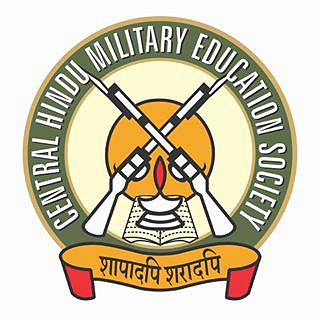
Abb.: ©Logo
[Fair use]
Karachi (Urdu: ڪراچي): schwere Ausschreitungen zwischen Hindus und Muslimen nach der Hinrichtung von Abdul Quayum, dem Mörder von Nathuramal Sharma (Hindi: नाथूरामल शर्माव्), der er ein Pamphlet über die Geschichte des Islam geschrieben hatte. Die Demonstration von 25.000 Muslimen wird vom Militär niedergefeuert: 47 Tote, 134 Verletzte.
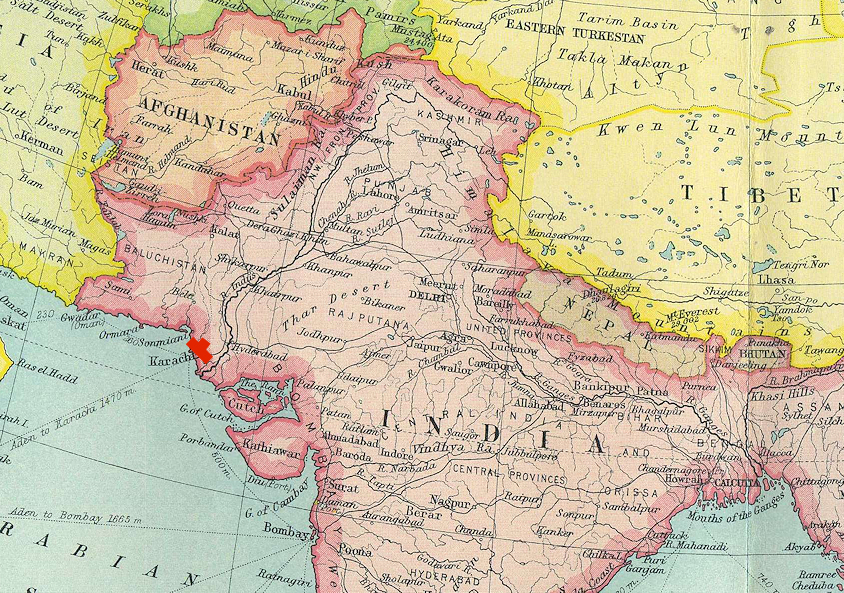
Abb.: Lage von Karachi (ڪراچي)
[Public domain]
Es erscheint der Zeitschriftenartikel:
Savarkar, Vinayak Damodar [विनायक दामोदर सावरकर] <1883 - 1966>: An introduction to factions among the Muslims. -- In: Kirloskar magazine. -- 1935-07/08
“If we have to study religions, we must set aside our prejudices and search for the truth. I say that ALL religious texts, from the conventions of tribal people as seen on the Andaman Islands, to Vedas and others, are our common heritage. They contain principles for welfare of the respective people. As such we respect them.” “In every religion, whatever is the eternal truth, that much should be accepted and the mankind will benefit by such acceptance. But, what appeared to be the truth at the time of the propagation of a religion may be found to be false or lacking in later day life or due to advances in science. We should also be honest to accept that. There is no shame or guilt if some principles are later found to be not adequate and it is our duty to acknowledge that. After all the definition of religion is ‘Dharanat dharmah itiyahu’ Dharma is for the good of the people.”
“It is therefore wrong to say that because such and such statement is found in a particular text, it must always be true. That would be bigotry and such a person cannot truly make a relative study of all religions.”
“On the other hand, an open minded person accepts that various religious texts, be they Vedas, Puranas or Koran, have done immense good to the groups of people whom they belonged in the related times and have led to their progress. However, he is also free to see if the principles in those texts are valid today. The thoughts of Aristotle, Plato, Chanakya, Hume, Huxley or Marx are studied even today without however becoming too attached or getting carried away by them. We regard their treatises as common property of the mankind and respect them as such. In a similar manner, we should carry out a historical study of various religious texts. And this should not lead to any acrimony or bloodshed as religious fanaticism had done in the past. There are no fights when reading and studying Scientific Works. No one says, “This is my Electricity and Radium and your Electricity and Radium are different.”
“We have poems by Milton, Homer, Valmiki and Omar, treatises on philosophy by Kant, Spencer, Kapil, Spinosa, histories by various scholars, scientific works on electricity, heat and other powers of nature, books on mechanics, art, novels. All such works are regarded as common property of all mankind. And their study does not lead to duels or fist fights. So, why can’t we read the few religious texts that there are, in a similar manner?”
“Those who ‘want to go by the book’ literally, object to this approach of ours. They say that human beings are unsteady, their interpretations will vary with individuals and change in time. On the other hand, Divine Revelations are fixed, unbending, free from any faults and eternal. Therefore, human beings have no alternative but to accept the religious texts as revealed or gifted to the prophets by God.”
“If that was indeed the case, it would have been simply wonderful. But...?? Even if we accept the Vedas, Koran or the Bible as Divine Revelations that does not solve the problem. There are
about seventy such religious texts in existence but they have contrary injunctions to each other and yet each religious text claims that, its particular text is TRUE, others are blasphemous.”
“So, if we accept any one of the texts as true Divine Revelations, that does not solve the problem at all. After all who is going to decide which particular text is divine and which is not? It has to be human beings, with all their failings and disabilities!! Therefore, in the end we cannot decide which particular text is true.”
“If the dispute is settled by a brute force and a particular text is imposed on mankind, that does not help either. The text may be one, but its words and sentences are subjected to different interpretations. If GOD had sent one interpretation, and made it impossible for human beings to interpret differently, that would have solved the problem. Unfortunately that is NOT the case. So, ultimately human beings as they are impart instability, variations, and many interpretations to any religious text.”
[...]
“Millions of Hindus believe that Vedas are God-given (i.e. not man-made). They say - Pramanam Paramam Shrutihi, we regard the Shrutis as standard. But every word, every Mantra is subject to many interpretations. This leads to different sects. And that is inevitable. Some argue that animal sacrifice is sanctioned in Vedas, whereas some one else preaches that Vedas say the exact opposite. Some believe that eating meat, untouchability based on birth, idol worship are all mentioned in Vedas. But others quote Vedas to prove that such practices are condemned. One party states that God is one, whereas others state that there is no God beyond certain persons and idols. Some say that renunciation of earthly life and seeking personal salvation are sanctified in Vedas, some say that they are rejected in Vedas. And this variety of meanings and interpretations are imparted not by ordinary mortals but by sages like Yask, Kapil, Jaimini, Shankaracharya, Ramanuj and Swami Dayanand Saraswati. They were all great men. How is one going to decide who is right and who is wrong? Neither can we avoid choosing one interpretation.”
“It does not help at all to consider any one religious text as the guiding book. That has not helped Koran going the same way as Vedas. Moreover, even if one version is imposed on people by force of arms, the disintegration does not stop. One Koran transpires into seven hundred versions. That is bound to happen. Therefore, it is far more sensible to regard ALL such religious texts as common property of all mankind, study them and accept what is appropriate today. That course is far more reasonable, desirable, and beneficial. Is that not so?”
(SSV3 pp 542 to 565)
[Zitiert in: Godbole, V. S. (Vasudev Shankar) [वासुदेव शंकर गोडबोले] <1941 - >: Rationalism of Veer Savarkar. -- Thane : Itihas Patrika, 2004. -- 696 S. ; 23 cm. -- Online: https://archive.org/details/RationalismOfVeerSavarkarGodboleV.S. -- Zugriff am 2018-05-15. -- S. 474ff. -- Fair use]
Savarkar, Vinayak Damodar (Marathi: विनायक दामोदर सावरकर, 1883 - 1966) in einem Zeitschriftenartikel:
"Any rationalist must use human resources for the maximum benefit of a society. He must remember that when one deals with a group of people a single banner does not help. He must find a common ground, which will be acceptable to all. Therefore, even if a tradition or a custom is based on blind religious faith, but public good can be achieved because that blind faith brings people together, it should be accepted. Only when the traditions and customs are definitely harmful to the nation, should a reformer propagate for their abandonment. While he would want to be aloof from blind faith, try to carry people on that route, but he would not cause a rift and set aside from the masses. For example, in a temple of Lord Rama, some may worship the idol of Rama as God, some may regard him as an incarnation of the divine, and some may look at it as a giver of salvation. A Rationalist may not accept any of these reasons, but will still regard Lord Rama as a great national hero and a source of national pride and inspiration. But no rationalist would say that he would not enter the temple of Rama or not take part in his birthday celebration. That kind of obsession is not rationalism but fanaticism. At times, a useful religious activity though born of blind faith is not to be discarded."
(1935 September issue of magazine Maharashtra Sharada)
[Zitiert in: Godbole, V. S. (Vasudev Shankar) [वासुदेव शंकर गोडबोले] <1941 - >: Rationalism of Veer Savarkar. -- Thane : Itihas Patrika, 2004. -- 696 S. ; 23 cm. -- Online: https://archive.org/details/RationalismOfVeerSavarkarGodboleV.S. -- Zugriff am 2018-05-15. -- S. 629. -- Fair use]
Savarkar, Vinayak Damodar (Marathi: विनायक दामोदर सावरकर, 1883 - 1966) in einem Zeitschriftenartikel:
“Some ask me, ‘How do you take part in Ganeshotsava? Are you not regarding a clay idol as God?’ I reply, ‘Just as we worship great national heroes, we also worship Gods, even though they are in the form of idols. Just as the Muslim’s desire to break idols is fanaticism, so is the tendency to curse the idols themselves. We erect statues of Shivaji and salute him and offer flowers. That is a noble thought. It should not be denounced, on the contrary it is worth encouraging." (R Era p341)
[Zitiert in: Godbole, V. S. (Vasudev Shankar) [वासुदेव शंकर गोडबोले] <1941 - >: Rationalism of Veer Savarkar. -- Thane : Itihas Patrika, 2004. -- 696 S. ; 23 cm. -- Online: https://archive.org/details/RationalismOfVeerSavarkarGodboleV.S. -- Zugriff am 2018-05-15. -- S. 629. -- Fair use]
Schlusssätze einer Rede ("Conversion Speech") (in Marathi) von Dr. B. R. Ambedkar (Hindi: भीमराव रामजी आंबेडकर, 1891 - 1956):
"Religion is for man; man is not for religion. If you want to gain self-respect * change your religion.
If you want to create a cooperating society, change your religion.
If you want power, change your religion.
If you want equality, change your religion.
If you want independence, change your religion.
If you want to make the world in which you live happy, change your religion.Why should you remain in a religion that does not value your manhood?*
Why should you remain in a religion that does not let you enter its temples?
Why should you remain in a religion that does not give you water to drink?
Why should you remain in a religion that does not let you become educated?
Why should you remain in a religion that bars you from good jobs?
Why should you remain in a religion that dishonors you at every step?That religion which forbids humanitarian behaviour* between man and man is not religion but a reckless penalty.
That religion which regards the recognition of man's self-respect* as sin is not a religion but a sickness.
That religion which allows one to touch a foul animal but not a man is not a religion but a madness.
That religion which says that one class may not gain knowledge, may not acquire wealth, may not lake up arms, is not a religion but a mockery of man's life.
That religion which teaches that the unlearned should remain unlearned, that the poor should remain poor, is not a religion but a punishment.Do not say: men who treat animals with more respect than humans and who respect all Brahmans as Gods are religious.
Do not say: men who feed ants with sugar and let men go without water are religious.
Do not say: men who embrace another religion and push their own far from them hate society."*The Marathi word manuski, a key word in the Mahar movement literature, is used four times in this segment of Ambedkars address. It may be variously translated as humanitarian attitude, self-respect, manhood, humanity. Its literal meaning is "of man".
The excerpt is the end of the speech, arranged as free verse to stress its rhythmic qualities.[Übersetzt von Eleanor Zelliot. -- Zitiert in: Kantowsky, Detlev <1936 - >: Buddhisten in Indien heute : Beschreibungen, Bilder und Dokumente. -- Konstanz : Univ., Forschungsprojekt "Buddhistischer Modernismus", ©1999. -- 216 S. : Ill. -- (Forschungsberichte / Universität Konstanz, Arbeitsbereich Entwicklungsländer, Interkultureller Vergleich, Forschungsprojekt "Buddhistischer Modernismus" ; 16). -- Online: http://www.ub.uni-konstanz.de/kops/volltexte/2000/562/. -- Zugriff am 2003-06-05. -- S. 29 f. -- Fair use]
Es erscheint;
Nehru, Jawaharlal [Hindi: जवाहरलाल नेहरू] <1889 - 1964>: An autobiography : with musings on recent events in India. -- London : John Lane, 1936. -- 618 S. : Ill. -- Online: https://archive.org/details/in.ernet.dli.2015.526804. -- Zugriff am 2018-05-29
"The Congress was in a quandary. Sensitive to and representative of national feeling as it was, these communal passions were bound to affect it. Many a Congressman was a communalist under his national cloak. But the Congress leadership stood firm and, on the whole, refused to side with cither communal party, or rather with any communal group, for now the Sikhs and other smaller minorities were also loudly voicing their particular demands. Inevitably this led to denunciation from both the extremes. Long ago, right at the commencement of non-co-operation or even earlier, Gandhiji had laid down his formula for solving the communal problem. According to him, it could only be solved by goodwill and the generosity of the majority group, and so he was prepared to agree to everything that the Muslims might demand. He wanted to win them over, not to bargain with them. With foresight and a true sense of values he grasped at the reality that was worth while; but others who thought they knew the market price of everything, and were ignorant of the true value of anything, etude to the methods of the market-place. They saw the cost of purchase with painful clearness, but they had no appreciation of the worth of the article they might have bought."
[a.a.O., S. 136. -- Fair use]
Benares (Hindi: वाराणसी): Bau des Bharat Mata Mandir (Hindi: भारत माता मन्दिर)
Wikipedia: https://en.wikipedia.org/wiki/Bharat_Mata_Mandir. -- Zugriff am 2018-05-04
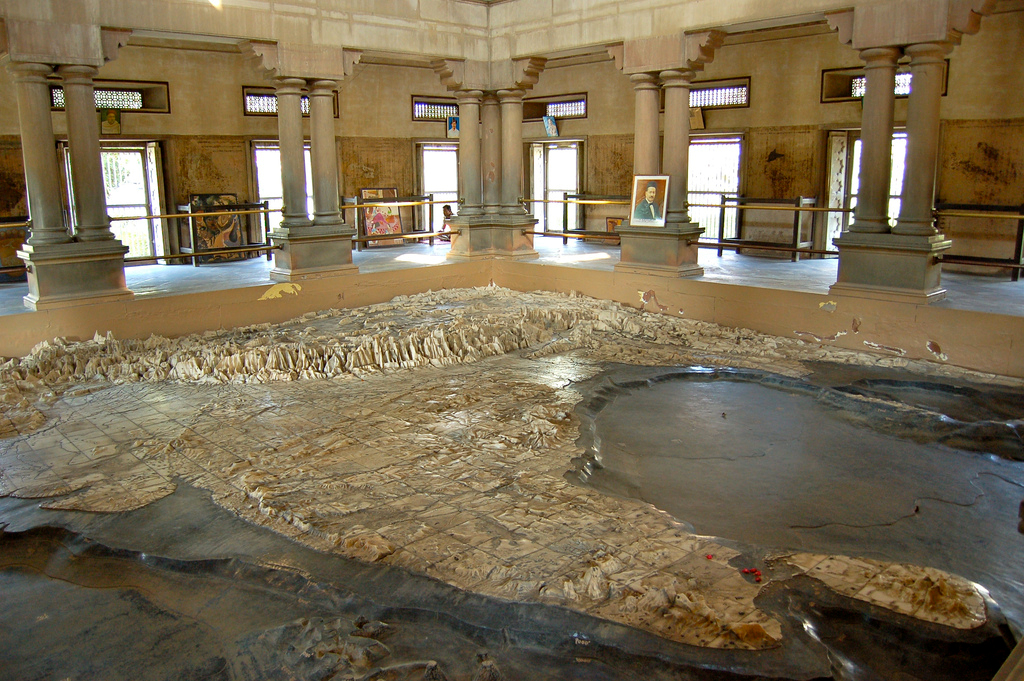
Abb.: Relief Indiens im Bharat Mata Mandir (Hindi: भारत माता मन्दिर), 2011
[Bildquelle: Manuel Menal. --
https://www.flickr.com/photos/28552823@N02/6333842249. -- Zugriff am
2018-05-04. --
CC BY-SA 2.0]
Rishikesh (Hindi: ऋषिकेश): Swami Sivananda (1887 – 1963) gründet die Divine Life Society
Webpräsenz: http://www.dlshq.org/. -- Zugriff am 2018-05-04
Wikipedia: https://en.wikipedia.org/wiki/Divine_Life_Society. -- Zugriff am 2018-05-04
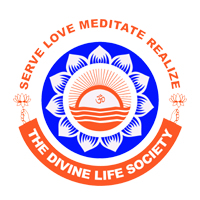
Abb.: ©Logo
[Fair use]
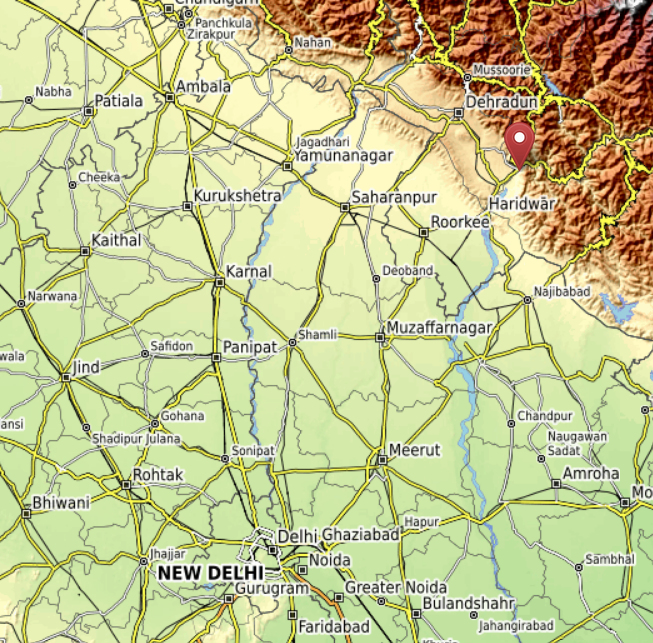
Abb.: Lage von Rishikesh (Hindi: ऋषिकेश)
[Bildquelle: © OpenStreetMap-Mitwirkende.
--
CC BY-SA 2.0]
Firozabad (Hindi: फ़िरोज़ाबाद): Blutige Ausschreitungen zwischen Muslimen und Hindus
11 Tote
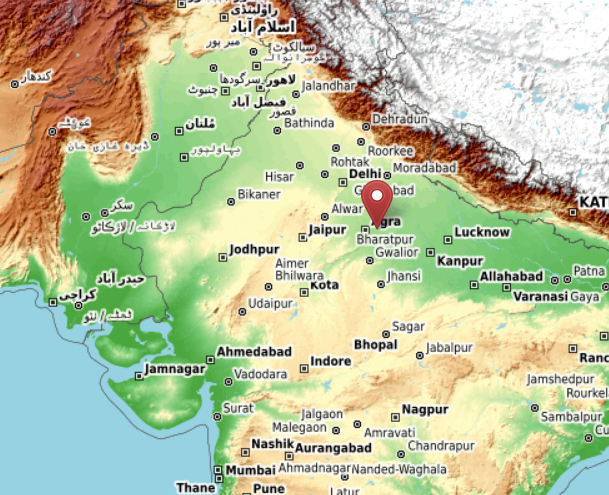
Abb.: Lage von Firozabad (Hindi: फ़िरोज़ाबाद)
[Bildquelle: © OpenStreetMap-Mitwirkende.
--
CC BY-SA 2.0]
Gründung der Rashtra Sevika Samiti - Hindi: राष्ट्र सेविका समिति -- National Volunteer Association for Women

Abb.: ©Logo
[Fair use]
Muslim Personal Law (Shariat) Application Act, 1937
"2. Notwithstanding any custom or usage to the contrary, in all questions (save questions relating to agricultural land) regarding intestate succession, special property of females, including personal property inherited or obtained under contract or gift or any other provision of Personal Law, marriage, dissolution of marriage, including talaq, ila, zihar, lian, khula and mubaraat, maintenance, dower, guardianship, gifts, trusts and trust properties, and waqfs (other than charities and charitable institutions and charitable and religious endowments) the rule of decision in cases where the parties are Muslims shall be the Muslim Personal Law (Shariat)." [Quelle: http://bdlaws.minlaw.gov.bd/print_sections_all.php?id=173. -- Zugriff am 2018-05-22]
Ende der Zusammenarbeit zwischen Hindu Mahasabha (Hindi: अखिल भारतीय हिन्दू महासभा ) und Indian National Congress.
Ahmedabad (Gujarati: અમદાવાદ): Rede von Vinayak Damodar Savarkar (Marathi: विनायक दामोदर सावरकर, 1883 - 1966) auf dem Kongress der Hindu Mahasabha (हिन्दू महासभा) :
"Several infantile politicians commit the serious mistake in supposing that India is already welded into a harmonious nation, or that it could be welded thus for the mere wish to do so. These our well-meaning but unthinking friends take their dreams for realities. That is why they are impatient of communal tangles and attribute them to communal organizations. But the solid fact is that the so-called communal questions are but a legacy handed down to us by centuries of a cultural, religious and national antagonism between the Hindus and the Muslims. When the time is ripe you can solve them; but you cannot suppress them by merely refusing recognition of them. It is safer to diagnose and treat deep-seated disease than to ignore it. Let us bravely face unpleasant facts as they are. India cannot be assumed today to be a unitarian and homogeneous nation, but on the contrary these are two nations in the main, the Hindus and the Muslims in India." [Zitiert in: Ambedkar, B. R. [भीमराव रामजी आंबेडकर] <1891 - 1956>: Pakistan or The partition of India. -- 3. ed. -- Bombay : Thackers, 1945. -- S. 129]
Panipat (Hindi: पानीपत): Blutige Ausschreitungen zwischen Muslimen und Hindus wegen Holi-Prozession
14 Tote
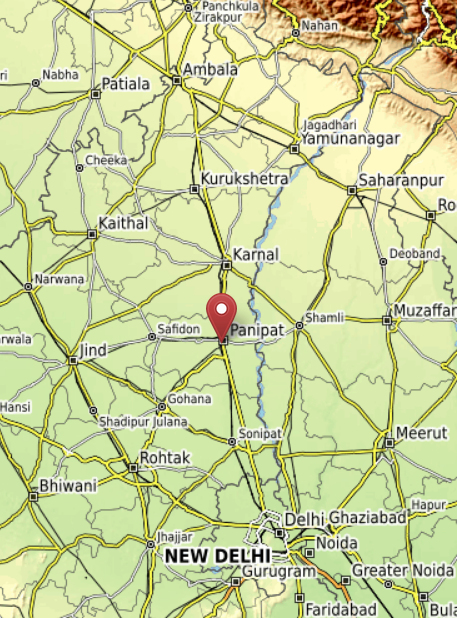
Abb.: Lage von Panipat (Hindi: पानीपत)
[Bildquelle: © OpenStreetMap-Mitwirkende.
--
CC BY-SA 2.0]
Der Government of India Act 1935 tritt in Kraft.
Wikipedia:https://en.wikipedia.org/wiki/Government_of_India_Act,_1935. -- Zugriff am 2018-05-15
Madras (Tamil: மெட்ராஸ்): Ausschreitungen zwischen Muslimen und Hindus
50 Verletzte
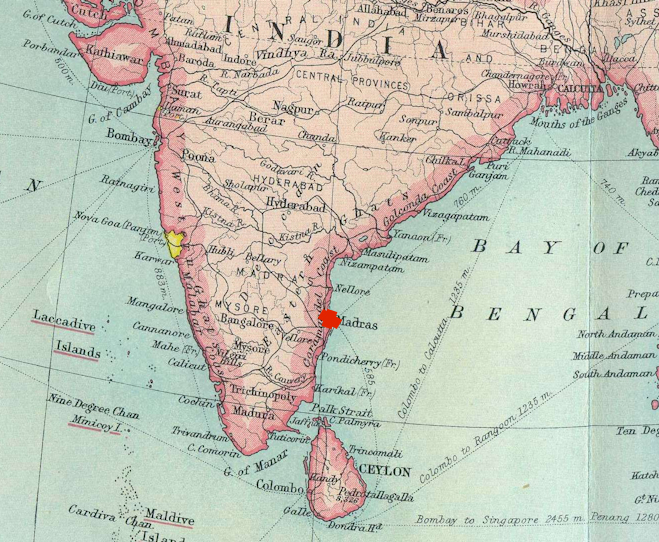
Abb.: Lage von Madras (Tamil: மெட்ராஸ்)
[Public domain]
Nashik (Marathi: नाशिक): Gründung der Bhonsala Military School

Abb.: ©Logo
[Fair use]

Abb.: ©Logo
[Fair use]
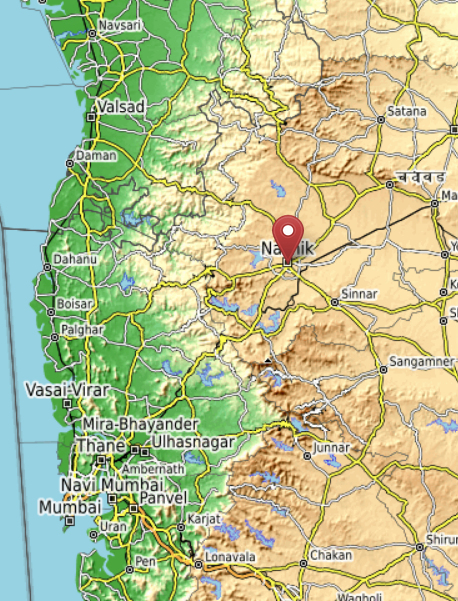
Abb.: Lage von Nashik (Marathi: नाशिक)
[Bildquelle: © OpenStreetMap-Mitwirkende.
--
CC BY-SA 2.0]
Amritsar (Panjabi: ਅੰਮ੍ਰਿਤਸਰ): Ausschreitungen zwischen Muslimen und Sikhs. Werden vom Militär niedergeschlagen.
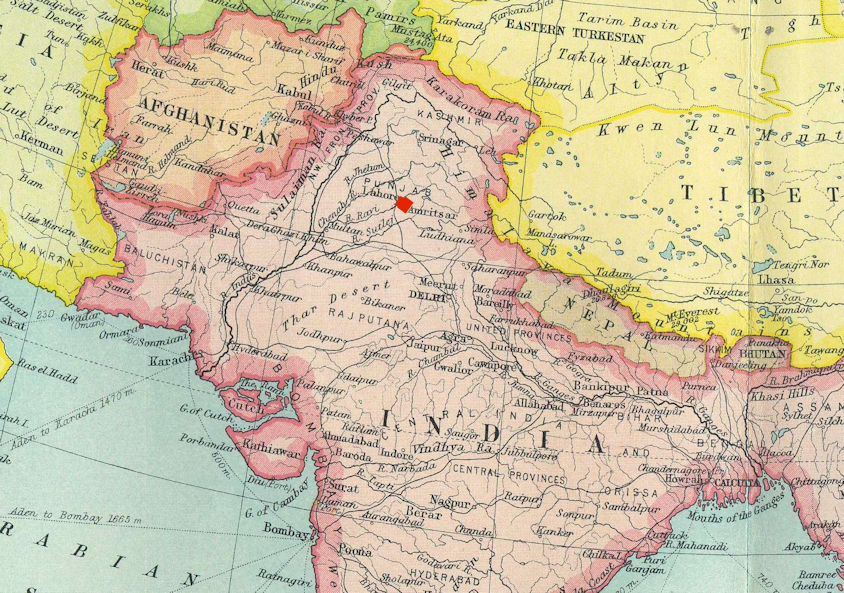
Abb.: Lage von Amritsar (Panjabi:
ਅੰਮ੍ਰਿਤਸਰ)
[Public domain]
Vinayak Damodar Savarkar (Marathi: विनायक दामोदर सावरकर,1883 - 1966) lobt in der Zeitschrift Hindu Outlook den Anschluss des Sudetenlandes an das Deutsche Reich (1938-09-30), da die Sudetendeutschen "common blood and common language with the Germans" teilen.
[Zitiert in: Jaffrelot, Christophe <1964 - >: The Hindu nationalist movement in India. -- New York : Columbia Univ. Pr., 1996. -- 592 S. : Ill. -- Originaltitel: Les nationalistes hindous (1993). -- S. 51. -- Fair use]
Kanhaiyalal Maneklal Munshi (Gujarati: કનૈયાલાલ માણેકલાલ મુનશી, 1887 – 1971) gründet den Bharatiya Vidya Bhavan Educational Trust.
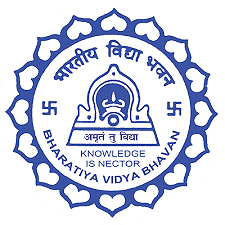
Abb.: ©Logo
[Fair use]
Webpräsenz: http://www.bhavans.info/. -- Zugriff am 2018-03-21
"It would be instructive to remember that Kulapati Kanhaiyalal Maneklal Munshi [Gujarati: કનૈયાલાલ માણેકલાલ મુનશી, 1887 – 1971] founded the Bhavan a full decade before the advent of Independence. 7th of November 1938 was the beginning of an 'Adventure in Faith'. A faith in India's Past, Present and Future. The founding of Bhavan was based on the preservation and propagation of Bharatiya Sanskriti [Hindi: भारतीय संस्कृति] (Indian culture) and Sanskrit, the mother of languages, the akshaya patra [Sanskrit: अक्षयपात्र] - the inexhaustible reservoir. This unpretentious endeavour was backed by Kulapati Munshi's amazing pragmatism. Over the years from being a modest Indological research institution, it has steadily grown into a comprehensive, co-operative, apolitical, national movement with an international outlook. It seeks to inculcate a value-based life. The promotion of ethical and spiritual values in everything that it does.. "... Our country will soon be the knowledge hub of this century. "
Bharatiya Vidya Bhavan is the only comprehensive organization of its kind in India
and perhaps the only one in the world.
Multi-dimensional programmes ...
devoted to life itself as it were.
... Bhavan's large and growing extended family continues to grow.
It steadfastly adheres to the Vedic ideal:"Let noble thoughts come to us from every side."
[Quelle: http://www.bhavans.info/. -- Zugriff am 2018-03-21. -- Fair use]
Wikipedia https://en.wikipedia.org/wiki/Bharatiya_Vidya_Bhavan_Educational_Trust. -- Zugriff am 2018-03-21
Nagpur (Marathi: नागपूर): es erscheint:
Golwalkar, Madhav Sadashiv [माधव सदाशिव गोलवलकर] <1906 - 1973>: We or Our nationhood defined. -- Nagpur : Bharat Prakashan, 1939. -- 83 S. -- Online: https://sanjeev.sabhlokcity.com/Misc/We-or-Our-Nationhood-Defined-Shri-M-S-Golwalkar.pdf. -- Zugriff am 12018-03-17
Abb.: Einbandtitel eines Nachdrucks
[Fair use]
"CHAPTER V If, as is indisputably proved, Hindusthan [हिन्दुस्तान] is the land of the Hindus and is the terra firma for the Hindu nation alone to flourish upon, what is to be the fate of all those, who, today, happen to live upon the land, though not belonging to the Hindu Race, Religion and culture? This question is too very common and has its genesis in the generous impulse of so many Hindus themselves, that it deserves at least a brief answer.
At the outset we must bear in mind that so far as 'nation' is concerned, all those, who fall outside the five-fold limits of that idea, can have no place in the national life, unless they abandon their differences, adopt the religion, culture and language of the Nation and completely merge themselves in the National Race. So long, however, as they maintain their racial, religious and cultural differences, they cannot but be only foreigners, who may be either friendly or inimical to the Nation. In all ancient Nations i. e. all those who had a well developed National life even before the Great War, this view is adopted. Though these Nations practise religious toleration, the strangers have to acknowledge the National religion as the state Religion and in every other respect, inseparably merge in the National community. Culturally, linguistically they must become one with the National race; they must adopt the past and entertain the aspirations for the future, of the National Race; in short, they must be '"Naturalized" in the country by being assimilated in the Nation wholly. Naturally, there are no foreigners in these old Nations, and no one to tax the generosity of the Nation by demanding privileges, as 'Minority communities' in the State. It is this sentiment which prompted the United States of America, England, France and other old Nations to refuse to apply the solution of the Minorities problem arrived at by the League of Nations, to their States. The avowed reason for their declaration, that the decision of the League was not binding upon them, was that its application might shatter the unity of their empire and create uncalled-for difficulties, by rousing the demon of separateness and variegated interests of the distinct minorities, which had been so long laid at rest. The same sentiment has been expressed in the speech of the American Representative to the League, on the occasion of discussing the advisability of applying the "Minorities" decision to all the countries in the world. He said, there are no distinctive characteristics in respect of Race, Language and Religion between the elements forming each of the peoples of that continent (America). Uniformity of language throughout the territory of each American State, complete religious tolerance combined with a completely natural assimilation of emigrants by the principal mass of population of each of the States, have produced in them natural organisations, of which the collective unity is complete. This means that the existence of minorities, in the sense of persons with a right to the protection of the League of Nations, is impossible ". It is worth bearing well in mind how these old Nations solve their minorities' problem. They do not undertake to recognise any separate elements in their polity. Emigrants have to get themselves naturally assimilated in the principal mass of population, the National Race, by adopting its culture and language and sharing in its aspirations, by losing all consciousness of their separate existence, forgetting their foreign origin. If they do not do so, they live merely as outsiders, bound by all the codes and conventions of the Nation, at the sufferance of the Nation and deserving of no special protection, far less any privilege or rights. There are only two courses open to the foreign elements, either to merge themselves in the national race and adopt its culture, or to live at its mercy so long as the national race may allow them to do so and to quit the country at the sweet will of the national race. That is the only sound view on the minorities' problem. That is the only logical and correct solution. That alone keeps the national life healthy and undisturbed. That alone keeps the Nation safe from the danger of a cancer developing into its body politic of the creation of a state within the state. From this standpoint, sanctioned by the experience of shrewd old nations, the foreign races in Hindusthan must either adopt the Hindu culture and language, must learn to respect and hold in reverence Hindu religion, must entertain no idea but those of the glorification of the Hindu race and culture, i.e., of the Hindu nation and must lose their separate existence to merge in the Hindu race, or may stay in the country, wholly subordinated to the Hindu Nation, claiming nothing, deserving no privileges, far less any preferential treatment - not even citizen's rights. There is, at least should be, no other course for them to adopt. We are an old nation; let us deal, as old nations ought to and do deal, with the foreign races, who have chosen to live in our country.
In the new states created after the war, however, such an assimilation had not been achieved, nor was there any prospect of its being achieved in the near future. All the same, this tried solution of the problem of the foreign races, should have been as a rule applied everywhere. But the League of Nations struck another note and formulated the now famous minority treaties - and laid down certain general propositions, which have been acclaimed as "the public law of the world." (Arthur Henderson's speech-page 24, monthly summary of the League of Nations, Jan. 1931 ) But not without many an apprehension and misgiving. The authors of the solution knew how beset it was with grave dangers, and yet they hoped that these treaties would serve as a first step, their declared object being "to secure for the minorities that measure of protection and justice, which would gradually prepare them to be merged in the national community to which they belonged." (Sir Austin Chamberlain's speech at the League Council on 9th Dec. 1925. quoted by Dr. Radhakumud Mukerji). This risk, which the League ran certain states into, has been vividly expressed by Paul Fauchille [1858 - 1926] in his speech at the League Council on 9-12-25. He said,
"this is a solution (the minority rights solution) which perhaps is not without certain dangers; for, if equality of treatment of all the inhabitants of a country, is an element of political and social peace, the recognition of rights belonging to minorities as separate entities, by increasing their coherence and developing in them a sense of their own strength, may provoke them to separate themselves from the state of which they form a part; and in view of the right of peoples to dispose of themselves, the recognition of the rights of these minorities runs a risk of leading to the disruption of states".
Prophetic words! How true they sound today after the recent developments in Europe, under the very nose of the League of Nations! The disastrous fate of the unfortunate Czechoslovakia (to which as promised, we now refer) proves beyond the faintest shadow of a doubt, how hollow were the League's hopes and how justified the fears of Paul Fauchille. And yet the decision of the League on the minorities' rights was the most equitable and just, that could be conceived of. But even this just and equitable arrangement, instead of fostering the assimilation of the minorities into the National community, only served to increase their coherence and create in them such a sense of their own strength, that it led to a total disruption of the state, the Sudeten German minority merging in Germany, the Hungarians in Hungary, in the end leaving the National Czechs to shift for themselves in the little territory left unto them.
Let us be forewarned, lest the same story repeat itself in our Country. Our modern solution of the minorities' problem is far more dangerous. It confers untold rights not only on those who by their number and years of residence (we doubt it) may be considered according to the League as minorities, but also on all else, howsoever few or recent in their settlement-rights and privileges far in excess of the minimum advocated by the League. The natural consequences are even now felt and Hindu National life runs the risk of being shattered. Let us take heed and be prepared. We will not dilate upon this danger here, as it is outside the ambit of our work; we leave it to the reader to think for himself and read it in the developing events. We only remind him that it was not for nothing that all experienced Nations refused to adopt this decision of the League; that it is not for nothing that they refuse to recognise any elements entitled to separate treatment, that they insist on subordinating all to the general National life-religious, cultural, linguistic, political, that they lay so much stress, on the foreigners, either cutting their old associations and merging in the body of their National race in; every way, or deserving no right what-so-ever, no claim to any obligations from the National race. And having thus reminded him, we leave the reader to ponder over the Czech affair and find out for himself how; our National life is in even a much greater danger.
But enough of this. We refer, on the problem of minorities, our reader to "India and the League of Nations Minority Treaties" by Dr. Radhakumund Mukerji [রাধাকুন্দ মুখোপাধ্যায়, 1884 - 1964], M. A. Ph. D. and return to our subject. Indeed these questions arise in discussions about a "State" we are out to understand the Nationhood of Hindusthan, which done, all questions regarding the form of "State" shall be worth entrusting to the "Nation" as we find it to exist."
[a.a.O.]
"EPILOGUE We, however, do not despair of the future. We warn our feeling reader that he may have walked too near the brink of the 'Slough of Despond' and pray him not to stalk into it blindly. For there is hope. Wait and work and the race spirit which all along has been protecting us from certain destruction, shall do so once again. Our mission in the world is unfulfilled and is eternal. All past civilizations "had their day, abode a day or two and passed away", because they had nothing to fulfil. We, however, live on, despite far greater calamities, and ever emerge triumphant masters of the world. We have no reason to lose hope. "Act first........................a stage so gloomed with woe, We all but sicken at the shifting scenes. And yet be patient, our Play-Wright ' will' show, in some fifth Act what this wild drama means." Let us be patient. This is but the darker darkness before the dawn—the inevitable sunrise. Do we not already see the heralding streaks of the great luminary, brightening up the whole horizon on the East?
Every time our race has been down-trodden, Beings of a super-human order, veritable divinities, have been born in our land and revitalized our Nation. Every event of national regeneration has been preceded by a glorious outburst of spirituality, our indomitable race-spirit, which has always heralded a period of all-round glory. Our race is in truth the phoenix which rises in new youthful vigour from its very ashes. We cannot die. What seems to be our death merely confers upon us a fresh lease of life. We are an immortal race with perennial youth. Take any instance of national greatness and the truth of this statement shall be revealed. The great Empire of Ashoka [304 - 232 v.] had its birth in the spiritual awakening under Lord Buddha. Shree Shankaracharya [Malayalam: ശങ്കരാചാര്യർ, 8./9. Jhdt.] was in time followed by the illustrious Vijayanagar Empire. The great Hindu renaissance under Chhatrapati Shivaji [छत्रपति शिवाजी महाराज, 1630 - 1680] was the outcome of the years of spiritual life, blossoming forth in a Jnaneshwar [Marathi: ज्ञानेश्वर, 1275 - 1296], a Tukaram [Marathi: तुकाराम, 17. Jhdt.], a Ramdas [Marathi: रामदास, 1608 - 1682]. The great religious masters, Guru Nanak [Panjabi: ਗੁਰੂ ਨਾਨਕ ਦੇਵ] and his successors, laid the foundation of the Hindu upheaval exhibiting itself in the warlike Sikhs. And the same story is repeating itself today. The spiritual Sun has broken forth in all its glory in Bengal as the Shree Ramakrishna-Vivekananda order, in the Punjab, in the persons of Swami Dayanand [દયાનંદ સરસ્વતી, 1824 –1883] and Swami Ramtirth [ਸਵਾਮੀ ਰਾਮਤੀਰਥ, 1873 - 1906], in the South it manifests itself through Maharshi Ramana [ரமண மஹரிஷி, 1879 - 1950] and the great patriot Sage Arobindo Ghose [অরবিন্দ ঘোষ, 1872 - 1950] sits in Pondicherry [Tamil: பாண்டிச்சேரி] brooding deep over the spiritual awakening of the National race spirit. Here is an all absorbing flood of spiritual light, dispelling all darkness, all doubt, and pregnant with the promise of rejuvenation in store for the Hindu Nation.
We have no reason to be afraid of our future. We have no cause to despond. All we have to do to remount our throne is to respond to the awakened Race-spirit and re-rouse our national consciousness, and victory is in our grasp. The undying voices of our sages call; let us gird up our loins and follow them. The spirit of the race beckons to us and has lighted for its benighted children the path to their cherished ideal, with beacons of undying spiritual splendour. Let us rouse ourselves to our true nationality, let us follow the lead of our race-spirit, and fill the heavens with the clarion call of the Vedic seers "from sea to sea over all the land - One Nation," one glorious, splendorous Hindu Nation benignly shedding peace and plenty over the whole world."
[a.a.O.]
Calcutta (Bengali: কলকাতা): Es erscheint:
Savitri Devi [= Maximiani Portas] <1905 - 1982>: A Warning to the Hindus. -- Calcutta : Hindu Mission, 1939. -- 154 S. -- Online: https://archive.org/details/AWarningToTheHindus. -- Zugriff am 2018-04-13. -- Mit einem Vorwort von Ganesh Damodar Savarkar (Marathi: गणेश दामोदर सावरकर, 1879 – 1945), dem Bruder von Vinayak Damodar Savarkar (Marathi: विनायक दामोदर सावरकर, 1883 - 1966). Vinayak Damodar Savarkar hat das Buch nachhaltig begeistert gelesen.
Wikipedia: https://en.wikipedia.org/wiki/A_Warning_to_the_Hindus. -- Zugriff am 2018-06-10
Webpräsenz: https://www.savitridevi.org/. -- Zugriff am 2018-04-13
Abb.: Einbandtitel einer Neuausgabe
[Fair use]
"Indian Nationalism and Hindu Consciousness What we have just said about creedal and non-creedal religions, leads us to the statement which can be considered as the main thesis of this essay: Hinduism is the national religion of India, and there is no real India besides Hindu India.
We know, there are people in India, nowadays, (and, unfortunately, not merely among the non-Hindus) who are ready to criticise this statement. They tell us that “religion is a personal concern; why should not every Indian follow the one he pleases? That has nothing to do with his national feelings.” They tell us that “in all civilised countries, nationality and religion are two separate entities.” They tell us that, “in Japan, for instance — the most progressive country of Asia — people of the same family may frequent different temples, belong to different religions, and yet be united.” And they add: “In India, why should it not be the same?”
All these remarks presuppose the same fundamental confusion of the two entirely different meanings of the word “religion,” that is to say, creed and culture. They are perfectly justified as long as one speaks of “religion” as a creed. They do not hold, when “religion” means a culture and a civilisation, without any special creed, which is the case with Hinduism.
Religion is a personal concern. That is true if, by “religion,” you mean a spiritual path. No Hindu will deny that paths leading to the realisation of one's soul are infinite in number. None either will deny that creeds also may be contrary, and yet all true, for truth has contrary aspects; that, in the same family, one can worship a personal God, another, a number of Gods and Goddesses, and a third one, no God at all, and yet, all three may be united in the most perfect brotherhood. It is only those who believe that one only creed is true, while all the others are false and harmful, who can insist on forcing the same faith upon the whole world. But the Hindus never shared this belief.
As far as religion means a path to salvation, to “realisation of one's inner self,” to “Godhood,” etc., not only it should be, but it always is, in fact, separate from nationality, and beyond the interference of State. Even in the case of a religion supposed to unite all its followers on the basis of a common creed, the spiritual path that each one takes, is different, and outside State control; for it is psychologically impossible for different people to “realise” the truth, expressed by the same dogmas, in exactly the same way. The most an autocratic State can do, if it must poke its nose into religious matters, (“religious” meaning spiritual, or even merely metaphysical), is to force unto the people the exterior acceptance of the same dogmas, under threat of punishment. That is what Christian States have tried in Europe, during the days of the Holy Inquisition. And that is the limit of what can be tried. It has proved a failure; for never an entire nation of so-called Christians has been united in the same faith, (in the same creed), not to speak of the same inexpressible realisation of God. If you only just examine the personal faith of a few Christians of the same nationality, you will easily be convinced of the truth of this statement.
In the “civilised” countries where “religion” and nationality, Church and State, are supposed to be separate, creed and nationality are separate, and always were, inspite of infructuous efforts to establish State dogmas.
But culture and nationality are not separate; civilisation and nationality are not, and never will be.
Nowadays, a Frenchman who is a Catholic and a Frenchman who is a Theosophist, and another one who is a Seventh Day Adventist, are all three Frenchmen, not merely because they all speak French and have the same French ancestors, and live on the same soil. They are all three French because, in spite of minor differences (the Theosophist may be a vegetarian and the Catholic a meat-eater; their opinions may also differ, concerning the nature of God), they share common daily thoughts, common habits; a common way of dressing, of sitting, of furnishing their houses; some common standardised ideas about literature, art, music, science; in one word, that what we call “French culture” and “French civilisation.”
French culture is not a religion, for sure. But it is an aspect of the broader and more complex “European culture” and “European civilisation” which is that culture and civilisation that developed in the West of Europe, under the double influence of Christianity and Rationalism. We cannot call it Christian culture and civilisation, for Christianity alone has not produced it. And though the part played in its development by Christianity is great, no doubt, it is difficult to determine. Christianity being a “creed” before anything else, could not be the only factor in this huge creation of this world.
The fact that “religion” means (at least in the modern East), culture and civilisation as well as personal creed, misguides us when we bring forth, as an example of progress, the countries where “Church and State” are separate. If “Church,” if “religion,” is taken in its later sense, that of civilisation and culture, then, religion and State, or, better say, religion and society, are separate nowhere, not even in the West. Just try to imagine the case of a Frenchman who would live entirely, in his daily life, according to Mohammadan lines! The case is not impossible. But the gentleman, inspite of his European face and of his ancestry, would no longer be a Frenchman. He would be some sort of non-European, exiled in France.
The example of the creedal toleration of Japan, is as fallacious as that of the modern States of Europe. It may be that, in some Japanese families, from the point of view of creed, two brothers are Buddhists, a third one Christian, and a fourth one, a faithful observer of Shintoic rites (which implies no creed). That is to be said about the four men, as spiritual beings or as thinkers: two believe in the Buddha, in the Law, and in the Community; one, in Christ; and the other one may be an agnostic, or anything else. But, as social beings, they all live in the same way, think according to the same standards, share the same culture; as Japanese, they can all four be said followers of Shinto. Theirs is the smiling and heroic civilisation that Shinto thought and custom have brought forth. The sanctity of the Emperor is as great to the so-called Christian as to the faithful observer of the national rites. Moreover, the Christian himself will not hesitate to take part in a public function, performed according to Shinto rites, as a member of the nation. And, just as the rest of his compatriots, Shintoists, Buddhists, or whatever they may be, he bears a Japanese name — not a “Christian” one, which would be a foreign one, whether imported from Portugal or from America, or directly from the Bible, that is to say, from Palestine.
* * *
Variety of faiths is no hindrance to the formation of nationality, or to the solidity of national unity. And we repeat: in no civilised nations do all the citizens understand religion in the same way exactly, even if they profess the same creed, (religion meaning a path to spiritual knowledge).
But no nation can grow out of the patch-work binding together two or more civilisations. The very idea of common nationality, and the idea of pertaining to different cultures and civilisations, are contradictory. We cannot say: a French Catholic and a French Theosophist are both French, therefore why should a Hindu Indian and a Musulman Indian not be two Indians? This presumption of an analogy between the two cases, is as fallacious as the statements referred to above, about “Church and State.” There is such a thing as French civilisation and culture, which is neither Theosophical, nor strictly Catholic. But there is no such thing as an Indian civilisation, which is neither Hindu nor Musulman. And just as France, just as Japan, just as any nation in the world, if India is to be a nation, she must have one civilisation, one culture, not half a dozen.
And the only civilisation for all India is Hindu civilisation. The only culture for all India is Hindu culture. Indian national consciousness is nothing else but Hindu national consciousness, strengthened, enlightened, broadened.
Why?
We have said that, in no country which is really a nation, two or more civilisations coexist. But it is undeniable that some (and even most) nations, have gone through two or more civilisations, one after the other. Christian Catholic Italy is not the Italy of the Caesars, however, she may be proud of all what Pagan Rome was. It is Italy still, to us, who have not known the former Italy directly. Nobody can tell what an ancient Roman would think of his country, if he came back. Nobody can tell what Hypatia would think of her Greeks, if she came back. In her days of struggle between the old Greek civilisation, with its Gods and its philosophies, and the new one, based upon Byzantine Christianity, the Pagans alone were honoured with the name of “Hellenes,” that is to say: “Greeks,” and of “Ethnikoi” that is to say: “nationals.” The Christians were simply called Christians, without any distinction of race or country. Now, the inspired champion of Hellenic Paganism would find that “Hellen” and “Christianos” have become synonymous. Byzantine Christianity, (or, better say, Byzantine Christian civilisation, grown in the union of State and Church) has given Greece a new national consciousness.
But a new national consciousness, based upon a new civilisation, with a new mythology at its background, can only grow, in a nation, when the old one is dead. The old one must die first. Take the case of Greece: not until the last man bearing witness of the greatness of Greek Paganism had passed away, styled by his Christian countrymen as “Greek” and as “National,” could the Christian Greeks feel themselves Christians and Greeks, and boast of their Church as of a national Church, and forget that their religion had come from a foreign land.
In the same way, even if we admit, for sake of argument, that there can be a genuine Indian national consciousness with Islam at its background, we must remember that it is not until the last Hindu Indian comes to pass away, that such a consciousness can rise.
The least one can say is that this possibility is very remote.
* * *
It is one thing to read about one's former national religion in a textbook, and it is quite a different thing to see it, living all around, with sounds and colours, in daily life.
Christian Italy and Christian Greece can easily have a national consciousness of themselves as “Christian” countries. Their people know about their beautiful ancestral Paganism through two things only: through books and through ruins. But no written description and no gorgeous remains whatsoever eloquent, can be as eloquent as living life.
Indian Mohammadans and Christians have the sight of the national Paganism which they have forsaken, daily before their eyes; not in books and works of art alone, but in the millions of Hindu brethren in the midst of whom they themselves move about. In vain their Indian ancestry and their Indian tongue remain important factors, which could, under other circumstances, create in them an Indian nationalism. What is India? And who is an Indian? Above the entrance of one of the great libraries of Athens, one can read these words: “Are Greeks, those who share our culture.” Are Indians also, first of all, those who share Indian culture and Indian civilisation. And, as long as there is a single Hindu family performing, to a certain extent, the ancient rites, living according to Hindu lines, and creating, wherever it is, a Hindu atmosphere, non-Hindu Indian nationalism is inconceivable. The Hindus, however few they may be, will keep on saying to the non-Hindus, by the fact of their very presence: “We represent India; not you. Therefore India is ours, not yours.”
And they will be right. India is theirs, because they alone are India.
The Indian Mohammadans themselves can realise, half-consciously, the fact of Hinduism being the only Indian civilisation and culture. That is perhaps why they like to imagine that their ancestors were all immigrants from Persia or Arabia. This claim is absurd. The Mohammadan population of only one district in Bengal (Mymensingh) is more than half the total population of Arabia. In fact, practically all the Musulmans of India are the descendants of converts from Hinduism. They are Indians by blood, no doubt. But to feel: “We are Indians” would mean, to admit that beautiful Hindu culture is theirs also. Then, perhaps, many would feel like coming back to the still numerous fold, and sharing the national life once more, with their Hindu brethren. But their religion, being a creedal one, is naturally intolerant. Non-Musulmans must be looked upon as “heathen,” and everything “heathen” must be rejectable — everything, including Indian nationalism, that is to say, the consciousness of unity with “heathen” people, on the basis of a common “heathen” civilisation and culture. Moreover, the Hindu brethren will not take them back in their society. So it is better for them, to say, like the fox in the fable, that “the grapes are sour;” it is better to call themselves the descendants of Arabs and Persians, and to feel themselves one with the Mohammadan countries outside India. There is a lesser possibility for some of them to be tempted, sooner or later, to prefer India to Islam; and a lesser possibility also, for those who may be tempted already, if any, to fall into temptation, and meet with bitter disappointments in daily life.
Hinduism, taken not as any particular Hindu philosophy, neither as any particular spiritual path, but as Hindu culture and civilisation as a whole, is not merely India's national religion (“religion” meaning, here, both culture, civilisation and cult), but it is also the only religion which can remake India a strong glorious nation — a World power. It is the only religion which can become, more and more, the very expression of Indian nationalism.
First of all, Hinduism has developed in India. All its immense mythology (the most important part of it, for those who are not merely intellectuals; and how many are intellectuals wholesale?) is closely linked with the Indian soil. Its Gods and Goddesses are, no doubt, world-forces, philosophically, but practically, socially, they are Indians. Most Indians cannot realise yet what an advantage it is for them, as a nation, to be the compatriots of their Gods and Goddesses.
Every country is sacred to those who love it. But India is the field of worldly play, (lila kshetra,) of all those Gods, Goddesses, Rishis and Incarnations, whom the Hindu Scriptures speak about, of whom the Hindu children know the names and the marvellous stories; to whom incense is burnt, and flowers offered, in the Hindu temples, shrines, and homes. And this gives to India's sacredness a religious sanction. The love of an Indian for his soil (if that Indian be a Hindu), is not an ordinary patriotism, like that of an Englishman or a Frenchman. It is also reverence for the land of the Gods.
An Englishman may certainly love his England. But if he is a Christian, he must be feeling that Palestine, where his Lord was born, and preached, and died, is still more holy than England can ever be. If he would go on a religious pilgrimage, it would be to Jerusalem, outside England, not to any place in England. The same with a Frenchman, or any modern European. But just as an ancient Greek used to have his sacred places in Greece, a modern Hindu has still his sacred places within the boundaries of his motherland. Wherever he may go on a pilgrimage, may it be to Benares, to Mathura, to Gangotri or to Rameswaram, he will remain in India, in contact with his own soil. An Indian Mohammadan has to look abroad, to the most sacred spots on earth. So has an Indian Christian. A Hindu enjoys the privilege of regarding his own India, not only as the most beloved or as the most beautiful, but also as the most holy Land on earth.
* * *
Secondly, it is through Hinduism alone that one can realise India's unity, as a territory and as a civilisation.
So many different provinces, which are, each one, large enough and different enough from one another to be separate nations. So many different languages, each one with its own evolution, its literature and its pride. So many different sceneries, and different climates, including both equatorial and polar. But, broadly speaking, one type of society, one common civilisation; the same festivities, the same sacred language, the same places of pilgrimage within the limits of the same great India.
Several have said, nowadays, that it is the Europeans who have taught the Indians nationalism, indirectly; that India had never felt herself a nation, before the late struggle undertaken against British domination. This is difficult to believe, in the light of Hindu legend. Long centuries before any foreigner had settled in India, the unity of the country was materialised in symbols. What more suggestive story than that, for instance, of Sati, Siva's wife, whose body, divided, after her death, in fifty-one pieces, is lying still in fifty-one different places, therefore revered as “tirthasthans,” throughout the Indian Peninsula? One lies near Peshawar, one in Kamakhya, not far from India's eastern boundaries; one in Benares, one in the very extreme South, others here and there. Fifty-one pieces, but one body; fifty-one “tirthasthans” in the name of the same Goddess, scattered over the same territory. Indeed, among the different interpretations that can be given of the legend of Sati, one can take it in this light: Sati is India herself, personified; India's soil, sacred from end to end, is, with all its variety, the actual body of one great Goddess.
The consciousness of Indian unity is nothing else but this feeling. And Indian nationalism means: devotion to this great Goddess.
That is why, besides the Hindus, no one can share it. Whoever really shares it is a Hindu.
For, last but not least, there is no other religion which can be used as a basis of Indian patriotism, like that of the Hindus; no other religion which can create and magnify nationalism in an Indian heart. And, as nothing is more necessary to India, today, than a strong national consciousness and national pride, we add: nothing is more necessary, today, than to revive, to exalt, to cultivate intelligent Hinduism, throughout the length and breadth of India.
No doubt, the Christian nations of Europe are full of patriotic pride. No doubt also, the spirit of war is not what is lacking in them. Yet, they are supposed to be Christian.
But they are not Christian, in spirit. Christianity is a creed for the uplift of individuals; not a civilisation upon which nations can be built. No nation built upon real Christian doctrine could live, in the midst of historical conditions. It is in collaboration with Christian Churches, that are organisations of this world, and not with Christianity, which is spiritual, that the so-called Christian nations have thrived. And their whole history is in flagrant contradiction with the spirit of Christianity.
Not merely Christianity, but any religion which is based upon a creed, supposed to be “truth” for all men, is in conflict with nationalism.
Greeks are Christians, and so are Bulgarians. They even belong to the same Church. And Christians are supposed to love one another. Yet, if war breaks out between Greece and Bulgaria, the Greek Christian priests will bless the arms which are to carry death among the Bulgarians, and the Bulgarian Christian priests will also bless the arms which are to kill the Greeks. French and Germans are also Christians. Yet, if war breaks out between them, each nation will pray to the same God — a God of love — for its victory over the other. Nothing is more inconsistent, because they are supposed to be Christian nations. Had they not been so, nothing would have been more natural. But Christianity itself is not natural. And the growth of Europe, with different Church-civilisations at its background, has taken place inspite of Christianity, not according to Christianity.
Any Christian who feels himself nearer to an Atheist of his own country than to a Christian from a foreign land, is not a real Christian. Nay, any follower of a creedal religion who is a nationalist at the same time, is utterly inconsistent. One cannot serve two masters. One cannot put God first, and also one's Nation first . . . unless the religion he professes is of such a type, that Nation and God can be taken as the same. This is not the case with Christianity and Islam. But this is the case with Hinduism. Therefore, it can be said that Hinduism is not only the religion which has developed in India, and which gives a living illustration of India's unity in variety. It is also the religion which, owing to its very outlook, to its very tenets, gives India the basis of a consistent nationalism, entirely in harmony with the spirit of its cult.
To a pantheistic minded Hindu, God (if He exists) not distinct from Nature, from what we call the visible world. The visible is only a relative expression of the Invisible. And therefore, every path leads finally to God. Through everything we love and worship, we, in fact, love and worship God. Nothing else can possibly be loved but God, through various forms, and names, and symbols.
There is a lovely story concerning Sri Ramkrishna Paramhamsa. One day, a childless widow came to visit the great saint. She asked him what to do to actually see Lord Krishna, for whom she professed a great devotion. The saint asked her whom did she love the best in this world. And when she answered: “My brother's young son,” he said unto her: “Keep on loving him, and love him still more. Keep his sight constantly before your eyes; serve him and love him. And soon, in that little child, you will actually see the One who used to play, years and years ago, in the fields of Vrindavan.” She did what she was told and saw Krishna, in the garb of her little nephew.
In the same way, among the Hindus, all fundamental natural feelings are magnified, exalted, sanctified through religion. Love and service to one's husband is love and service to one's God. A husband is God, visible and tangible. Love and service to one's own mother is love and service to the Mother of the Universe. Every mother is Mother Kali, personified.
What is, then, more natural for a Hindu, than to consider his greater mother — Mother India — as another broader and more lasting expression of the Dark-blue Goddess? What is more natural than to feel that love and service to India, is love and service to that infinite Mother worshipped in temples? What is more natural than to erect temples, like that “Bharat-Mata ka Mandir” of Benares, where incense is burnt in front of a map of India?
On the Diwali day, the girls of the Arya Kanya Maha Vidyalaya of Jullundur (Punjab) draw a large map of India upon the ground of the school courtyard; they set lights in a row, all along its outlines, and then, standing around it, they sing “Vande Mataram,” and other patriotic songs. They are right, and perfectly consistent with the spirit of the national religion. And no cult, besides Hinduism, can promote in India that beautiful devotional nationalism, that revival, on an immense scale, of the spirit of “Ananda Math,” which is the thing, the only basic thing that present India needs to uplift herself as a nation, and become free, and great once more."
[a.a.O., S. 28 - 42. -- Fair use]
Zu Savitri Devi:
"Priestess of Hitlerism: Savitri Devi by Kerry Bolton
Savitri Devi might be considered the mother of “Esoteric Hitlerism”; the myth of the Immortal Hitler arising from the ruins and death of the Reich to redeem a fallen Aryandom. Savitri Devi has been described by Chilean author and diplomat Miguel Serrano as “the greatest fighter after Adolf Hitler, Rudolf Hess and Joseph Goebbels.” Moreover she was the first to discover the secret and spiritual power behind Hitlerism.
She was born Maximiani Portas, 30 Sept. 1905 in Lyons, France, of Greek and English parents. There she studied chemistry and gained a doctorate in Letters. Travelling widely in Europe and Asia, mastering 7 languages, including Bengali, her desire to uncover the lost knowledge of the Aryans led her to India in 1932. She took the name Savitri Devi in honor of the Indo-Aryan Sun goddess, and married a brahmin Sri Asit Krishna Mukherji, who was editor of a pro-Axis Magazine, The New Mercury.
Regarding NS as the practical manifestation of Aryan cosmology as it continued in Hinduism, she worked with pro-Axis and independence movements in India during the war.
In a 1980 article “Hitlerism & the Hindu World,” published in The National Socialist, Savitri explained the basis of Esoteric Hitlerism and related some of her experiences with the Hindus during the war. Quoting Ramana Maharshi, “one of the greatest spiritual personalities of modern India,” the sage’s reply to a question on Hitler was that “He is a gnani”. This Devi explains is a sage, one who is fully conscious through personal experience “of the eternal truths that express the Essence of the Universe.”
Included in this ancient Aryan cosmic law as the Hindus had maintained it was a belief in the inequality of creatures including races.
Savitri Devi (like Julius Evola) traces the ancient Aryan cosmology to the Arctic, to Hyperborea of Thule in a line of descent from the Thule Society to National Socialism.
“Well did von Sebottendorff, founder of the famous Thule Society owe a lot to his visits to India and his contacts with the Hindus conscious of their Hyperborean traditions.” Savitri Devi naturally saw great significance in Hitler’s choice of the swastika as the symbol of NS, “the visible link between Hitler and orthodox Hinduism.”
[Quelle: http://www.savitridevi.org/article-bolton.html. -- Zugriff am 2018-04-13]
Ein Sprecher der Vishwa Hindu Mahasabha zum Nationalsozialismus:
"Germany's solemn idea of the revival of Aryan culture, the glorification of the Swastika, her patronage of Vedic learning and the ardent championship of the tradition of Indo-Germanic civilization are welcomed by the religious and sensible Hindus of India with a jubilant hope. . . . Germany's crusade against the enemies of Aryan culture will bring all the Aryan nations of the world to their senses and awaken the Indian Hindus for the restoration of their lost glory." [Zitiert in: Goodrick-Clarke, Nicholas <1953 - 2012>: Hitler's priestess : Savitri Devi, the Hindu-Aryan myth, and Neo-Nazism. -- New york : University Press, 1998. -- 269 S. -- ISBN 0-8147-3111-2. -- S. 66. -- Fair use]
Maulana Azad Sobhani (1873 - ) in einer Rede auf Bengali in Sylhet (Bengali: সিলেট):
"The English are gradually becoming weak. . . .they will go away from India in the near future. So if we do not fight the greatest enemies of Islam, the Hindus, from now on and make them weak, then they will not only establish Ramrajya in India but also gradually spread all over the world. It depends on the 9 crores of Indian Muslims either to strengthen or to weaken them (the Hindus). So it is the essential duly of every devout Muslim to fight on by joining the Muslim League so that the Hindus may not be established here and a Muslim rule may be established in India as soon as the English depart. "Though the English are the enemies of the Muslims yet for the present our fight is not with the English. At first we have to come to some understanding with the Hindus through the Muslim League. Then we shall be easily able to drive out the English and establish Muslim rule in India.
" Be careful! Don't fall into the trap of Congress Maulvis; because the Muslim world is never safe in the hands of 22 crores of Hindu enemies."
[Zitiert in: Ambedkar, B. R. [भीमराव रामजी आंबेडकर] <1891 - 1956>: Pakistan or The partition of India. -- 3. ed. -- Bombay : Thackers, 1946. -- S. 273]
Calcutta (Bengali: কলকাতা): Rede von Vinayak Damodar Savarkar (Marathi: विनायक दामोदर सावरकर, 1883 - 1966) auf dem Kongress der Hindu Mahasabha (हिन्दू महासभा):
"In expounding the ideology of the Hindu movement, it is absolutely necessary to have a correct grasp of the meaning attached to these three terms.
- From the word "Hindu" [Hindi: हिन्दू] has been coined the word "Hinduism" in English. It means the schools or system of Religion the Hindus follow.
- The second word "Hindutva" [Hindi: हिन्दुत्व] is far more comprehensive and refers not only to the religious aspects of the Hindu people as the word "Hinduism" does but comprehend even their cultural, linguistic, social and political aspects as well. It is more or less akin to "Hindu Polity" and its nearly exact translation would be "Hinduness."
- The third word "Hindudom" means the Hindu people spoken of collectively. It is a collective name for the Hindu World, just as Islam denotes the Moslem World."
"It has come to my notice that a very large section of the English educated Hindus hold back from joining the Hindu Maha Sabha [हिन्दू महासभा] . . .under the erroneous idea that it is an exclusively Religious organization— something like a Christian Mission. Nothing could be far from truth. The Hindu Maha Sabha is not a Hindu Mission. It leaves Religious questions regarding theism, monotheism. Pantheism or even atheism to be discussed and determined by the different Hindu schools of religious persuasions. It is not a Hindu Dharma Maha Sabha [हिन्दू धर्म महासभा], but a Hindu National Maha Sabha. Consequently by its very constitution it is debarred to associate itself exclusively as a partisan with any particular religious school or sect even within the Hindu fold. As a national Hindu body it will of course propagate and defend the National Hindu Church comprising each and all religions of Hindusthani origin against any non-Hindu attack or encroachment. But the sphere of its activity is far more comprehensive than that of an exclusively religious body. The Hindu Maha Sabha identifies itself with the National life of Hindudom in all its entirety, in all its social, economical, cultural and above all political aspects and is pledged to protect and promote all that contributes to the freedom, strength and glory of the Hindu Nation; and as an indispensable means to that end to attain Purna Swarajya [पूरण स्वराज्य], absolute political Independence of Hindusthan by all legitimate and proper means."
". . . .Many a superficial critic seems to fancy that the Maha Sabha was only contrived to serve as a make-weight, as a reaction checkmating the Moslem League or the anti-Hindu policy of the present leaders of the Congress and will be out of court or cease automatically to function as soon as it is shorne of this spurious excuse to exist. But if the aims and object of the Maha Sabha mean anything it is clear that it was not the outcome of any frothy effusion, any fussy agitation to remove a grievance here or oppose a seasonal party there. The fact is that every organism whether, individual or social which is living and deserves to survive throws out offensive and defensive organs as soon as it is brought to face adversely changing environments. The Hindu Nation too as soon as it recovered and freed itself from the suffocating grip of the pseudo-nationalistic ideology of the Congress brand developed a new organ to battle in the struggle for existence under the changed conditions of modem age. This was the Hindu Maha Sabha. It grew up of a fundamental necessity of the National life and not of any ephemeral incident. The constructive side of its aims and objects make it amply clear that its mission is as abiding as the life of the Nation itself. But that apart, even the day to day necessity of adapting its policy to the ever changing political currents makes it incumbent on Hindudom to have an exclusively Hindu organization independent of any moral or intellectual servility or subservience to any non-Hindu or jointly representative institution, to guard Hindu interests and save them from being jeopardised. It is not so, only under the present political subjection of Hindustan but it will be all the more necessary to have some such exclusively Hindu organization, some such Hindu Maha Sabha in substance whether it is identical with this present organization or otherwise to -serve as a watchtower at the gates of Hindudom for at least a couple of centuries to come, even after Hindustan is partially or wholly free and a National Parliament controls its political destiny."Because, unless something altogether cataclysmic in nature upsets the whole political order of things in the world which practical politics cannot envisage today, all that can be reasonably expected in immediate future is that we Hindus may prevail over England and compel her to recognise India as a self-governing unit with the status contemplated in the Westminster Statute. Now a National Parliament in such a self-governing India can only reflect the electorate as it is, the Hindus and the Moslems as we find them, their relations a bit bettered, perhaps a bit worsened. No realist can be blind to the probability that the extraterritorial designs and the secret urge goading on the Moslems to transform India into a Moslem stale may at any time confront the Hindustani state even under self-government either with a Civil War or treacherous overtures to alien invaders by the Moslems. Then again there is every likelihood that there will ever continue at least for a century to come a danger of fanatical riots, the scramble for services, legislative seats, weightages out of proportion to their population on the part of the Moslem minority and consequently a constant danger threatening internal peace. To checkmate this probability which if we are wise we must always keep in view even after Hindustan attains the status of a self-governing country, a powerful and exclusive organization of Hindudom like the Hindu Maha Sabha will always prove a sure and devoted source of strength, a reserve force for the Hindus to fall back upon to voice their grievances more effectively than the joint Parliament can do, to scent danger ahead, to warn the Hindus in time against it and to fight out if need be any treacherous design to which the joint state itself may unwittingly fall a victim.
"The History of Canada, of Palestine,of the movement of the Young Turks will show you that in every slate where two or more such conflicting elements as the Hindus and Moslems in India happen to exist as constituents, the wiser of them has to keep its exclusive organization intact, strong and watchful to defeat any attempt at betrayal or capture of the National State by the opposite party; especially so if that party has extra-territorial affinities, religious or cultural, with alien bordering states."
"Swaraj [स्वराज्] to the Hindus must mean only that in which their "Swaraj," their "Hindutva" can assert itself without being overlorded by any non-Hindu people, whether they be Indian Territorials or extra-Territorials—-some Englishmen are and may continue to be territorially born Indians. Can, therefore, the overlordships of these Anglo-indians be a "Swarajya" to the Hindus? Aurangzeb [1618 - 1707] [اورنگزیب] or Tipu [1750 - 1799] were hereditary Indians, nay, were the sons of converted Hindu mothers. Did that mean that the rule of Aurangzeb or Tipu was a "Swarajya" to the Hindus? No! Although they were territorially Indians they proved to be the worst enemies of Hindudom and therefore, a Shivaji [छत्रपति शिवाजी महाराज, 1627 - 1680], a Gobindsingh [ਗੁਰੂ ਗੋਬਿੰਦ ਸਿੰਘ, 1666 - 1708], a Pratap [प्रताप सिंह, 1540 - 1597] or the Peshwas [पेशवे] had to fight against the Moslem domination and establish real Hindu Swarajya."
"The name "Hindustan" must continue to be the appellation of our country. Such other names as India, Hind, etc., being derived from the same original word Sindhu may be used but only to signify the same sense—the land of the Hindus, a country which is the abode of the Hindu Nation. Aryavarta [आर्यवर्त], Bharat-Bhumi [भरतभूमि] and such other names are of course the ancient and the most cherished epithets of our Mother Land and will continue to appeal to the cultured elite. In this insistence that the Mother Land of the Hindus must be called but "Hindustan," no encroachment or humiliation is implied in connection with any of our non-Hindu countrymen. Our Parsee and Christian countrymen are already too akin to us culturally and .arc too patriotic and the Anglo-indians too sensible to refuse to fall in line with us Hindus on so legitimate a ground. So far as our Moslem countrymen are concerned it is useless to conceal the fact that some of them are already inclined to look upon this molehill also as an insuperable mountain in their way to Hindu-Moslem unity. But they should remember that the Moslems do not dwell only in India nor are the Indian Moslems the only heroic remnants of the Faithful in Islam. China has crores of Moslems. Greece, Palestine and even Hungary and Poland have thousands of Moslems amongst their nationals. But being there a minority, only a community, their existence in these countries has never been advanced as a ground to change the ancient names of these countries which indicate the abodes of those races whose overwhelming majority owns the land. The country of the Poles continues to be Poland and of the Grecians as Greece. The Moslems there did not or dared not to distort them but are quite content to distinguish themselves as Polish Moslems or Grecian Moslems or Chinese Moslems when occasion arises, so also our Moslem countrymen may distinguish themselves nationally or territorially whenever they want, as "Hindustance Moslems" without compromising in the least their separateness as Religious or Cultural entity. Nay, the Moslems have been calling themselves as "Hindustanis" ever since their advent in India, of their own accord."But if in spite of it all some irascible Moslem sections amongst our countrymen object even to this name of our Country, that is no reason why we should play cowards to our own conscience. We Hindus must not betray or break up the continuity of our Nation from the Sindhus in Rigvedic days to the Hindus of our own generation which is implied in "Hindustan," the accepted appellation of our Mother Land. Just as the land of the Germans is Germany, of the English England, of the Turks Turkistan, of the Afghans Afghanistan—even so we must have it indelibly impressed on the map of the earth for all times to come a "Hindustan"—the land of the "Hindus."
"The Sanskrit shall be our "devabhasha" [देवभाषा] (Deva Bhasha) our sacred language and the "Sanskrit Nishtha" Hindi, the Hindi which is derived from Sanskrit and draws its nourishment from the latter, is our "rashtrabhasha" [राष्ट्रभाषा] (Rashtra Bhasha) our current national language—-besides being the richest and the most cultured of the ancient languages of the world, to us Hindus the Sanskrit is the holiest tongue of tongues. Our scriptures, history, philosophy and culture have their roots so deeply imbedded in the Sanskrit literature that it forms veritably the brain of our Race. Mother of the majority of our mother tongues, she has suckled the rest of them at her breast. All Hindu languages current today whether derived from Sanskrit or grafted on to it can only grow and flourish on the sap of life they imbibe from Sanskrit. The Sanskrit language therefore must ever be an indispensable constituent of the classical course for Hindu youths."In adopting the Hindi as the National tongue of Hindudom no humiliation or any invidious distinction is implied as regards other provincial tongues. We are all as attached to our provincial tongues as to Hindi and they will all grow and flourish in their respective spheres. In fact some of them are today more progressive and richer in literature. But nevertheless, taken all in all the Hindi can serve the purpose of a National Pan-Hindu language best. It must also be remembered that the Hindi is not made a National Language to order. The fact is that long before either the English or even the Moslems stepped in India the Hindi in its general form had already come to occupy the position of a National tongue throughout Hindustan. The Hindu pilgrim, the tradesman, the tourist, the soldier, the Pandit travelled up and down from Bengal to Sind and Kashmere to Rameshwar by making himself understood from locality to locality through Hindi. Just as the Sanskrit was the National Language of the Hindu intellectual world even so Hindi has been for at least a thousand years in the past the National Indian Tongue of the Hindu community.....
"By Hindi [हिन्दी] we of course mean the pure "Sanskrit Nistha" [संसृत निष्ठा] Hindi, as we find it for example in the "Satyartha Prakash" [सत्यार्थ प्रकाश, 1875] written by Maharsi Dayananda Saraswati [दयानन्द सरस्वती, 1824 - 1883]. How simple and untainted with a single unnecessary foreign word is that Hindi and how expressive withal! It may be mentioned in passing that Swami Dayanandaji was about the first Hindu leader who gave conscious and definite expression to the view that Hindi should be the Pan-Hindu National language of India. This "Sanskrit Nistha" Hindi has nothing to do with that hybrid, the so-called Hindusthani [हिंदुस्तानी / ہندوستانی] which is being hatched up by the Wardha scheme [1938]. It is nothing short of a linguistic monstrosity and must be ruthlessly suppressed. Not only that but it is our bounden duty to oust as ruthlessly all unnecessary alien words whether Arabian or English, from every Hindu tongue—whether provincial or dialectical. . . .
". . . .Our Sanskrit alphabetical order is phonetically about the most perfect which the world has yet devised and almost all our current Indian scripts already follow it. The Nagari [नागरी] Script too follows this order. Like the Hindi language the Nagari Script too has already been current for centuries all over India amongst the Hindu literary circles for some two thousand years at any rate in the past and was even popularly nick-named as the "Shastri Lipi" [शास्तृलिपि] the script of our Hindu Scriptures. . . .It is a matter of common knowledge that if Bengali or Gujarathi is printed in Nagari it is more or less understood by readers in several other provinces. To have only one common language throughout Hindustan at a stroke is impracticable and unwise. But to have the Nagari script as the only common script throughout Hindudom is much more feasible. Nevertheless, it should be borne in mind that the different Hindu scripts current in our different provinces have a future of their own and may flourish side by side with the Nagari. All that is immediately indispensable in the common interest of Hindudom as a whole is that the Nagari Script must be made a compulsory subject along with the Hindi language in every school in the case of Hindu students."
"When once the Hindu Maha Sabha not only accepts but maintains the principles of "one man one vote" and the public services to go by merit alone added to the fundamental rights and obligations to be shared by all citizens alike irrespective of any distinction of Race or Religion. . . .any further mention of minority rights is on the principle not only unnecessary but self-contradictory. Because it again introduces a consciousness of majority and minority on Communal basis. But as practical politics requires it and as the Hindu Sanghatanists want to relieve our non-Hindu countrymen of even a ghost of suspicion, we are prepared to emphasise that the legitimate rights of minorities with regard to their Religion, Culture, and Language will be expressly guaranteed: on one condition only that the equal rights of the majority also must not in any case be encroached upon or abrogated. Every minority may have separate schools to train up their children in their own tongue, their own religious or cultural institutions and can receive Government help also for these,—but always in proportion to the taxes they pay into the common exchequer. The same principle must of course hold good in case of the majority too."Over and above this, in case the constitution is not based on joint electorates and on the unalloyed National principle of one man one vote, but is based on the communal basis then those minorities who wish to have separate electorate or reserve seats will be allowed to have them,—but always in proportion to their population and provided that it does not deprive the majority also of an equal right in proportion of its population too."
"The Moslem minority in India will have the right to be treated as equal citizens, enjoying equal protection and civic rights in proportion to their population. The Hindu majority will not encroach on the legitimate rights of any non-Hindu minority. But in no case can the Hindu majority resign its right which as a majority it is entitled to exercise under any democratic and legitimate constitution. The Moslem minority in particular has not obliged the Hindus by remaining in minority and therefore, they must remain satisfied with the status they occupy and with the legitimate share of civic and political rights that is their proportionate due. It would be simply preposterous to endow the Moslem minority with the right of exercising a practical veto on the legitimate rights and privileges of the majority and call it a "Swarajya." The Hindus do not want a change of masters, are not going to struggle and fight and die only to replace an Edward by an Aurangazeb simply because the latter happens to be born within Indian borders, but they want henceforth to be masters themselves in their own house, in their own Land."
"In my Presidential speech at Nagpur (नागपुर) I had, for the first time in the history of our recent politics pointed out in bold relief that the whole Congress ideology was vitiated ab initio by its unwitted assumption that the territorial unity, a common habitat, was the only factor that constituted and ought to and must constitute a Nation. This conception of a Territorial Nationality has since then received a rude shock in Europe itself from which it was imported wholesale to India and the present War has justified my assertion by exploding the myth altogether. All Nations carved out to order on the Territorial design without any other common bond to mould each of them into a national being have gone to rack and ruin, tumbled down like a house of cards. Poland and Czechoslovakia will ever serve as a stem warning against any such efforts to frame heterogeneous peoples into such hotch-potch Nation, based only on the shifting sands of the conception of Territorial Nationality, not cemented by any cultural, racial or historical affinities and consequently having no common will to incorporate themselves into a Nation. These treaty-Nations broke up at the first opportunity they got: The German part of them went over to Germany, the Russian to Russia, Czechs to Czechs and Poles to Poles. The cultural, linguistic, historical and such other organic affinities proved sponger than the Territorial one. Only those Nations have persisted in maintaining their National unity and identity during the last three to four centuries in Europe which had developed racial, linguistic cultural and such other organic affinities in addition to their Territorial unity or even at times in spite of it and consequently willed to be homogeneous National units—such as England, France, Germany, Italy, Portugal, etc.Judged by any and all of these tests which go severally and collectively to form such a homogeneous and organic Nation, in India we Hindus are marked out as an abiding Nation by ourselves. Not only do we own a common Fatherland, a Territorial unity, but what is scarcely found anywhere else in the world, we have a common Holy Land which is identified with our common Fatherland. This Bharat Bhumi [भारतभूमि], this Hindustan, India is both our pitribhu [पितृभू] and punyabhu [पुण्यभू]. Our patriotism therefore is doubly sure. Then, we have common affinities, cultural, religious, historical, linguistic, and racial which through the process of countless centuries of association and assimilation moulded us into a homogeneous and organic nation and above all induced a will to lead a corporate and common national life. The Hindus are no treaty Nation—but an organic National Being.
"One more pertinent point must be met as it often misleads our Congressite Hindu brethren in particular. The homogeneity that wields a people into a National Being does not only imply the total absence of all internal differences, religious, racial or linguistic, of sects and sections amongst themselves. It only means that they differ more from other people as a national unit than they differ amongst themselves. Even the most unitarian nations of today—say the British or the French— cannot be free from any religious, linguistic, cultural, racial or other differences, sects or sections or even some antipathies existing amongst themselves. National homogeneity connotes oneness of a people in relation to the contrast they present to any other people as a whole.
"We Hindus, in spite of thousand and one differences within our fold, are bound by such religious, cultural, historical, racial, linguistic and other affinities in common as to stand out as a definitely homogeneous people as soon as we are placed in contrast with any other non-Hindu people—say the English or Japanese or even the Indian Moslems. That is the reason why today we the Hindus from Cashmere to Madras (Tamil: மெட்ராஸ்) and Sindh to Assam will have to be a Nation by ourselves. . . ."
According to Mr. Savarkar a Hindu is a person:". . . .who regards and owns this Bharat Bhumi [भारत भूमि], this land from the Indus to the Seas, as his Fatherland as well as his Holy Land;—i.e., the land of the origin of his religion, the cradle of his faith.
The followers therefore of Vaidicism, Sanatanism, Jainism, Buddhism, Lingaitism, Sikhism, the Arya Samaj, the Brahmosamaj, the Devasamaj, the Prarthana Samaj and such other religions of Indian origin are Hindus and constitute Hindudom, i.e., Hindu people as a whole.
Consequently the so-called aboriginal or hill-tribes also are Hindus: because India is their Fatherland as well as their Holy Land whatever form of religion or worship they follow. The definition rendered in Sanskrit stands thus:
आसिंधु सिंध पन्वंता यस्म भारत भूमिका ॥
पितृभूः पुण्यभूश्चैव स वै हिंदुरितिस्मृतः ॥१॥This definition , therefore, should be recognized by the Government and made the test of 'Hindutva' in enumerating the population of Hindus in the Government census to come."
[Zitiert in: Ambedkar, B. R. [भीमराव रामजी आंबेडकर] <1891 - 1956>: Pakistan or The partition of India. -- 3. ed. -- Bombay : Thackers, 1945. -- S. 132 - 141]
Abb.: Narendra Modi verehrt ein Bild von Savarkar, Vinayak Damodar (Marathi: विनायक दामोदर सावरकर, 1883 - 1966), 2014
[Bildquelle: Narendra Modi. -- https://www.flickr.com/photos/narendramodiofficial/14280446016/. -- Zugriff am 2018-02-20. -- CC BY-SA 2.0]
"Day of Deliverance" (Urdu: یوم نجات)
Dazu hatte Muhammad Ali Jinnah am 1939-12-02 aufgerufen:
"I wish the Muslims all over India to observe Friday 22 December as the "Day of Deliverance" and thanksgiving as a mark of relief that the Congress regime has at last ceased to function. I hope that the provincial, district and primary Muslim Leagues all over India will hold public meetings and pass the resolution with such modification as they may be advised, and after Jumma prayers offer prayers by way of thanksgiving for being delivered from the unjust Congress regime. I trust that public meetings will be conducted in an orderly manner and with all due sense of humility, and nothing should be done which will cause offence to any other community, because it is the High Command of the Congress that is primarily responsible for the wrongs that have been done to the Musalmans and other minorities." [Quelle: https://en.wikipedia.org/wiki/Day_of_Deliverance_(India) . -- Zugriff am 2018-03-08]
Wikipedia: https://en.wikipedia.org/wiki/Day_of_Deliverance_(India) . -- Zugriff am 2018-03-08
Lahore Resolution (Bengali/Urdu: হোর প্রস্তাব / قرارداد لاہور): Resolution der Muslim League fordert eigenen Staat für die Teile Indiens mit muslimischer Mehrheit:
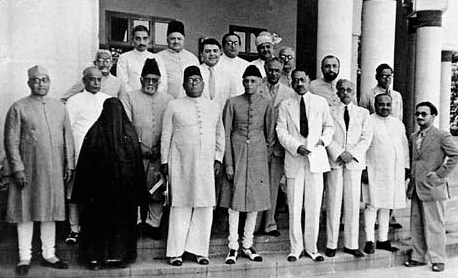
All India Muslim League Working Committee, Lahore session, March 1940
[Public domain]
"3. Resolved that it is the considered view of this Session of the All-India Muslim League that no constitutional plan would be workable in this country or acceptable to the Muslims unless it is designated on the following basic principle, viz. that geographically contiguous units are demarcated into regions which should be so constituted with such territorial readjustments as may be necessary, that the areas in which the Muslims are numerically in a majority as in the North-Western and Eastern Zones of India should be grouped to constitute "Independent States" in which the Constituent Units shall be autonomous and sovereign;" [Zitiert in: Ambedkar, B. R. [भीमराव रामजी आंबेडकर] <1891 - 1956>: Pakistan or The partition of India. -- 3. ed. -- Bombay : Thackers, 1946. -- S. 21]
Wikipedia: https://de.wikipedia.org/wiki/Lahore-Resolution / https://en.wikipedia.org/wiki/Lahore_Resolution. -- Zugriff am 2018-03-08
Presidential address by Muhammad Ali Jinnah (1876 - 1948, Urdu: (محمد علی جناحto the Muslim League. -- Online: http://www.columbia.edu/itc/mealac/pritchett/00islamlinks/txt_jinnah_lahore_1940.html. -- Zugriff am 2018-07-05
"[[18]] Now the question is, what is the solution of this problem between the Hindus and the Mussalmans? We have been considering, and as I have already said, a committee has been appointed to consider the various proposals. But whatever the final scheme of constitution, I will present to you my views, and I will just read to you in confirmation of what I am going to put before you, a letter from Lala Lajpat Rai [1865 - 1928, Urdu: لالہ لاجپت رائے] to Mr. C. R. Das [Bengali: চিত্তরঞ্জন দাশ, 1869 - 1925]. It was written, I believe, about 12 or 15 years ago, and that letter has been produced in a book recently published by one Indra Prakash, and that is how this letter has come to light. This is what Lala Lajpat Rai, a very astute politician and a staunch Hindu Mahasabite, said. But before I read his letter it is plain from [it] that you cannot get away from being a Hindu if you are a Hindu. (Laughter.) The word 'nationalist' has now become the play of conjurers in politics. This is what he says: "There is one point more which has been troubling me very much of late and one [about] which I want you to think carefully and that is the question of Hindu-Muhammadan unity. I have devoted most of my time during the last six months to the study of Muslim history and Muslim law and I am inclined to think it is neither possible nor practicable. Assuming and admitting the sincerity of Mohammadan leaders in the non-cooperation movement I think their religion provides an effective bar to anything of the kind.I think his reading is quite incorrect."You remember the conversation I reported to you in Calcutta which I had with Hakim Ajmal Khan [1868 - 1927, Urdu: حکیم اجمل خان] and Dr. Kitchlew [1888 - 1963, Urdu: سیف الدین کچلو]. There is no finer Muhammadan in Hindustan than Hakim Ajmal Khan, but can any Muslim leader over-ride the Quran? I can only hope that my reading of Islamic law is incorrect.
"And nothing would relieve me more than to be convinced that it is so. But if it is right then it comes to this, that although we can unite against the British we cannot do so to rule Hindustan on British lines. We cannot do so to rule Hindustan on democratic lines."
[[19]] Ladies and gentlemen, when Lala Lajpat Rai said that we cannot rule this country on democratic lines it was all right; but when I had the temerity to speak the same truth about eighteen months ago, there was a shower of attacks and criticism. But Lala Lajpat Rai said fifteen years ago that we cannot do so -- viz., rule Hindustan on democratic lines. What is the remedy? The remedy, according to Congress, is to keep us in the minority and under the majority rule. Lala Lajpat Rai proceeds further:"What is then the remedy? I am not afraid of the seven crores [=70 million] of Mussalmans. But I think the seven crores in Hindustan plus the armed hordes of Afghanistan, Central Asia, Arabia, Mesopotamia and Turkey, will be irresistible." (Laughter.)"I do honestly and sincerely believe in the necessity or desirability of Hindu-Muslim unity. I am also fully prepared to trust the Muslim leaders. But what about the injunctions of the Koran and Hadis? The leaders cannot over-ride them. Are we then doomed? I hope not. I hope your learned mind and wise head will find some way out of this difficulty."
[[20]] Now, ladies and gentlemen, that is merely a letter written by one great Hindu leader to another great Hindu leader fifteen years ago. Now, I should like to put before you my views on the subject as it strikes me, taking everything into consideration at the present moment. The British Govemment and Parliament, and more so the British nation, have been for many decades past brought up and nurtured with settled notions about India's future, based on developments in their own country which has built up the British constitution, functioning now through the Houses of Parliament and the system of [the] cabinet. Their concept of party government functioning on political planes has become the ideal with them as the best form. of government for every country, and the one-sided and powerful propaganda, which naturally appeals to the British, has led them into a serious blunder, in producing a constitution envisaged in the Government of India Act of 1935. We find that the most leading statesmen of Great Britain, saturated with these notions, have in their pronouncements seriously asserted and expressed a hope that the passage of time will harmonise the inconsistent elements in India.[[21]] A leading journal like the London Times, commenting on the Government of India Act of 1935, wrote that "Undoubtedly the difference between the Hindus and Muslims is not of religion in the strict sense of the word but also of law and culture, that they may be said indeed to represent two entirely distinct and separate civilisations. However, in the course of time the. superstitions will die out and India will be moulded into a single nation." (So according to the London Times the only difficulties are superstitions). These fundamental and deep-rooted differences, spiritual, economic, cultural, social, and political have been euphemised as mere "superstitions." But surely it is a flagrant disregard of the past history of the sub-continent of India, as well as the fundamental Islamic conception of society vis-à-vis that of Hinduism, to characterise them as mere "superstitions." Notwithstanding [a] thousand years of close contact, nationalities which are as divergent today as ever, cannot at any time be expected to transform themselves into one nation merely by means of subjecting them to a democratic constitution and holding them forcibly together by unnatural and artificial methods of British Parliamentary statutes. What the unitary government of India for one hundred fifty years had failed to achieve cannot be realised by the imposition of a central federal government. It is inconceivable that the fiat or the writ of a government so constituted can ever command a willing and loyal obedience throughout the sub-continent by various nationalities, except by means of armed force behind it.
[[22]] The problem in India is not of an inter-communal character, but manifestly of an international one, and it must be treated as such. So long as this basic and fundamental truth is not realised, any constitution that may be built will result in disaster and will prove destructive and harmful not only to the Mussalmans, but to the British and Hindus also. If the British Government are really in earnest and sincere to secure [the] peace and happiness of the people of this sub-continent, the only course open to us all is to allow the major nations separate homelands by dividing India into "autonomous national states." There is no reason why these states should be antagonistic to each other. On the other hand, the rivalry, and the natural desire and efforts on the part of one to dominate the social order and establish political supremacy over the other in the government of the country, will disappear. It will lead more towards natural goodwill by international pacts between them, and they can live in complete harmony with their neighbours. This will lead further to a friendly settlement all the more easily with regard to minorities, by reciprocal arrangements and adjustments between Muslim India and Hindu India, which will far more adequately and effectively safeguard the rights and interests of Muslim and various other minorities.
[[23]] It is extremely difficult to appreciate why our Hindu friends fail to understand the real nature of Islam and Hinduism. They are not religions in the strict sense of the word, but are, in fact, different and distinct social orders; and it is a dream that the Hindus and Muslims can ever evolve a common nationality; and this misconception of one Indian nation has gone far beyond the limits and is the cause of more of our troubles and will lead India to destruction if we fail to revise our notions in time. The Hindus and Muslims belong to two different religious philosophies, social customs, and literature[s]. They neither intermarry nor interdine together, and indeed they belong to two different civilisations which are based mainly on conflicting ideas and conceptions. Their aspects [=perspectives?] on life, and of life, are different. It is quite clear that Hindus and Mussalmans derive their inspiration from different sources of history. They have different epics, their heroes are different, and different episode[s]. Very often the hero of one is a foe of the other, and likewise their victories and defeats overlap. To yoke together two such nations under a single state, one as a numerical minority and the other as a majority, must lead to growing discontent, and final. destruction of any fabric that may be so built up for the government of such a state.
[[24]] History has presented to us many examples, such as the Union of Great Britain and Ireland, Czechoslovakia, and Poland. History has also shown to us many geographical tracts, much smaller than the sub-continent of India, which otherwise might have been called one country, but which have been divided into as many states as there are nations inhabiting them. [The] Balkan Peninsula comprises as many as seven or eight sovereign states. Likewise, the Portuguese and the Spanish stand divided in the Iberian Peninsula. Whereas under the plea of unity of India and one nation which does not exist, it is sought to pursue here the line of one central government, when we know that the history of the last twelve hundred years has failed to achieve unity and has witnessed, during these ages, India always divided into Hindu India and Muslim India. The present artificial unity of India dates back only to the British conquest and is maintained by the British bayonet, but the termination of the British regime, which is implicit in the recent declaration of His Majesty's Government, will be the herald of the entire break-up, with worse disaster than has ever taken place during the last one thousand years under the Muslims. Surely that is not the legacy which Britain would bequeath to India after one hundred fifty years of her rule, nor would Hindu and Muslim India risk such a sure catastrophe.
[[25]] Muslim India cannot accept any constitution which must necessarily result in a Hindu majority government. Hindus and Muslims brought together under a democratic system forced upon the minorities can only mean Hindu Raj. Democracy of the kind with which the Congress High Command is enamoured would mean the complete destruction of what is most precious in Islam. We have had ample experience of the working of the provincial constitutions during the last two and a half years, and any repetition of such a government must lead to civil war and [the] raising of private armies, as recommended by Mr. Gandhi to [the] Hindus of Sukkur [Sindhi: سکر] when he said that they must defend themselves violently or non-violently, blow for blow, and if they could not they must emigrate.
[[26]] Mussalmans are not a minority as it is commonly known and understood. One has only got to look round. Even today, according to the British map of India, out of eleven provinces, four provinces where the Muslims dominate more or less, are functioning notwithstanding the decision of the Hindu Congress High Command to non-cooperate and prepare for civil disobedience. Mussalmans are a nation according to any definition of a nation, and they must have their homelands, their territory, and their state. We wish to live in peace and harmony with our neighbours as a free and independent people. We wish our people to develop to the fullest our spiritual, cultural, economic, social, and political life, in a way that we think best and in consonance with our own ideals and according to the genius of our people. Honesty demands [that we find], and [the] vital interest[s] of millions of our people impose a sacred duty upon us to find, an honourable and peaceful solution, which would be just and fair to all. But at the same time we cannot be moved or diverted from our purpose and objective by threats or intimidations. We must be prepared to face all difficulties and consequences, make all the sacrifices that may be required of us, to achieve the goal we have set in front of us."
[Quelle: http://www.columbia.edu/itc/mealac/pritchett/00islamlinks/txt_jinnah_lahore_1940.html. -- Zugriff am 2018-07-05. -- Fair use]
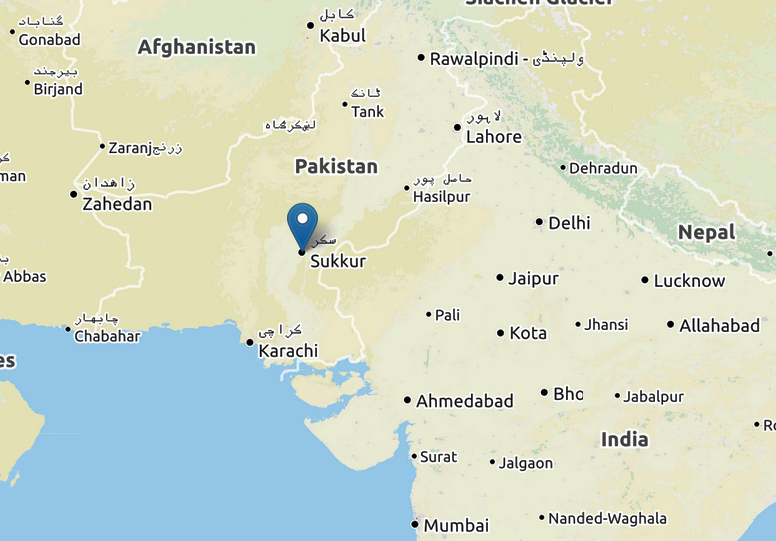
Abb.: Lage von Sukkur (Sindhi: سکر)
[Bildquelle: © OpenStreetMap-Mitwirkende.
--
CC BY-SA 2.0]
Tod von Keshav Baliram Hedgewar (Marathi: केशव बळीराम हेडगेवार, 1889 - 1940)
Madhav Sadashiv Golwalkar (Marathi: मा. स. गोळवलकर; 1906 – 1973) ist ist Sarsanghchalak (Hindi: सरसंघचालक) des RSS
Wikipedia: https://en.wikipedia.org/wiki/M._S._Golwalkar. -- Zugriff am 2018.03.19
Vinayak Damodar Savarkar (Marathi: विनायक दामोदर सावरकर, 1883 - 1966) in einer Ansprache über Gandhis Ahimsa (Gewaltlosigkeit):
"... It is wrong to suggest even if Gandhi’s thoughts are harmful to the society, impracticable, absurd, laughable or whimsical, there must be something in them because they have been uttered by Mahatma. We must say that such a person IS NOT a Mahatma but mentally defective. It is time we showed guts to expose stupidity in teachings of Gandhi. One of Lokamanya Tilak’s letters to Gandhi has recently been published, in it Tilak has clearly warned that to preach limitless non-violence to a nation is sinful.” (SSV 4 pp 494-501)
[Zitiert in: Godbole, V. S. (Vasudev Shankar) [वासुदेव शंकर गोडबोले] <1941 - >: Rationalism of Veer Savarkar. -- Thane : Itihas Patrika, 2004. -- 696 S. ; 23 cm. -- Online: https://archive.org/details/RationalismOfVeerSavarkarGodboleV.S. -- Zugriff am 2018-05-15. -- S. 530. -- Fair use]
Es erscheint:
Ambedkar, B. R. [भीमराव रामजी आंबेडकर] <1891 - 1956>: Thoughts on Pakistan. -- Bombay : Thackers, 1940. -- 375 S.
2. und 3. Aufl. 1945 und 1946 unter dm Titel: Pakistan or The partition of India. -- Online: http://www.columbia.edu/itc/mealac/pritchett/00ambedkar/ambedkar_partition/. -- Zugriff am 2018-03-06
Abb.: Einbandtitel der 3. Auflage, 1946
"I may, however, point out that there are two factors which are dormant for the present but which some day may become dominant and turn the Hindus away from the idea of a Central Government. The first is the cultural antipathy between the Hindu Provinces. The Hindu Provinces are by no means a happy family. It cannot be pretended that the Sikhs have any tenderness for the Bengalees or the Rajputs or the Madrasis. The Bengalee loves only himself. The Madrasi is.bound by his own world. As to the Mahratta, who does not recall that the Mahrattas, who set out to destroy the Muslim Empire in India, became a menace to the rest of the Hindus whom they harassed and kept under their yoke for nearly a century. The Hindu Provinces have no common traditions and no interests to bind them. On the other hand, the differences of language, race, and the conflicts of the past have been the most powerful forces tending to divide them. It is true that the Hindus are getting together and the spirit moving them to become one united nation is working on them. But it must not be forgotten that they have not yet become a nation. They are in the process of becoming a nation and before the process is completed, there may be a setback which may destroy the work of a whole century.
In the second place, there is the financial factor. It is not sufficiently known what it costs the people of India to maintain the Central Government and the proportionate burden each Province has to bear."
[a.a.O., S. 12f.]
"That there are factors, administrative, linguistic or cultural, which are the predisposing causes behind these demands for separation, is a fact which is admitted and understood by all. Nobody minds these demands and many are prepared to concede them. But, the Hindus say that the Muslims are going beyond the idea of separation and questions, such as what has led them to take this course, why are they asking for partition, for the annulment of the common tie by a legal divorce between Pakistan and Hindustan, are being raised. The answer is to be found in the declaration made by the Muslim League in its Resolution that the Muslims of India are a separate nation. It is this declaration by the Muslim League, which is both resented and ridiculed by the Hindus.
The Hindu resentment is quite natural. Whether India is a nation or not, has been the subject-matter of controversy between the Anglo-Indians and the Hindu politicians ever since the Indian National Congress was founded. The Anglo-Indians were never tired of proclaiming that India was not a nation, that 'Indians' was only another name for the people of India. In the words of one Anglo-Indian "to know India was to forget that there is such a thing as India." The Hindu politicians and patriots have been, on the other hand, equally persistent in their assertion that India is a nation. That the Anglo-Indians were right in their repudiation cannot be gainsaid. Even Dr. Tagore, the national poet of Bengal, agrees with them. But, the Hindus have never yielded on the point even to Dr. Tagore.
This was because of two reasons. Firstly, the Hindu felt ashamed to admit that India was not a nation. In a world where nationality and nationalism were deemed to be special virtues in a people, it was quite natural for the Hindus to feel, to use the language of Mr. H. G. Wells, that it would be as improper for India to be without a nationality as it would be for a man to be without his clothes in a crowded assembly. Secondly, he had realized that nationality had a most intimate connection with the claim for self-government. He knew that by the end of the 19th century, it had become an accepted principle that the people, who constituted a nation, were entitled on that account to self-government and that any patriot, who asked for self-government for his people, had to prove that they were a nation. The Hindu for these reasons never stopped to examine whether India was or was not a nation in fact. He never cared to reason whether nationality was merely a question of calling a people a nation or was a question of the people being a nation. He knew one thing, namely, that if he was to succeed in his demand for self-government for India, he must maintain, even if he could not prove it, that India was a nation."
[a.a.O., S. 29f.]
"The pity of it is that the two communities can never forget or obliterate their past. Their past is imbedded in their religion, and for each to give up its past is to give up its religion. To hope for this is to hope in vain. " [a.a.O., S. 37]
"It is no use saying that the Congress is not a Hindu body. A body which is Hindu in its composition is bound to reflect the Hindu mind and support Hindu aspirations. The only difference between the Congress and the Hindu Maha Sabha is that the latter is crude in its utterances and brutal in its actions while the Congress is politic and polite. Apart from this difference of fact, there is no other difference between the Congress and the Hindu Maha Sabha. " [a.a.O., S. 47]
"Looking back on the history of these 30 years, one can well ask whether Hindu-Muslim unity has been realized? Whether efforts have not been made for its realization? And whether any efforts remain to be made? The history of the last 30 years shows that Hindu-Muslim unity has not been realized. On the contrary, there now exists the greatest disunity between them: that efforts—sincere and persistent—have been made to achieve it, and that nothing now remains to be done to achieve it except surrender by one party to the other. If anyone who is not in the habit of cultivating optimism where there is no justification for it, said that the pursuit of Hindu-Muslim unity is like a mirage and that the idea must now be given up, no one can have the courage to call him a pessimist or an impatient idealist. It is for the Hindus to say whether they will engage themselves in this vain pursuit in spite of the tragic end of all their past endeavours, or give up the pursuit of unity and try for a settlement on another basis." [a.a.O., S. 313]
"If [the] Hindu Raj does become a fact, it will, no doubt, be the greatest calamity for this country. No matter what the Hindus say, Hinduism is a menace to liberty, equality and fraternity. On that account it is incompatible with democracy. Hindu Raj must be prevented at any cost. " [a.a.O. S. 358]
Anlässlich seines 59. Geburtstags formuliert Vinayak Damodar Savarkar (Marathi: विनायक दामोदर सावरकर, 1883 - 1966) den Slogan
"Hinduise all politics and militarise all Hindudom."
Gründung von Jamaat-e-Islami (Urdu: جماعتِ اسلامی)
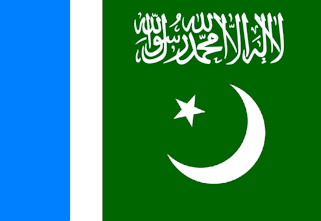
Abb.: ©Logo
[Fair use]
Wikipedia: https://de.wikipedia.org/wiki/Jamaat-e-Islami / https://en.wikipedia.org/wiki/Jamaat-e-Islami. -- Zugriff am 2018-03-26
Erstausgabe der Hindi-Zeitung दैनिक जागरण (Dainik Jagran). Sie ist jetzt rechts und Hindutva orientiert.
Webpräsenz: https://www.jagran.com/. -- Zugriff am 2018-05-22
Wikipedia: https://de.wikipedia.org/wiki/Dainik_Jagran / https://en.wikipedia.org/wiki/Dainik_Jagran. -- Zugriff am 2018-05-22
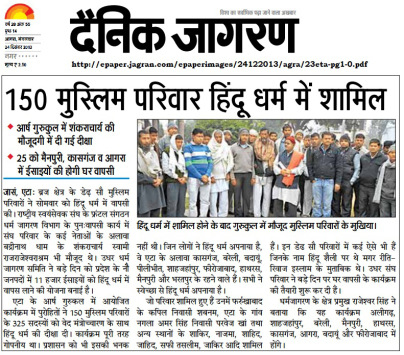
Abb.: Titelseite einer Ausgabe 2016
[Fair use]
Es erscheint:
Noon, Firozkhan <1893 - 1970> [Urdu: ملک فیروز خان نون] : Scented dust. -- Lahore : Gulab Singh, 1942. -- 495 S. -- Online: https://archive.org/details/in.ernet.dli.2015.14810. -- Zugriff am 2018-06-27
Abb.: Titelblatt
“Well, my dear, when I tell you your hair will stand on end. Pieces of the sky will fall off at the shock of a mere mention of the strange occurrence. I could not believe my ears when I heard what I heard.” “What was it, sister ?”
“I heard two men talking to each other just outside my door. I peeped through the chick. and discovered that they were both friends of my husband. One of them was a lawyer, a Muslim, and the other a Hindu merchant. These men have often played tennis together with my husband at the club, and they are all well known in the whole of the civil station as the three chums. Both these men are married.”
“Yes, go on.”
“Well, they are both swine. The Hindu said to the Muslim : ‘Abdul, can you find me a Muslim woman ?’ Abdul answered : ‘Yes, of course, old boy, but why a Muslim girl ?’ Because they are healthy and strong and their bodies· are muscular.”
Gulshan giggled.
“ ‘Oh, I know a girl who will suit you to the ground,’ said Abdul , ‘but tell me, Pritam, if my sister-in-law (courteous form of speech) I mean your wife, is likely to want a Muslim young man, then the husband of this girl I have mentioned to you would do the job.’ ‘You are the very devil, Abdul. You are one up on me. Bye bye.’ Thus they separated. Our men-folk are fiends, and that mainly because their wives are in purdah and there is no check on them. If their wives, sisters and mothers went about with them their language and conversation would become more refined and chaste than is the case at present.
You and I are each other’s liver and bosom friends, since we have known each other for nearly six months, that is ever since you came here. My kidneys and heart become cool and refreshed when I see you. In colder climates no doubt people like to feel that their hearts are warmed by love and affection, but of course we, belonging to a hot country, like this expression better. Oh, I wish everyone in India could be friends as we are !”
“It is all a got-up show,” interjected Gulshan. "This Hindu-Muslim discord only exists because
it pays our men-folk to keep it going. Hindu retailers tell the Hindu wholesalers not to sell anything on credit to Muslim retailers, for the latter would compete with their Hindu brethren, in the Muslim villages. These shopkeepers always preach unity amongst Hindus and urge the making of sacrifices for the sake of the Hindu religion and the Hindu community. On the other hand, when a Muslim gets into a high office, the other Muslims rush up to him in hundreds and point out that his only chance in life to do some service to his community has arrived and special efforts on his part are needed to make up for the march which the Hindus have already stolen on Muslims in Government service, and their one request always is that, so far as it is humanly possible, he should give all the jobs to the Muslims and none to the Hindus. You see, my dear, a man will use any old argument to achieve his object in all walks of life, and this communal discord is a very useful and good stick with which our men-folk can beat the old Indian goat—her political progress.
You can see for yourself what good and sincere friends you and I are. I suppose the men fight because their pockets are concerned; it is all
a question of the wretched belly. Men started quarrelling from the time when Abel and Cain were brothers, and I am sure they will continue to do so till the end of the world. But I do wish they could give the women-folk a chance to come out and take their share in the great task that lies before us, of diminishing human suffering and improving and adding to the happiness of mankind. We have no share in our national affairs, and I am certain that we have a great deal to contribute towards our national progress, as the women of other countries have done in their own homelands.”
“Do you know what I should like to do ?”
“No,” said Gulshan.
“I should make it compulsory for every graduate in our country to learn a little about Christianity, Islam and Hinduism. There should be courses in comparative theology prescribed at all our educational institutions, whether for men or women. I am sure you know nothing about the Hindu religion, and that you have all sorts of weird ideas about us and our philosophy. Now tell me, Gulshan, what do you think of us ?”
“You won’t mind ?”
“No."
[a.a.O., S. 281 - 284. -- Fair use]
Wikipedia: https://de.wikipedia.org/wiki/Malik_Feroz_Khan_Noon / https://en.wikipedia.org/wiki/Feroz_Khan_Noon. -- Zugriff am 2018-06-27
Es erscheint:
Gandhi, Mohandas Karamchand [Gujarati: મોહનદાસ કરમચંદ ગાંધી] <1869 - 1948>: Our language Problem / ed. by Anand T. Hingorani [आनन्द टी हिंगोरानी, 1907 - ]. -- Karachi : Selbstsverlag, 1942. -- 66 S. -- (Gandhi Series ; brochure no. 1). -- Eine Sammlung von 20 Schriften Gandhis zum Problem von Hindi und Urdu und Hindustani.
Gandhi gründet die Hindustani Prachar Sabha -- हिन्दुस्तानी प्रचार सभा zur Förderung des einheitlichen - Hindi und Urdu umfassenden - Hindustani
Webpräsenz: http://hindustanipracharsabha.org/. -- Zugriff am 2018-07-09
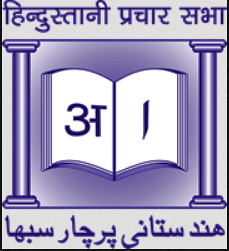
Abb.: ©Logo
[Fair use]
Poona (Marathi: पुणे): Gründung des Hindu Rashtra Dal [हिन्दू राष्ट् दल]
"C. Hindu Rashtra Dal Ex.34 which has no date but was sent with a letter dated August 1, 1944 from the DIG/CID of Bombay Province to Bombay Government gives the origin of this movement and its objects. It was essentially a Hindu volunteer corps organisation but quite distinct from the RSS. Although originally started by the Hindu Maha Sabhaites, it was not officially affiliated to the Hindu Maha Sabha.
Brief History
19.82 On May 15, 1942 V.D. Savarkar [Marathi: विनायक दामोदर सावरकर, 1883 - 1966], President of the Hindu Maha Sabha addressed the volunteers at the training camp of that organisation at Poona and emphasised the necessity of forming a volunteer organisation for secret activities, as that could not be undertaken by the Sabha. As a consequence of this Hindu Maha Sabha leaders such as
- S.R. Date,
- V.V. Gogte,
- N.D. Apte and
- N.V. Godse [Marathi: नथूराम गोडसे, 1910 – 1949]
founded the Hindu Rashtra Dal at Poona with the object of assisting the Hindu Sabha activities. But they made no effort in popularising the movement of the Dal or to increase its membership.
19.83 In May 1943, N.D. Apte and N.V. Godse organized a second annual training camp of the Dal at Ahmednagar. 70 volunteers from Marathi-speaking districts of Bombay and the Marathi-speaking Indian States attended the camp. It trained volunteers in Indian games, physical exercises, shooting practice with air-guns; and also classes to propagate Savarkar ideology.
19.84 On May 29, 1943, V.D. Savarkar held private discussions with the Hindu Rashtra Dal in Anandashtam, Poona. He required the volunteers to owe an implicit allegiance to him irrespective of who the President of the Hindu Maha Sabha was. Dal was to remain a distinct body, its primary’ duty' being to protect Hindudom and render help to every’ Hindu institution in their attempt to oppose encroachment on their rights and religion. Savarkar ideology’ was attainment of Hindudom, opposition to Pakistan and indivisibility of India.
Membership
19.85 There were at Poona about 150 members. The office-bearers were:
- N.V. Godse [Marathi: नथूराम गोडसे, 1910 – 1949], Editor of the Agrani, Chief Organiser.
- Kashinath Limaye, Sangli.
- N.D. Apte, Secretary'.
- Prof. R.S. Jog of Ferguson College, Organiser.
Activities
19.86 Its activities were confined to maintaining order during Hindu Maha Sabha meetings and enrolling of Hindu Sabha members. On June 22, 1944, 15 Hindu Rashtra Dal volunteers led by N.D. Apte staged a black flag demonstration before Mahatma Gandhi at Panchagni the object being to protest against C.R. formula.
19.87 There is no evidence of what happened to this Dal up to May 22, 1947 on which date a circular was issued by the DIG/CID/Poona on the activities of the Dal. It was addressed to all District Superintendents of
Police and subordinate officers upto Sub-Inspectors in the I.B. This document required the Police to keep a close watch on the activities of the Dal and to report on any attempt made by volunteers and others to implement the advice given by Savarkar. Attached to this was a summary of the proceedings of the Dal held at Dadar on May 9 and 10, 1947, where Savarkar presided. The object of the meeting was to revitalize the Hindu Rashtra Dal activities. Savarkar made 4 speeches giving the aims and objects of the Dal, its constitution, and his views on communal riots in India and the partition of the Punjab and Bengal.
19.88 The object of the Dal was stated to be the propagation of "Hindu Rashtra Vad as propounded by Vir Savarkarji” called Savarkarism.
19.89 Savarkar as the dictator nominated S.V. Modak of Satara and P.V. Gothaskar as the next dictator and General Secretary. Savarkar during the course of his speech asked the volunteers to assist the villagers in securing arms, licences within the provisions of the law. The Dal was based, it was said, on Savarkar’s ideology. He talked about Muslim atrocities in the Punjab, Bengal, and N.W.F.P. and said that they would not stop until the Hindus retaliated in the same spirit including raping of women and destroying of mosques, etc., if Hindu women and Hindu places of worship were treated in that manner. Savarkar advised the Dal volunteers to oppose the Constitution to be framed by the Constituent Assembly if it was against the interests of Hindus and Hindudom.
19.90 While dealing with RSS and Hindu Maha Sabha movements reference has already been made to exhibits 114 and 114-A which gave the activities of the Hindu Maha Sabha leaders. Amongst them the prominent ones w'ere N.V. Godse, N.D. Apte, D.R. Badge, G.V. Ketkar, and N.R. Athawle. Apte, Badge, and Athawle were shown as potentially dangerous. Godse member of the Hindu Rashtra Dal and G.V. Ketkar as a staunch Savarkarite and brain behind the Hindu Sabha movements. In Ex.ll4-A, V.R. Karkare was shown as a staunch Savarkarite, coworker of Apte, a smuggler of arms and potentially dangerous, but he was not shown as a member of the Dal. These lists were sent to Government with a letter of 19th August 1947 by the DIG/CED/Poona.
19.91 In their statements as accused in the Gandhi Murder Case Godse, Apte, and Karkare have given the details of holding camps at various places like Poona, Ahmednagar and other places in 1942, 1943, and 1944.
19.92 Nathuram Godse’s statement also show's that on January 16, 1944 Godse and Apte decided to start a newspaper to give publicity to the w ork of Hindu Sabha and Rs.15,000/- were given as a loan by Savarkar and the first issue of the Agrani appeared on March 25,
1944. It ceased publication under this name in July 1947 because of the demand of Rs.5,000-00 as security on July 3, 1947 under the Press Emergency Powers Act and soon after July 15, 1947 it restarted under the name of the Hindu Rashtra, which cannot be a credit to the efficacy of the Press Act. N.V. Godse w'as the editor of both these papers. N.D. Apte was the proprietor of the Agrani and the Hindu Rashtra was owned by a private company of which the share-holders were N.D. Apte and N.V. Godse and this continued to be published till January’ 31, 1948. Godse was arrested on the 30th i.e. a day before."
[Quelle: Report of Commission of Inquiry into Conspiracy to Murder Mahatma Gandhi / Jeevan Lal Kapur; India. Commission of Inquiry into Conspiracy to Murder Mahatma Gandhi. -- [New Delhi], [Ministry of Home affairs], [1970]. -- Fair use]
Gründung der Partei Dravida Kazhagam (DK) (Tamil: திராவிடர் கழகம் -- Dravidian Federation)
Webpräsenz: http://www.dravidarkazhagam.org/. -- Zugriff am 2018-0521
Wikipedia: https://en.wikipedia.org/wiki/Dravidar_Kazhagam. -- Zugriff am 2018-05-21
Delhi (Hindi: दिल्ली): Die Hindu Mahasabha veranstaltet eine Akhand Hindusthan [Hindi: अखंड हिन्दुस्तान - Ungeteiltes Hindustan] Leaders' Conference, um den Widerstand gegen eine Teilung Indiens zu mobilisieren.
Es erscheint die Sondernummer der Zeitschrift कल्याण (Kalyan, Gita Press):
गौ-अंक [Kuh-Nummer]
Darin Prabhudutt Brahmachari (Hindi: प्रभुदत्त ब्रह्मचारी):
"... anyone who considers cow a mother is a Hindu. It is the most beautiful definition of a Hindu. One swayamsevak said it is an incomplete definition. I told him if we say those who believe in the Vedas are Hindus it would not be appropriate since many among Hindus like the Jains and the Sikhs do not consider the Vedas as theirs." [Übersetzung: Mukul, Akshaya [अक्षय मुकुल]: Gita Press and the making of Hindu India. -- Noida : HarperCollins, 2015. -- 540 S. -- ISBN 978-93-5177-230-9. -- S. 292. -- Fair use]
Balakrishna Shivram Moonje (Maharati: बाळकृष्ण शिवराम मुंजे, 1872 – 1948) schreibt an Gandhi (Gujarati: મોહનદાસ કરમચંદ ગાંધી, 1869 - 1948), dass er dessen Ahimsa (Gewaltlosigkeit) ablehnt, weil die Hindu Mahasabha -- der Moonje in führender Stellung angehört -- für "violence organised and disciplined on modern scientific lines" ist. Er lehnt auch das Spinnrad Gandhis ab, das "it emasculates manliness".
[Zitiert in: Jaffrelot, Christophe <1964 - >: The Hindu nationalist movement in India. -- New York : Columbia Univ. Pr., 1996. -- 592 S. : Ill. -- Originaltitel: Les nationalistes hindous (1993). -- S. 46, Anm. 152. -- Fair use]
Wikipedia: https://en.wikipedia.org/wiki/B._S._Moonje. -- Zugriff am 2018-03-22
Wikipedia: https://en.wikipedia.org/wiki/Bengali_Hindu_Homeland_Movementugriff am 2018-06-10
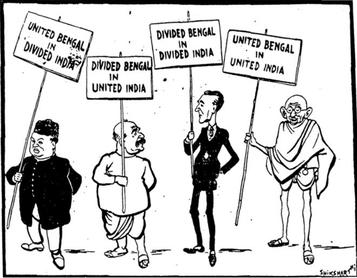
Abb.: Karikatur über die verschiedenen Forderungen zur Teilung bzw.
Nicht-Teilung Bengalens, in:Hindusthan Standard 1947-05-17
[Bildquelle: Wikimedia. -- Fair use]
Poona (Marathi: पुणे): Es erscheint
सावरकर, विनायक दामोदर [Savarkar, Vinayak Damodar] <1883 - 1966>: जोसेफ मॅझिनी आत्मचरित्र नि राजकारण ["Giuseppe Mazzini [1805-1872] : Biographie und Politik"]. -- 2. Aufl. -- Pune, 1946. -- 283 S. : Ill. -- 1. Aufl. nach 1906
Abb.: Einbandtitel eines Neudrucks 2012
[Fair use]
Wikipedia: https://de.wikipedia.org/wiki/Giuseppe_Mazzini. -- Zugriff am 2018-03-22
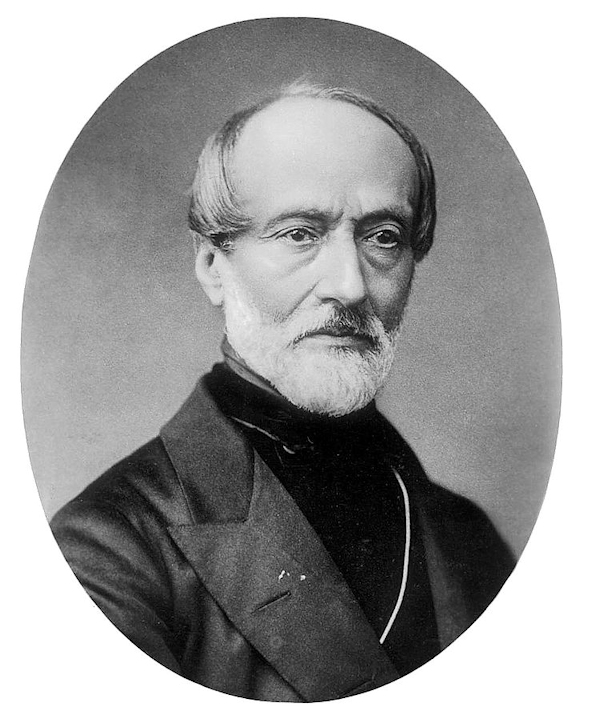
Abb.: Giuseppe Mazzini (1805-1872), 1860
[Public domain]
Es erscheint:
Nehru, Jawaharalal [Hindi: जवाहरलाल नेहरू] <1889 - 1964>: The discovery of India. -- Calcutta : Signet, 1946. -- 490 S. : Ill. -- Online: https://archive.org/details/in.ernet.dli.2015.537001 (Erstausgabe Calcutta) / https://archive.org/details/DiscoveryOfIndia (Centenary edition). -- Zugriff am 2018-06-28
Abb.: Titelblatt
Wikipedia: https://en.wikipedia.org/wiki/The_Discovery_of_India. -- Zugriff am 2018-06-28
"Mr. Jinnah's demand was based on a new theory he had recently propounded—that India consisted of two nations, Hindu and Moslem. Why only two I do not know, for if nationality was based on religion, then there were many nations in India. Of two brothers one may be a Hindu, another a Moslem; they would belong to two different nations. These two nations existed in varying proportions in most of the villages of India. They were nations which had no boundaries; they overlapped. A Bengali Moslem and a Bengali Hindu living together, speaking the same language, and having much the same traditions and customs, belonged to different nations. All this was very difficult to grasp; it seemed a reversion to some medieval theory. What a nation is it is difficult to define. Possibly the essential characteristic of national consciousness is a sense of belonging together and of together facing the rest of mankind. How far that is present in India as a whole may be a debatable point. It may even be said that India developed in the past as a multi-national state and gradually acquired a national consciousness. But all these are theoretical abstractions which hardly concern us. To-day the most powerful states arc multi-national, but at the same time developing a national consciousness, like the U.S.A. or the U.S.S.R. From Mr. Jinnah's two-nation theory developed the conception of Pakistan, or splitting up of India. That, of course, did not solve the problem of the 'two nations,' for they were all over the place. But that gave body to a metaphysical conception. This again gave rise to a passionate reaction among many in favour of the unity of India. Ordinarily national unity is taken for granted. Only when it is challenged or attacked, or attempts are made to disrupt it, is unity really appreciated, and a positive reaction to maintain it takes place. Thus sometimes attempts at disruption actually help to weld that unity.
There was a fundamental difference between the outlook of the Congress and that of the religious-communal organizations. Of the latter the chief were the Moslem League and its Hindu counterpart, the Hindu Mahasabha. These communal organizations, while in theory standing for India's independence, were more interested in claiming protection and special privileges for their respective groups. They had thus inevitably to look to the British Government for such privileges, and this led them to avoid conflict with it. The Congress outlook was so tied up with India's freedom as a united nation that everything else was secondary, and this meant ceaseless conflict or friction with the British power.
Indian nationalism, as represented by the Congress, opposed British imperialism. The Congress had further developed agrarian, economic, and social programmes. Neither the Moslem League nor the Hindu Mahasabha had ever considered any such question or attempted to frame a programme. Socialists and communists were,' of course, intensely interested in such matters and had their own programmes, which they tried to push in the Congress as well as outside."
[Centenary edition., S. 392f. -- Fair use]
Calcutta (Bengali: কলকাতা): Direct Action Day
über 4.000 Tote
Wikipedia: https://de.wikipedia.org/wiki/Unruhen_in_Kalkutta_1946 / https://en.wikipedia.org/wiki/Direct_Action_Day. -- Zugriff am 2018-04-02
Bihar [Hindi: बिहार] Riots
2000 bis 3000 tote Muslime
Wikipedia: https://en.wikipedia.org/wiki/1946_Bihar_riots. -- Zugriff am 2018-04-02
Noakhali (Bengali: নোয়াখালী ): Noakhali riots
über 5.000 tote Hindus
Wikipedia: https://en.wikipedia.org/wiki/Noakhali_riots. -- Zugriff am 2018-04-02
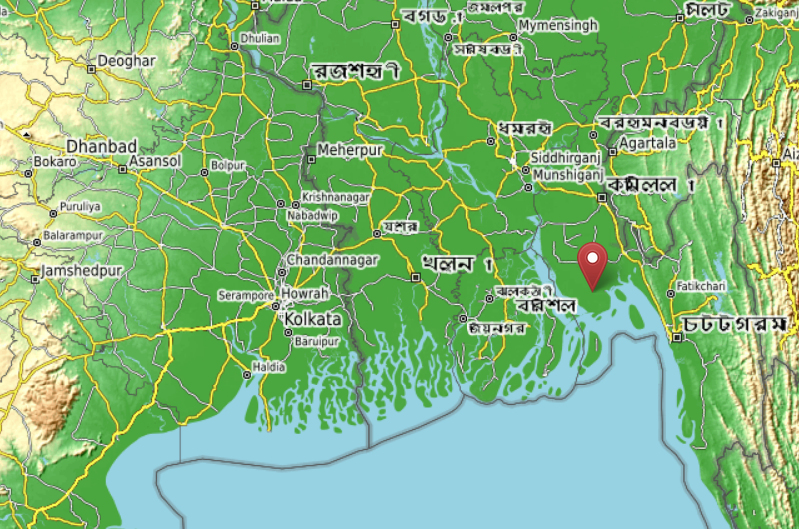
Abb.: Lage von Noakhali (Bengali: নোয়াখালী
)
[Bildquelle: © OpenStreetMap-Mitwirkende.
--
CC BY-SA 2.0]
Garhmukteshwar (Hindi: गढ़मुक्तेश्वर): Ausschreitungen gegen Muslime
46 Tote
Wikipedia: https://en.wikipedia.org/wiki/Garhmukteshwar#Anti-Muslim_violence. -- Zugriff am 2018-04-02
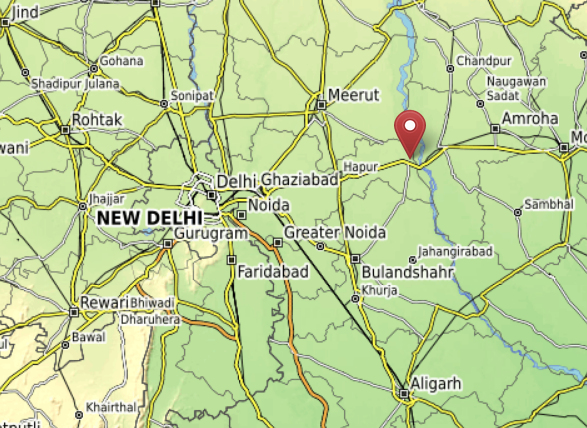
Abb.: Lage von Garhmukteshwar (Hindi:
गढ़मुक्तेश्वर)
[Bildquelle: © OpenStreetMap-Mitwirkende.
--
CC BY-SA 2.0]
Allahabad (Hindi: इलाहाबाद): Tod von Madan Mohan Malaviya (Hindi: मदनमोहन मालवीय, 1861 - 1946)
Kenia: Gründung des Hindu Swayamsevak Sangh -- Hindi: हिन्दू स्वयंसेवक संघ -- Hindu Volunteer Association
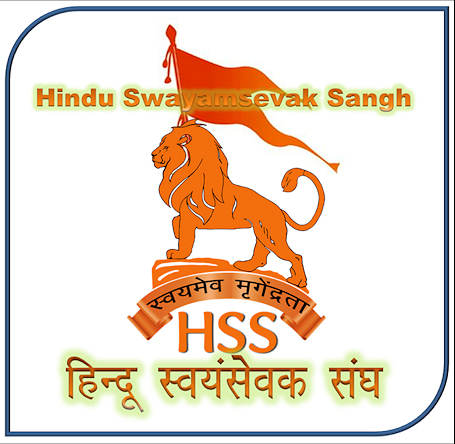
Abb.: ©Logo
[Fair use]
Webpräsenz http://www.hssworld.org/ -- Zugriff am 2018-02-22. Wikipedia https://en.wikipedia.org/wiki/Hindu_Swayamsevak_Sangh. -- Zugriff am 2018-02-22
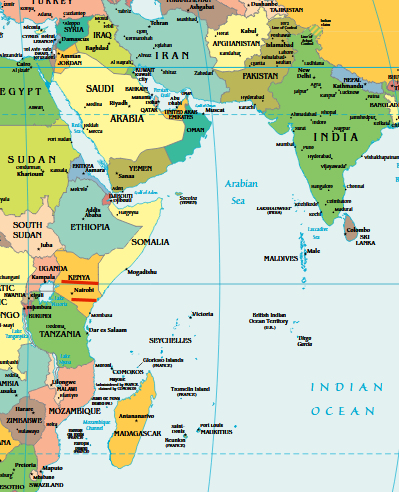
Abb.: Lage von Kenia
[Bildquelle: CIA. -- Public domain]
In der Zeitschrift Kalyan (Gita Press) erschein das Gedicht
हिन्दुत्व विहीन स्वराज्य से क्या होगा [Was soll aus Unabhängigkeit ohne Hindutva werden?]
"If we had no Hindutva in us, why would we fight for Swaraj?
We would have become foreigners or Christians then, why would we fight?
Why did we sacrifice so boldly, why did we rot in jail?
Why did we take bullets on our chests, why did we go to the gallows?
What will we get today by sacrificing our religion to please someone?What will we get from Swaraj without Hindutva?
Hindi-Hindu is the religion of Hind, Beautiful is the Hindi language!
Hindi is our food and cloth, Hindi flows in our breath!!
Today Hindi is facing the trap of Hindustani!
Hindus are killed in every manner, while Hind is a witness to the show!!
If we wish, today the accomplishment of Pakistan can be drowned!
If we wish, today oppression can be removed from the universe!!
If we wish, today Ram Rajya can be established all over the world!
If only we are able to let dharma dominate over our sins!!"[Übersetzung: Mukul, Akshaya [अक्षय मुकुल]: Gita Press and the making of Hindu India. -- Noida : HarperCollins, 2015. -- 540 S. -- ISBN 978-93-5177-230-9 . -- S. 250f. -- Fair use]
Hanuman Prasad Poddar (Hindi: हनुमान प्रसाद पोद्दार, 1892–1971) legt einen Entwurf für ein unabhängiges Hindu-Indien vor:
"Poddar then presented a twelve-point template for the Hindu- majority independent India, and appealed to 'Congress, Hindu Mahasabha, Sanatanis, Jains, Sikhs to work together to achieve this’.
- India should be called Hindusthan or Aryavarta.
- It should be purely a Hindu nation and entirely organized on the basis of Hindu culture. The national flag should be saffron and Vande Mataram should be the national anthem.
- As a matter of basic principle, cow slaughter should be banned.
- The official language should be pure Hindi (not the corrupt Hindustani) and the script Devanagari.
- Military training should be made compulsory and the Arms Act should be amended.
- The Indian Army should only consist of Hindus. Therefore, the Army should be divided beforehand.
- Muslims should not be appointed to any high post.
- In government jobs Muslims should be appointed based on their percentage in the population. This should be done only if Hindus in Pakistan get government jobs in proportion to their population.
- Laws should not be made for any religion in the name of social reform.
- In the border areas of East and West Bengal, East and West Punjab, North-West Frontier Province and Assam and all other borders, the Central government should deploy a Strong army so that in future India is not attacked.
- Pakistan should be treated as a foreign country and passports be made mandatory for travelling there.
- In India, Muslims and other minorities should be given adequate facilities. Their life and dignity should be protected.
In addition, Poddar spelt out eight principles that every Hindu should follow:
- Honour India’s ancient culture, its glorious history as well as show respect and imbibe the valour and knowledge of great men of the past.
- Take pride in Hindutva. A Hindu of any varna, jati or faith should know that his primary identity is of a Hindu. Such unity would result in helping each other.
- Despite social differences, make united efforts to create a great Hindu rashtra.
- Substitute selfish traits like personal ambition, hankering for power and craving for honour and wealth by service to the nation.
- Help the weak and poor with dedication, money and might. Never be afraid of oppressors (in the present context this could mean Muslims). They should be exterminated with all possible means. Not doing anything (in retaliation) to their oppression would be a sin just the way it is to oppress the poor.
- Consider yourself invincible and strong and always work in that direction.
- Have belief in God’s unlimited power and benevolence, and conserve energy to fight internal and external enemies.
- Consider every work as worship of God."
[Quelle: Mukul, Akshaya [अक्षय मुकुल]: Gita Press and the making of Hindu India. -- Noida : HarperCollins, 2015. -- 540 S. -- ISBN 978-93-5177-230-9 . -- S. 254f. -- Fair use]
Erstausgabe der Wochenzeitschrift Organiser

Abb.: ©Balken
[Fair use]
Zu Hindutva-Chronik ab 1947-08-14